
Title: Lalla Rookh
An Oriental romance
Author: Thomas Moore
Illustrator: T. Sulman
John Tenniel
Release date: September 2, 2025 [eBook #76794]
Language: English
Original publication: London: Longman, Green, Longman, & Roberts, 1861
Credits: Aaron Adrignola, Tim Lindell and the Online Distributed Proofreading Team at https://www.pgdp.net (This file was produced from images generously made available by The Internet Archive/Canadian Libraries)

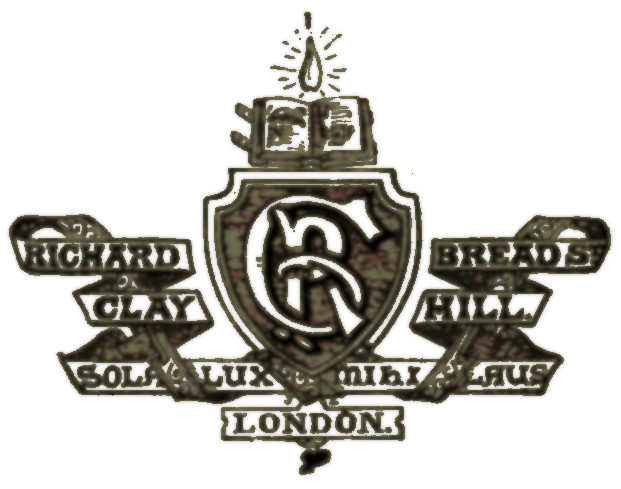
| LALLA ROOKH. | |
| Illuminated Title-page. | |
| [From several ancient MSS. in the Library of the East India House.] | |
| PAGE | |
| He was a youth about Lalla Rookh’s own age. | 1 |
| That Veiled Prophet of Khorassan | 8 |
| THE VEILED PROPHET OF KHORASSAN. | |
| Ornamental Title-page | 9 |
| [Principally from a beautiful MS. in the British Museum.] | |
| There on that throne, to which the blind belief | |
| Of millions rais’d him, sat the Prophet-Chief. | 11 |
| All, all are there;—each Land its flower hath given, | |
| To form that fair young Nursery for Heaven! | 14 |
| Believes the form, to which he bends his knee, | |
| Some pure, redeeming angel, sent to free. | 17 |
| She saw that youth, too well, too dearly known, | |
| Silently kneeling at the Prophet’s throne. | 21 |
| All fire at once the madd’ning zeal she caught;— | |
| Elect of Paradise! blest, rapturous thought! | 25 |
| She swore, and the wide charnel echoed, “Never, never!” | 28 |
| At length, with fiendish laugh, like that which broke | |
| From Eblis at the Fall of Man, he spoke. | 35 |
| “Such the refin’d enchantress that must be | |
| This hero’s vanquisher,—and thou art she!” | 41 |
| He raised his veil—the Maid turn’d slowly round, | |
| Look’d at him—shriek’d—and sunk upon the ground! | 47 |
| Now, through the Haram chambers, moving lights | |
| And busy shapes proclaim the toilet’s rites. | 50 |
| Young Azim roams bewilder’d,—nor can guess | |
| What means this maze of light and loneliness. | 53 |
| He sees a group of female forms advance. | 59 |
| “Poor maiden!” thought the youth, “if thou wert sent.” | 62 |
| vi | |
| Oh! could he listen to such sounds unmov’d, | |
| And by that light—nor dream of her he lov’d? | 68 |
| “Look up, my Zelica—one moment show | |
| Those gentle eyes to me, that I may know.” | 71 |
| “Oh! curse me not,” she cried, as wild he toss’d | |
| His desperate hand tow’rds Heaven. | 75 |
| “Thy oath! thy oath!” | 79 |
| They saw a young Hindoo girl upon the bank | 81 |
| Whose are the gilded tents that crowd the way? | 84 |
| In vain he yells his desperate curses out. | 90 |
| For this alone exists—like lightning-fire, | |
| To speed one bolt of vengeance, and expire! | 94 |
| And they beheld an orb, ample and bright, | |
| Rise from the Holy Well. | 98 |
| And led her glittering forth before the eyes | |
| Of his rude train, as to a sacrifice. | 102 |
| And death and conflagration throughout all | |
| The desolate city hold high festival! | 104 |
| “There, ye wise Saints, behold your Light, your Star— | |
| Ye would be dupes and victims, and ye are.” | 109 |
| He sprung and sunk, as the last words were said— | |
| Quick clos’d the burning waters o’er his head. | 113 |
| “And pray that He may pardon her,—may take | |
| Compassion on her soul for thy dear sake.” | 117 |
| For this the old man breath’d his thanks and died. | 119 |
| PARADISE AND THE PERI. | |
| Ornamental Title-page | 127 |
| [Architectural details from Baghdad, &c.] | |
| The glorious Angel, who was keeping | |
| The gates of Light, beheld her weeping. | 129 |
| ⸺She caught the last— | |
| Last glorious drop his heart had shed. | 135 |
| Like their good angel, calmly keeping | |
| Watch o’er them till their souls would waken. | 143 |
| vii | |
| Then swift his haggard brow he turn’d | |
| To the fair child, who fearless sat. | 148 |
| Blest tears of soul-felt penitence! | 151 |
| And now—behold him kneeling there | |
| By the child’s side, in humble prayer. | 152 |
| “Joy, joy for ever!—my task is done.” | 154 |
| THE FIRE WORSHIPPERS. | |
| Ornamental Title-page | 167 |
| [In part from the binding of a “Shah Namah,” in the East India House Library.] | |
| And sits alone in that high bower | |
| Watching the still and shining deep. | 169 |
| “Oh! ever thus, from childhood’s hour, | |
| I’ve seen my fondest hopes decay.” | 181 |
| “Here, maiden, look—weep—blush to see | |
| All that thy sire abhors in me!” | 185 |
| Fiercely he broke away, nor stopp’d, | |
| Nor look’d—but from the lattice dropp’d. | 189 |
| The morn hath risen clear and calm, | |
| And o’er the Green Sea palely shines. | 192 |
| ’Tis Hafed—name of fear, whose sound | |
| Chills like the muttering of a charm! | 197 |
| His Chiefs stood round—each shining blade | |
| Upon the broken altar laid. | 205 |
| “This very night his blood shall steep | |
| These hands all over ere I sleep!” | 211 |
| And o’er the wide, tempestuous wave | |
| Looks, with a shudder, to those towers. | 216 |
| And snatch’d her breathless from beneath | |
| This wilderment of wreck and death. | 222 |
| Shuddering, she look’d around—there lay | |
| A group of warriors in the sun. | 227 |
| “Tremble not, love, thy Gheber’s here!” | 233 |
| Ancient Persian Fire-Altar, &c. &c. | 236 |
| ’Twas one of those ambrosial eves | |
| A day of storm so often leaves. | 238 |
| viii | |
| Breathless she stands, with eyes cast down. | 241 |
| He felt it—deeply felt—and stood, | |
| As if the tale had frozen his blood. | 248 |
| A signal, deep and dread as those | |
| The storm-fiend at his rising blows. | 254 |
| As mute they pass’d before the flame | |
| To light their torches as they pass’d. | 256 |
| They come—that plunge into the water | |
| Gives signal for the work of slaughter. | 263 |
| “Now, Freedom’s God! I come to Thee.” | 269 |
| Where still she fix’d her dying gaze,— | |
| And, gazing, sunk into the wave. | 274 |
| “Farewell—farewell to thee, Araby’s daughter!” | 277 |
| THE LIGHT OF THE HARAM. | |
| Ornamental Title-page | 283 |
| [From porcelain and illuminated MSS.] | |
| Or to see it by moonlight,—when mellowly shines | |
| The light o’er its palaces, gardens, and shrines. | 285 |
| He saw, in the wreaths she would playfully snatch | |
| From the hedges, a glory his crown could not match. | 291 |
| Such cloud it is that now hangs over | |
| The heart of the Imperial Lover. | 295 |
| He heeds them not—one smile of hers | |
| Is worth a world of worshippers. | 297 |
| Fill’d with the cool, inspiring smell, | |
| The Enchantress now begins her spell. | 302 |
| No sooner was the flowery crown | |
| Plac’d on her head, than sleep came down. | 305 |
| That all stood hush’d and wondering, | |
| And turn’d and look’d into the air. | 315 |
| She whispers him with laughing eyes, | |
| “Remember, love, the Feast of Roses!” | 320 |
| They had now begun to ascend those barren mountains. | 321 |
| The marriage was fixed for the morning after her arrival. | 329 |
The Poem, or Romance, of Lalla Rookh, having now reached, I understand, its twentieth edition, a short account of the origin and progress of a work which has been hitherto so very fortunate in its course, may not be deemed, perhaps, superfluous or misplaced.
It was about the year 1812, that, far more through the encouraging suggestions of friends than from any confident promptings of my own ambition, I conceived the design of writing a Poem upon some Oriental subject, and of those quarto dimensions which Scott’s successful publications in that form had then rendered the regular poetical standard. A negotiation on the subject was opened with the Messrs. Longman in the same year; but, from some causes which I cannot now recollect, led to no decisive result; nor was it till a year or two after, that any further steps were taken xin the matter,—their house being the only one, it is right to add, with which, from first to last, I held any communication upon the subject.
On this last occasion, Mr. Perry kindly offered himself as my representative in the treaty; and, what with the friendly zeal of my negotiator on the one side, and the prompt and liberal spirit with which he was met on the other, there has seldom, I think, occurred any transaction in which Trade and Poesy have shone out so advantageously in each other’s eyes. The short discussion that then took place, between the two parties, may be comprised in a very few sentences. “I am of opinion,” said Mr. Perry,—enforcing his view of the case by arguments which it is not for me to cite,—“that Mr. Moore ought to receive for his Poem the largest price that has been given, in our day, for such a work.” “That was,” answered the Messrs. Longman, “three thousand guineas.” “Exactly so,” replied Mr. Perry, “and no less a sum ought he to receive.”
It was then objected, and very reasonably, on the part of the firm, that they had never yet seen a single line of the Poem; and that a perusal of the work ought to be allowed to them, before they embarked so large a sum in the purchase. But, no;—the romantic view which my friend, Perry, took of the matter, was, that this price should be given as a tribute to reputation xialready acquired, without any condition for a previous perusal of the new work. This high tone, I must confess, not a little startled and alarmed me; but, to the honour and glory of Romance,—as well on the publisher’s side as the poet’s,—this very generous view of the transaction was, without any difficulty, acceded to, and the firm agreed, before we separated, that I was to receive three thousand guineas for my Poem.
At the time of this agreement, but little of the work, as it stands at present, had yet been written. But the ready confidence in my success shown by others, made up for the deficiency of that requisite feeling, within myself; while a strong desire not wholly to disappoint this “auguring hope,” became almost a substitute for inspiration. In the year 1815, therefore, having made some progress in my task, I wrote to report the state of the work to the Messrs. Longman, adding, that I was now most willing and ready, should they desire it, to submit the manuscript for their consideration. Their answer to this offer was as follows:—“We are certainly impatient for the perusal of the Poem; but solely for our gratification. Your sentiments are always honourable.”[i]
I continued to pursue my task for another year, being likewise occasionally occupied with the Irish xiiMelodies, two or three numbers of which made their appearance, during the period employed in writing Lalla Rookh. At length, in the year 1816, I found my work sufficiently advanced to be placed in the hands of the publishers. But the state of distress to which England was reduced, in that dismal year, by the exhausting effects of the series of wars she had just then concluded, and the general embarrassment of all classes both agricultural and commercial, rendered it a juncture the least favourable that could well be conceived for the first launch into print of so light and costly a venture as Lalla Rookh. Feeling conscious, therefore, that under such circumstances, I should act but honestly in putting it in the power of the Messrs. Longman to reconsider the terms of their engagement with me,—leaving them free to postpone, modify, or even, should such be their wish, relinquish it altogether, I wrote them a letter to that effect, and received the following answer:—“We shall be most happy in the pleasure of seeing you in February. We agree with you, indeed, that the times are most inauspicious for ‘poetry and thousands;’ but we believe that your poetry would do more than that of any other living poet at the present moment.”[ii]
The length of time I employed in writing the few stories strung together in Lalla Rookh will appear, to xiiisome persons, much more than was necessary for the production of such easy and “light o’ love” fictions. But, besides that I have been, at all times, a far more slow and painstaking workman than would ever be guessed, I fear, from the result, I felt that, in this instance, I had taken upon myself a more than ordinary responsibility, from the immense stake risked by others on my chance of success. For a long time, therefore, after the agreement had been concluded, though generally at work with a view to this task, I made but very little real progress in it; and I have still by me the beginnings of several stories continued, some of them, to the length of three or four hundred lines, which, after in vain endeavouring to mould them into shape, I threw aside, like the tale of Cambuscan, “left half-told.” One of these stories, entitled The Peri’s Daughter, was meant to relate the loves of a nymph of this aërial extraction with a youth of mortal race, the rightful Prince of Ormuz, who had been, from his infancy, brought up in seclusion, on the banks of the river Amou, by an aged guardian named Mohassan. The story opens with the first meeting of these destined lovers, then in their childhood; the Peri having wafted her daughter to this holy retreat, in a bright, enchanted boat, whose first appearance is thus described:—
A song is sung by the Peri in approaching, of which the following forms a part:—
In another of these inchoate fragments, a proud female saint, named Banou, plays a principal part; and her progress through the streets of Cufa, on the night of a great illuminated festival, I find thus described:—
There are yet two more of these unfinished sketches, one of which extends to a much greater length than I was aware of; and, as far as I can judge from a hasty renewal of my acquaintance with it, is not incapable of being yet turned to account.
In only one of these unfinished sketches, the tale of The Peri’s Daughter, had I yet ventured to invoke that most home-felt of all my inspirations, which has lent to the story of The Fire-worshippers its main attraction and interest. That it was my intention, in the concealed Prince of Ormuz, to shadow out some impersonation of this feeling, I take for granted from the prophetic words supposed to be addressed to him by his aged guardian:—
In none of the other fragments do I find any trace of this sort of feeling, either in the subject or the personages of the intended story; and this was the reason, doubtless, though hardly known, at the time, to myself, that, finding my subjects so slow in kindling my own sympathies, I began to despair of their ever touching the hearts of others; and felt often inclined to say,
Had this series of disheartening experiments been carried on much further, I must have thrown aside the work in despair. But, at last, fortunately, as it proved, the thought occurred to me of founding a story on the fierce struggle so long maintained between the Ghebers,[iii] or ancient Fire-worshippers of Persia, and their haughty Moslem masters. From that moment, a new and deep interest in my whole task took possession of me. The xviiicause of tolerance was again my inspiring theme; and the spirit that had spoken in the melodies of Ireland soon found itself at home in the East.
Having thus laid open the secrets of the workshop to account for the time expended in writing this work, I must also, in justice to my own industry, notice the pains I took in long and laboriously reading for it. To form a store-house, as it were, of illustration purely Oriental, and so familiarise myself with its various treasures, that, as quick as Fancy required the aid of fact, in her spiritings, the memory was ready, like another Ariel, at her “strong bidding,” to furnish materials for the spellwork,—such was, for a long while, the sole object of my studies; and whatever time and trouble this preparatory process may have cost me, the effects resulting from it, as far as the humble merit of truthfulness is concerned, have been such as to repay me more than sufficiently for my pains. I have not forgotten how great was my pleasure, when told by the late Sir James Mackintosh, that he was once asked by Colonel W⸺s, the historian of British India, “whether it was true that Moore had never been in the East?” “Never,” answered Mackintosh. “Well, that shows me,” replied Colonel W⸺s, “that reading over D’Herbelot is as good as riding on the back of a camel.”
I need hardly subjoin to this lively speech, that xixalthough D’Herbelot’s valuable work was, of course, one of my manuals, I took the whole range of all such Oriental reading as was accessible to me; and became, for the time, indeed, far more conversant with all relating to that distant region, than I have ever been with the scenery, productions, or modes of life of any of those countries lying most within my reach. We know that D’Anville, though never in his life out of Paris, was able to correct a number of errors in a plan of the Troad taken by De Choiseul, on the spot; and, for my own very different, as well as far inferior, purposes, the knowledge I had thus acquired of distant localities, seen only by me in my day-dreams, was no less ready and useful.
An ample reward for all this painstaking has been found in such welcome tributes as I have just now cited; nor can I deny myself the gratification of citing a few more of the same description. From another distinguished authority on Eastern subjects, the late Sir John Malcolm, I had myself the pleasure of hearing a similar opinion publicly expressed;—that eminent person in a speech spoken by him at a Literary Fund Dinner, having remarked, that together with those qualities of a poet which he much too partially assigned to me was combined also “the truth of the historian.”
Sir William Ouseley, another high authority, in xxgiving his testimony to the same effect, thus notices an exception to the general accuracy for which he gives me credit:—“Dazzled by the beauties of this composition,[iv] few readers can perceive, and none surely can regret, that the poet, in his magnificent catastrophe, has forgotten, or boldly and most happily violated, the precept of Zoroaster, above noticed, which held it impious to consume any portion of a human body by fire, especially by that which glowed upon their altars.” Having long lost, I fear, most of my Eastern learning, I can only cite, in defence of my catastrophe, an old Oriental tradition, which relates, that Nimrod, when Abraham refused, at his command, to worship the fire, ordered him to be thrown into the midst of the flames.[v] A precedent so ancient for this sort of use of the worshipped element, would appear, for all purposes at least of poetry, fully sufficient.
In addition to these agreeable testimonies, I have also heard, and, need hardly add, with some pride and pleasure, that parts of this work have been rendered into Persian, and have found their way to Ispahan. To this fact, as I am willing to think it, allusion is made in some lively verses, written many years since, by my friend, Mr. Luttrell:—
That some knowledge of the work may have really reached that region, appears not improbable from a passage in the Travels of Mr. Frazer, who says, that “being delayed for some time at a town on the shores of the Caspian, he was lucky enough to be able to amuse himself with a copy of Lalla Rookh, which a Persian had lent him.”
Of the description of Balbec, in “Paradise and the Peri,” Mr. Carne, in his Letters from the East, thus speaks: “The description in Lalla Rookh of the plain and its ruins is exquisitely faithful. The minaret is on the declivity near at hand, and there wanted only the muezzin’s cry to break the silence.”
I shall now tax my reader’s patience with but one more of these generous vouchers. Whatever of vanity there may be in citing such tributes, they show, at least, of what great value, even in poetry, is that prosaic quality, industry; since, as the reader of the foregoing pages is now fully apprized, it was in a slow and laborious collection of small facts, that the first foundations of this fanciful Romance were laid.
The friendly testimony I have just referred to, appeared, some years since, in the form in which xxiiI now give it, and, if I recollect right, in the Athenæum:—
“I embrace this opportunity of bearing my individual testimony (if it be of any value) to the extraordinary accuracy of Mr. Moore, in his topographical, antiquarian, and characteristic details, whether of costume, manners, or less-changing monuments, both in his Lalla Rookh and in the Epicurean. It has been my fortune to read his Atlantic, Bermudean, and American Odes and Epistles, in the countries and among the people to which and to whom they related; I enjoyed also the exquisite delight of reading his Lalla Rookh, in Persia itself; and I have perused the Epicurean, while all my recollections of Egypt and its still existing wonders are as fresh as when I quitted the banks of the Nile for Arabia:—I owe it, therefore, as a debt of gratitude (though the payment is most inadequate), for the great pleasure I have derived from his productions, to bear my humble testimony to their local fidelity.
Among the incidents connected with this work, I must not omit to notice the splendid Divertissement, founded upon it, which was acted at the Château Royal of Berlin, during the visit of the Grand Duke Nicholas to that capital, in the year 1822. The different stories composing the work were represented in Tableaux Vivans and songs; and among the crowd of royal and noble personages engaged in the performances, I shall mention those only who represented the principal characters, and whom I find thus enumerated in the published account of the Divertissement.[vi]
| xxiii | ||
| “Fadladin, Grand-Nasir | Comte Haack (Maréchal de Cour.) | |
| Aliris, Roi de Bucharie | S. A. I. Le Grand Duc. | |
| Lalla Roûkh | S. A. I. Le Grande Duchesse. | |
| Aurungzeb, le Grand Mogol | { | S. A. R. Le Prince Guillaume, |
| { | frère du Roi. | |
| Abdallah, Père d’Aliris | S. A. R. Le Duc de Cumberland. | |
| La Reine, son épouse | { | S. A. R. La Princesse Louise |
| { | Radzivill.” | |
Besides these and other leading personages, there were also brought into action, under the various denominations of Seigneurs et Dames de Bucharie, Dames de Cachemire, Seigneurs et Dames dansans à la Fête des Roses, &c. nearly 150 persons.
Of the manner and style in which the Tableaux of the different stories are described in the work from which I cite, the following account of the performance of Paradise and the Peri will afford some specimen:—
“La décoration représentoit les portes brillantes du Paradis, entourées de nuages. Dans le premier tableau on voyoit la Péri, triste et desolée, couchée sur le seuil des portes fermées, et l’Ange de lumière qui lui addresse des consolations et des conseils. Le second représente le moment où la Péri, dans l’espoir que ce don lui ouvrira l’entrée du Paradis, recueille la dernière goutte de sang que vient de verser le jeune guerrier Indien.…
“La Péri et l’Ange de lumière répondoient pleinement à l’image et à l’idée qu’on est tenté de se faire de ces deux individus, et l’impression qu’a faite généralement xxivla suite des tableaux de cet épisode délicat et intéressant est loin de s’effacer de notre souvenir.”
In this grand Fête, it appears, originated the translation of Lalla Rookh into German[vii] verse, by the Baron de la Motte Fouqué; and the circumstances which led him to undertake the task, are described by himself in a Dedicatory Poem to the Empress of Russia, which he has prefixed to his translation. As soon as the performance, he tells us, had ended, Lalla Rookh (the Empress herself) exclaimed, with a sigh, “Is it, then, all over? are we now at the close of all that has given us so much delight? and lives there no poet who will impart to others, and to future times, some notion of the happiness we have enjoyed this evening?” On hearing this appeal, a Knight of Cashmere (who is no other than the poetical Baron himself) comes forward and promises to attempt to present to the world “the Poem itself in the measure of the original:”—whereupon Lalla Rookh, it is added, approvingly smiled.
i. April 10, 1815.
ii. November 9, 1816.
iii. Voltaire, in his tragedy of “Les Guèbres,” written with a similar under-current of meaning, was accused of having transformed his Fire-worshippers into Jansenists:—“Quelques figuristes,” he says, “prétendent que les Guèbres sont les jansénistes.”
iv. The Fire-worshippers.
v. “Tradunt autem Hebræi hanc fabulam quod Abraham in ignem missus sit quia ignem adorare noluit.”—St. Hieron. in Quæst. in Genesim.
vi. Lalla Roûkh Divertissement, mêlé de Chants et de Danses, Berlin, 1822. The work contains a series of coloured engravings, representing groups, processions, &c. in different Oriental costumes.
vii. Since this was written, another translation of Lalla Rookh into German verse has been made by Theodor Oelckers (Leipzig, Tauchnitz, Jun.), which has already passed through three editions.
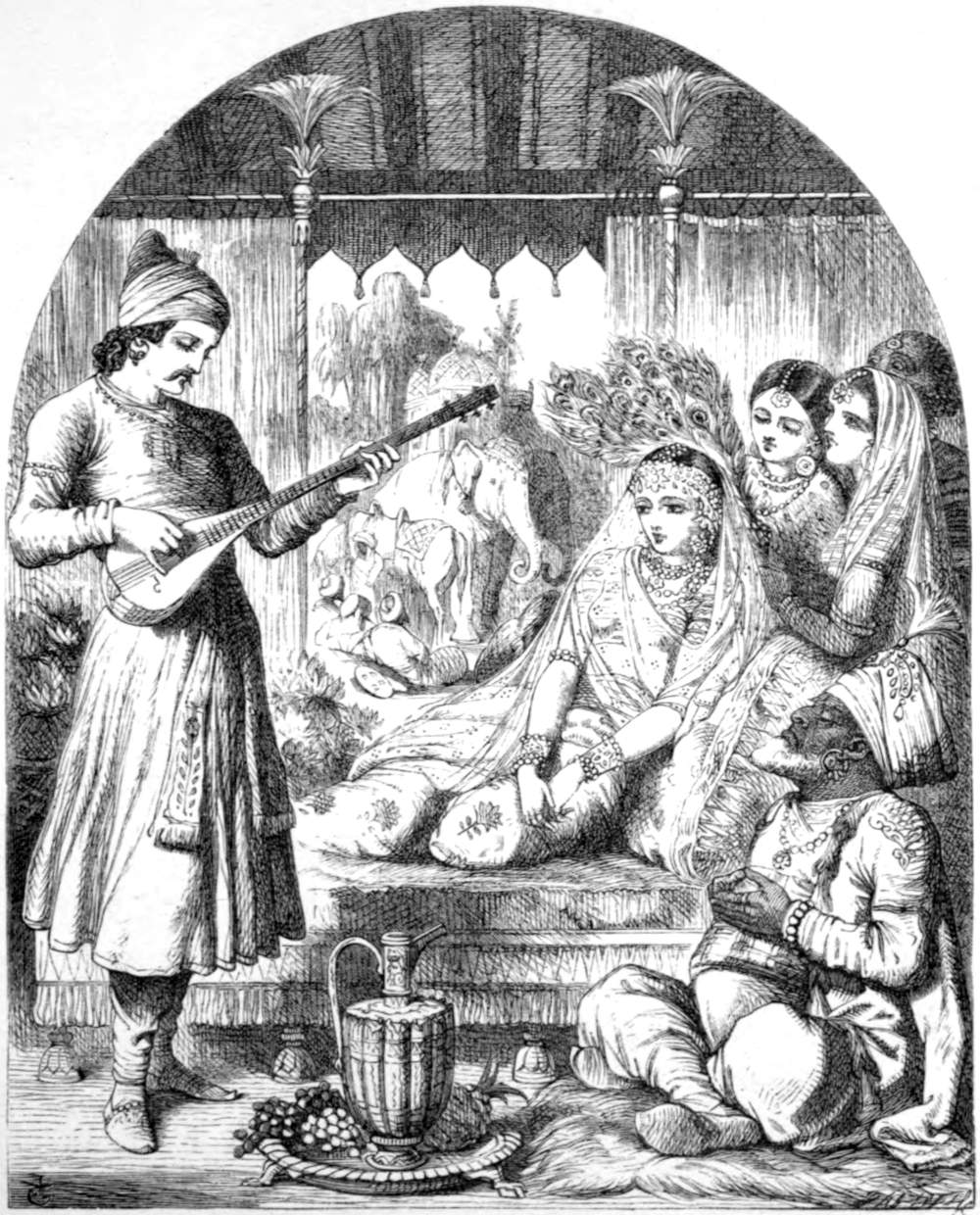
In the eleventh year of the reign of Aurungzebe, Abdalla, King of the Lesser Bucharia, a lineal descendant from the Great Zingis, having abdicated the throne in favour of his son, set out on a pilgrimage to the Shrine of the Prophet; and, passing into India through the delightful valley of Cashmere, rested for a short time at 2Delhi on his way. He was entertained by Aurungzebe in a style of magnificent hospitality, worthy alike of the visitor and the host, and was afterwards escorted with the same splendour to Surat, where he embarked for Arabia.[1] During the stay of the Royal Pilgrim at Delhi, a marriage was agreed upon between the Prince, his son, and the youngest daughter of the emperor, Lalla Rookh;[2]—a Princess described by the Poets of her time as more beautiful than Leila,[3] Shirine,[4] Dewildé,[5] or any of those heroines whose names and loves embellish the songs of Persia and Hindostan. It was intended that the nuptials should be celebrated at Cashmere; where the young King, as soon as the cares of empire would permit, was to meet, for the first time, his lovely bride, and, after a few months’ repose in that enchanting valley, conduct her over the snowy hills into Bucharia.
The day of Lalla Rookh’s departure from Delhi was as splendid as sunshine and pageantry could make it. The bazaars and baths were all covered with the richest tapestry; hundreds of gilded barges upon the Jumna floated with their banners shining in the water; while through the streets groups of beautiful children went strewing the most delicious flowers around, as in that Persian festival called the Scattering of the Roses;[6] till every part of the city was as fragrant as if a caravan 3of musk from Khoten had passed through it. The Princess, having taken leave of her kind father, who at parting hung a cornelian of Yemen round her neck, on which was inscribed a verse from the Koran, and having sent a considerable present to the Fakirs, who kept up the Perpetual Lamp in her sister’s tomb, meekly ascended the palankeen prepared for her; and, while Aurungzebe stood to take a last look from his balcony, the procession moved slowly on the road to Lahore.
Seldom had the Eastern world seen a cavalcade so superb. From the gardens in the suburbs to the Imperial palace, it was one unbroken line of splendour. The gallant appearance of the Rajahs and Mogul Lords, distinguished by those insignia of the Emperor’s favour,[7] the feathers of the egret of Cashmere in their turbans, and the small silver-rimmed kettledrums at the bows of their saddles;—the costly armour of their cavaliers, who vied, on this occasion, with the guards of the great Keder Khan,[8] in the brightness of their silver battle-axes and the massiness of their maces of gold;—the glittering of the gilt pine-apples[9] on the tops of the palankeens;—the embroidered trappings of the elephants, bearing on their backs small turrets, in the shape of little antique temples, within which the Ladies of Lalla Rookh lay as it were enshrined;—the rose-coloured veils of the 4Princess’s own sumptuous litter,[10] at the front of which a fair young female slave sat fanning her through the curtains, with feathers of the Argus pheasant’s wing;[11]—and the lovely troop of Tartarian and Cashmerian maids of honour, whom the young King had sent to accompany his bride, and who rode on each side of the litter, upon small Arabian horses:—all was brilliant, tasteful, and magnificent, and pleased even the critical and fastidious Fadladeen, Great Nazir or Chamberlain of the Haram, who was borne in his palankeen immediately after the Princess, and considered himself not the least important personage of the pageant.
Fadladeen was a judge of everything,—from the pencilling of a Circassian’s eyelids to the deepest questions of science and literature; from the mixture of a conserve of rose-leaves to the composition of an epic poem: and such influence had his opinion upon the various tastes of the day, that all the cooks and poets of Delhi stood in awe of him. His political conduct and opinions were founded upon that line of Sadi,—“Should the Prince at noon-day say, It is night, declare that you behold the moon and stars.”—And his zeal for religion; of which Aurungzebe was a munificent protector,[12] was about as disinterested as that of the goldsmith who fell in love with the diamond eyes of the Idol of Jaghernaut.[13]
5During the first days of their journey, Lalla Rookh, who had passed all her life within the shadow of the Royal Gardens of Delhi,[14] found enough in the beauty of the scenery through which they passed to interest her mind, and delight her imagination; and when at evening, or in the heat of the day, they turned off from the high road to those retired and romantic places which had been selected for her encampments, sometimes on the banks of a small rivulet, as clear as the waters of the Lake of Pearl;[15] sometimes under the sacred shade of a Banyan tree, from which the view opened upon a glade covered with antelopes; and often in those hidden, embowered spots, described by one from the Isles of the West,[16] as “places of melancholy, delight, and safety, where all the company around was wild peacocks and turtle-doves;”—she felt a charm in these scenes, so lovely and so new to her, which, for a time, made her indifferent to every other amusement. But Lalla Rookh was young, and the young love variety; nor could the conversation of her Ladies and the great Chamberlain, Fadladeen, (the only persons, of course, admitted to her pavilion,) sufficiently enliven those many vacant hours, which were devoted neither to the pillow nor the palankeen. There was a little Persian slave who sung sweetly to the Vina, and who, now and then, lulled the Princess to sleep with the ancient ditties of her country, about the loves of Wamak and 6Ezra,[17] the fair-haired Zal and his mistress Rodahver;[18] not forgetting the combat of Rustam with the terrible White Demon.[19] At other times she was amused by those graceful dancing-girls of Delhi, who had been permitted by the Bramins of the Great Pagoda to attend her, much to the horror of the good Mussulman Fadladeen, who could see nothing graceful or agreeable in idolaters, and to whom the very tinkling of their golden anklets[20] was an abomination.
But these and many other diversions were repeated till they lost all their charm, and the nights and noondays were beginning to move heavily, when, at length, it was recollected that, among the attendants sent by the bridegroom, was a young poet of Cashmere, much celebrated throughout the valley for his manner of reciting the Stories of the East, on whom his Royal Master had conferred the privilege of being admitted to the pavilion of the Princess, that he might help to beguile the tediousness of the journey by some of his most agreeable recitals. At the mention of a poet, Fadladeen elevated his critical eyebrows, and, having refreshed his faculties with a dose of that delicious opium[21] which is distilled from the black poppy of the Thebais, gave orders for the minstrel to be forthwith introduced into the presence.
7The Princess, who had once in her life seen a poet from behind the screens of gauze in her Father’s hall, and had conceived from that specimen no very favourable ideas of the Caste, expected but little in this new exhibition to interest her;—she felt inclined, however, to alter her opinion on the very first appearance of Feramorz. He was a youth about Lalla Rookh’s own age, and graceful as that idol of women, Crishna,[22]—such as he appears to their young imaginations, heroic, beautiful, breathing music from his very eyes, and exalting the religion of his worshippers into love. His dress was simple, yet not without some marks of costliness; and the ladies of the Princess were not long in discovering that the cloth, which encircled his high Tartarian cap, was of the most delicate kind that the shawl-goats of Tibet supply.[23] Here and there, too, over his vest, which was confined by a flowered girdle of Kashan, hung strings of fine pearl, disposed with an air of studied negligence:—nor did the exquisite embroidery of his sandals escape the observation of these fair critics; who, however they might give way to Fadladeen upon the unimportant topics of religion and government, had the spirit of martyrs in every thing relating to such momentous matters as jewels and embroidery.
For the purpose of relieving the pauses of recitation by music, the young Cashmerian held in his hand a kitar;—such 8as, in old times, the Arab maids of the West used to listen to by moonlight in the gardens of the Alhambra—and, having premised, with much humility, that the story he was about to relate was founded on the adventures of that Veiled Prophet of Khorassan,[24] who, in the year of the Hegira 163, created such alarm throughout the Eastern Empire, made an obeisance to the Princess, and thus began:—
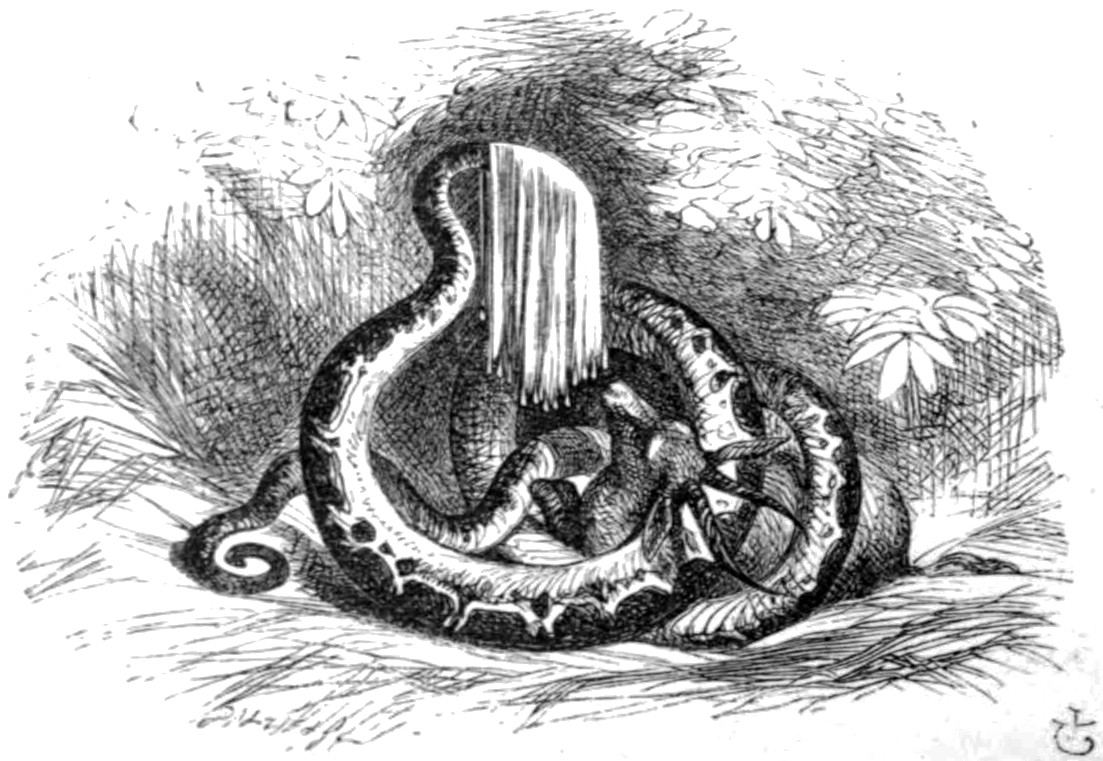
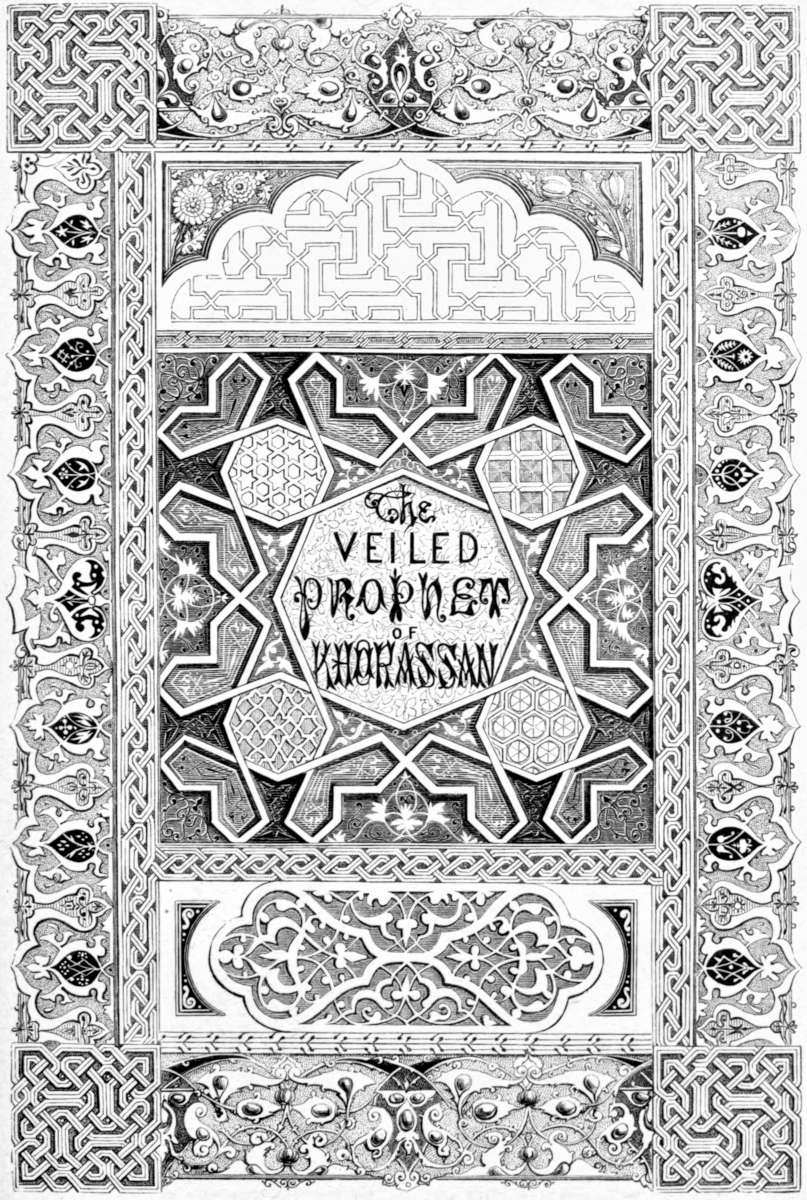
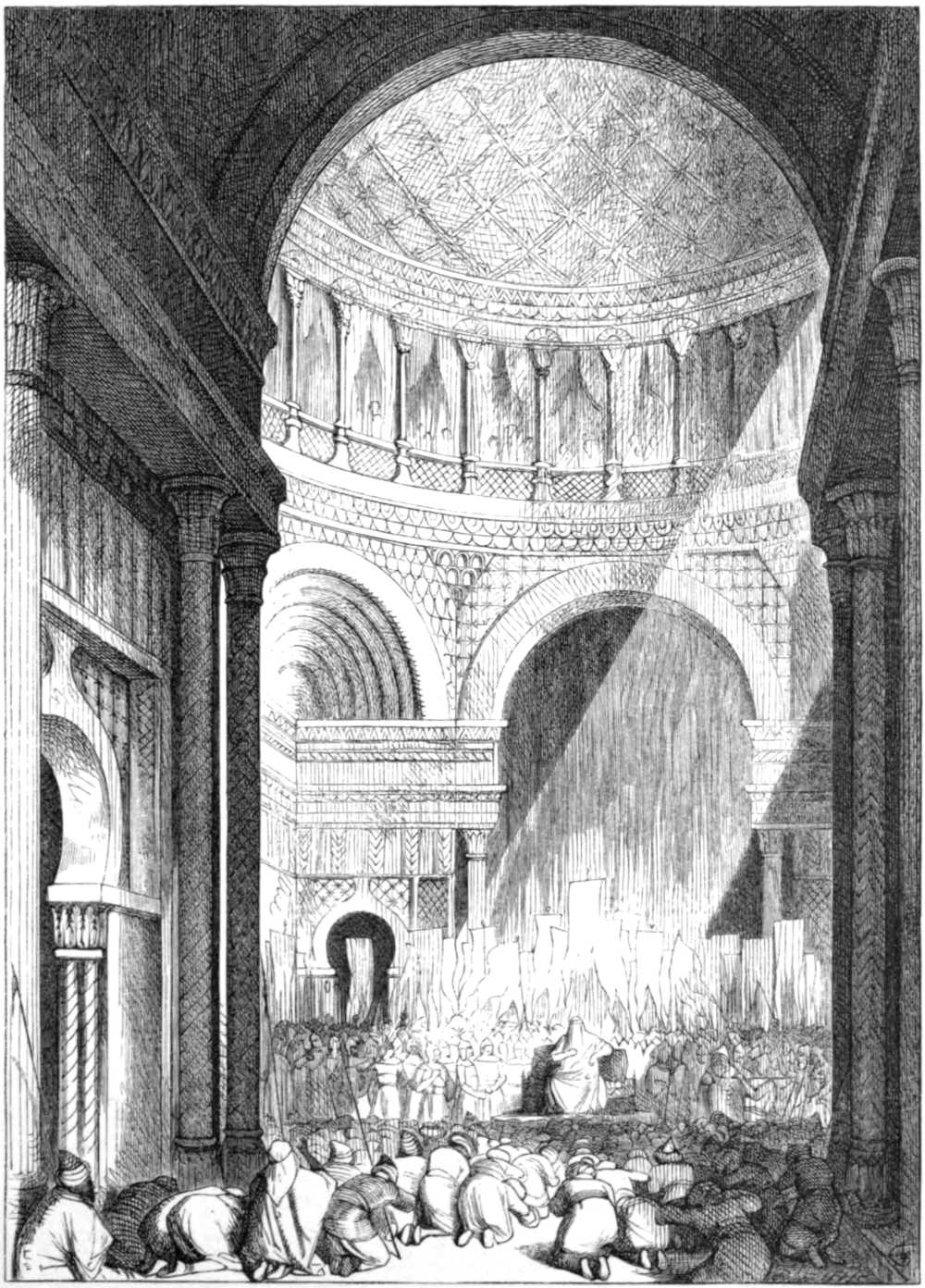
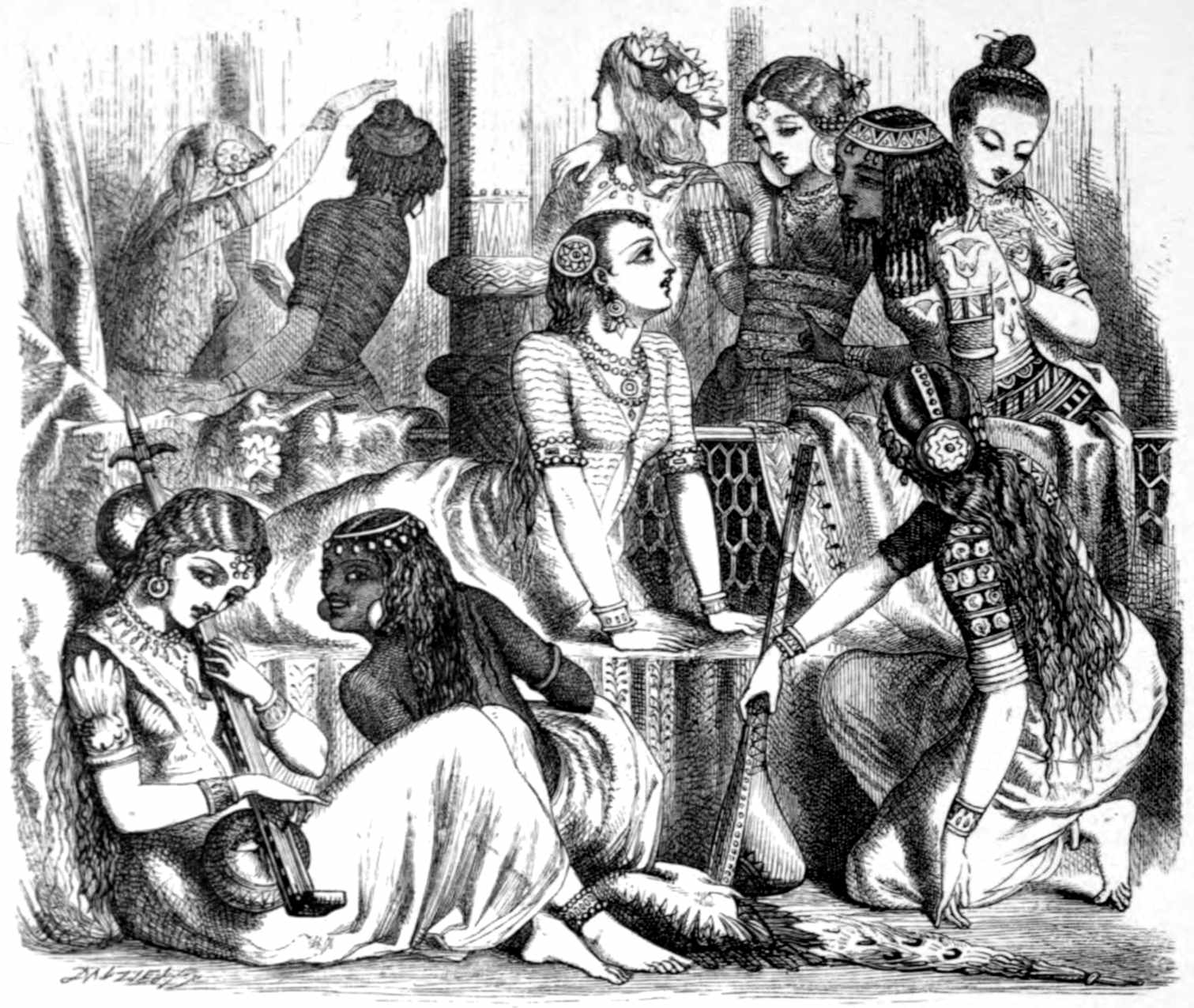
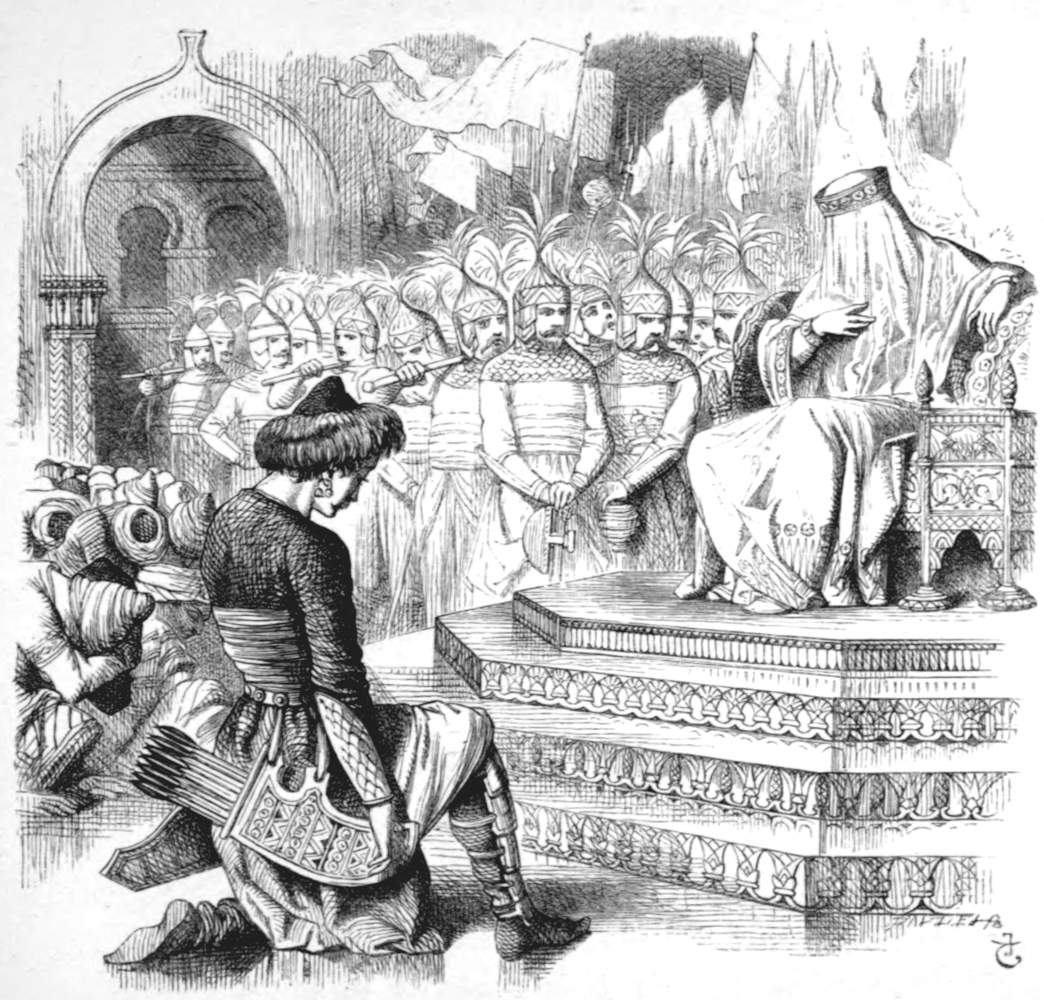
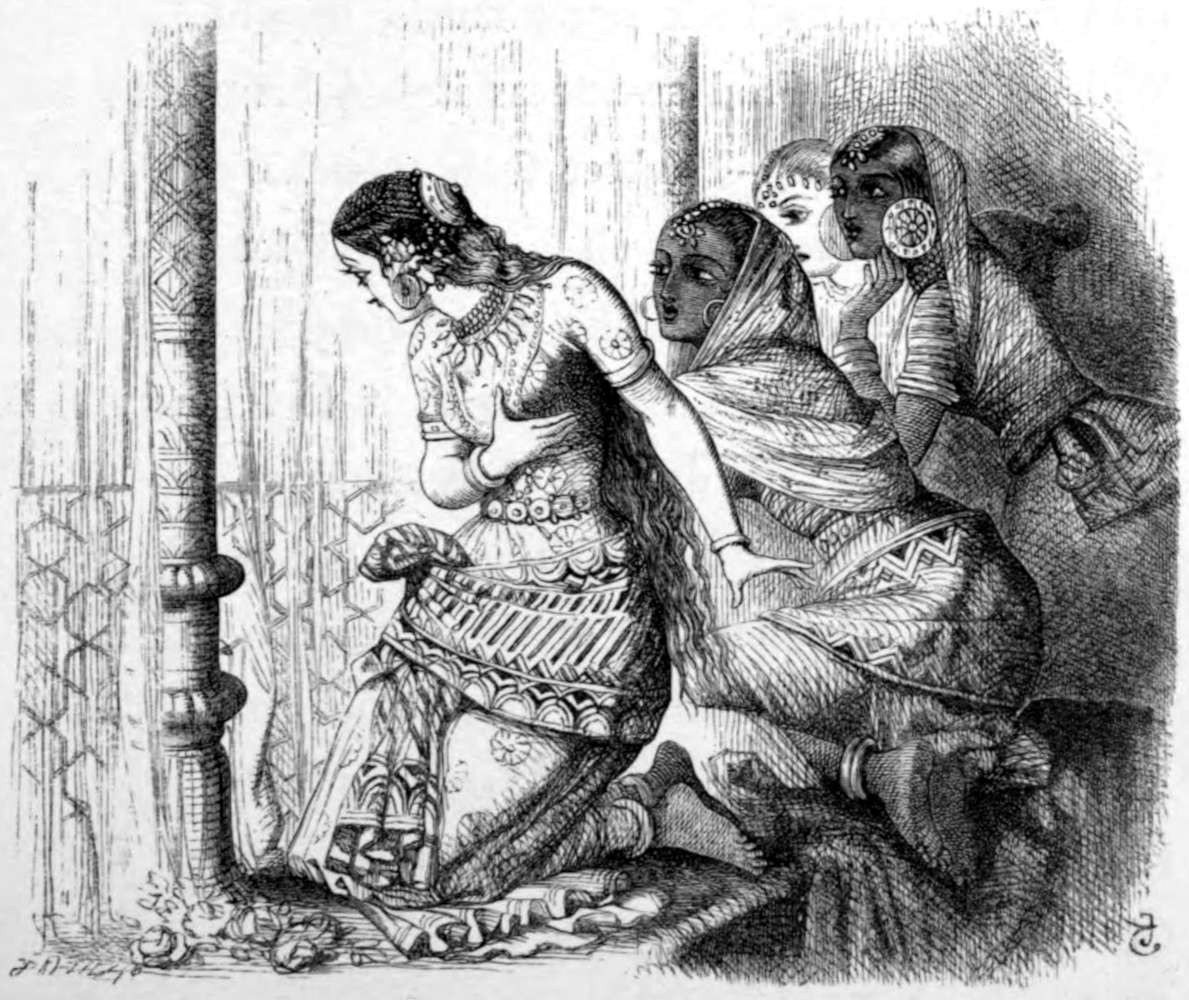
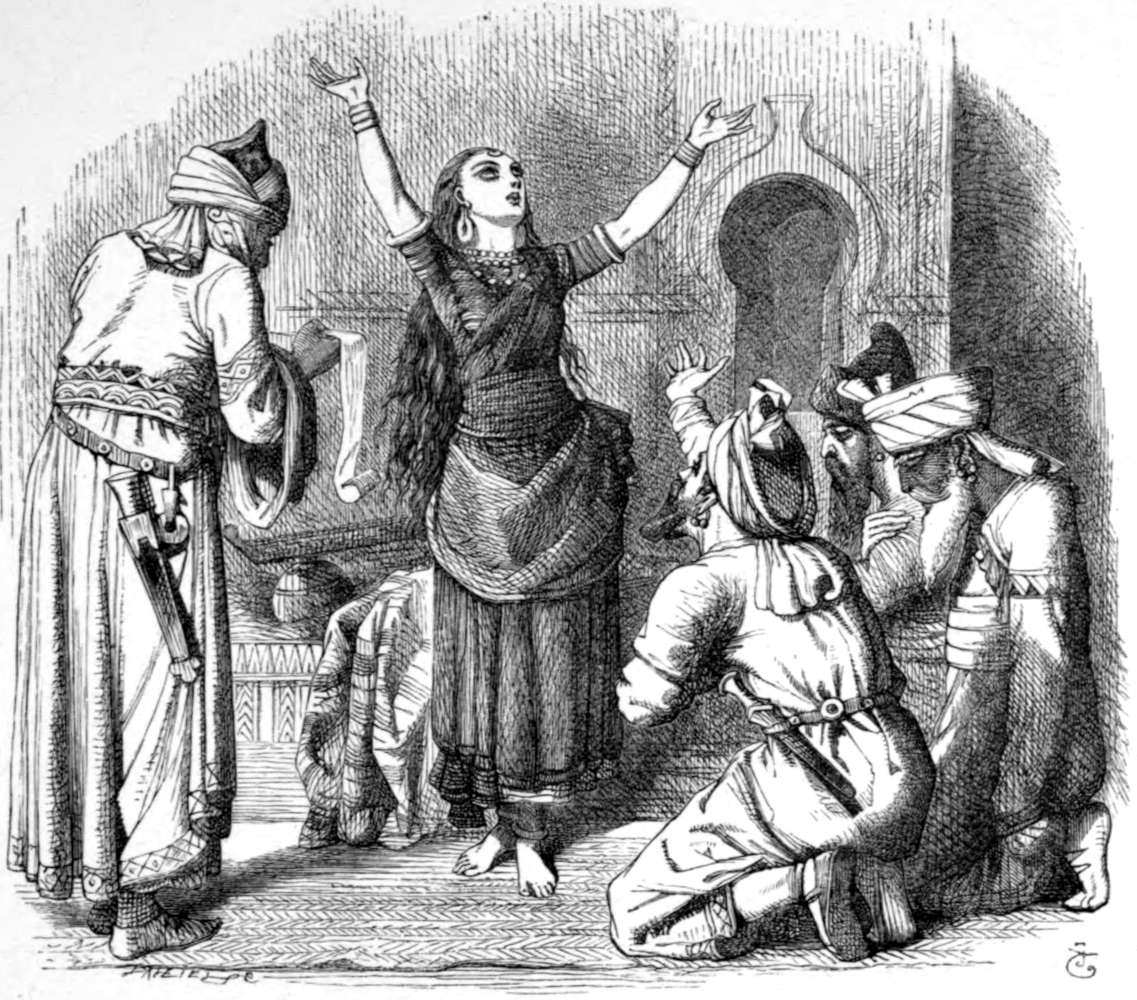
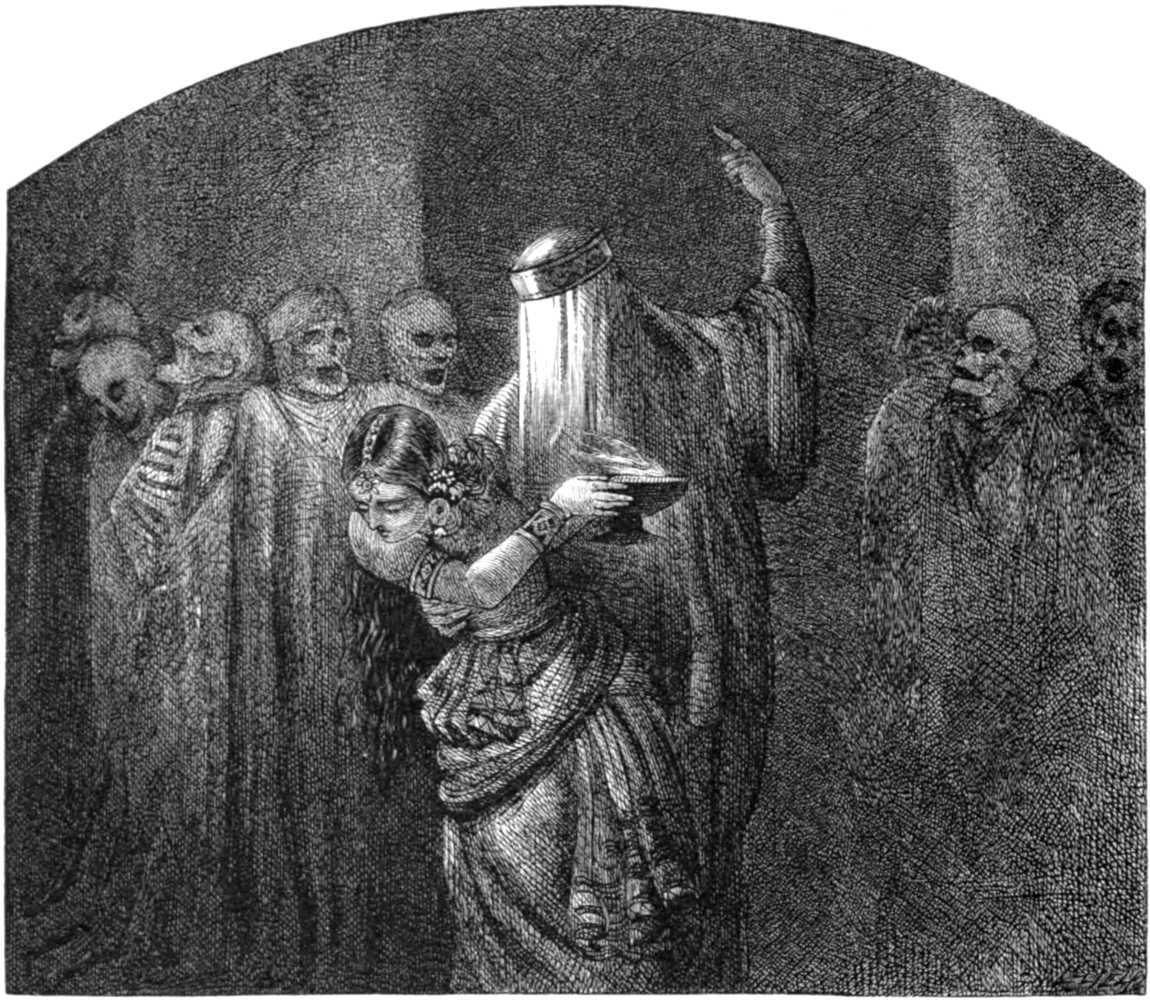
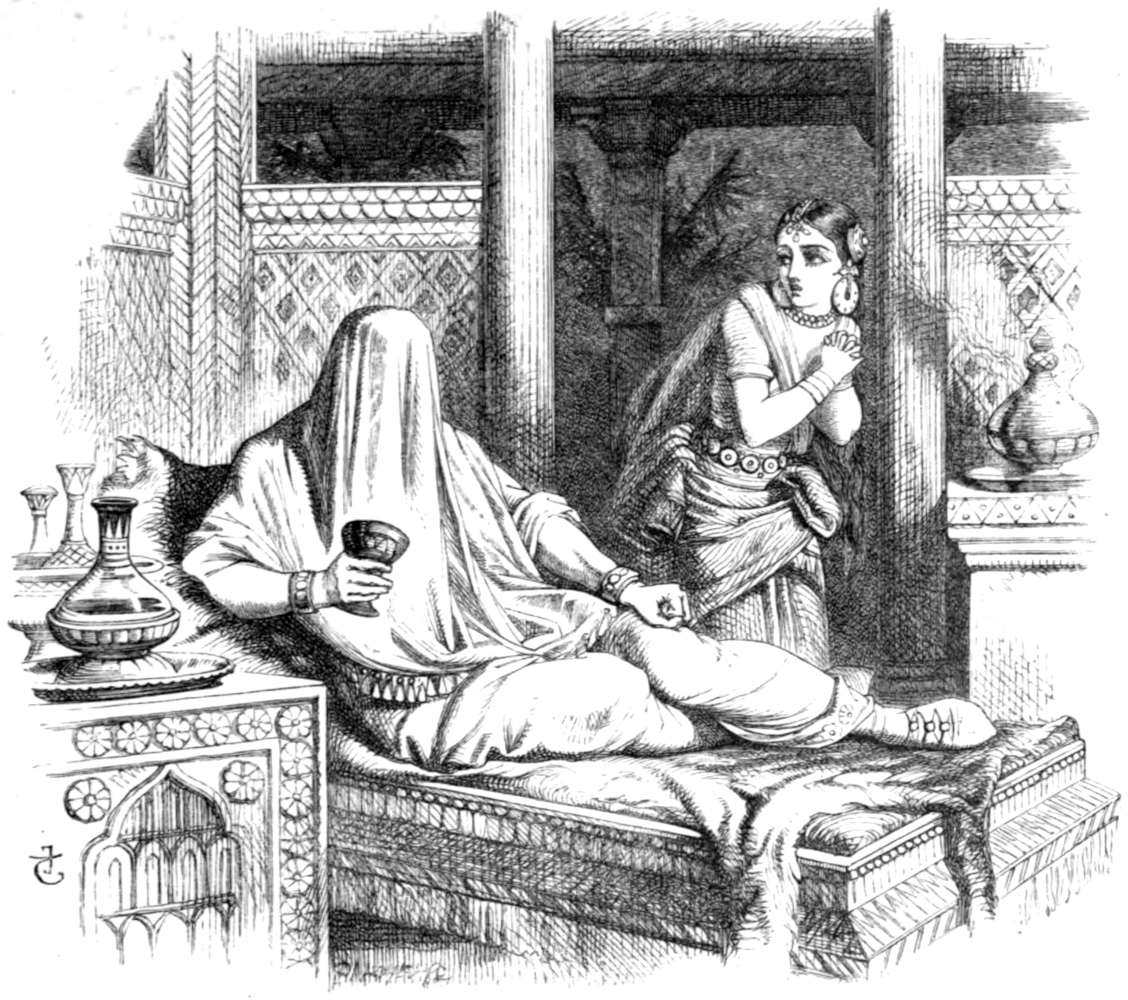
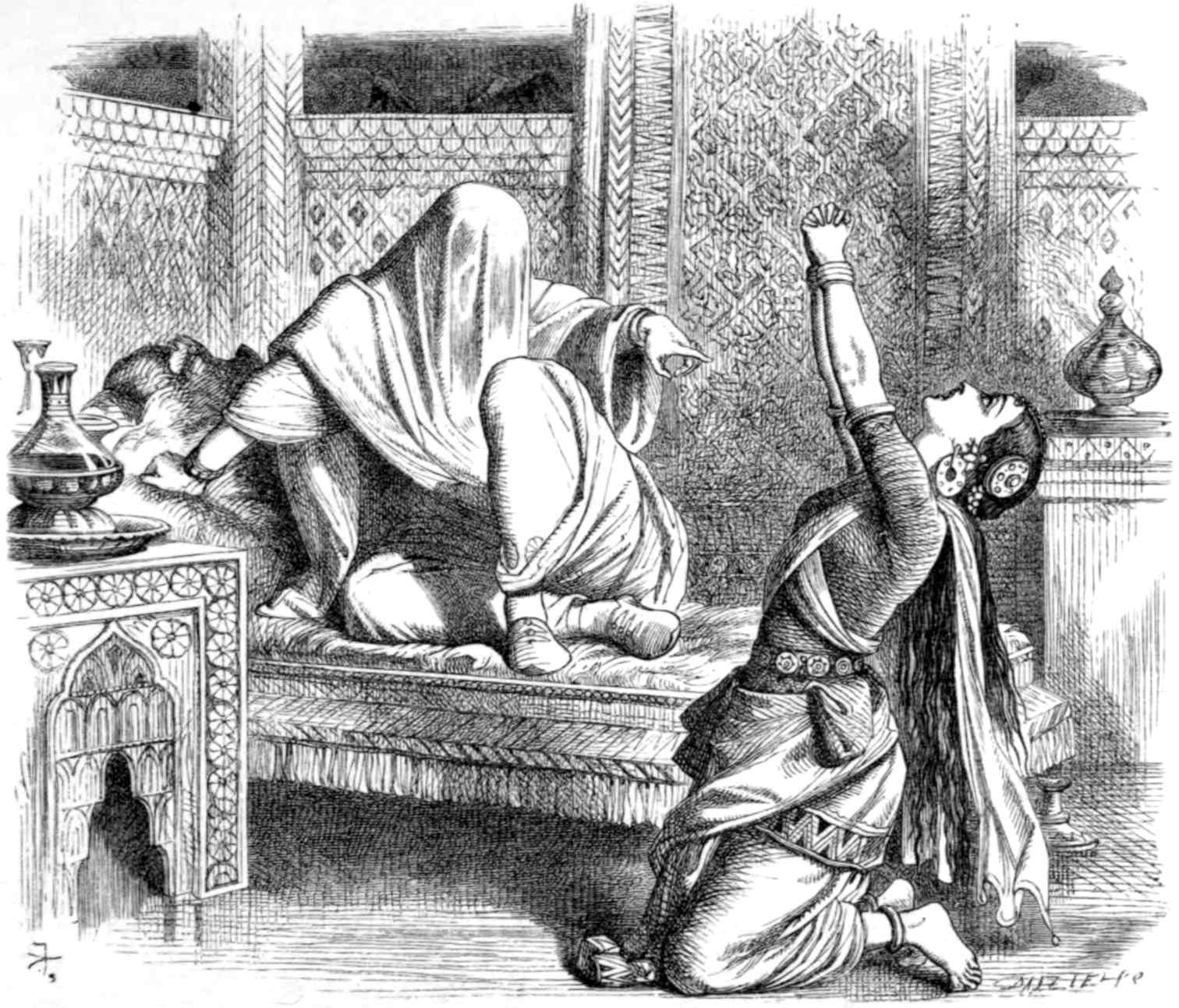
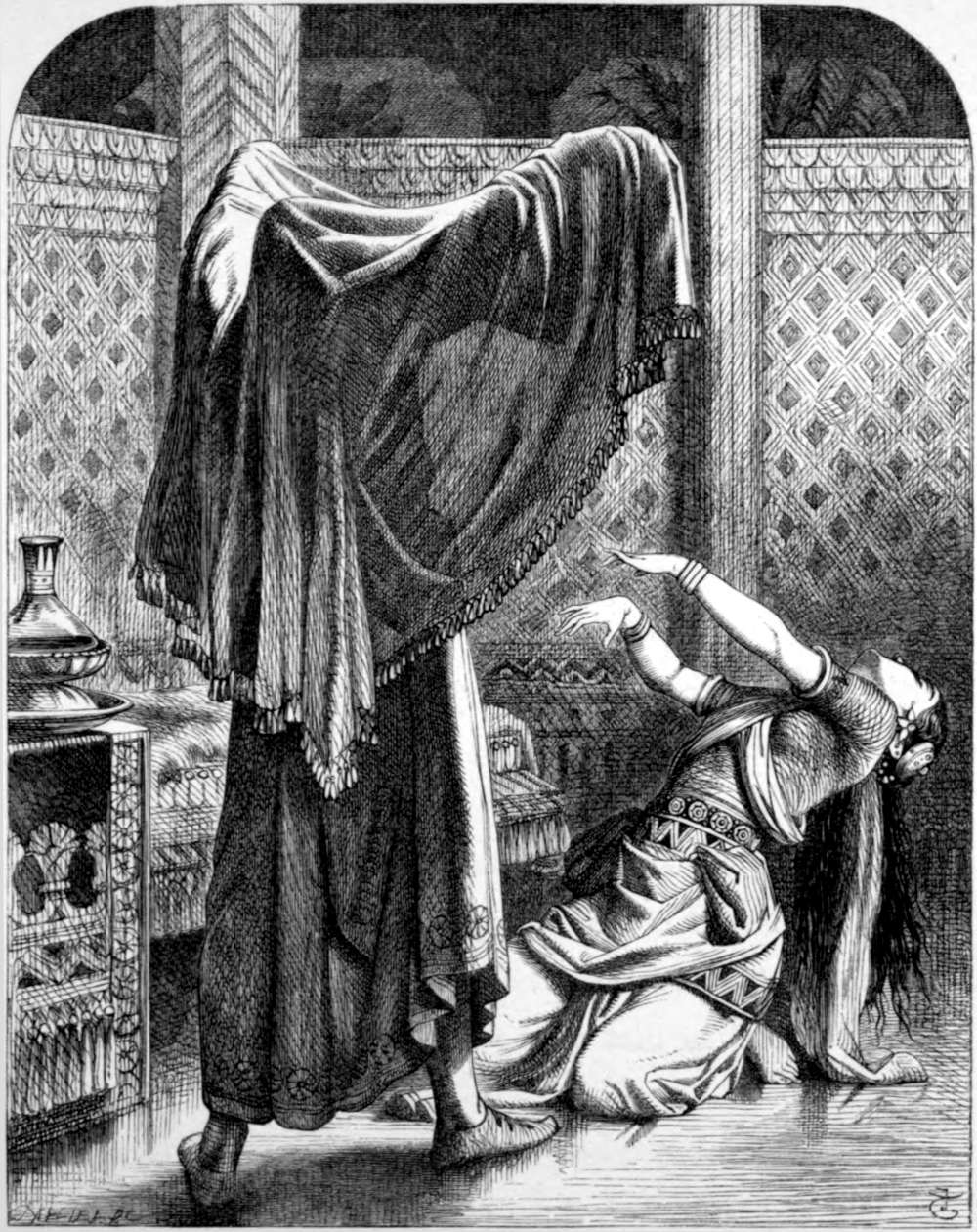
48On their arrival, next night, at the place of encampment, they were surprised and delighted to find the groves all around illuminated; some artists of Yamtcheou[58] having been sent on previously for the purpose. On each side of the green alley, which led to the Royal Pavilion, artificial sceneries of bamboo-work[59] were erected, representing arches, minarets, and towers, from which hung thousands of silken lanterns, painted by the most delicate pencils of Canton.—Nothing could be more beautiful than the leaves of the mango-trees and acacias, shining in the light of the bamboo-scenery, which shed a lustre round as soft as that of the nights of Peristan.
Lalla Rookh, however, who was too much occupied by the sad story of Zelica and her lover, to give a thought to anything else, except, perhaps, him who related it, hurried on through this scene of splendour to her pavilion,—greatly to the mortification of the poor artists of Yamtcheou,—and was followed with equal rapidity by the Great Chamberlain, cursing, as he went, that ancient Mandarin, whose parental anxiety in lighting 49up the shores of the lake, where his beloved daughter had wandered and been lost, was the origin of these fantastic Chinese illuminations.[60]
Without a moment’s delay, young Feramorz was introduced, and Fadladeen, who could never make up his mind as to the merits of a poet till he knew the religious sect to which he belonged, was about to ask him whether he was a Shia or a Sooni, when Lalla Rookh impatiently clapped her hands for silence, and the youth, being seated upon the musnud near her, proceeded:—
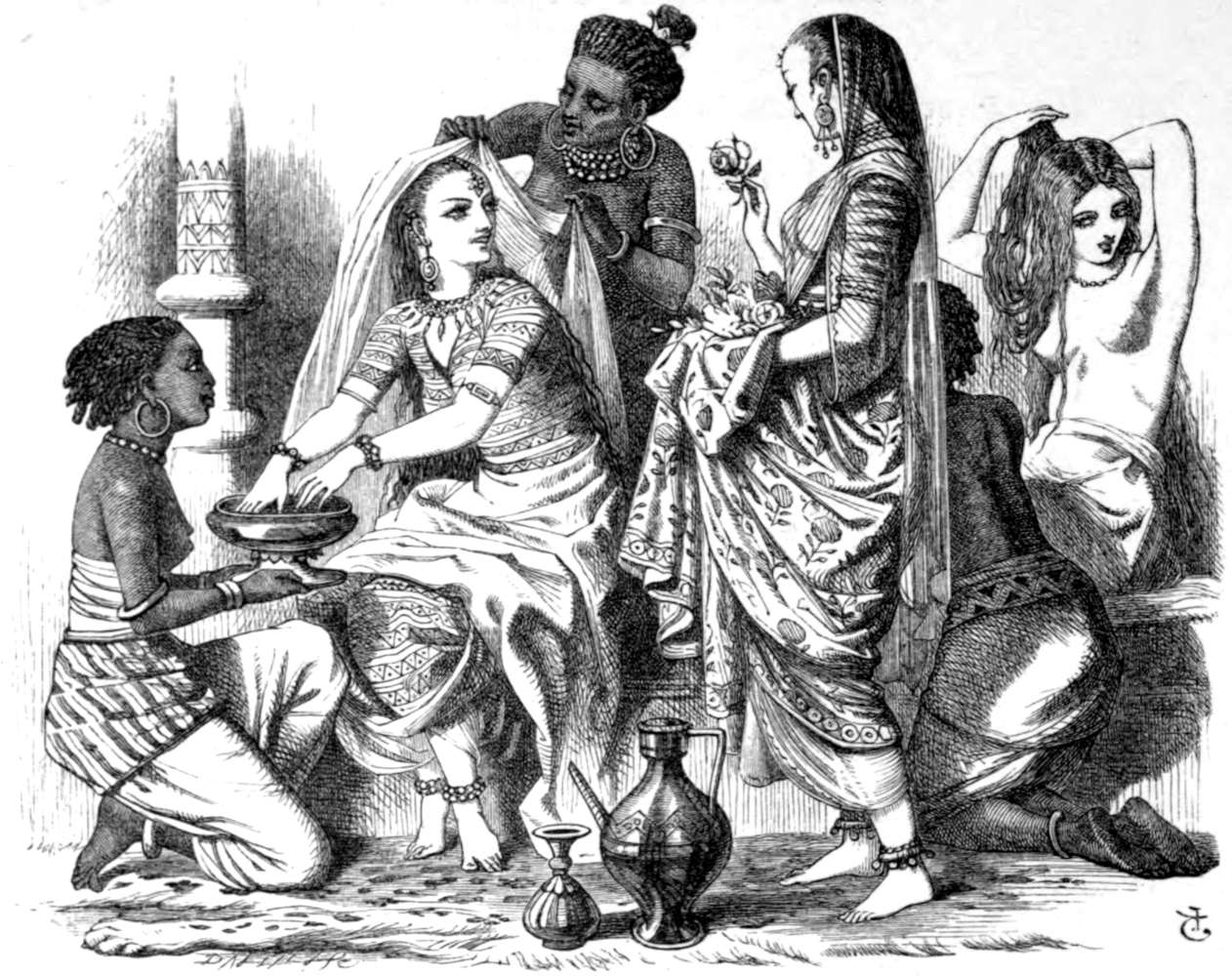
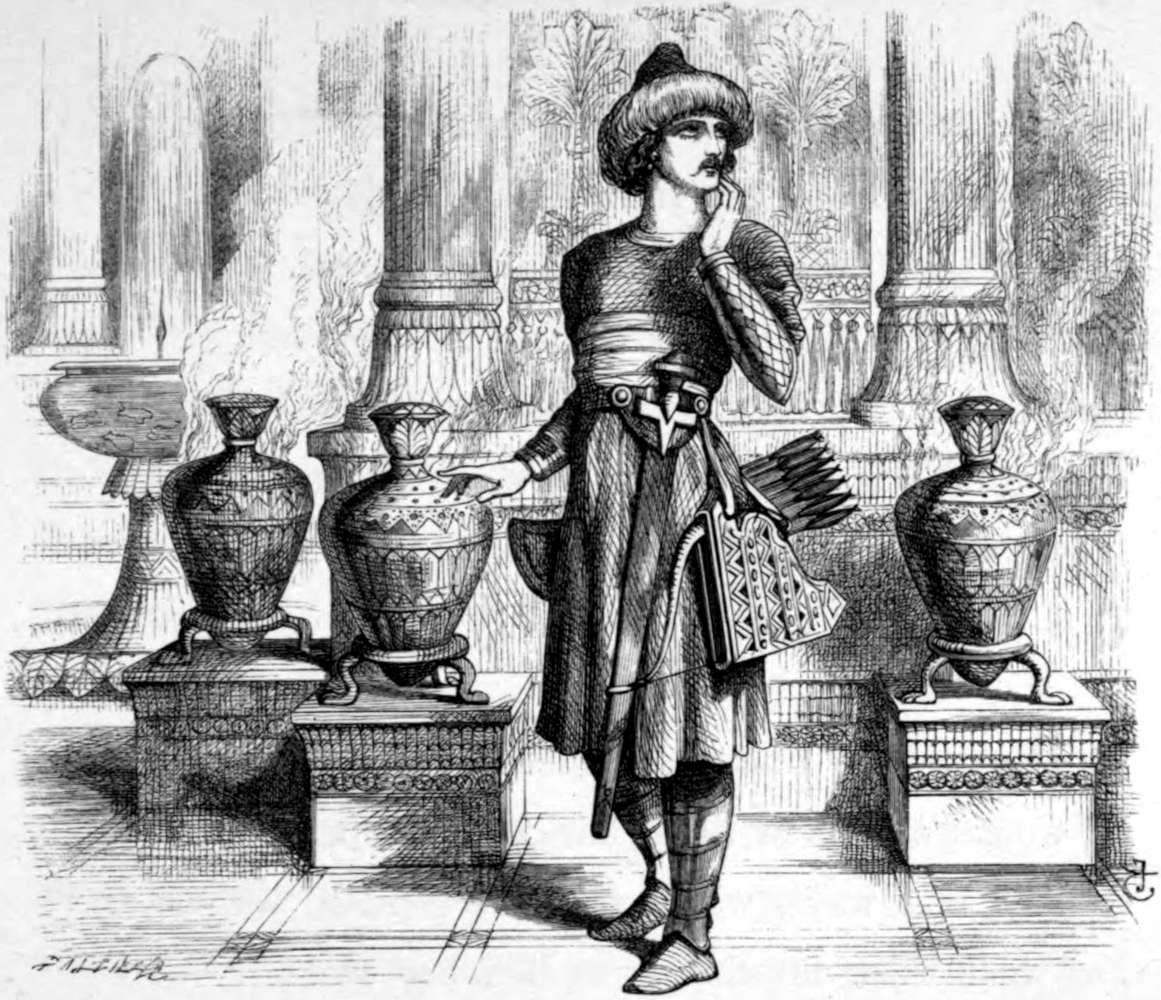
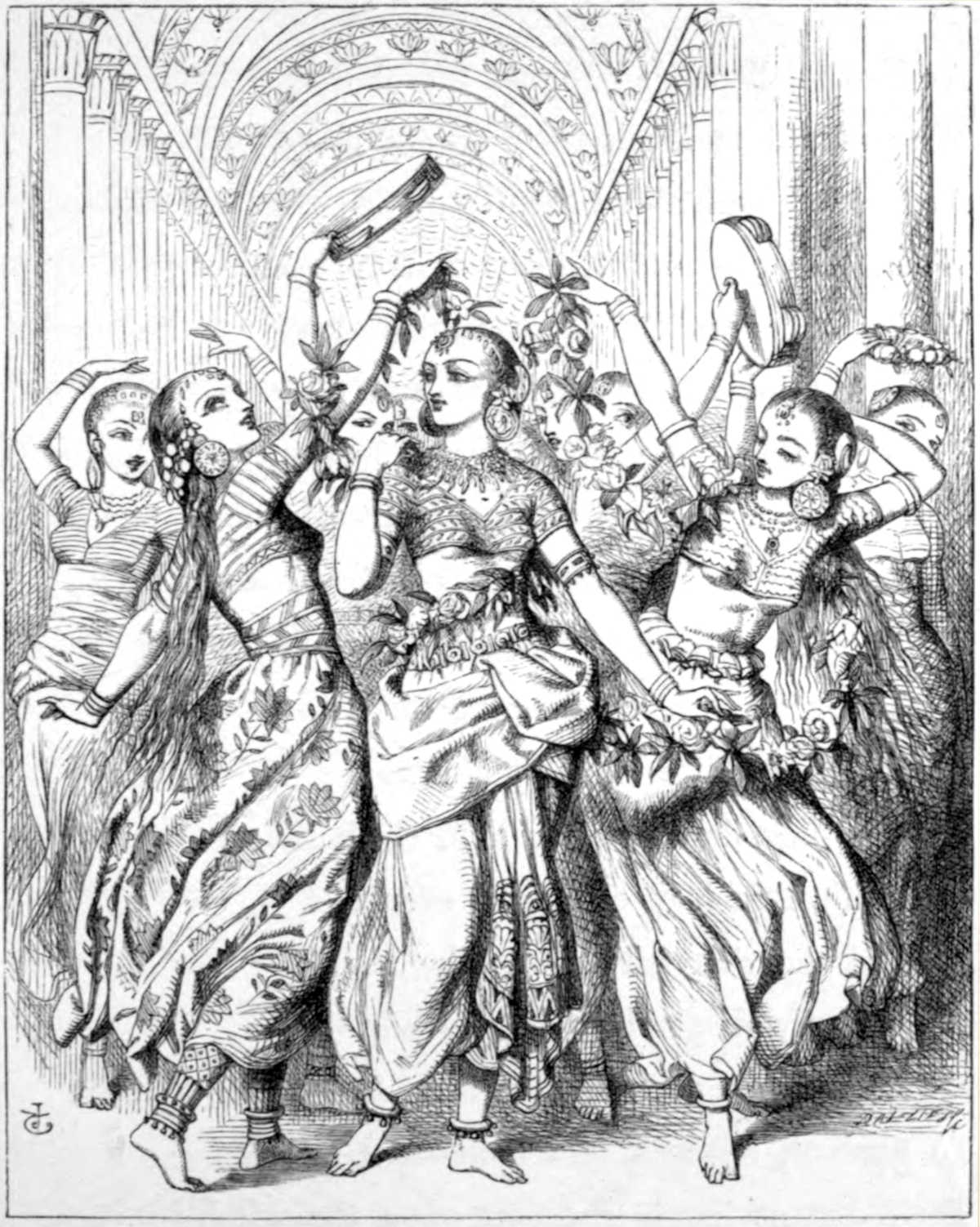
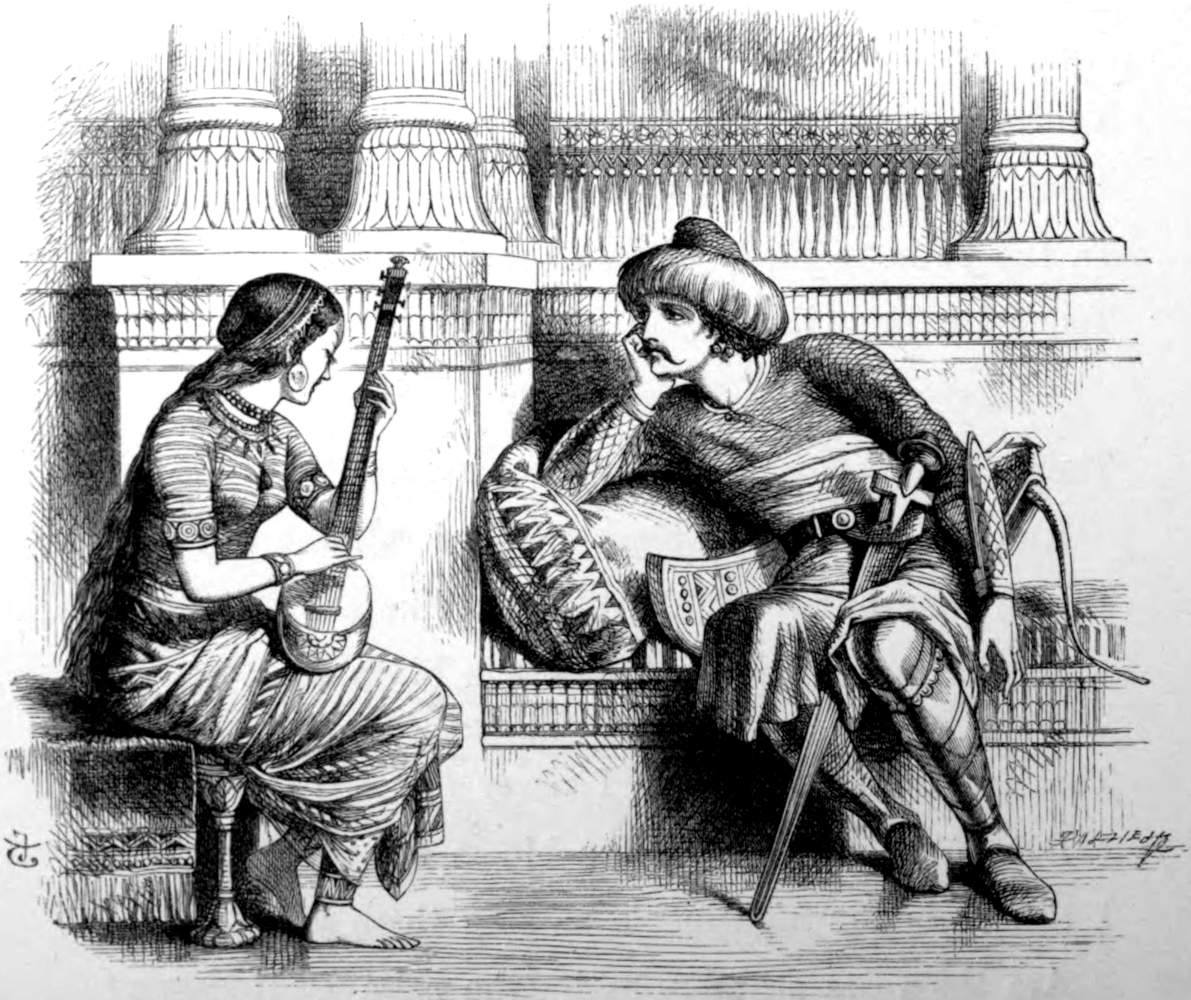
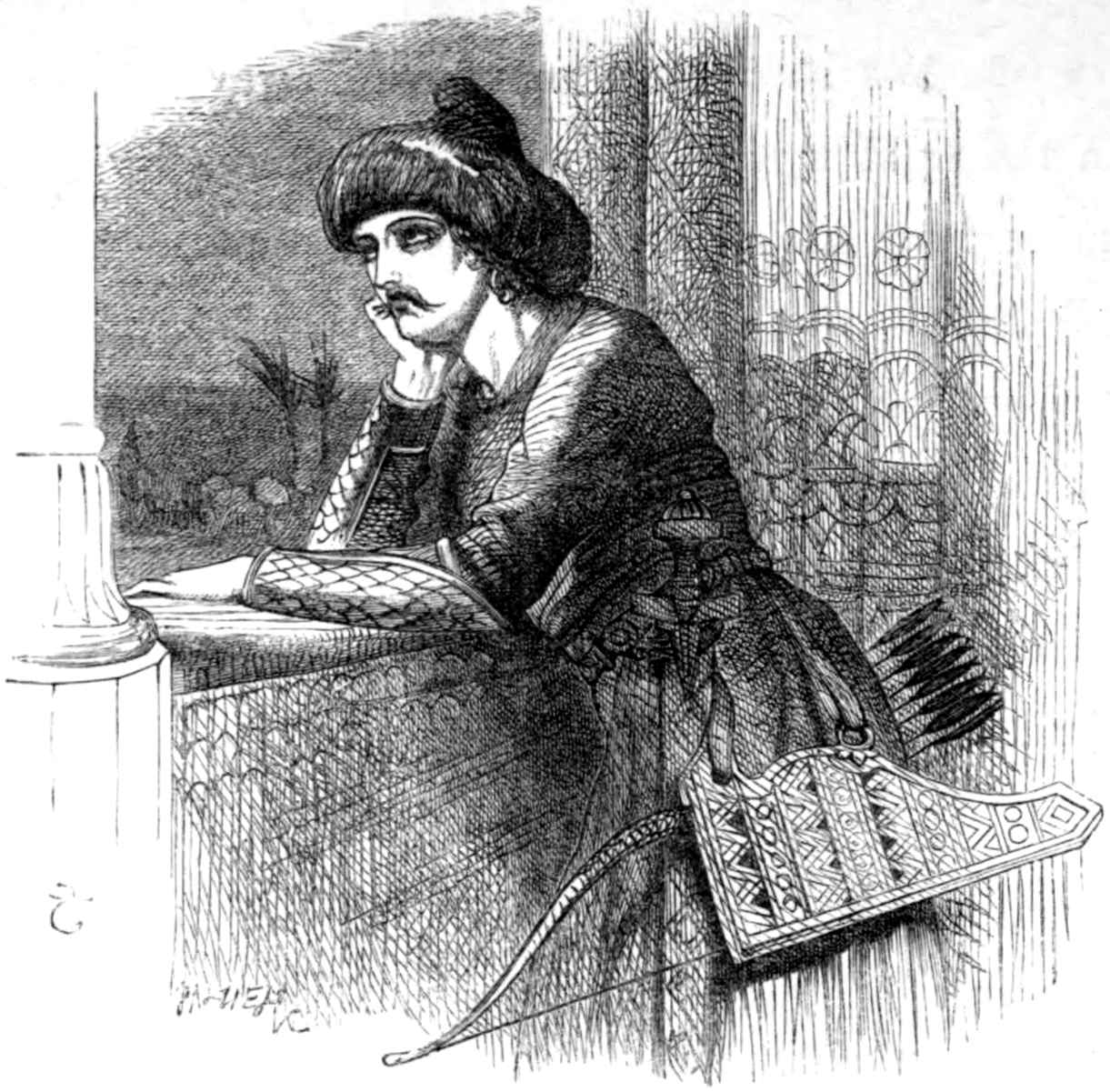
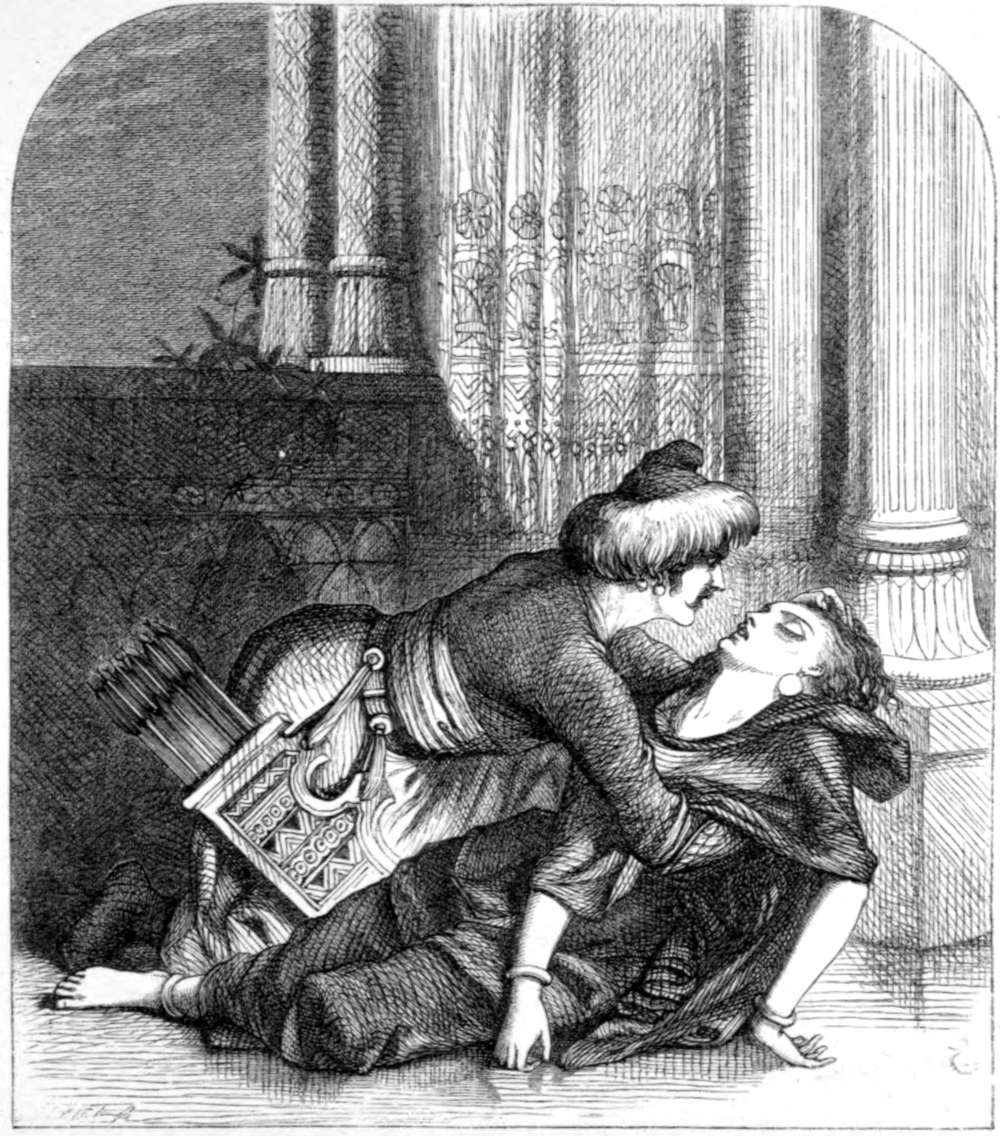
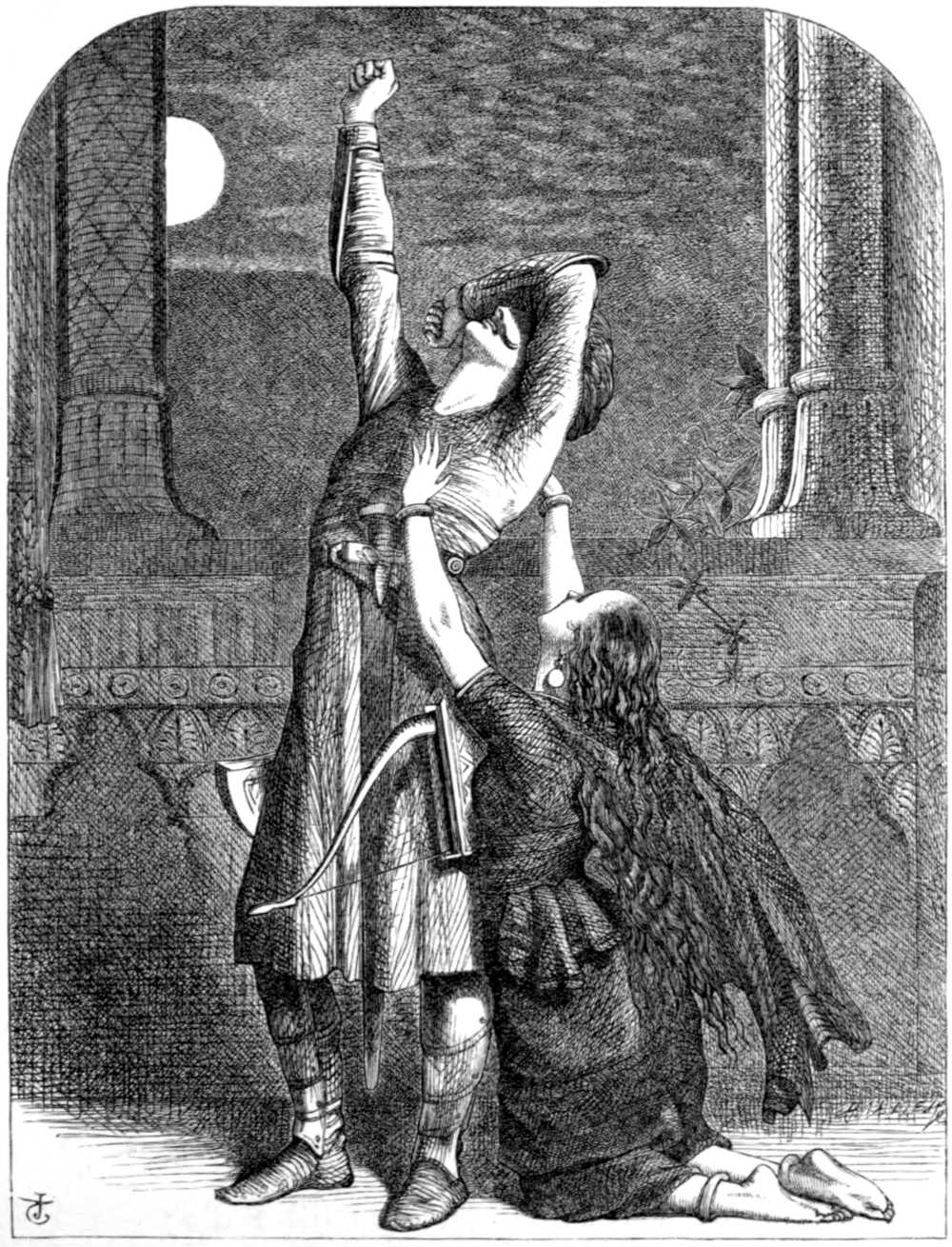
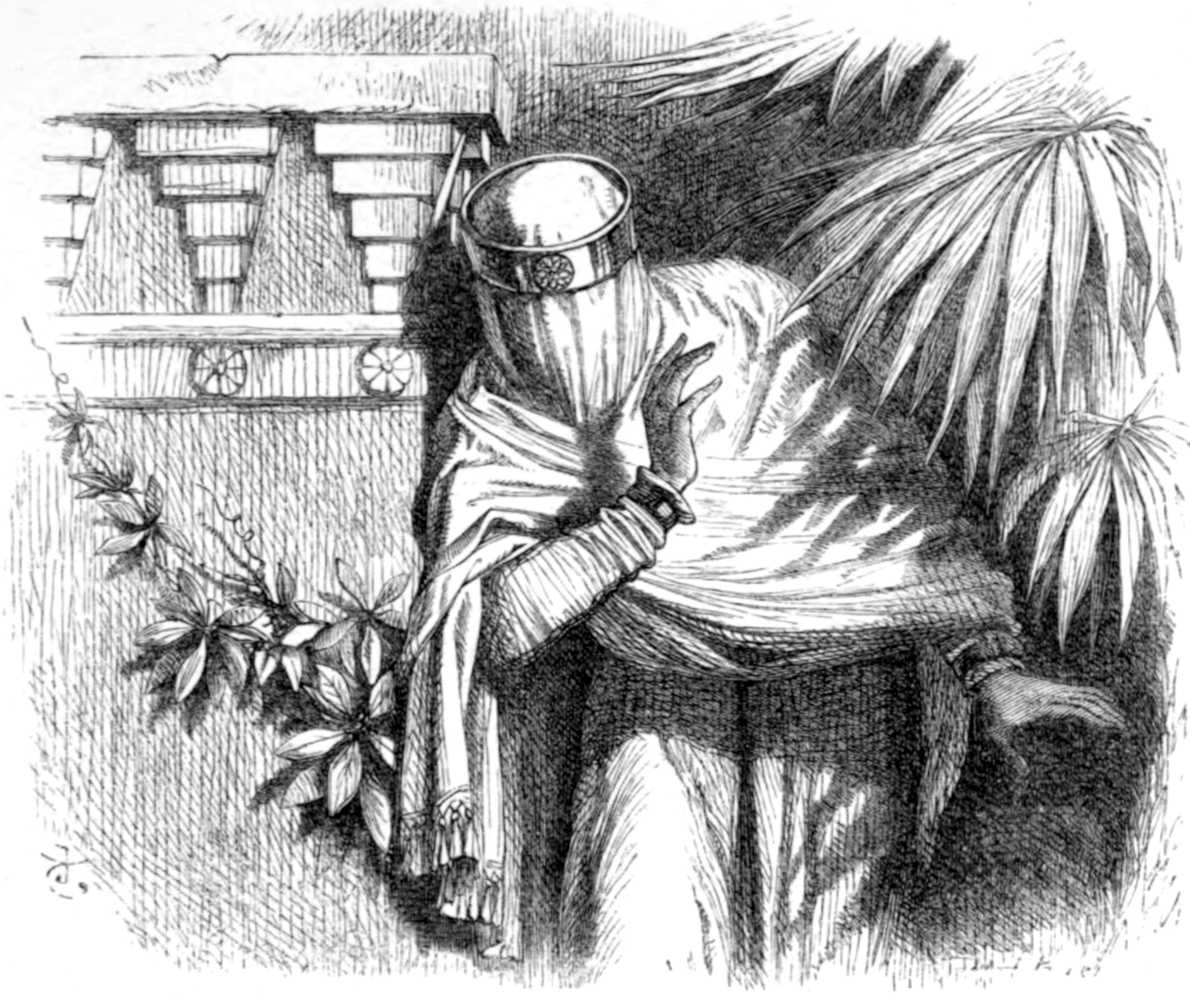
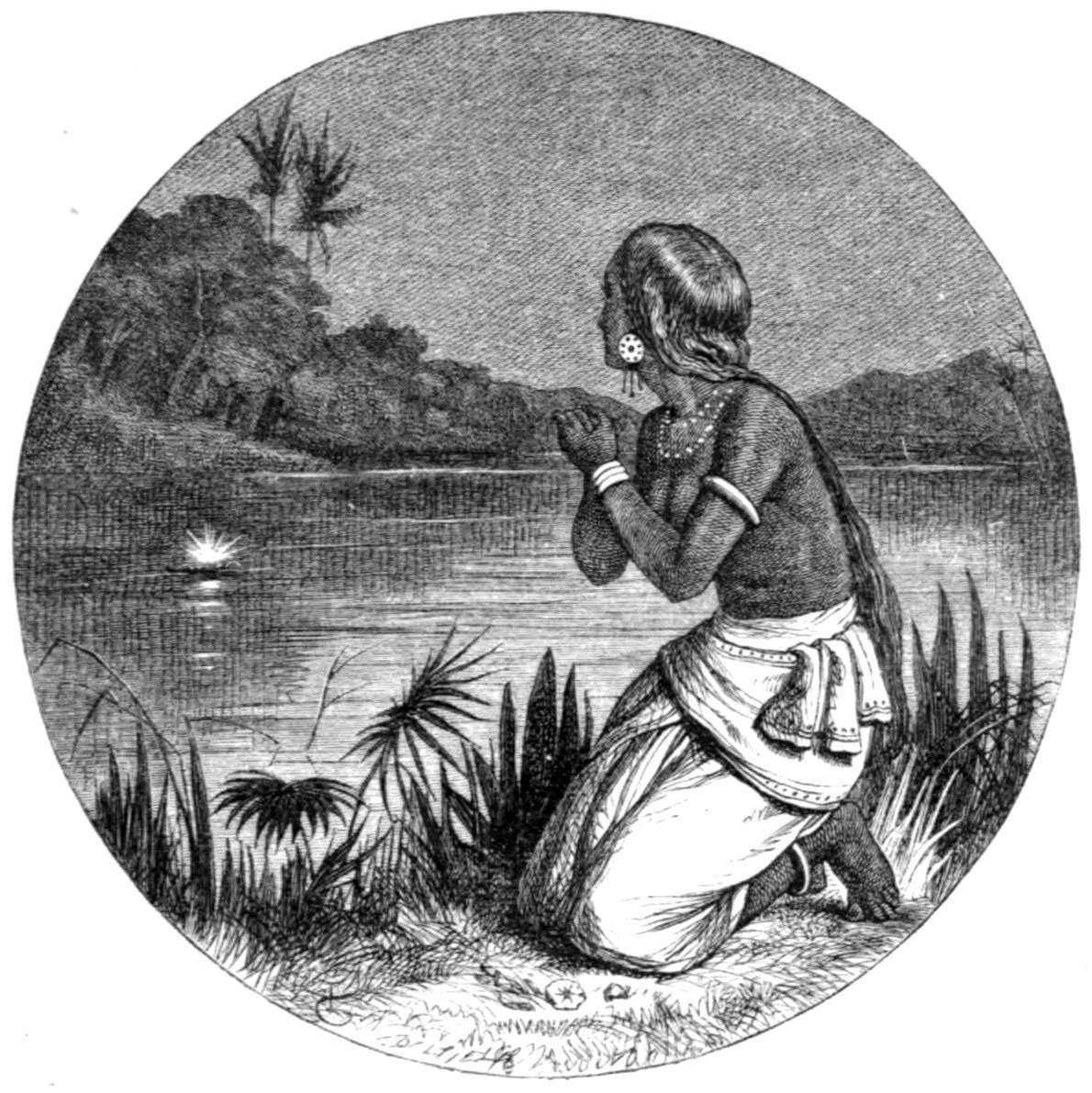
Lalla Rookh could think of nothing all day but the misery of these two young lovers. Her gaiety was gone, and she looked pensively even upon Fadladeen. She felt, too, without knowing why, a sort of uneasy pleasure in imagining that Azim must have been just such a youth as Feramorz; just as worthy to enjoy all the blessings, without any of the pangs, of that illusive passion which too often, like the sunny apples of Istkahar,[96] is all sweetness on one side, and all bitterness on the other.
82As they passed along a sequestered river after sunset, they saw a young Hindoo girl upon the bank,[97] whose employment seemed to them so strange, that they stopped their palankeens to observe her. She had lighted a small lamp, filled with oil of cocoa, and placing it in an earthen dish, adorned with a wreath of flowers, had committed it with a trembling hand to the stream; and was now anxiously watching its progress down the current, heedless of the gay cavalcade which had drawn up beside her. Lalla Rookh was all curiosity;—when one of her attendants, who had lived upon the banks of the Ganges (where this ceremony is so frequent, that often, in the dusk of the evening, the river is seen glittering all over with lights, like the Oton-tala, or Sea of Stars),[98] informed the Princess that it was the usual way, in which the friends of those who had gone on dangerous voyages offered up vows for their safe return. If the lamp sunk immediately, the omen was disastrous; but if it went shining down the stream, and continued to burn until entirely out of sight, the return of the beloved object was considered as certain.
Lalla Rookh, as they moved on, more than once looked back, to observe how the young Hindoo’s lamp proceeded; and, while she saw with pleasure that it was still unextinguished, she could not help fearing that all 83the hopes of this life were no better than that feeble light upon the river. The remainder of the journey was passed in silence. She now, for the first time, felt that shade of melancholy, which comes over the youthful maiden’s heart, as sweet and transient as her own breath upon a mirror; nor was it till she heard the lute of Feramorz, touched lightly at the door of her pavilion, that she waked from the reverie in which she had been wandering. Instantly her eyes were lighted up with pleasure; and after a few unheard remarks from Fadladeen, upon the indecorum of a poet seating himself in presence of a Princess, every thing was arranged as on the preceding evening and all listened with eagerness, while the story was thus continued:—
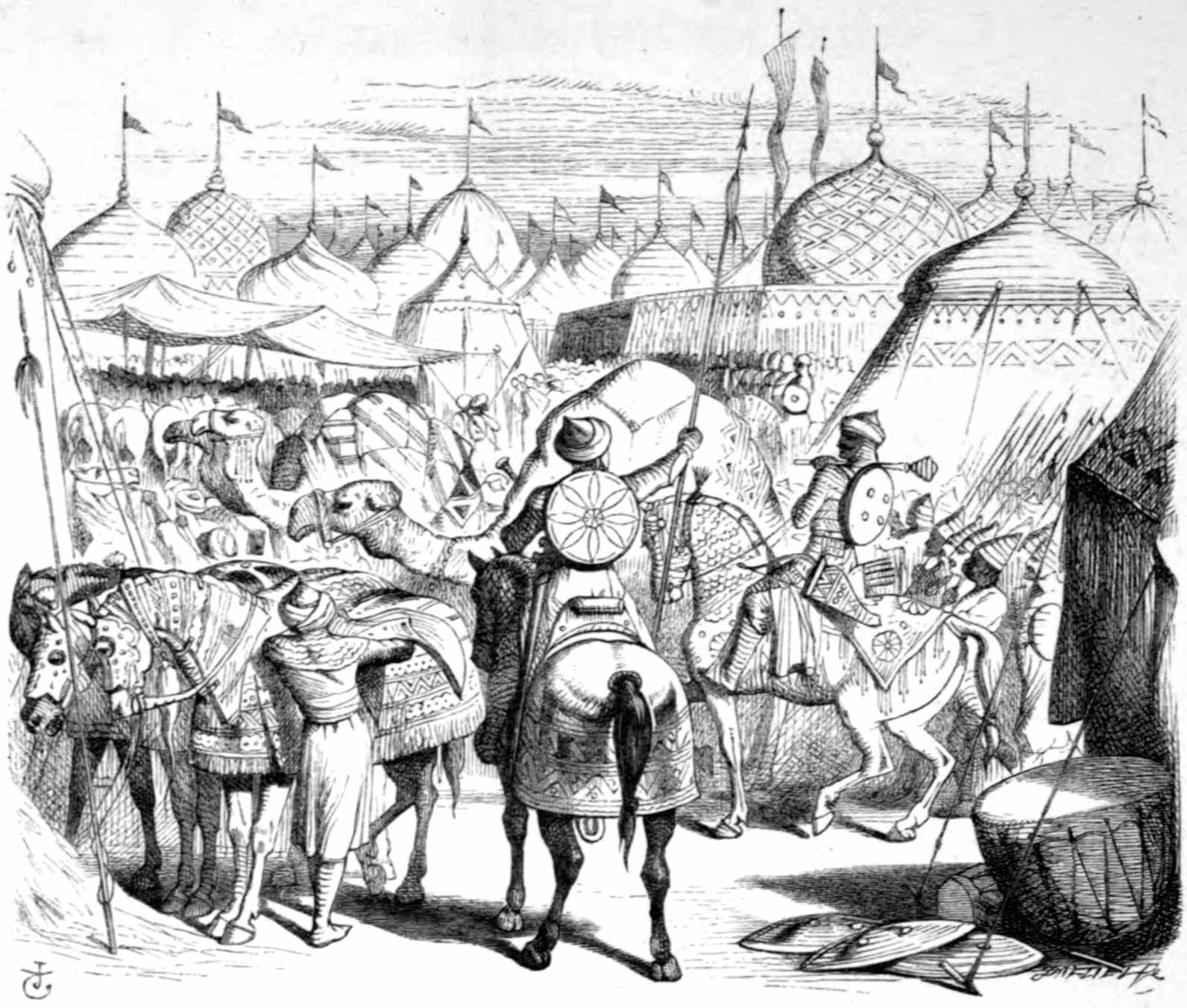
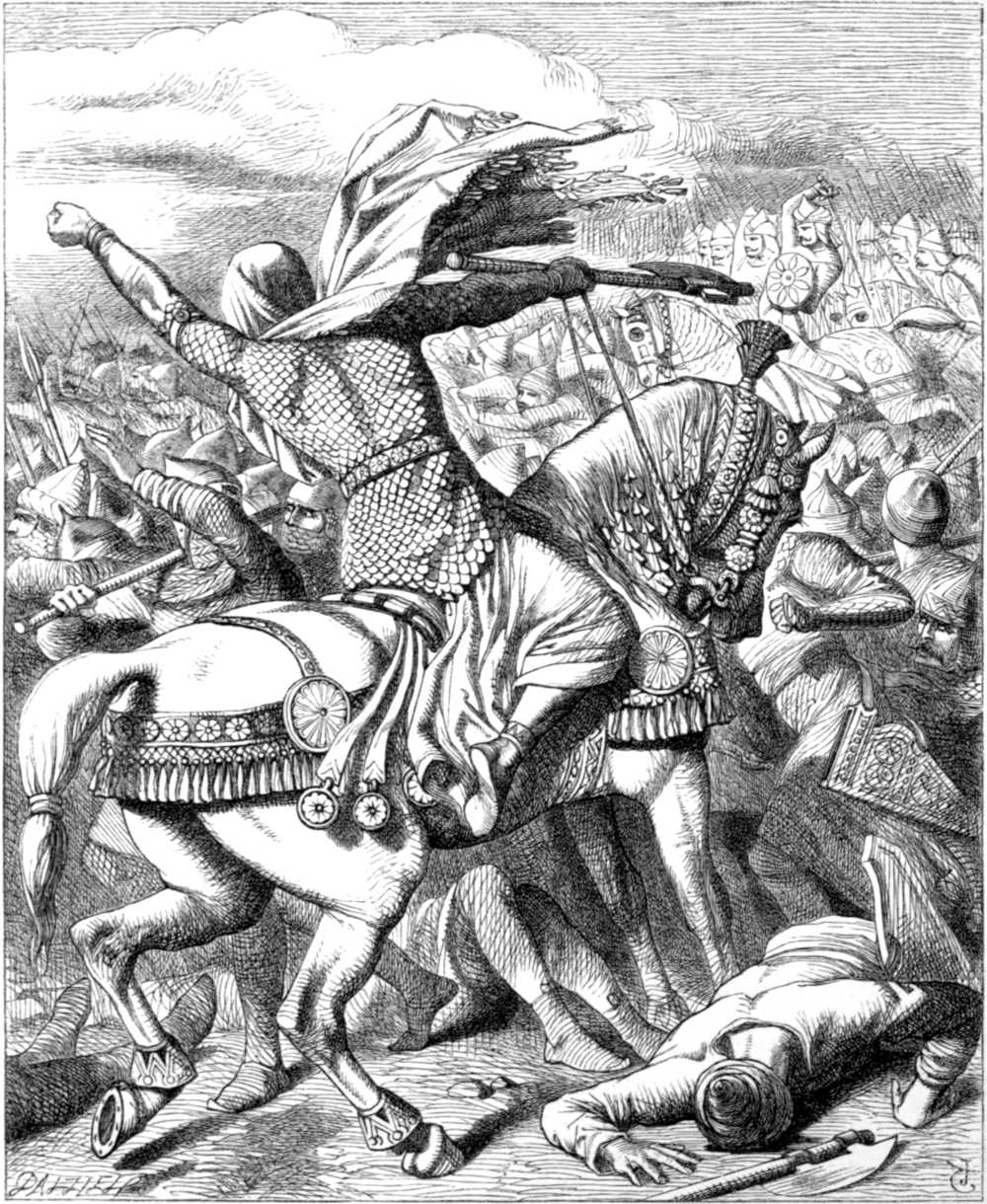
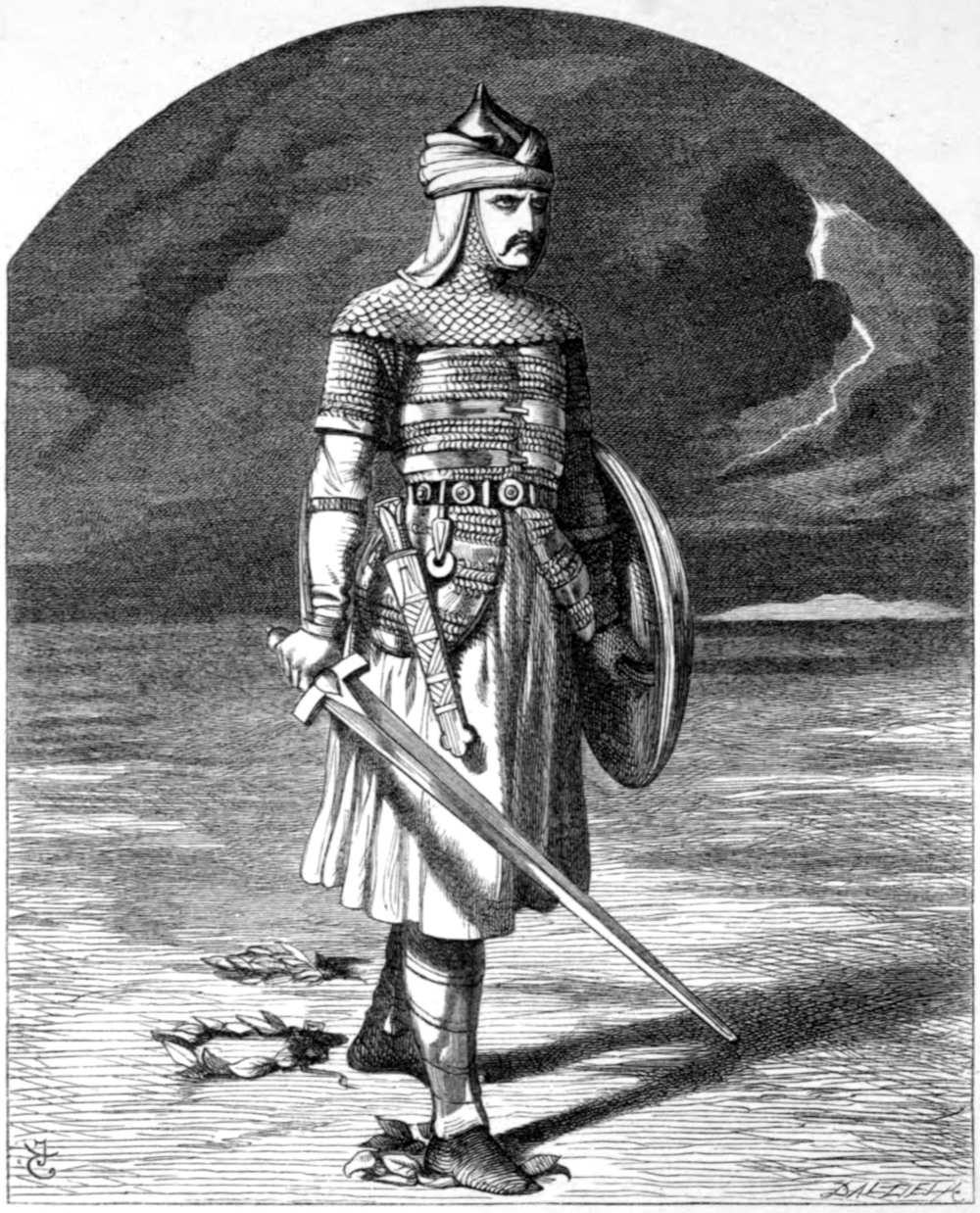
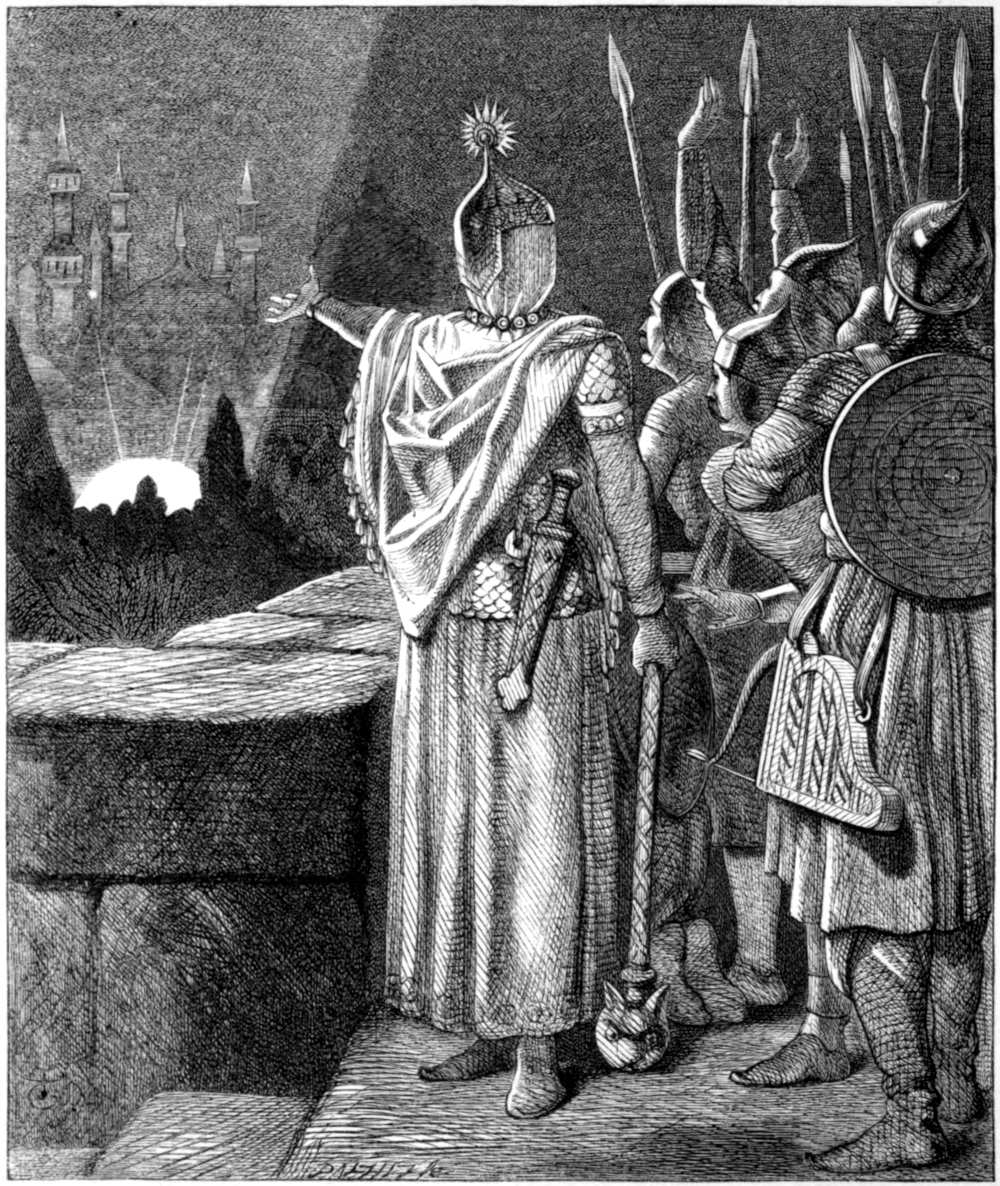
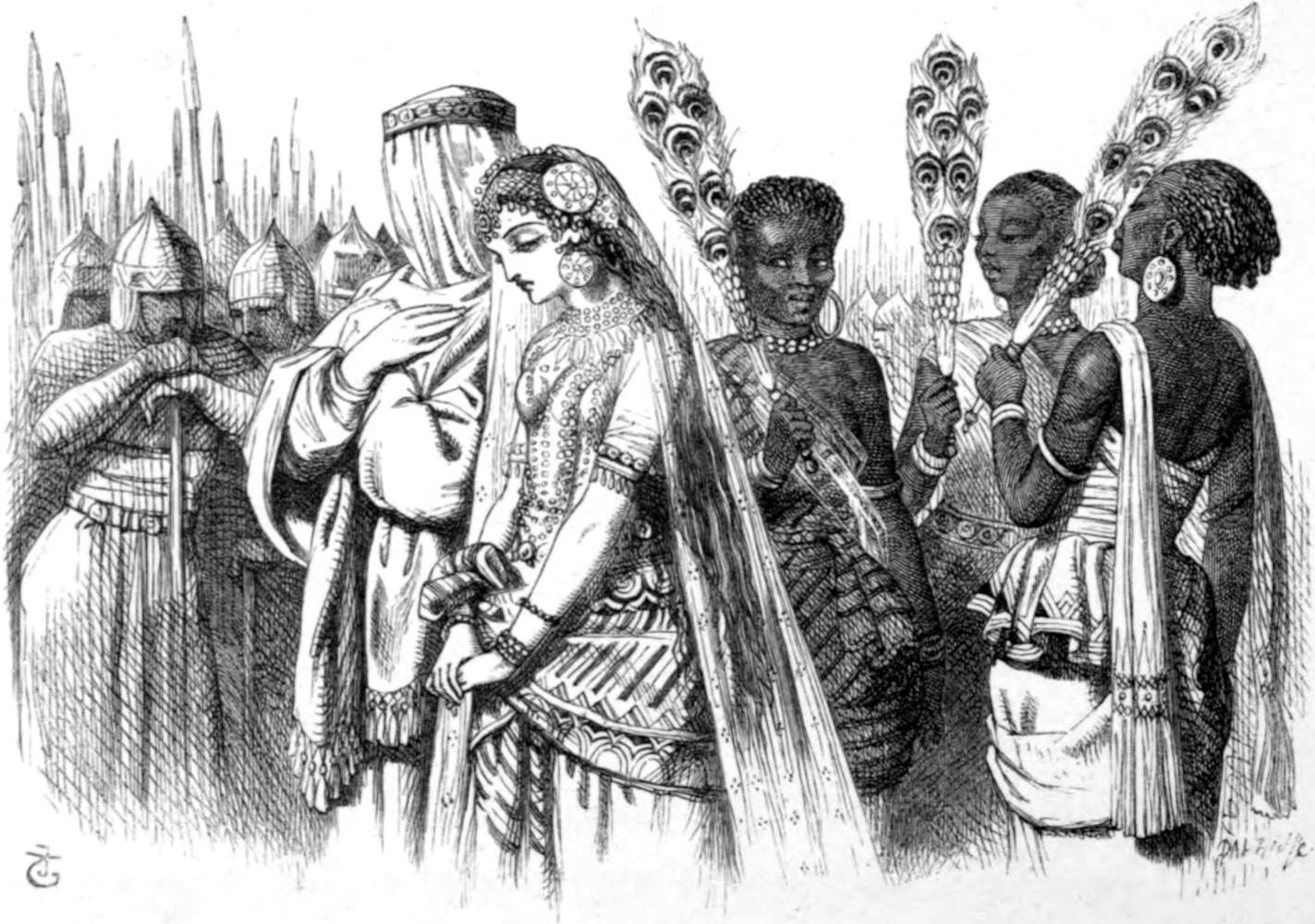
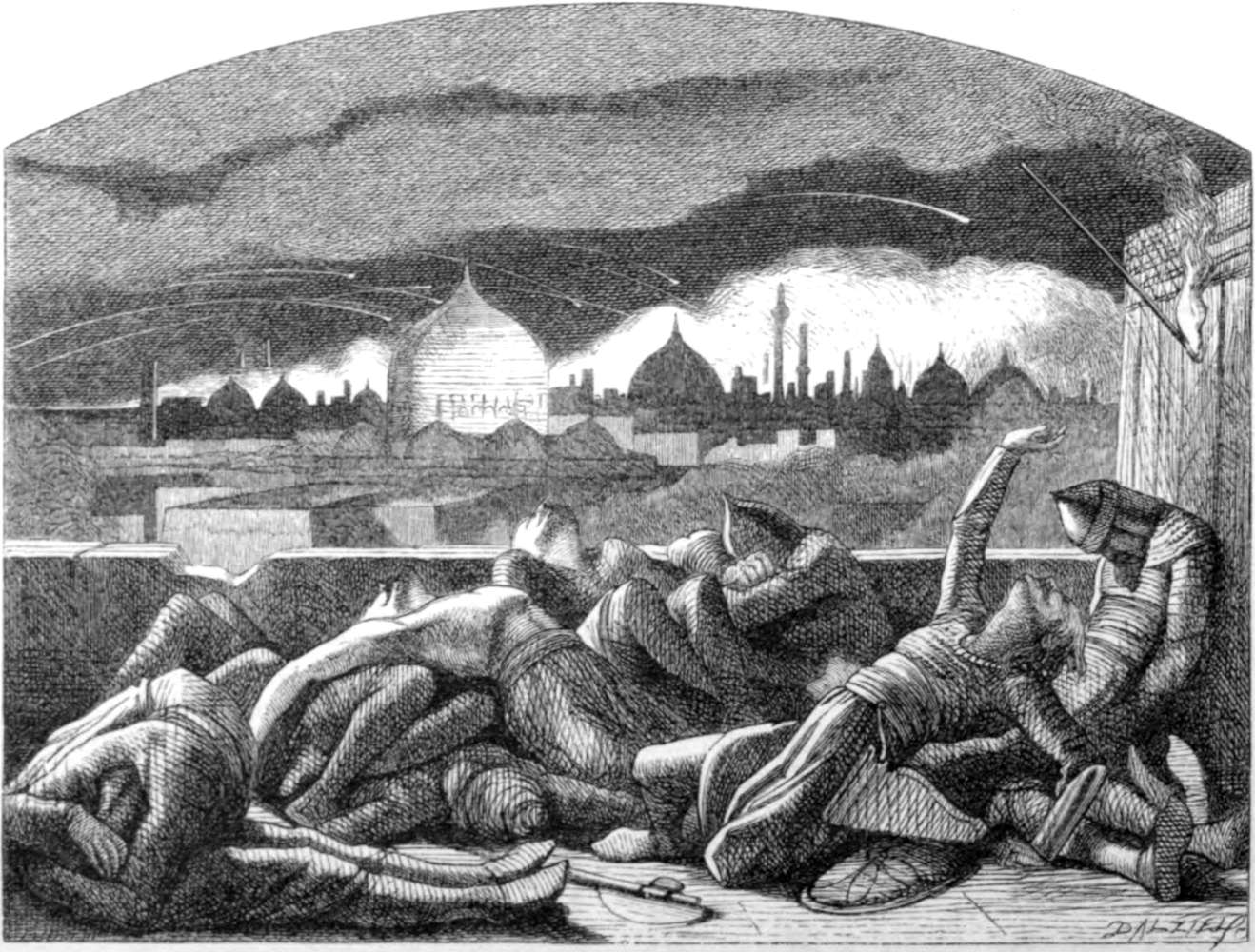
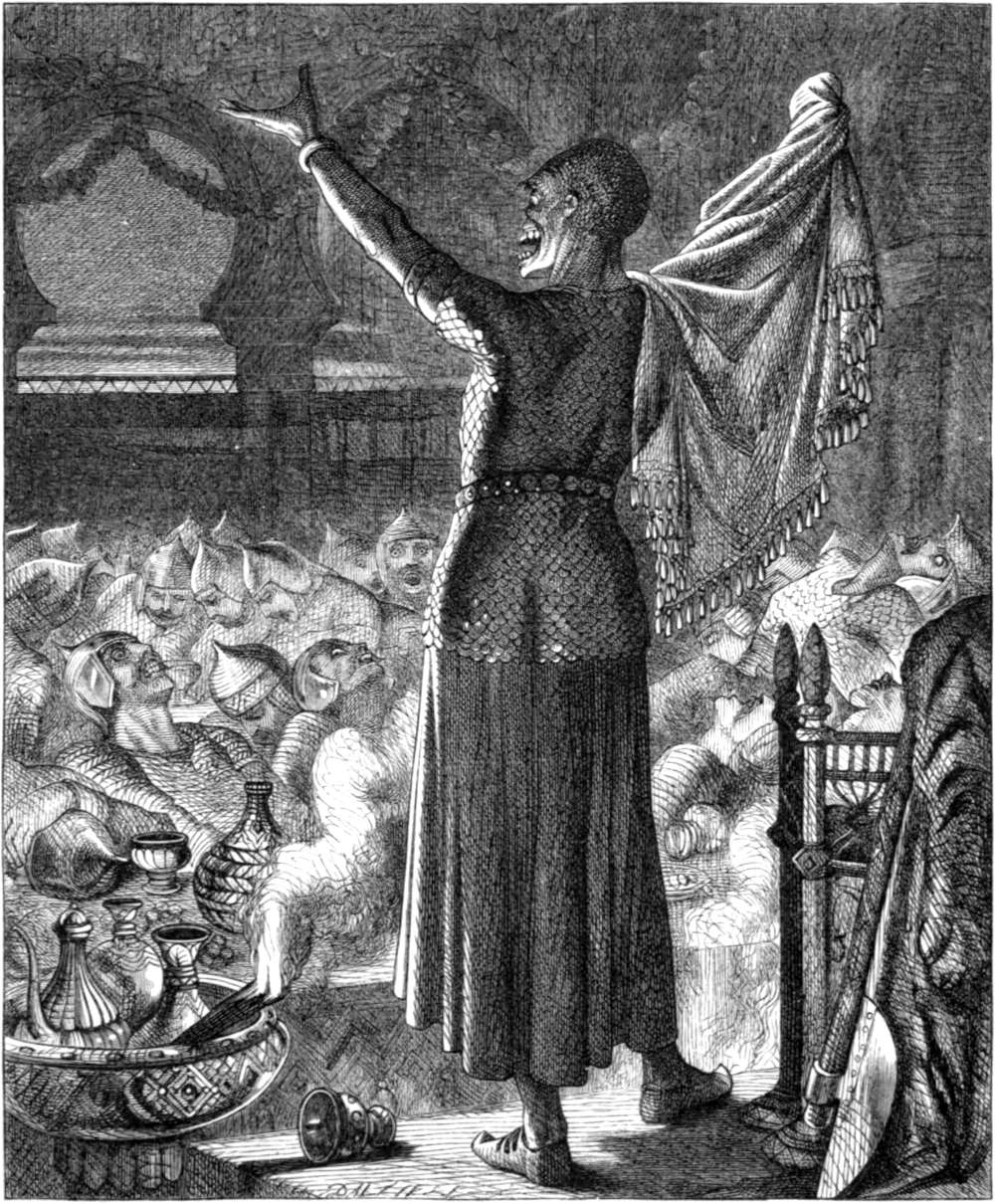
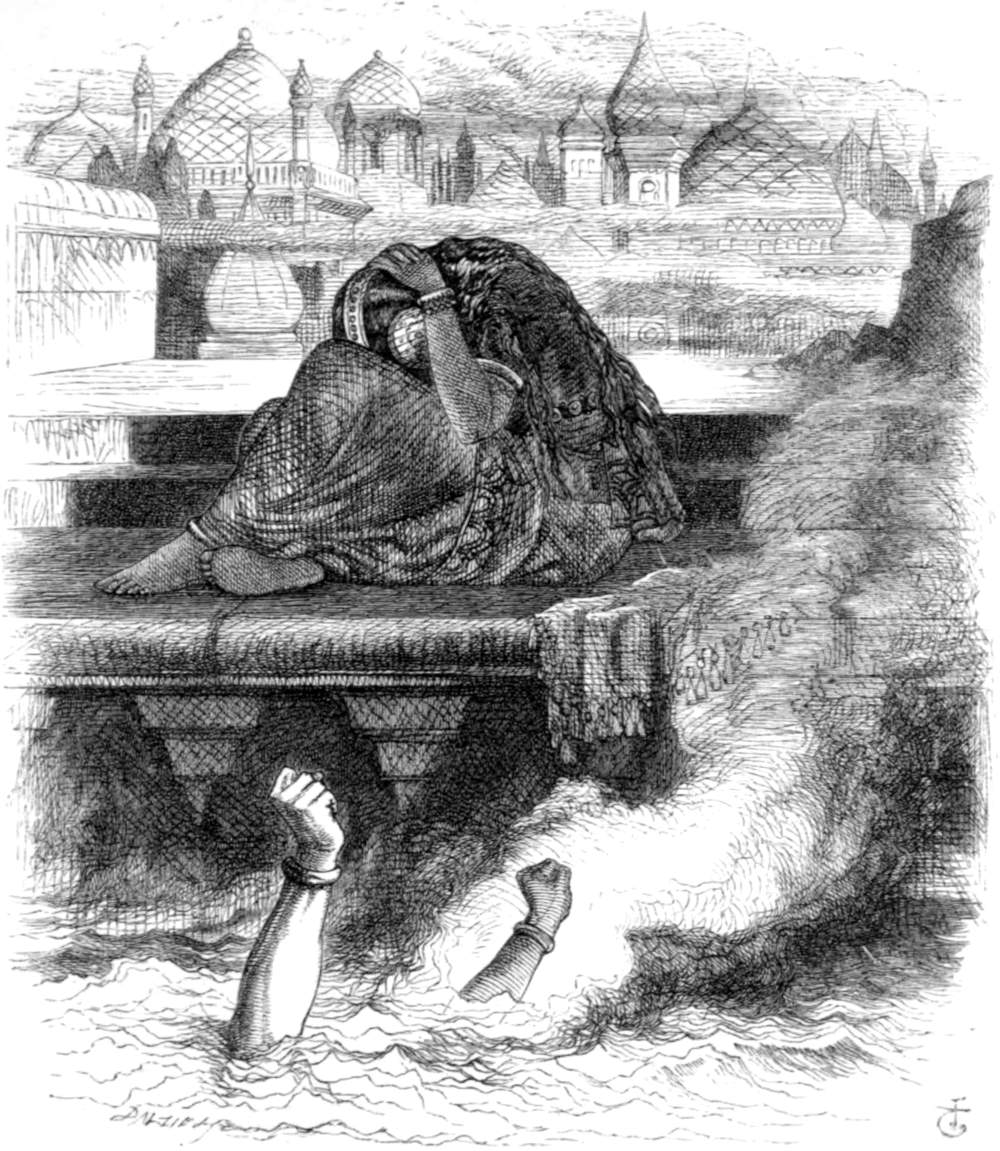
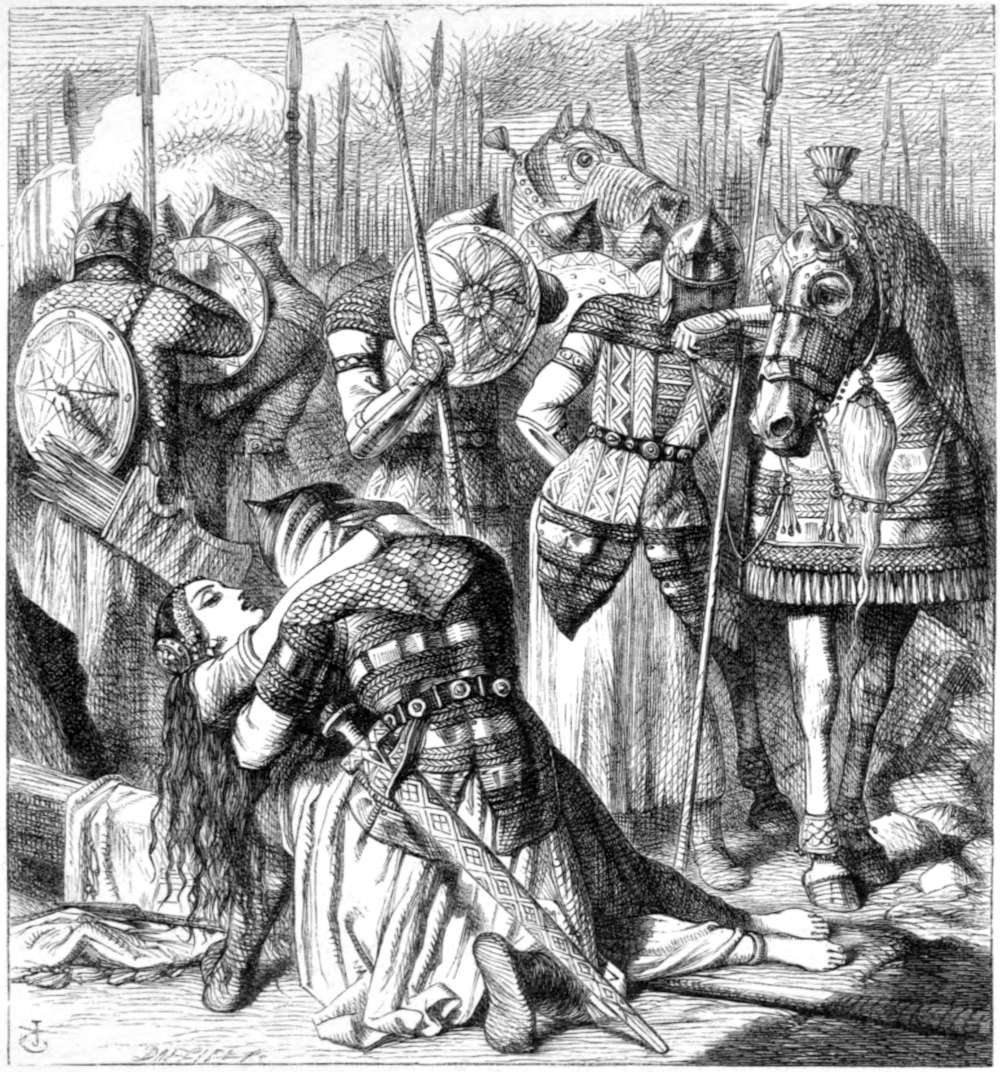
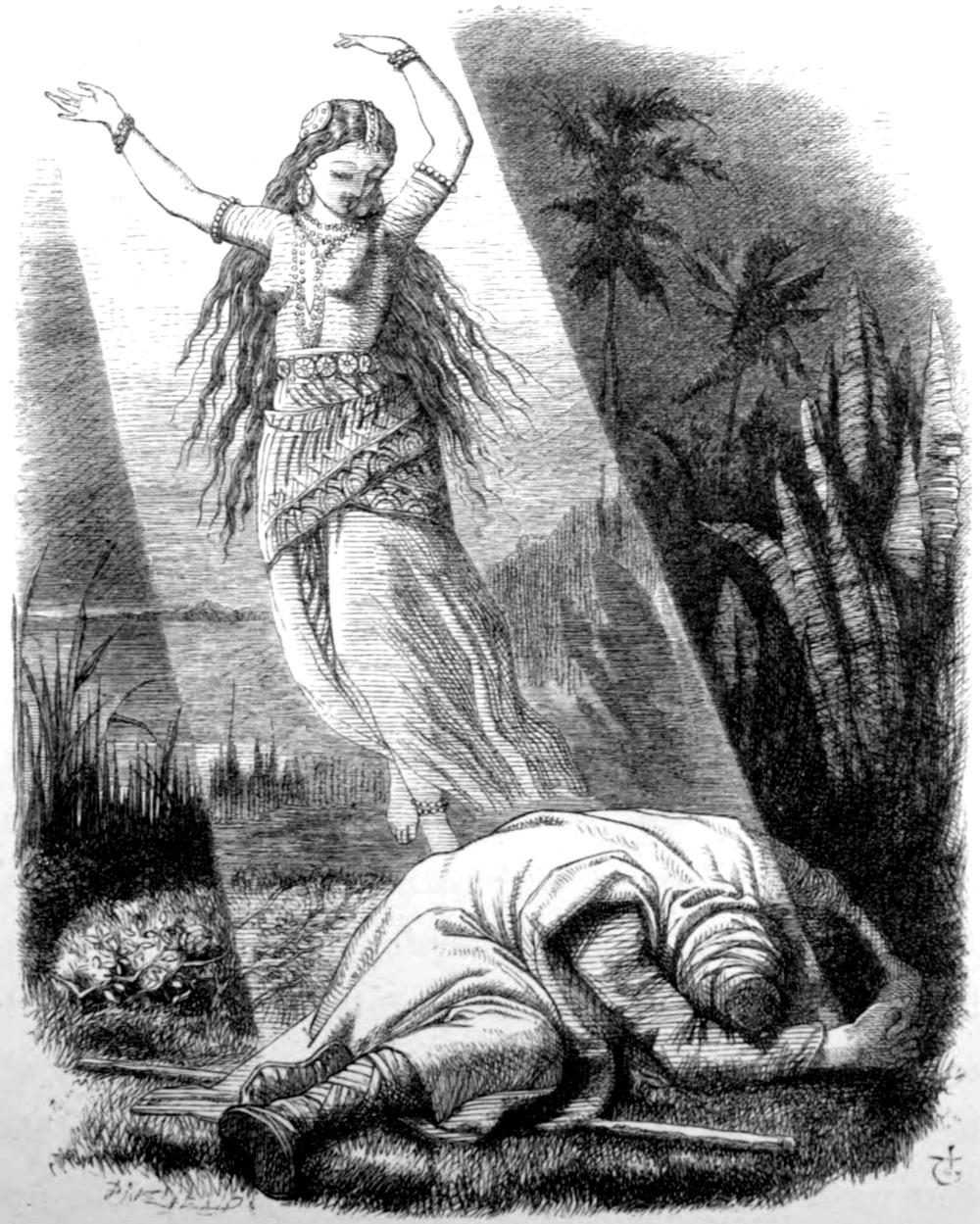
120The story of the Veiled Prophet of Khorassan being ended, they were now doomed to hear Fadladeen’s criticisms upon it. A series of disappointments and accidents had occurred to this learned Chamberlain during the journey. In the first place, those couriers stationed, as in the reign of Shah Jehan, between Delhi and the Western coast of India, to secure a constant supply of mangoes for the Royal Table, had, by some cruel irregularity, failed in their duty, and to eat any mangoes but those of Mazagong was, of course, impossible.[149] In the next place, the elephant, laden with his fine antique porcelain,[150] had, in an unusual fit of liveliness, shattered the whole set to pieces:—an irreparable loss, as many of the vessels were so exquisitely old, as to have been used under the Emperors Yan and Chun, who reigned many ages before the dynasty of Tang. His Koran, too, supposed to be the identical copy between the leaves of which Mahomet’s favourite pigeon used to nestle, had been mislaid by his Koran-bearer three whole days; not without much spiritual alarm to Fadladeen, who, though professing to hold with other loyal and orthodox Mussulmans, that salvation could only be found in the Koran, was strongly suspected of believing in his heart, that it could only be found in his own particular copy of it. When to all these grievances 121is added the obstinacy of the cooks, in putting the pepper of Canara into his dishes instead of the cinnamon of Serendib, we may easily suppose that he came to the task of criticism with, at least, a sufficient degree of irritability for the purpose.
“In order,” said he, importantly swinging about his chaplet of pearls, “to convey with clearness my opinion of the story this young man has related, it is necessary to take a review of all the stories that have ever⸺”—“My good Fadladeen!” exclaimed the Princess, interrupting him, “we really do not deserve that you should give yourself so much trouble. Your opinion of the poem we have just heard will, I have no doubt, be abundantly edifying, without any further waste of your valuable erudition.”—“If that be all,” replied the critic,—evidently mortified at not being allowed to show how much he knew about every thing but the subject immediately before him—“if that be all that is required, the matter is easily despatched.” He then proceeded to analyse the poem, in that strain (so well known to the unfortunate bards of Delhi), whose censures were an infliction from which few recovered, and whose very praises were like the honey extracted from the bitter flowers of the aloe. The chief personages of the story were, if he rightly understood them, an ill-favoured gentleman, with 122a veil over his face;—a young lady, whose reason went and came, according as it suited the poet’s convenience to be sensible or otherwise;—and a youth in one of those hideous Bucharian bonnets, who took the aforesaid gentleman in a veil for a Divinity. “From such materials,” said he, “what can be expected?—after rivalling each other in long speeches and absurdities, through some thousands of lines as indigestible as the filberts of Berdaa, our friend in the veil jumps into a tub of aquafortis; the young lady dies in a set speech, whose only recommendation is that it is her last; and the lover lives on to a good old age for the laudable purpose of seeing her ghost, which he at last happily accomplishes, and expires. This, you will allow, is a fair summary of the story; and if Nasser, the Arabian merchant, told no better,[151] our Holy Prophet (to whom be all honour and glory!) had no need to be jealous of his abilities for story-telling.”
With respect to the style, it was worthy of the matter;—it had not even those politic contrivances of structure, which make up for the commonness of the thoughts by the peculiarity of the manner, nor that stately poetical phraseology by which sentiments mean in themselves, like the blacksmith’s[152] apron converted into a banner, are so easily gilt and embroidered into consequence. Then, as to the versification, it was, to 123say no worse of it, execrable: it had neither the copious flow of Ferdosi, the sweetness of Hafez, nor the sententious march of Sadi; but appeared to him, in the uneasy heaviness of its movements, to have been modelled upon the gait of a very tired dromedary. The licences, too, in which it indulged, were unpardonable;—for instance, this line, and the poem abounded with such:—
“What critic that can count,” said Fadladeen, “and has his full complement of fingers to count withal, would tolerate for an instant such syllabic superfluities?” He here looked round, and discovered that most of his audience were asleep; while the glimmering lamps seemed inclined to follow their example. It became necessary, therefore, however painful to himself, to put an end to his valuable animadversions for the present, and he accordingly concluded, with an air of dignified candour, thus:—“Notwithstanding the observations which I have thought it my duty to make, it is by no means my wish to discourage the young man:—so far from it, indeed, that if he will but totally alter his style of writing and thinking, I have very little doubt that I shall be vastly pleased with him.”
Some days elapsed, after this harangue of the Great Chamberlain, before Lalla Rookh could venture to ask 124for another story. The youth was still a welcome guest in the pavilion—to one heart, perhaps, too dangerously welcome:—but all mention of poetry was, as if by common consent, avoided. Though none of the party had much respect for Fadladeen, yet his censures, thus magisterially delivered, evidently made an impression on them all. The Poet himself, to whom criticism was quite a new operation, (being wholly unknown in that Paradise of the Indies, Cashmere,) felt the shock as it is generally felt at first, till use has made it more tolerable to the patient;—the Ladies began to suspect that they ought not to be pleased, and seemed to conclude that there must have been much good sense in what Fadladeen said, from its having sent them all so soundly to sleep;—while the self-complacent Chamberlain was left to triumph in the idea of having, for the hundred and fiftieth time in his life, extinguished a Poet. Lalla Rookh alone—and Love knew why—persisted in being delighted with all she had heard, and in resolving to hear more as speedily as possible. Her manner, however, of first returning to the subject was unlucky. It was while they rested during the heat of noon near a fountain, on which some hand had rudely traced those well-known words from the Garden of Sadi,—“Many, like me, have viewed this fountain, but they are gone, and their eyes are closed for ever!”—that 125she took occasion, from the melancholy beauty of this passage, to dwell upon the charms of poetry in general. “It is true,” she said, “few poets can imitate that sublime bird, which flies always in the air, and never touches the earth:[153]—it is only once in many ages a Genius appears, whose words, like those on the Written Mountain, last for ever:[154] but still there are some, as delightful, perhaps, though not so wonderful, who, if not stars over our head, are at least flowers along our path, and whose sweetness of the moment we ought gratefully to inhale, without calling upon them for a brightness and a durability beyond their nature. In short,” continued she, blushing, as if conscious of being caught in an oration, “it is quite cruel that a poet cannot wander through his regions of enchantment, without having a critic for ever, like the old Man of the Sea, upon his back!”[155]—Fadladeen, it was plain, took this last luckless allusion to himself, and would treasure it up in his mind as a whetstone for his next criticism. A sudden silence ensued; and the Princess, glancing a look at Feramorz, saw plainly she must wait for a more courageous moment.
But the glories of Nature, and her wild fragrant airs, playing freshly over the current of youthful spirits, will soon heal even deeper wounds than the dull Fadladeens 126of this world can inflict. In an evening or two after, they came to the small Valley of Gardens, which had been planted by order of the Emperor, for his favourite sister Rochinara, during their progress to Cashmere, some years before; and never was there a more sparkling assemblage of sweets, since the Gulzar-e-Irem, or Rose-bower of Irem. Every precious flower was there to be found, that poetry, or love, or religion has ever consecrated; from the dark hyacinth, to which Hafez compares his mistress’s hair,[156] to the Cámalatá, by whose rosy blossoms the heaven of Indra is scented.[157] As they sat in the cool fragrance of this delicious spot, and Lalla Rookh remarked that she could fancy it the abode of that Flower-loving Nymph whom they worship in the temples of Kathay,[158] or of one of those Peris, those beautiful creatures of the air, who live upon perfumes, and to whom a place like this might make some amends for the Paradise they have lost,—the young Poet, in whose eyes she appeared, while she spoke, to be one of the bright spiritual creatures she was describing, said hesitatingly that he remembered a Story of a Peri, which, if the Princess had no objection, he would venture to relate. “It is,” said he, with an appealing look to Fadladeen, “in a lighter and humbler strain than the other:” then, striking a few careless but melancholy chords on his kitar, he thus began:—
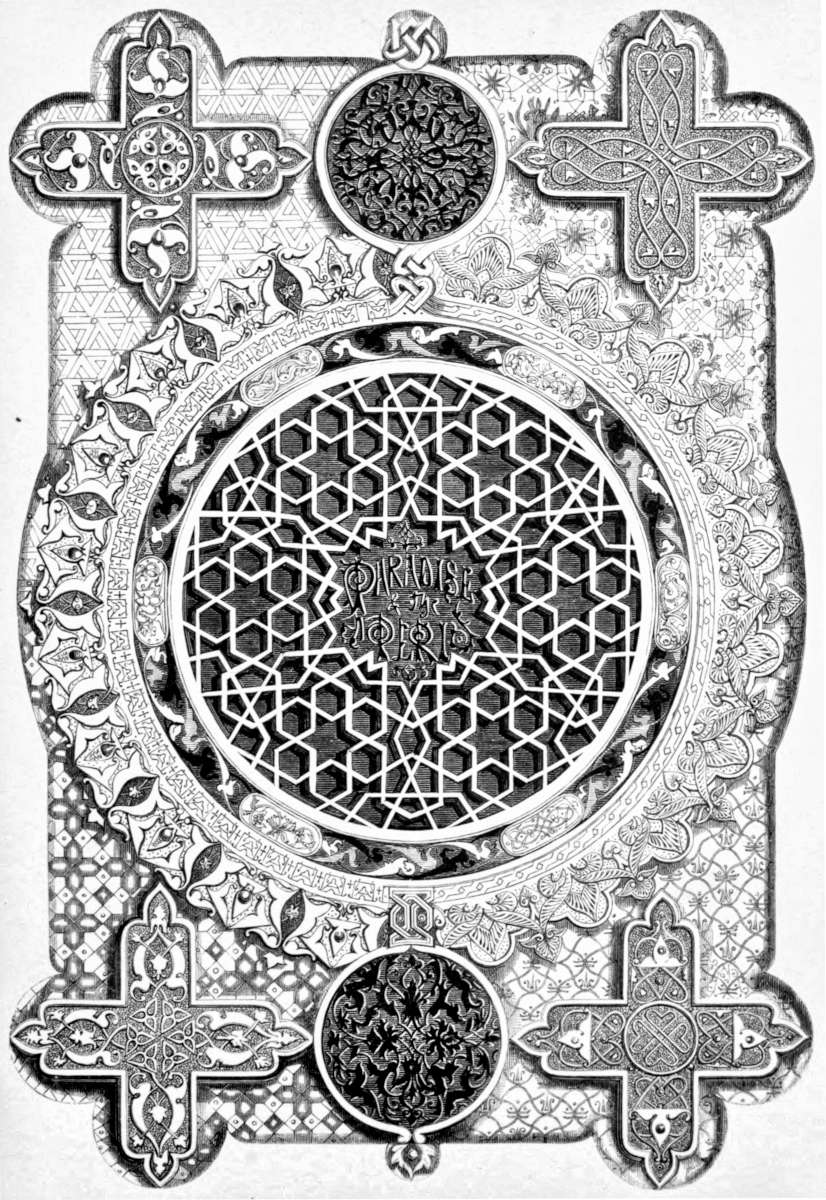
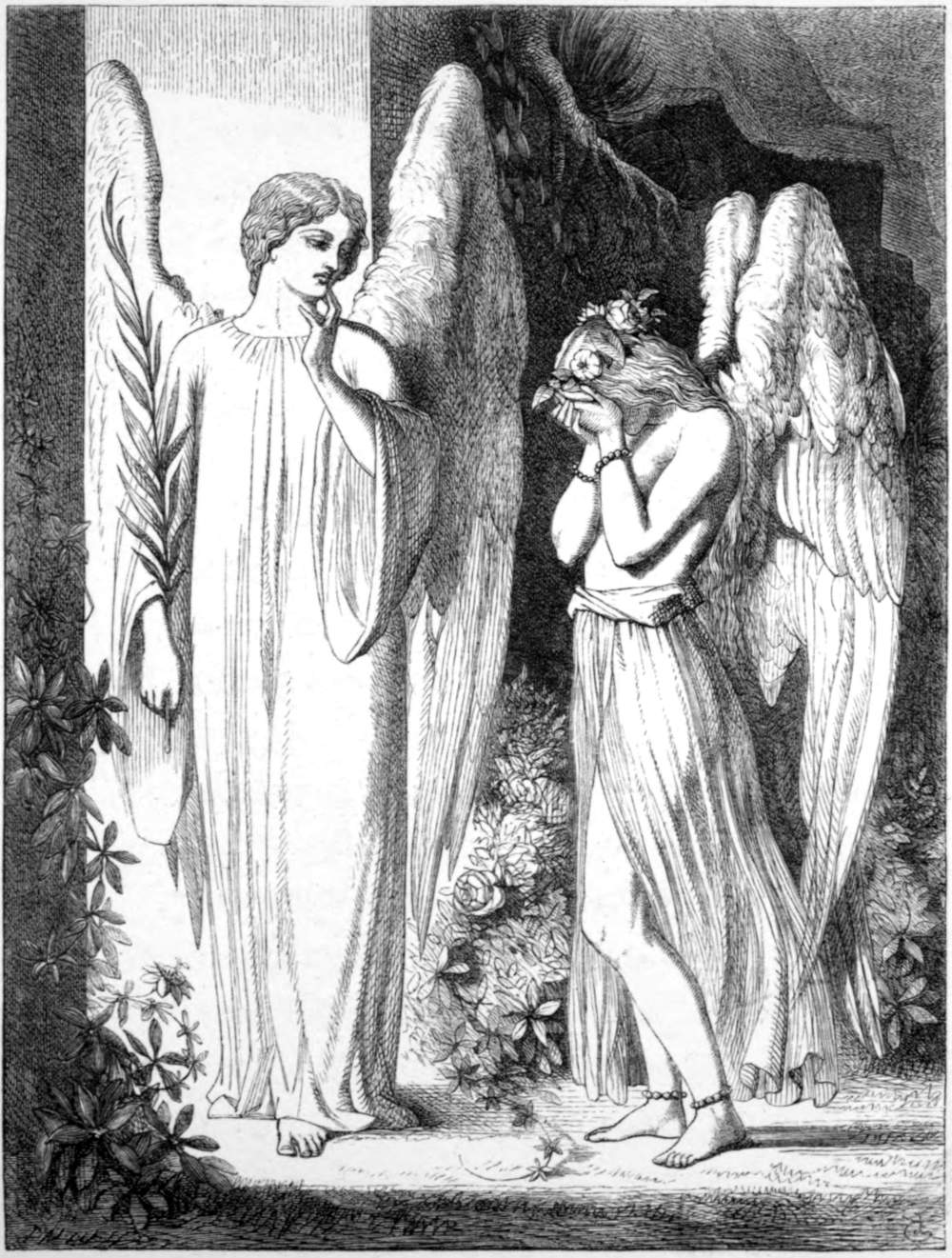
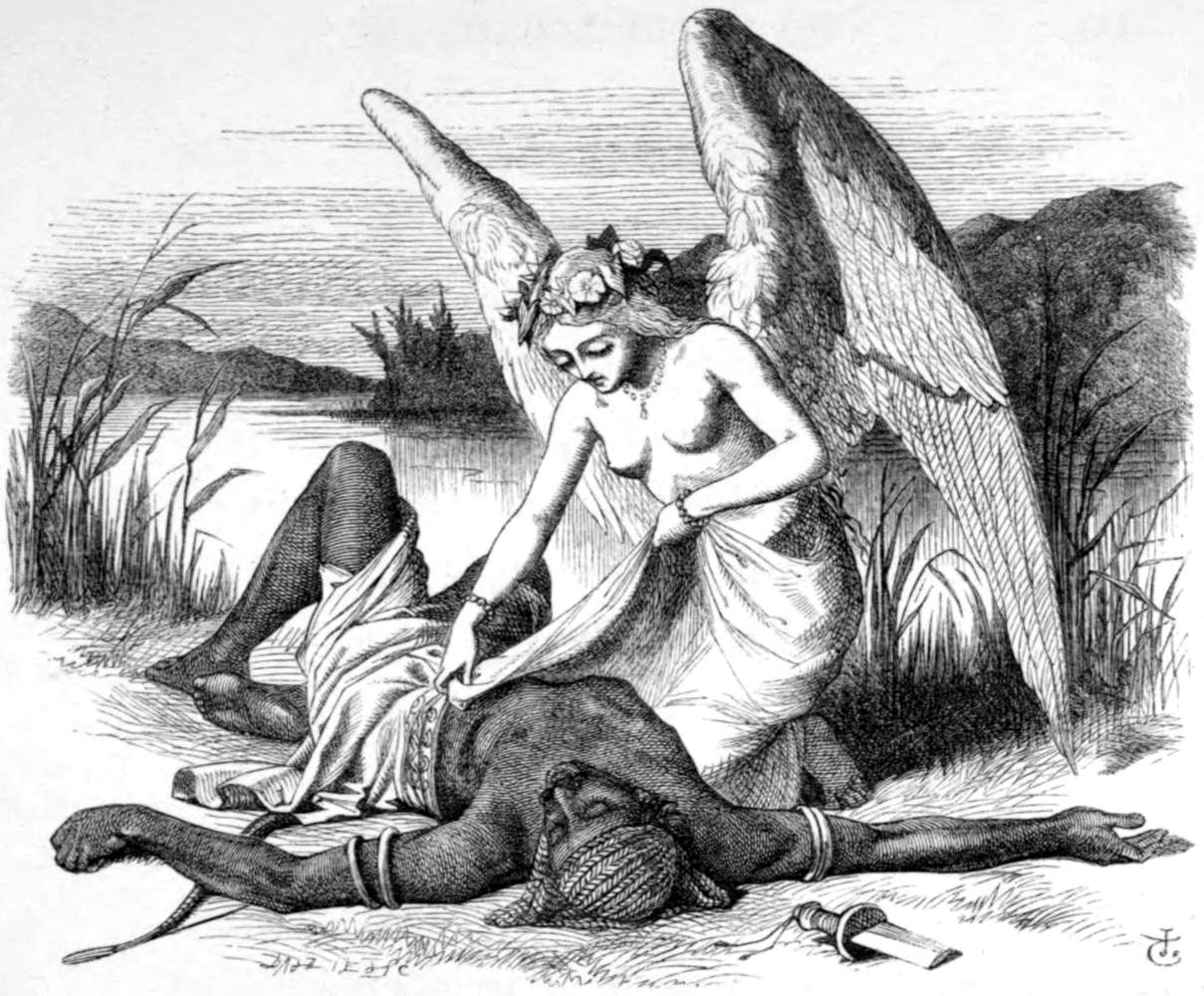
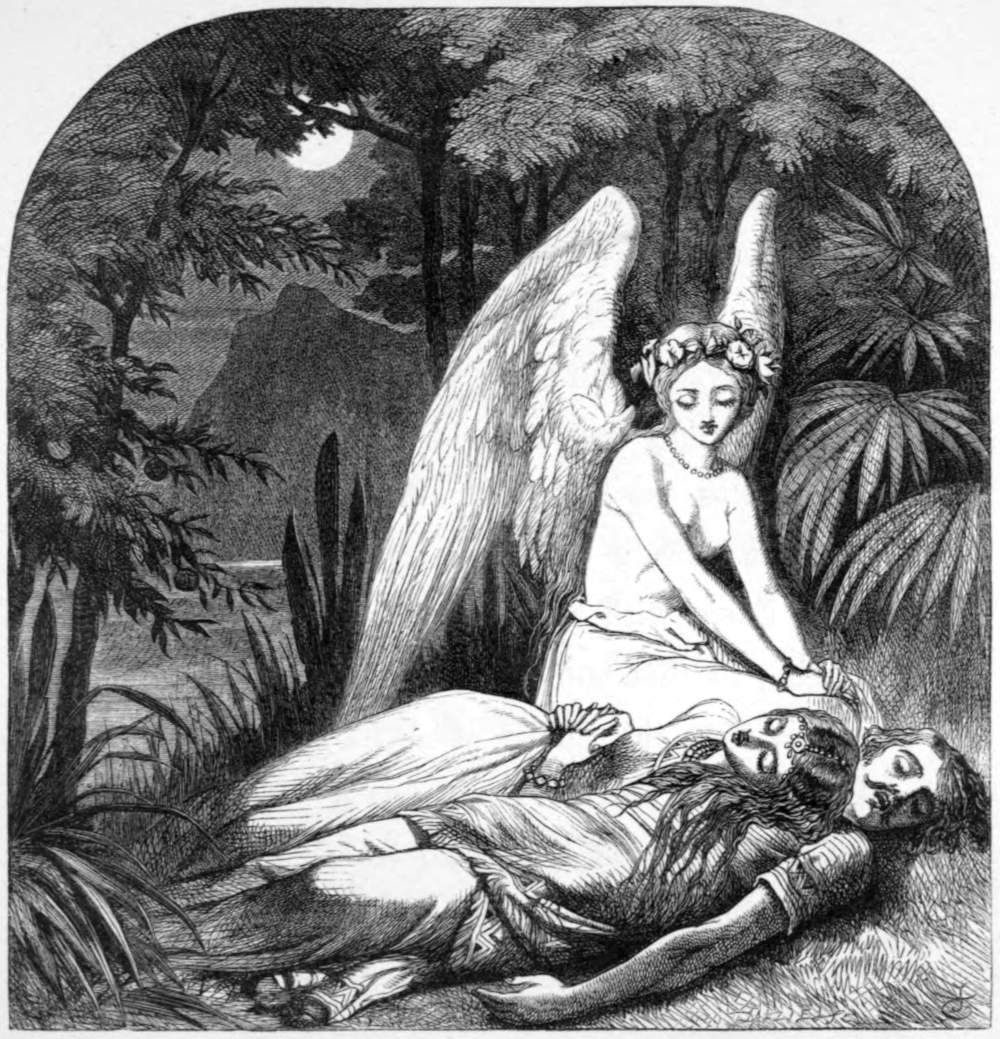
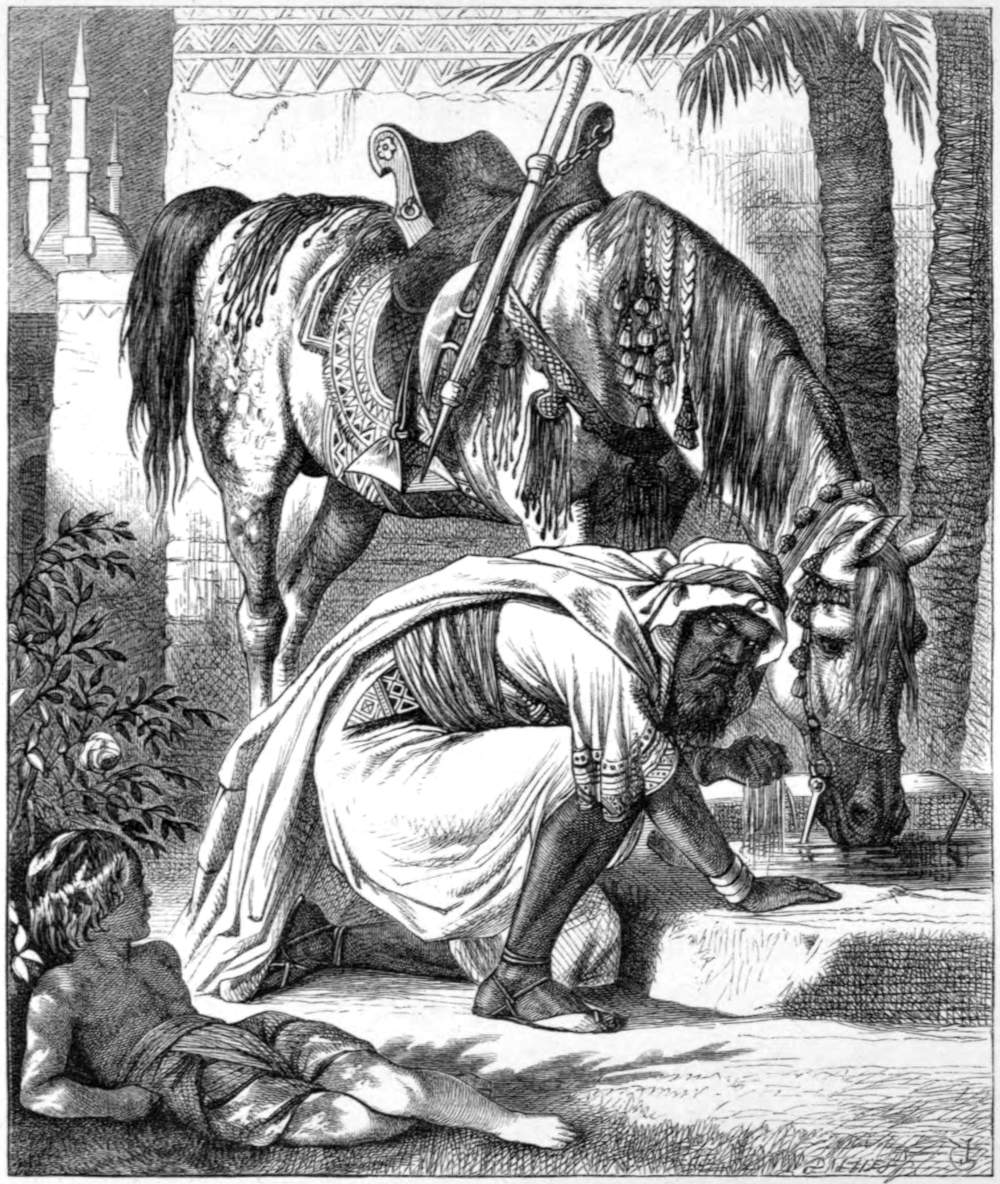
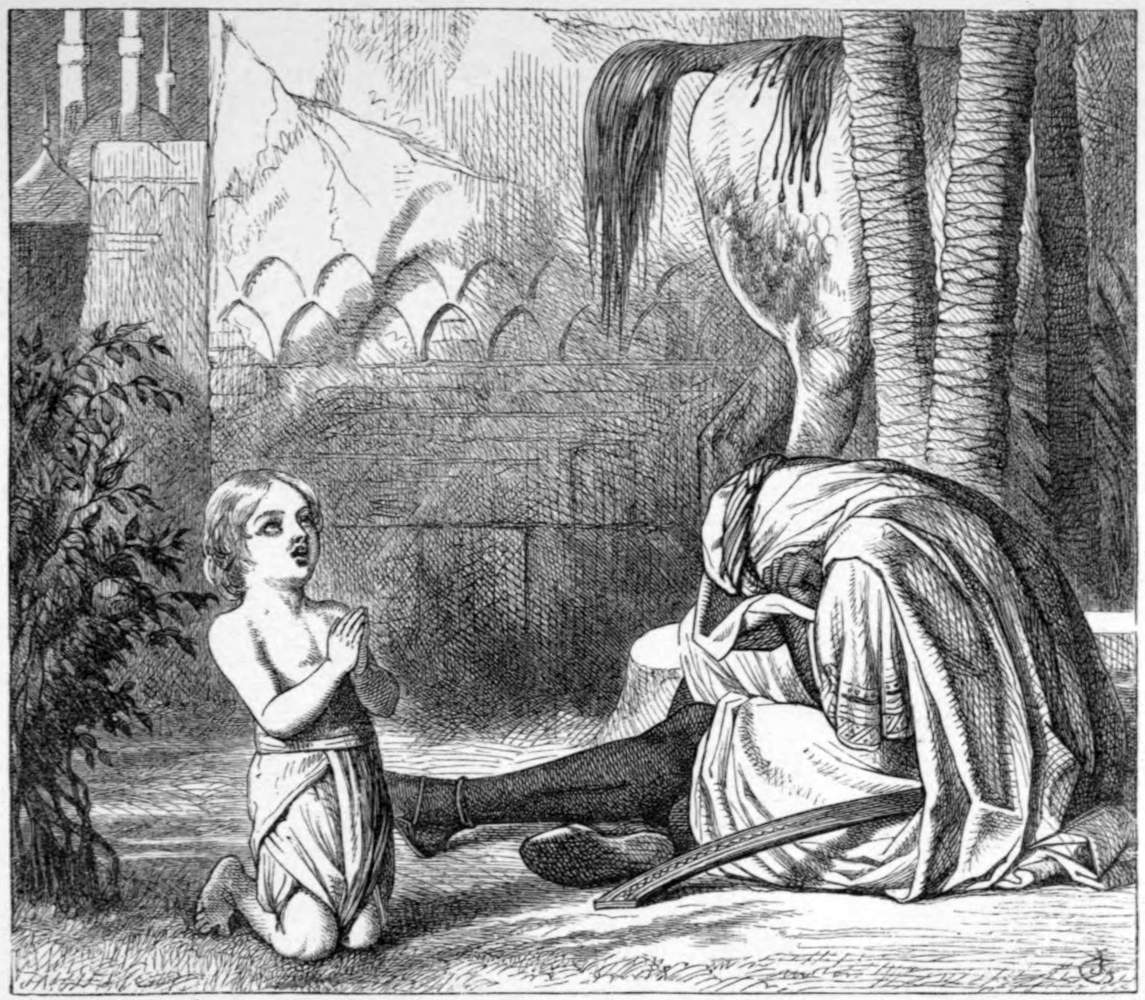
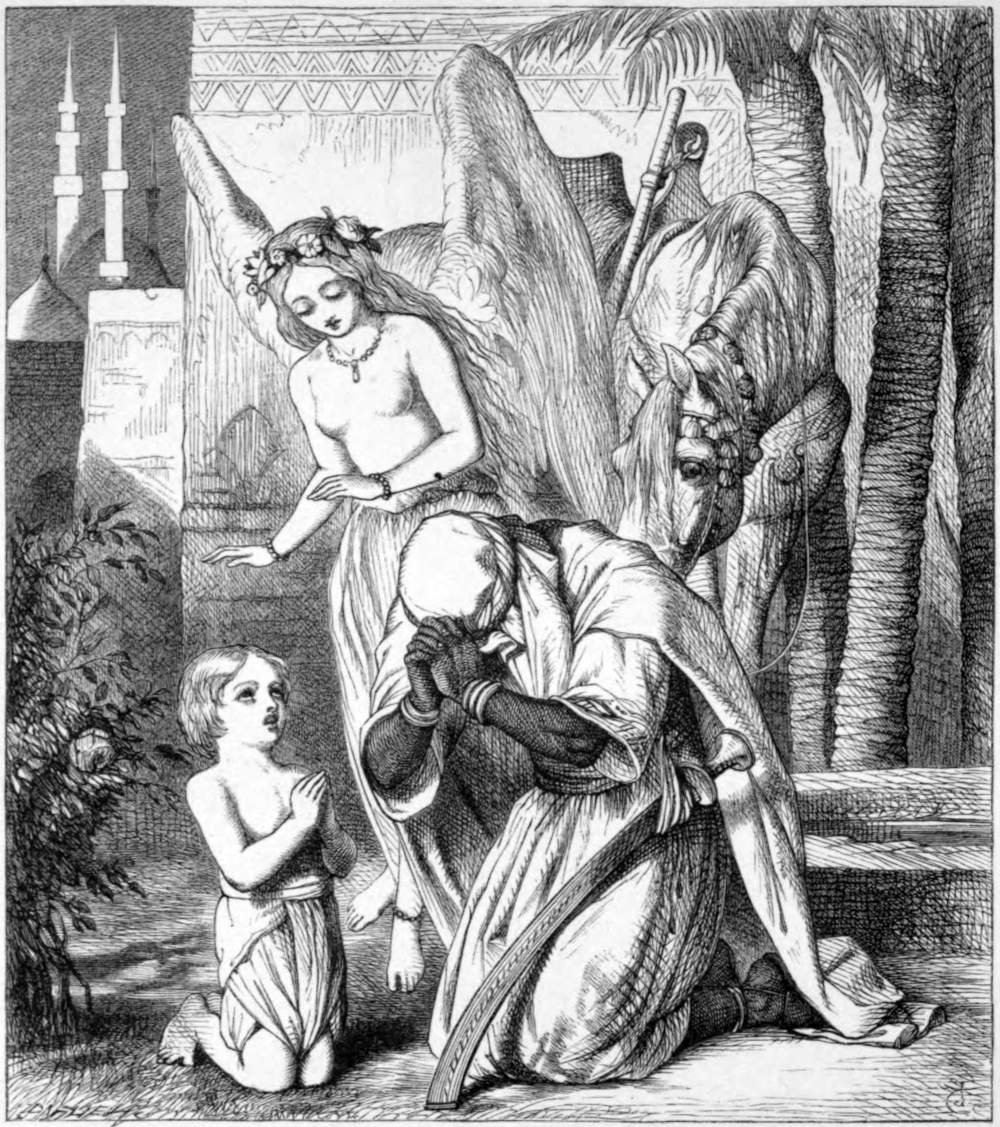
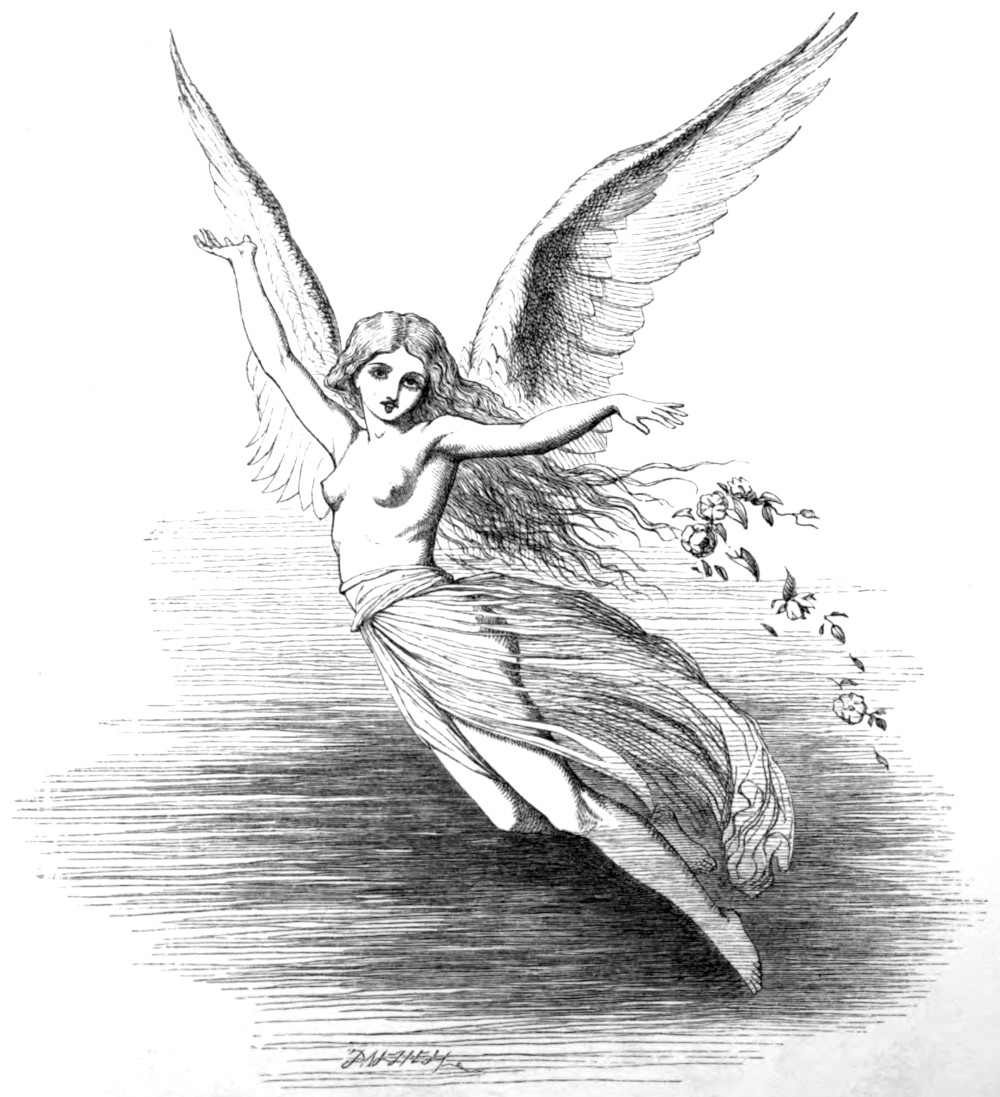
155“And this,” said the Great Chamberlain, “is poetry! this flimsy manufacture of the brain, which, in comparison with the lofty and durable monuments of genius, is as the gold filigree-work of Zamara beside the eternal architecture of Egypt!” After this gorgeous sentence, which, with a few more of the same kind, Fadladeen kept by him for rare and important occasions, he proceeded to the anatomy of the short poem just recited. The lax and easy kind of metre in which it was written ought to be denounced, he said, as one of the leading causes of the alarming growth of poetry in our times. If some check were not given to this lawless facility, we should soon be over-run by a race of bards as numerous and as shallow as the hundred and twenty thousand Streams of Basra.[198] They who succeeded in this style deserved chastisement for their very success;—as warriors have been punished, even after gaining a victory, because they had taken the liberty of gaining it in an irregular or unestablished manner. What, then, was to be said to those who failed? to those who presumed, as in the present lamentable instance, to imitate the license and ease of the bolder sons of song, without any of that grace or vigour which gave a dignity even to negligence;—who, like them, flung the jereed[199] carelessly, but not, like them, to the mark;—“and who,” said he, raising his voice, to excite 156a proper degree of wakefulness in his hearers, “contrive to appear heavy and constrained in the midst of all the latitude they allow themselves, like one of those young pagans that dance before the Princess, who is ingenious enough to move as if her limbs were fettered, in a pair of the lightest and loosest drawers of Masulipatam!”
It was but little suitable, he continued, to the grave march of criticism to follow this fantastical Peri, of whom they had just heard, through all her flights and adventures between earth and heaven; but he could not help adverting to the puerile conceitedness of the Three Gifts which she is supposed to carry to the skies,—a drop of blood, forsooth, a sigh, and a tear! How the first of these articles was delivered into the Angel’s “radiant hand” he professed himself at a loss to discover; and as to the safe carriage of the sigh and the tear, such Peris and such poets were beings by far too incomprehensible for him even to guess how they managed such matters. “But, in short,” said he, “it is a waste of time and patience to dwell longer upon a thing so incurably frivolous,—puny even among its own puny race, and such as only the Banyan Hospital[200] for Sick Insects should undertake.”
In vain did Lalla Rookh try to soften this inexorable critic; in vain did she resort to her most eloquent 157common-places,—reminding him that poets were a timid and sensitive race, whose sweetness was not to be drawn forth, like that of the fragrant grass near the Ganges, by crushing and trampling upon them;[201]—that severity often extinguished every chance of the perfection which it demanded; and that, after all, perfection was like the Mountain of the Talisman,—no one had ever yet reached its summit.[202] Neither these gentle axioms, nor the still gentler looks with which they were inculcated, could lower for one instant the elevation of Fadladeen’s eyebrows, or charm him into any thing like encouragement, or even toleration, of her poet. Toleration, indeed, was not among the weaknesses of Fadladeen:—he carried the same spirit into matters of poetry and of religion, and, though little versed in the beauties or sublimities of either, was a perfect master of the art of persecution in both. His zeal was the same, too, in either pursuit; whether the game before him was pagans or poetasters,—worshippers of cows, or writers of epics.
They had now arrived at the splendid city of Lahore, whose mausoleums and shrines, magnificent and numberless, where Death appeared to share equal honours with Heaven, would have powerfully affected the heart and imagination of Lalla Rookh, if feelings more of this earth had not taken entire possession of her already. She 158was here met by messengers, despatched from Cashmere, who informed her that the King had arrived in the Valley, and was himself superintending the sumptuous preparations that were then making in the Saloons of the Shalimar for her reception. The chill she felt on receiving this intelligence,—which to a bride whose heart was free and light would have brought only images of affection and pleasure,—convinced her that her peace was gone for ever, and that she was in love, irretrievably in love, with young Feramorz. The veil had fallen off in which this passion at first disguises itself, and to know that she loved was now as painful as to love without knowing it had been delicious. Feramorz, too,—what misery would be his, if the sweet hours of intercourse so imprudently allowed them should have stolen into his heart the same fatal fascination as into hers;—if, notwithstanding her rank, and the modest homage he always paid to it, even he should have yielded to the influence of those long and happy interviews, where music, poetry, the delightful scenes of nature,—all had tended to bring their hearts close together, and to waken by every means that too ready passion, which often, like the young of the desert-bird, is warmed into life by the eyes alone![203] She saw but one way to preserve herself from being culpable as well as unhappy, and this, however painful, she was resolved to adopt. Feramorz must no more be admitted 159to her presence. To have strayed so far into the dangerous labyrinth was wrong, but to linger in it, while the clue was yet in her hand, would be criminal. Though the heart she had to offer to the King of Bucharia might be cold and broken, it should at least be pure; and she must only endeavour to forget the short dream of happiness she had enjoyed,—like that Arabian shepherd, who, in wandering into the wilderness, caught a glimpse of the Gardens of Irim, and then lost them again for ever![204]
The arrival of the young Bride at Lahore was celebrated in the most enthusiastic manner. The Rajas and Omras in her train, who had kept at a certain distance during the journey, and never encamped nearer to the Princess than was strictly necessary for her safeguard, here rode in splendid cavalcade through the city, and distributed the most costly presents to the crowd. Engines were erected in all the squares, which cast forth showers of confectionery among the people; while the artisans, in chariots[205] adorned with tinsel and flying streamers, exhibited the badges of their respective trades through the streets. Such brilliant displays of life and pageantry among the palaces, and domes, and gilded minarets of Lahore, made the city altogether like a place of enchantment;—particularly on the day when Lalla Rookh set out again upon her journey, when she was accompanied to the gate by all 160the fairest and richest of the nobility, and rode along between ranks of beautiful boys and girls, who kept waving over their heads plates of gold and silver flowers,[206] and then threw them around to be gathered by the populace.
For many days after their departure from Lahore, a considerable degree of gloom hung over the whole party. Lalla Rookh, who had intended to make illness her excuse for not admitting the young minstrel, as usual, to the pavilion, soon found that to feign indisposition was unnecessary;—Fadladeen felt the loss of the good road they had hitherto travelled, and was very near cursing Jehan-Guire (of blessed memory!) for not having continued his delectable alley of trees,[207] at least as far as the mountains of Cashmere;—while the Ladies, who had nothing now to do all day but to be fanned by peacocks’ feathers and listen to Fadladeen, seemed heartily weary of the life they led, and, in spite of all the Great Chamberlain’s criticisms, were so tasteless as to wish for the poet again. One evening, as they were proceeding to their place of rest for the night, the Princess, who, for the freer enjoyment of the air, had mounted her favourite Arabian palfrey, in passing by a small grove, heard the notes of a lute from within its leaves, and a voice, which she but too well knew, singing the following words:—
The tone of melancholy defiance in which these words were uttered, went to Lalla Rookh’s heart;—and, as she reluctantly rode on, she could not help feeling it to 162be a sad but still sweet certainty, that Feramorz was to the full as enamoured and miserable as herself.
The place where they encamped that evening was the first delightful spot they had come to since they left Lahore. On one side of them was a grove full of small Hindoo temples, and planted with the most graceful trees of the East; where the tamarind, the cassia, and the silken plantains of Ceylon were mingled in rich contrast with the high fanlike foliage of the Palmyra,—that favourite tree of the luxurious bird that lights up the chambers of its nest with fire-flies.[208] In the middle of the lawn where the pavilion stood there was a tank surrounded by small mangoe-trees, on the clear cold waters of which floated multitudes of the beautiful red lotus;[209] while at a distance stood the ruins of a strange and awful-looking tower, which seemed old enough to have been the temple of some religion no longer known, and which spoke the voice of desolation in the midst of all that bloom and loveliness. This singular ruin excited the wonder and conjectures of all. Lalla Rookh guessed in vain, and the all-pretending Fadladeen, who had never till this journey been beyond the precincts of Delhi, was proceeding most learnedly to show that he knew nothing whatever about the matter, when one of the Ladies suggested that perhaps Feramorz could satisfy 163their curiosity. They were now approaching his native mountains, and this tower might perhaps be a relic of some of those dark superstitions, which had prevailed in that country before the light of Islam dawned upon it. The Chamberlain, who usually preferred his own ignorance to the best knowledge that any one else could give him, was by no means pleased with this officious reference; and the Princess, too, was about to interpose a faint word of objection, but, before either of them could speak, a slave was despatched for Feramorz, who, in a very few minutes, made his appearance before them—looking so pale and unhappy in Lalla Rookh’s eyes, that she repented already of her cruelty in having so long excluded him.
That venerable tower, he told them, was the remains of an ancient Fire-temple, built by those Ghebers or Persians of the old religion, who, many hundred years since, had fled hither from their Arab conquerors,[210] preferring liberty and their altars in a foreign land to the alternative of apostasy or persecution in their own. It was impossible, he added, not to feel interested in the many glorious but unsuccessful struggles, which had been made by these original natives of Persia to cast off the yoke of their bigoted conquerors. Like their own Fire in the Burning Field at Bakou,[211] when suppressed in 164one place, they had but broken out with fresh flame in another; and, as a native of Cashmere, of that fair and Holy Valley, which had in the same manner become the prey of strangers,[212] and seen her ancient shrines and native princes swept away before the march of her intolerant invaders, he felt a sympathy, he owned, with the sufferings of the persecuted Ghebers, which every monument like this before them but tended more powerfully to awaken.
It was the first time that Feramorz had ever ventured upon so much prose before Fadladeen, and it may easily be conceived what effect such prose as this must have produced upon that most orthodox and most pagan-hating personage. He sat for some minutes aghast, ejaculating only at intervals, “Bigoted conquerors!—sympathy with Fire-worshippers!”[213]—while Feramorz, happy to take advantage of this almost speechless horror of the Chamberlain, proceeded to say that he knew a melancholy story, connected with the events of one of those struggles of the brave Fire-worshippers against their Arab masters, which, if the evening was not too far advanced, he should have much pleasure in being allowed to relate to the Princess. It was impossible for Lalla Rookh to refuse;—he had never before looked half so animated; and when he spoke of the Holy Valley his 165eyes had sparkled, she thought, like the talismanic characters on the scimitar of Solomon. Her consent was therefore most readily granted; and while Fadladeen sat in unspeakable dismay, expecting treason and abomination in every line, the poet thus began his story of the Fire-worshippers:—
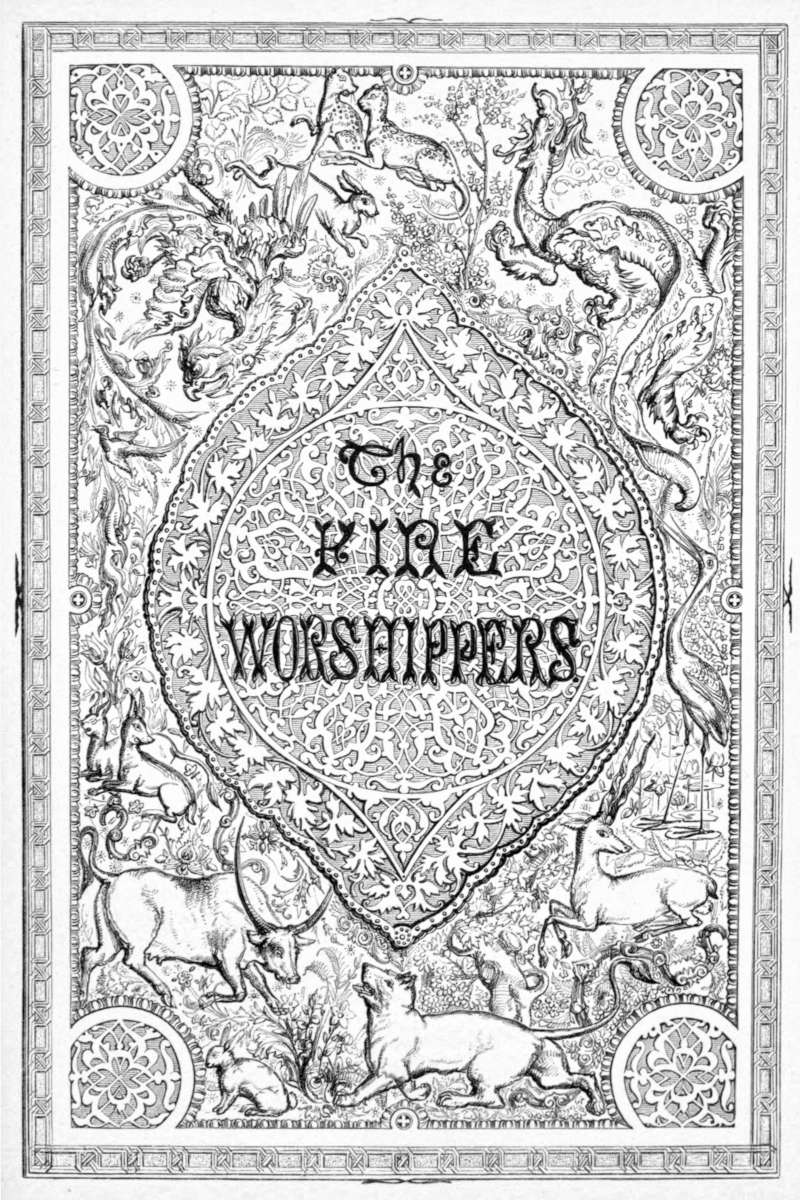
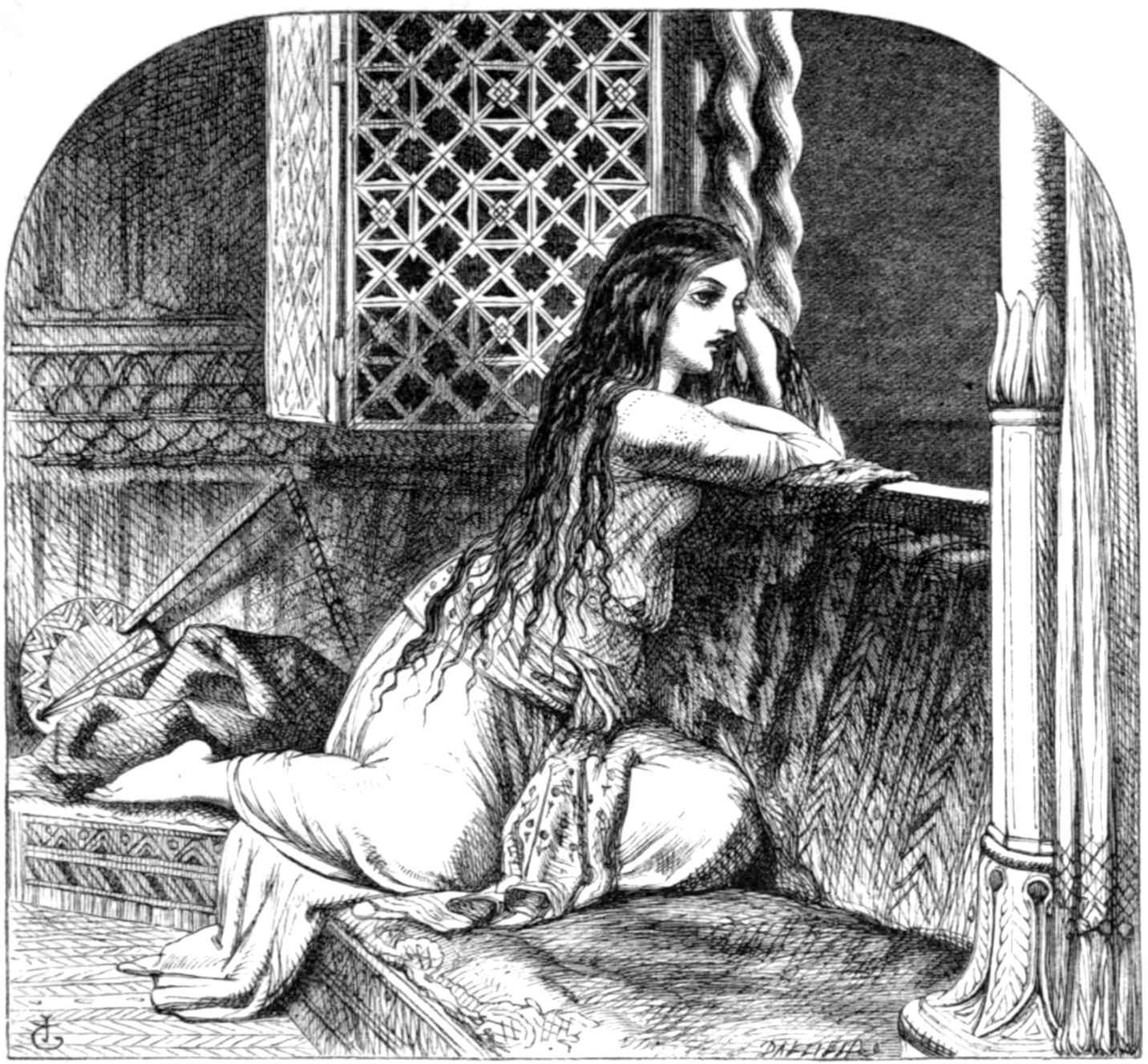
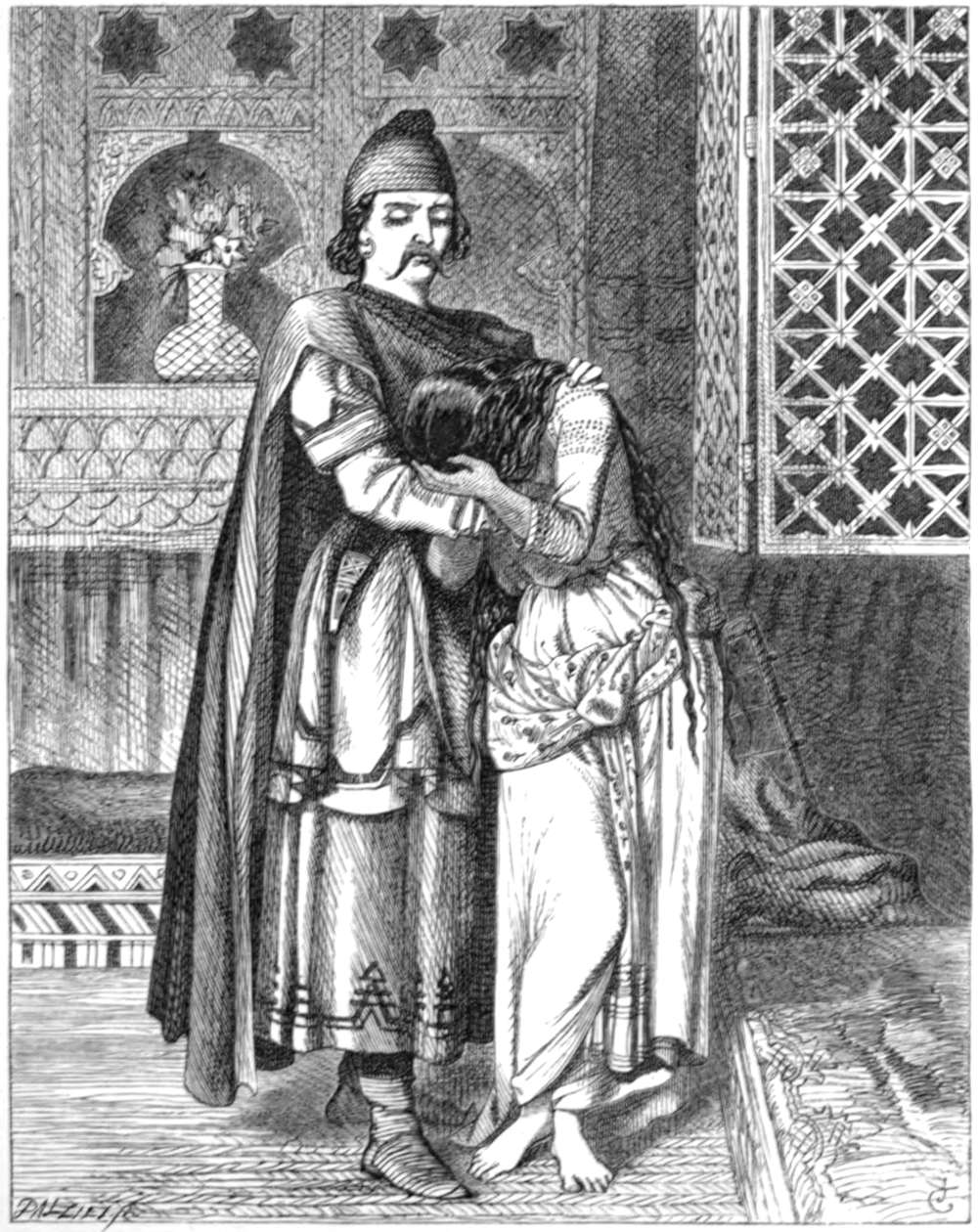
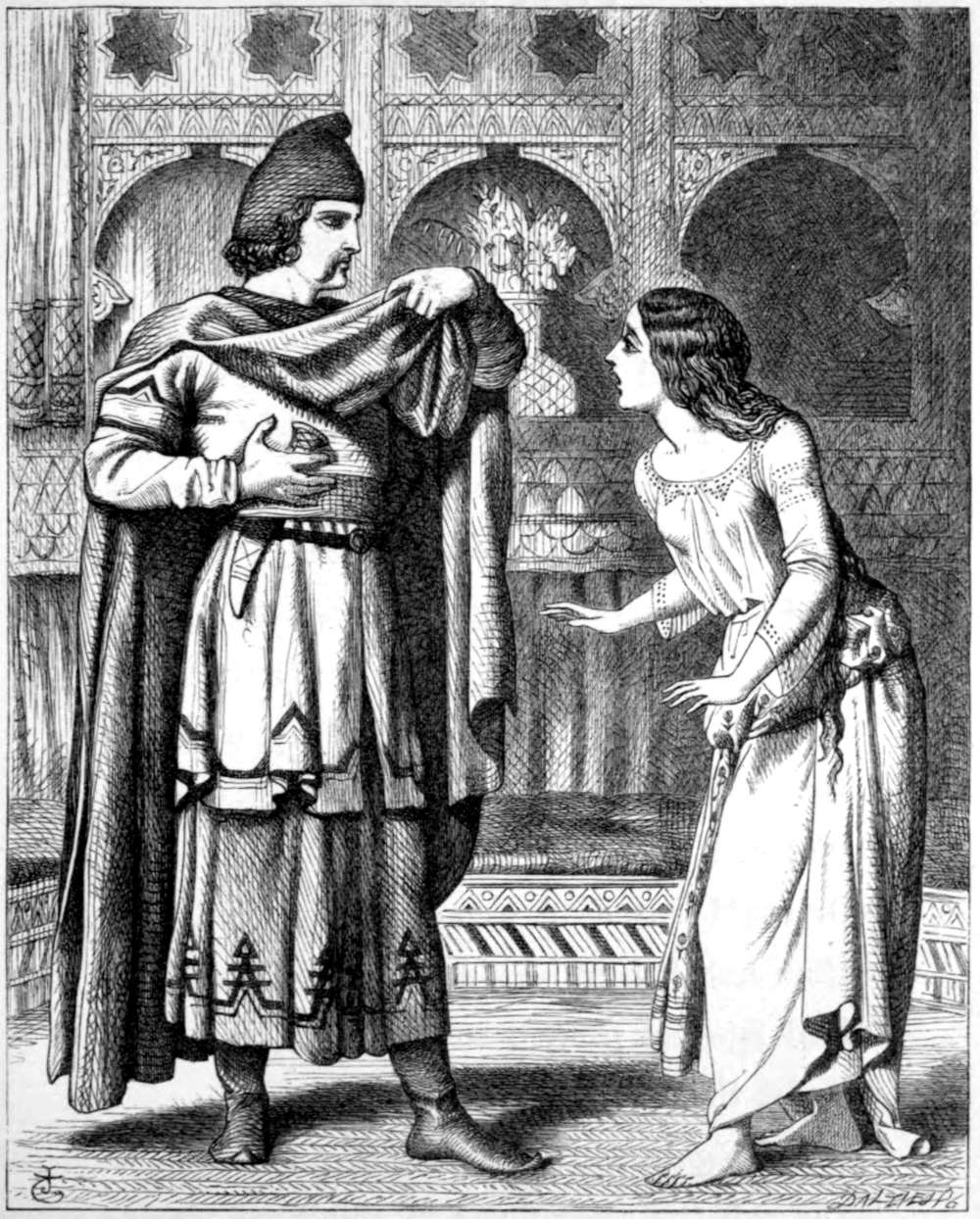
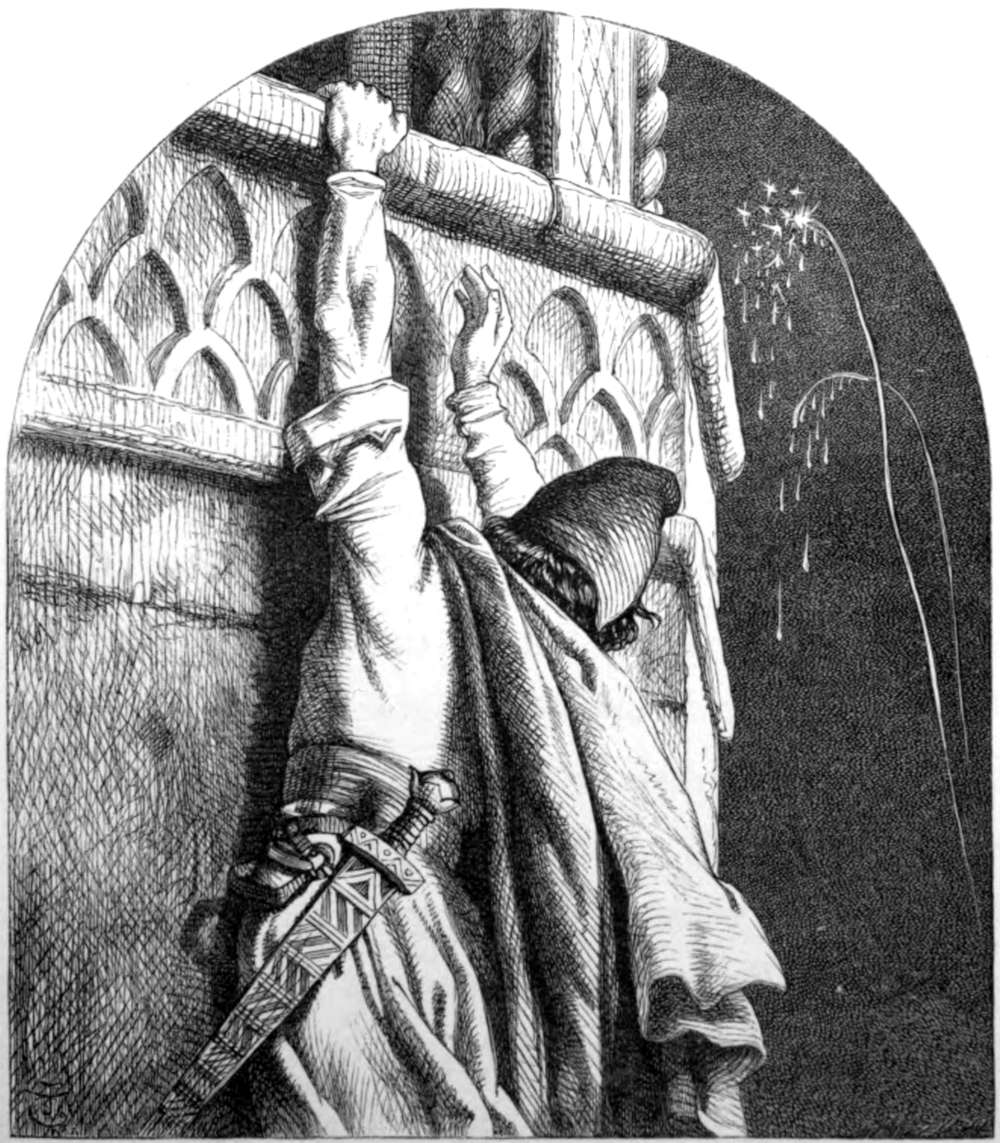
190The Princess, whose heart was sad enough already, could have wished that Feramorz had chosen a less melancholy story; as it is only to the happy that tears are a luxury. Her Ladies, however, were by no means sorry that love was once more the Poet’s theme; for, whenever he spoke of love, they said, his voice was as sweet as if he had chewed the leaves of that enchanted tree, which grows over the tomb of the musician, Tan-Sein.[235]
Their road all the morning had lain through a very dreary country;—through valleys, covered with a low bushy jungle, where, in more than one place, the awful signal of the bamboo staff,[236] with the white flag at its top, reminded the traveller that, in that very spot, the tiger had made some human creature his victim. It was, therefore, with much pleasure that they arrived at sunset in a safe and lovely glen, and encamped under one of those holy trees, whose smooth columns and spreading roofs seem to destine them for natural temples of religion. Beneath this spacious shade, some pious hands had erected a row of pillars ornamented with the most beautiful porcelain,[237] which now supplied the use 191of mirrors to the young maidens, as they adjusted their hair in descending from the palankeens. Here, while, as usual, the Princess sat listening anxiously, with Fadladeen in one of his loftiest moods of criticism by her side, the young Poet, leaning against a branch of the tree, thus continued his story:—
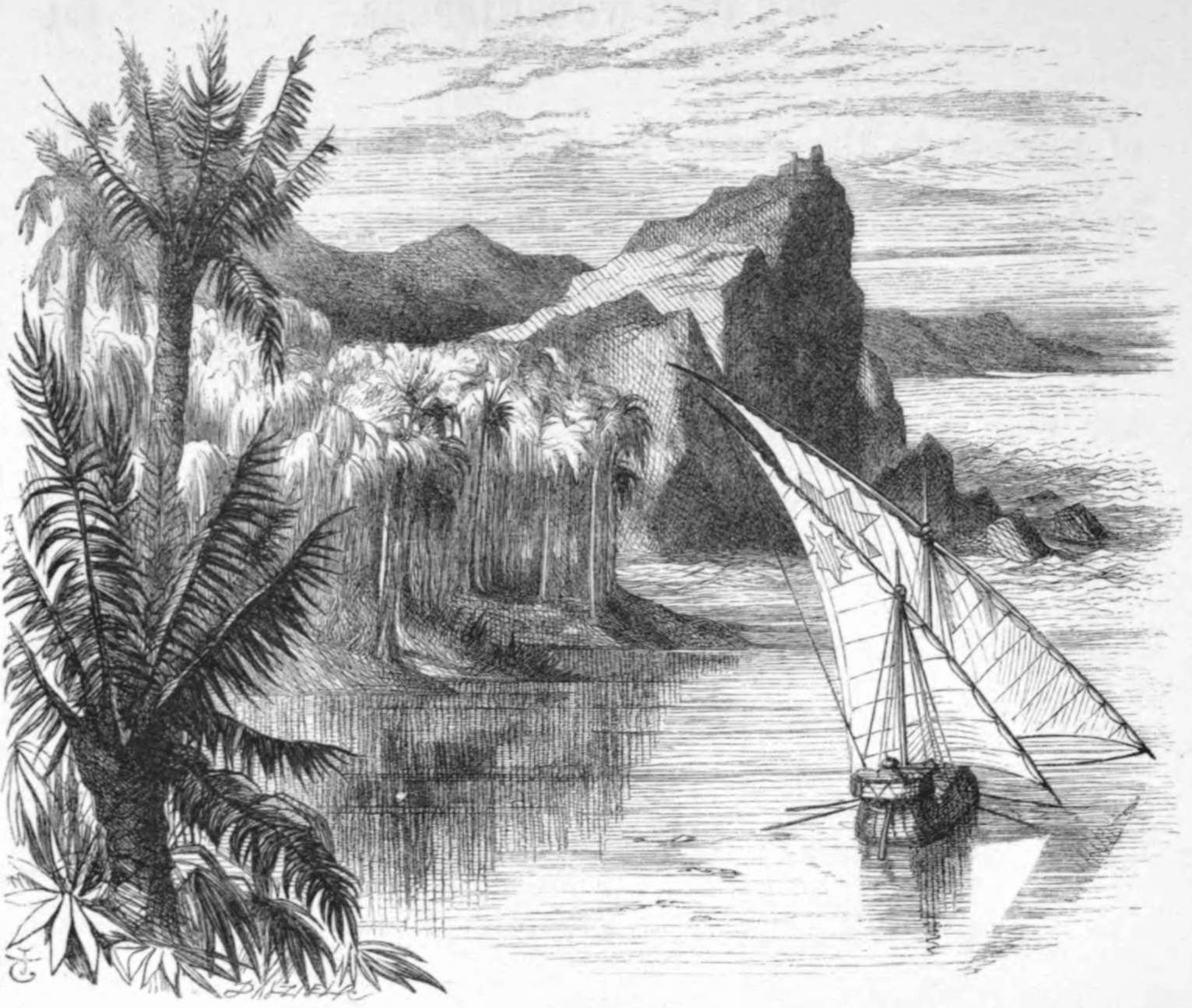
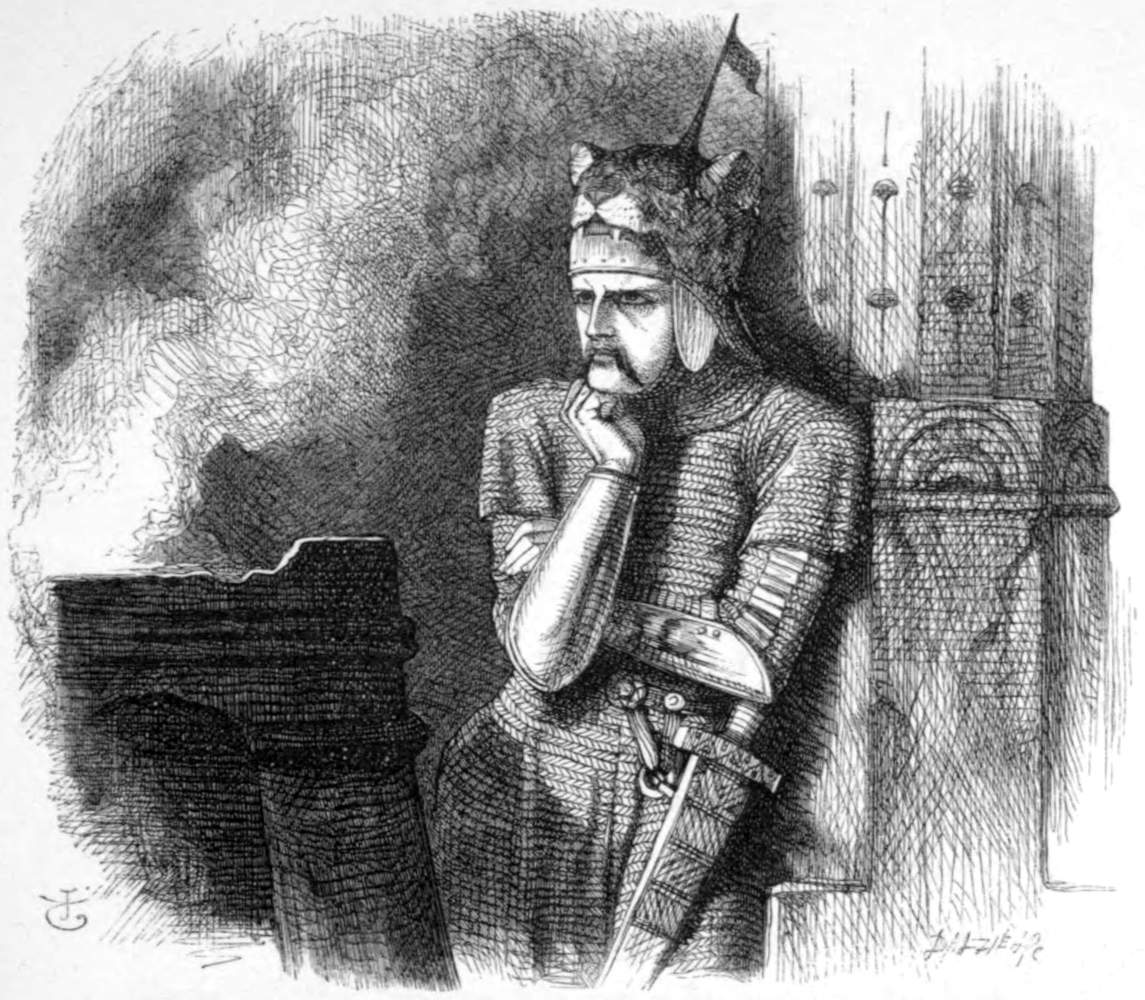
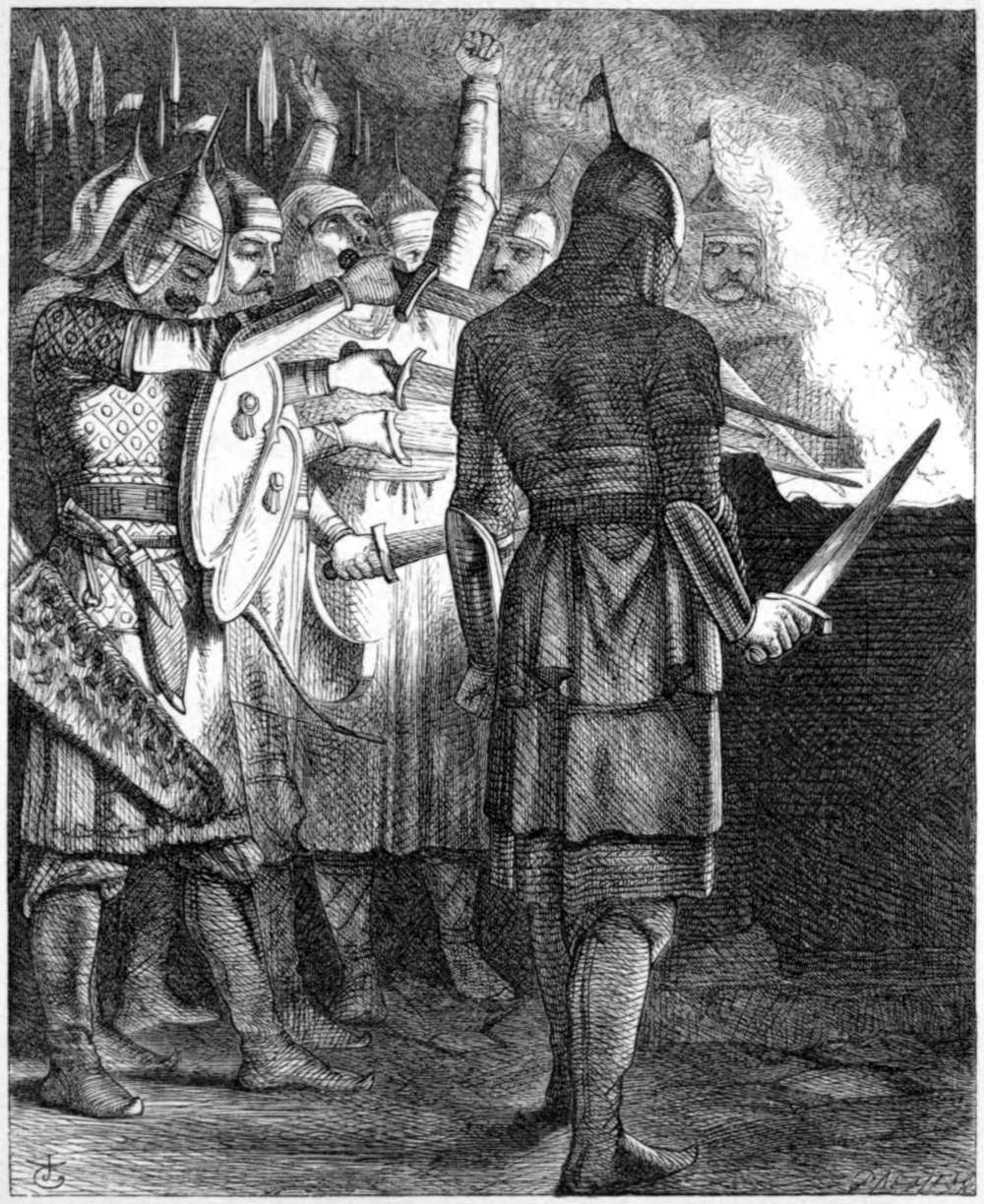
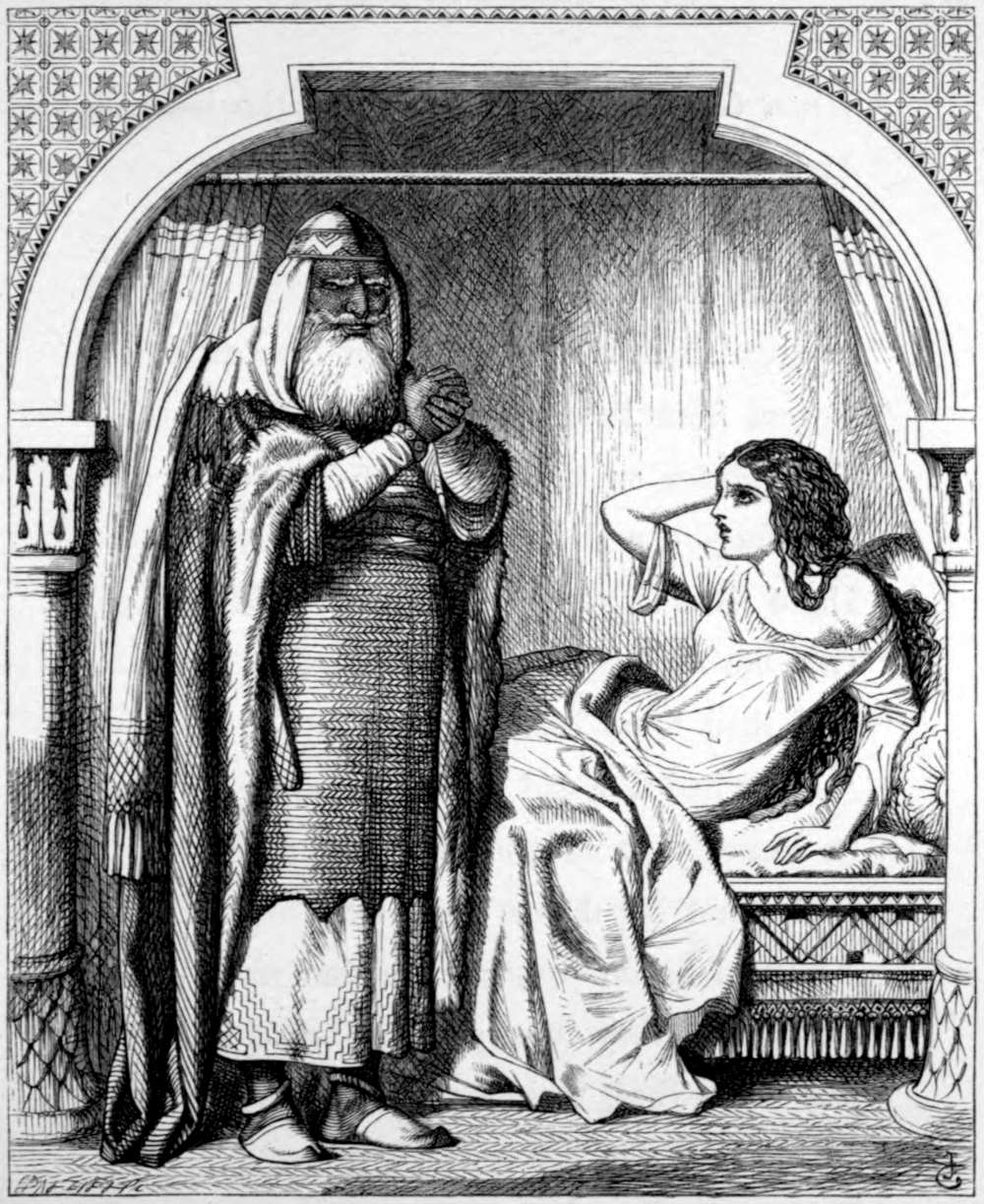
215Lalla Rookh had, the night before, been visited by a dream which, in spite of the impending fate of poor Hafed, made her heart more than usually cheerful during the morning, and gave her cheeks all the freshened animation of a flower that the Bid-musk had just passed over.[266] She fancied that she was sailing on that Eastern Ocean, where the sea-gipsies, who live for ever on the water,[267] enjoy a perpetual summer in wandering from isle to isle, when she saw a small gilded bark approaching her. It was like one of those boats which the Maldivian islanders send adrift, at the mercy of winds and waves, loaded with perfumes, flowers, and odoriferous wood, as an offering to the Spirit whom they call King of the Sea. At first, this little bark appeared to be empty, but, on coming nearer⸺
She had proceeded thus far in relating the dream to her Ladies, when Feramorz appeared at the door of the pavilion. In his presence, of course, every thing else was forgotten, and the continuance of the story was instantly requested by all. Fresh wood of aloes was set to burn in the cassolets;—the violet sherbets[268] were hastily handed round, and after a short prelude on his lute, in the pathetic measure of Nava,[269] which is always used to express the lamentations of absent lovers, the Poet thus continued:—
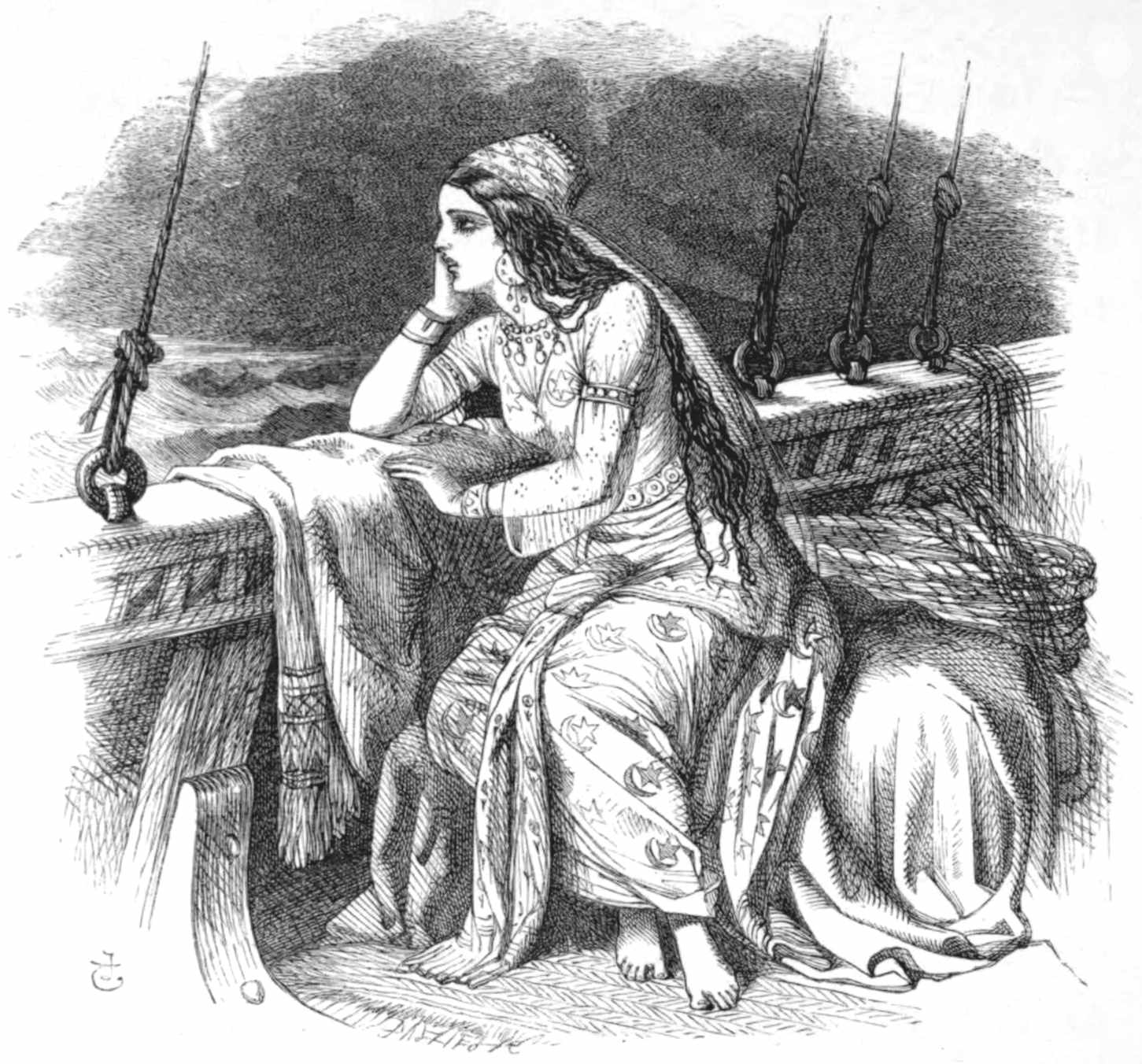
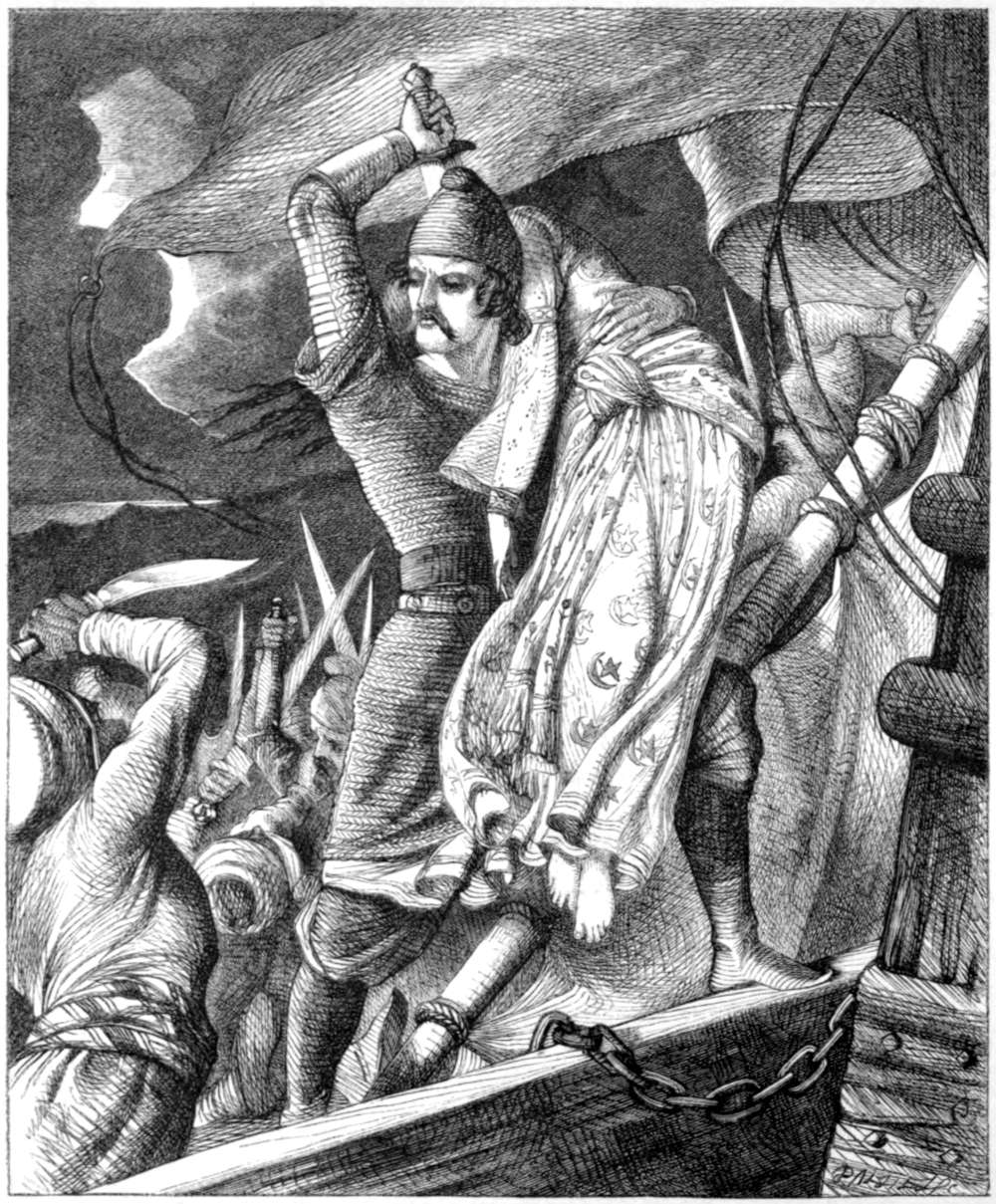
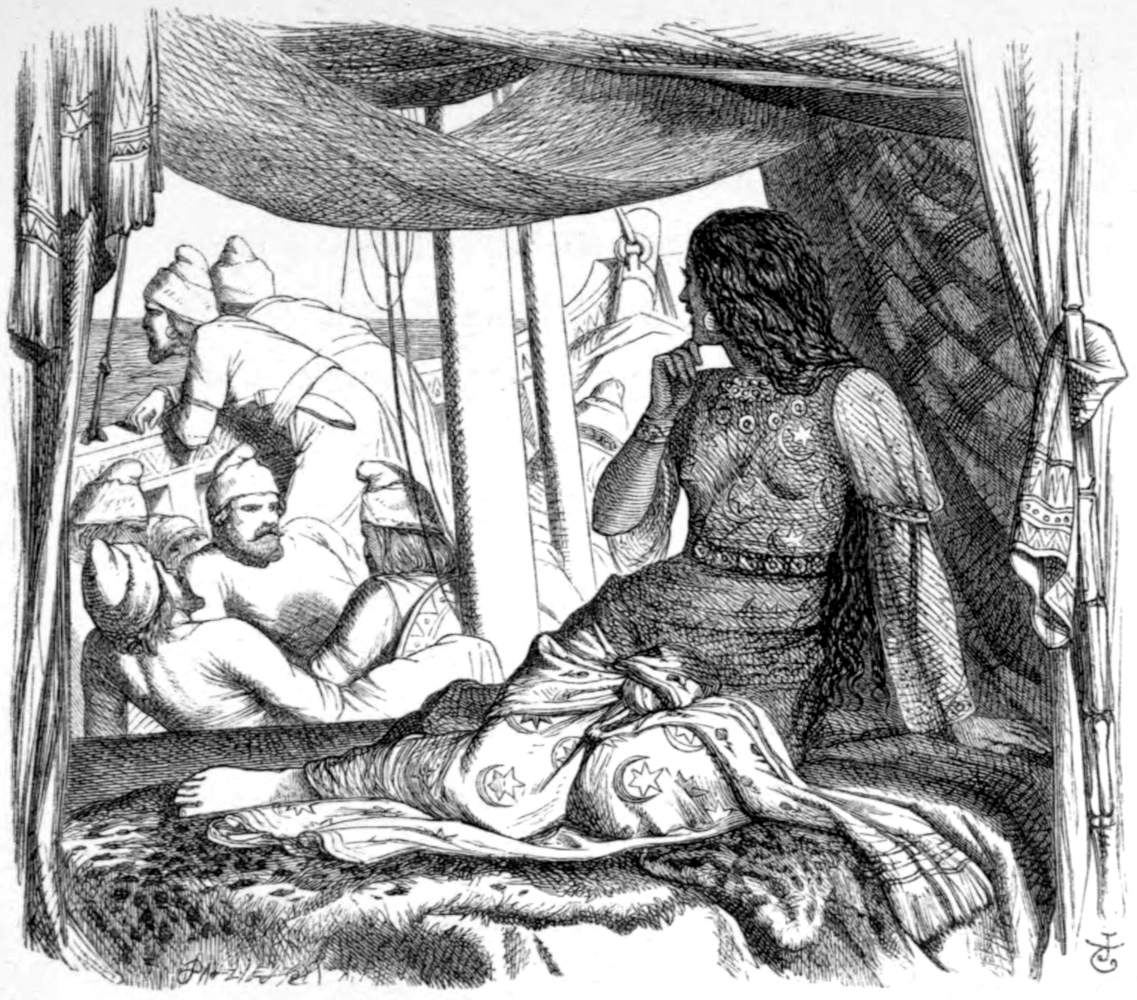
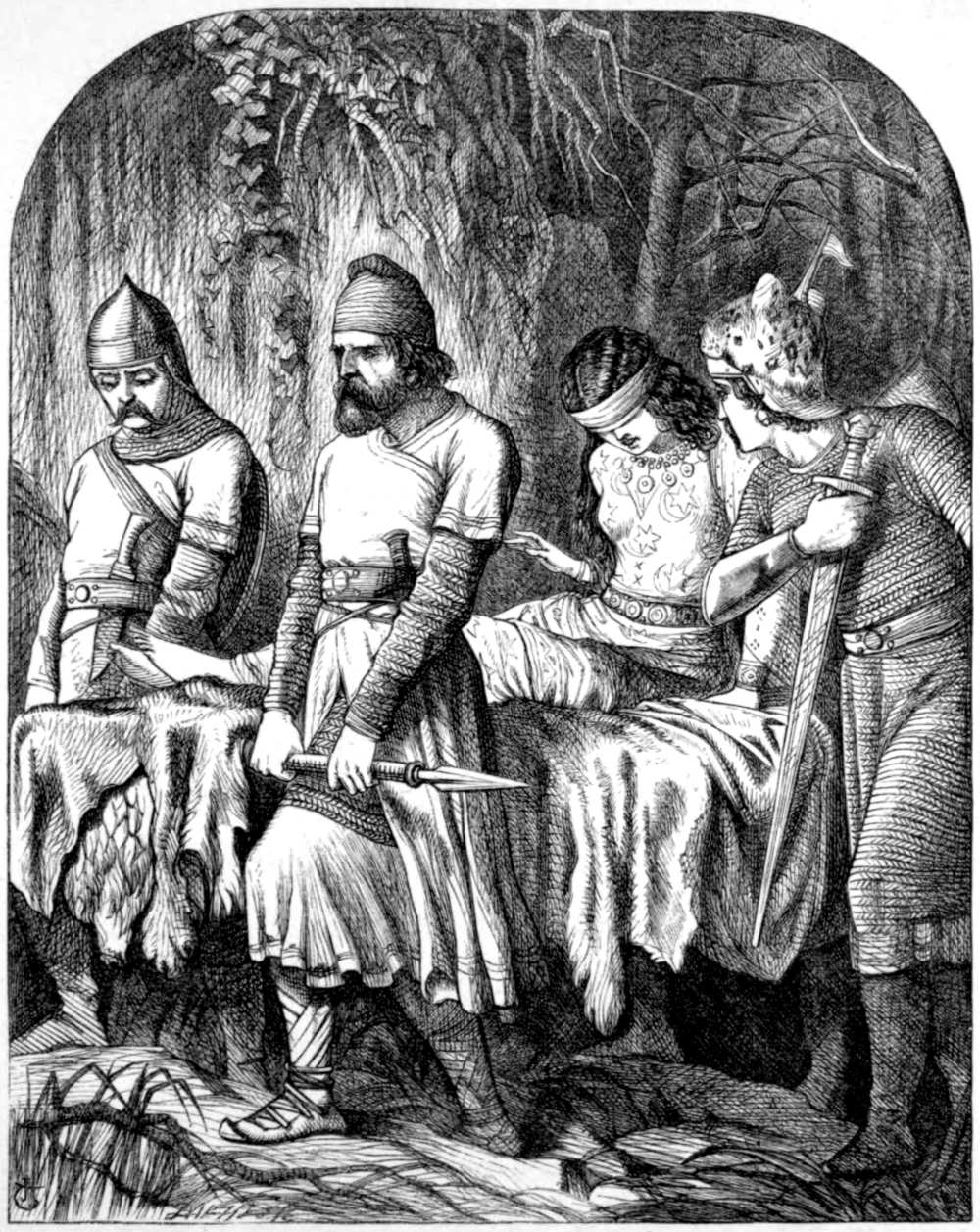
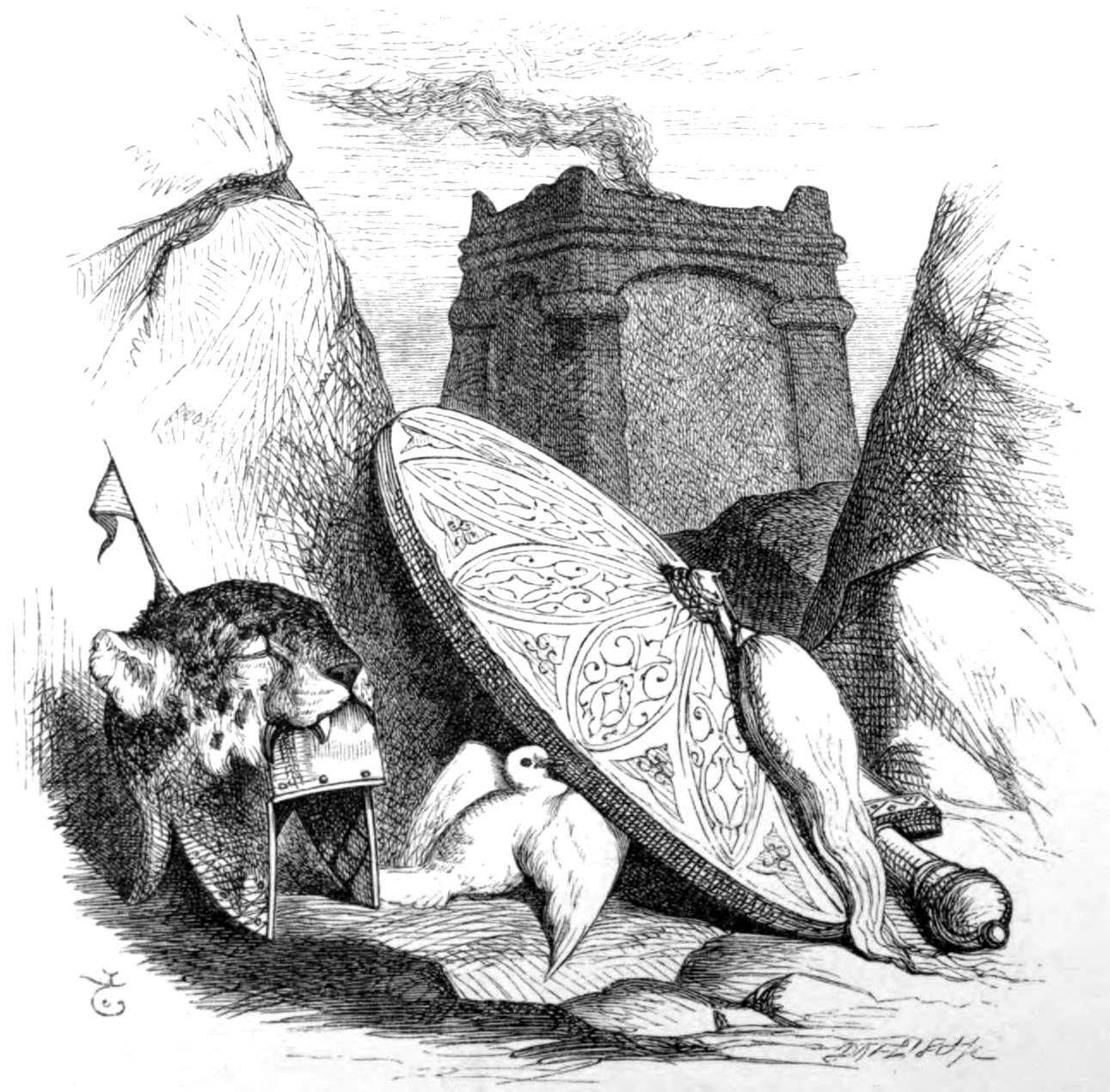
237The next evening Lalla Rookh was entreated by her Ladies to continue the relation of her wonderful dream; but the fearful interest that hung round the fate of Hinda and her lover had completely removed every trace of it from her mind;—much to the disappointment of a fair seer or two in her train, who prided themselves on their skill in interpreting visions, and who had already remarked, as an unlucky omen, that the Princess, on the very morning after the dream, had worn a silk dyed with the blossoms of the sorrowful tree, Nilica.[284]
Fadladeen, whose indignation had more than once broken out during the recital of some parts of this heterodox poem, seemed at length to have made up his mind to the infliction; and took his seat this evening with all the patience of a martyr, while the Poet resumed his profane and seditious story as follows:—
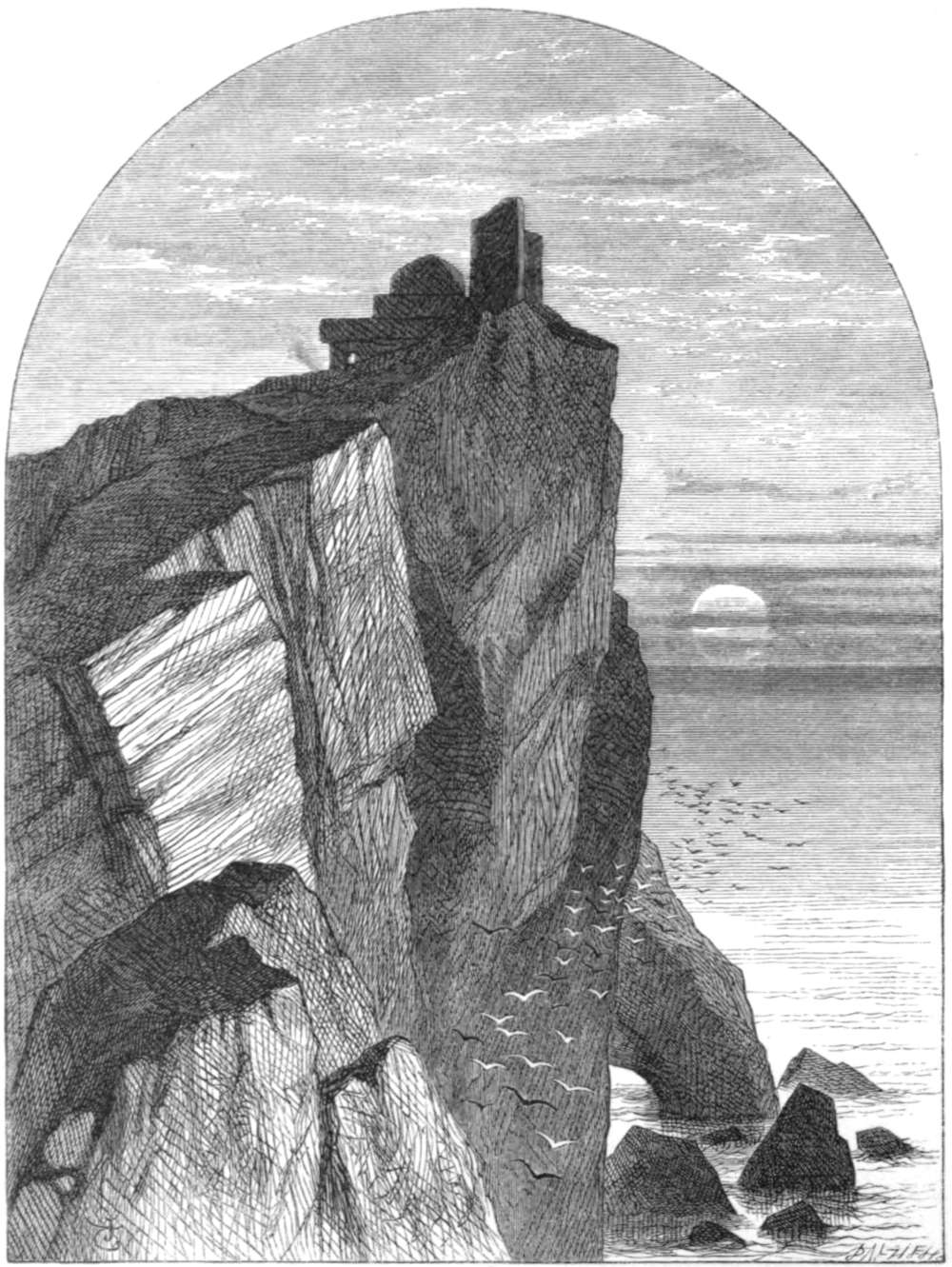
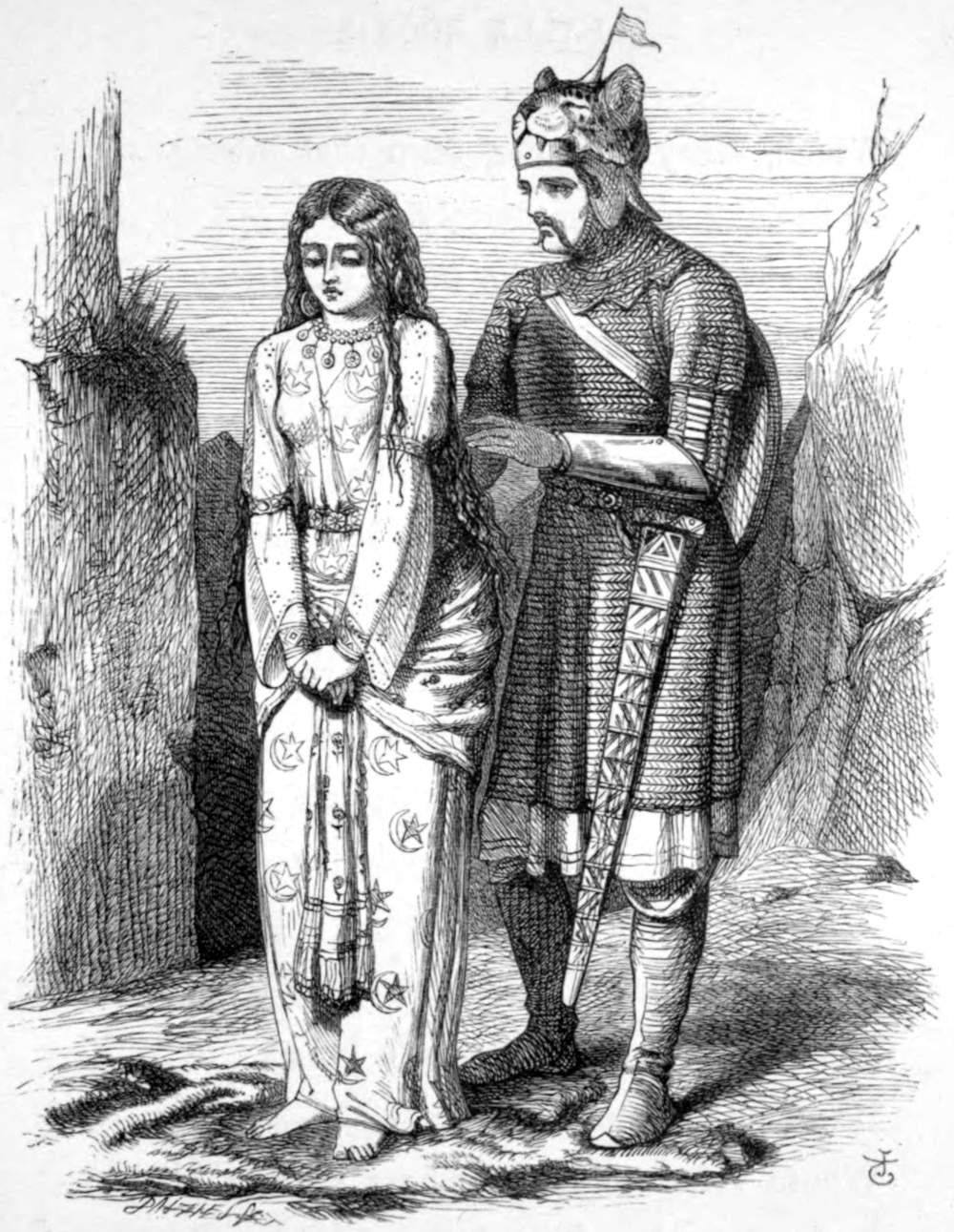
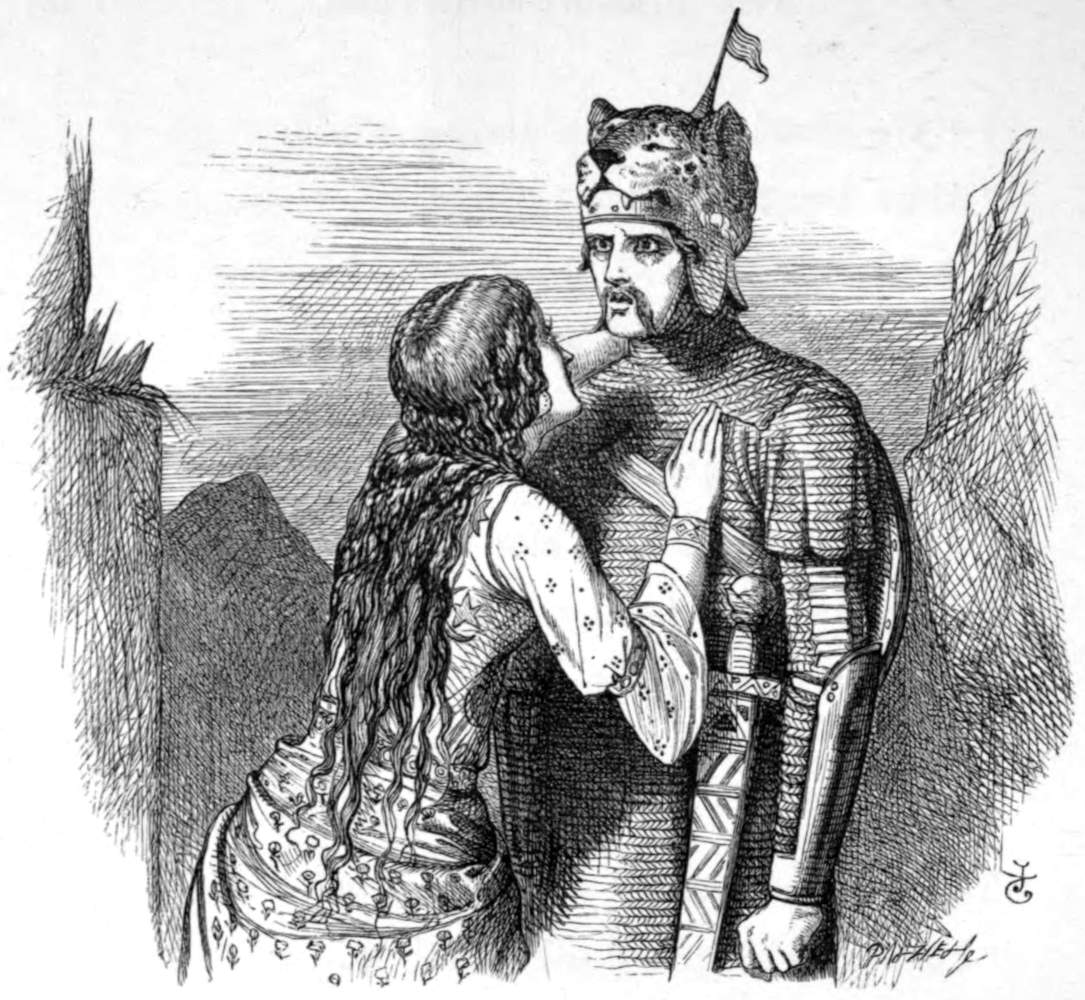
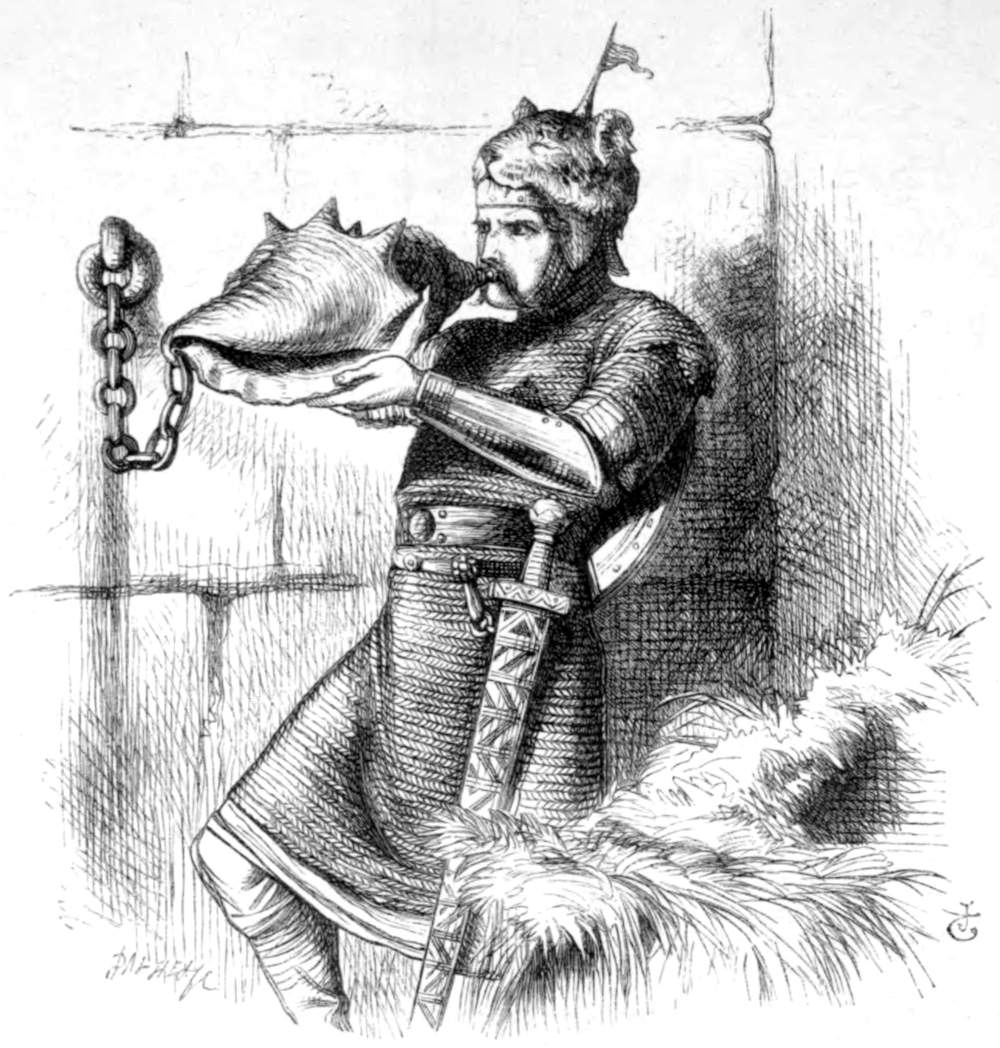
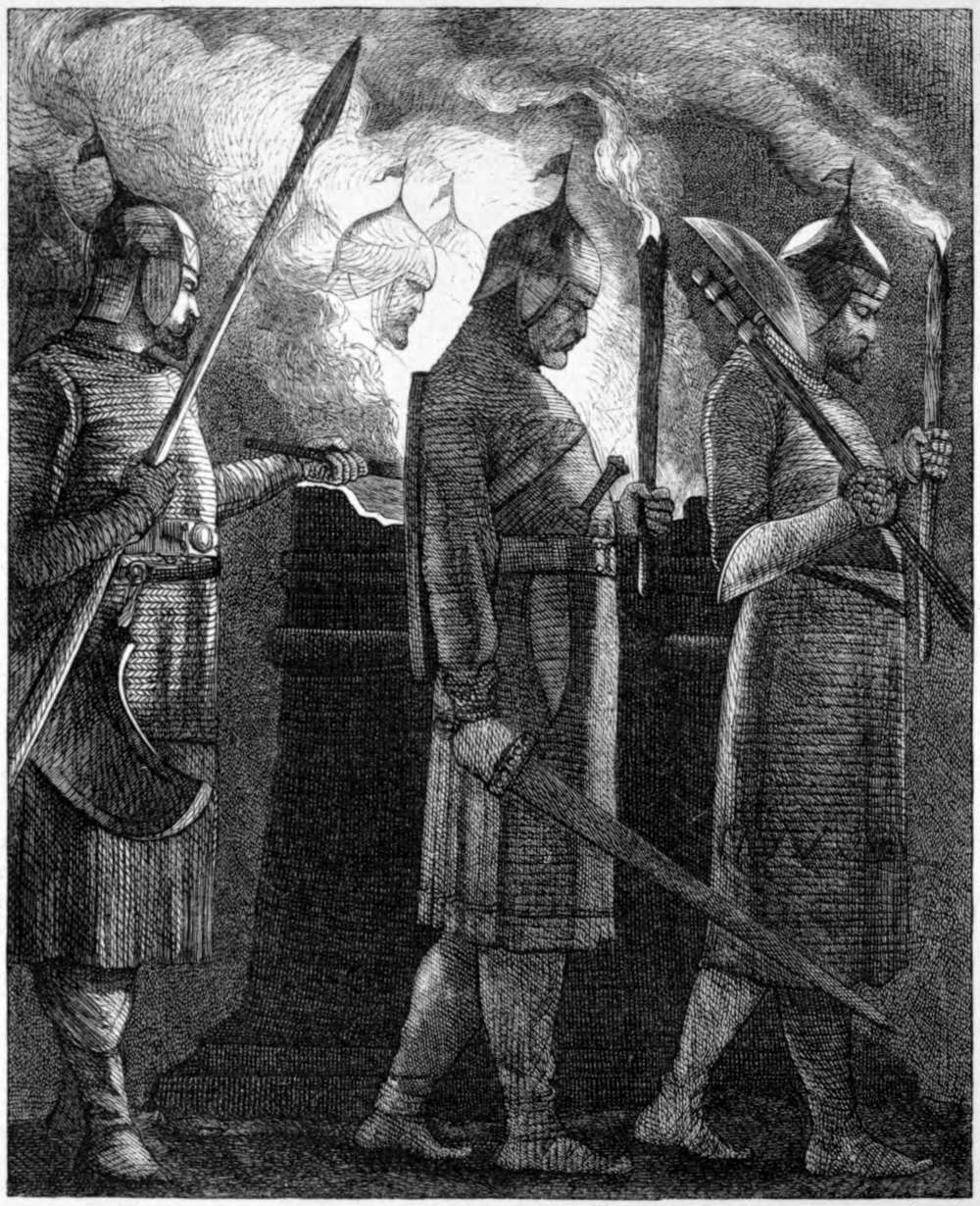
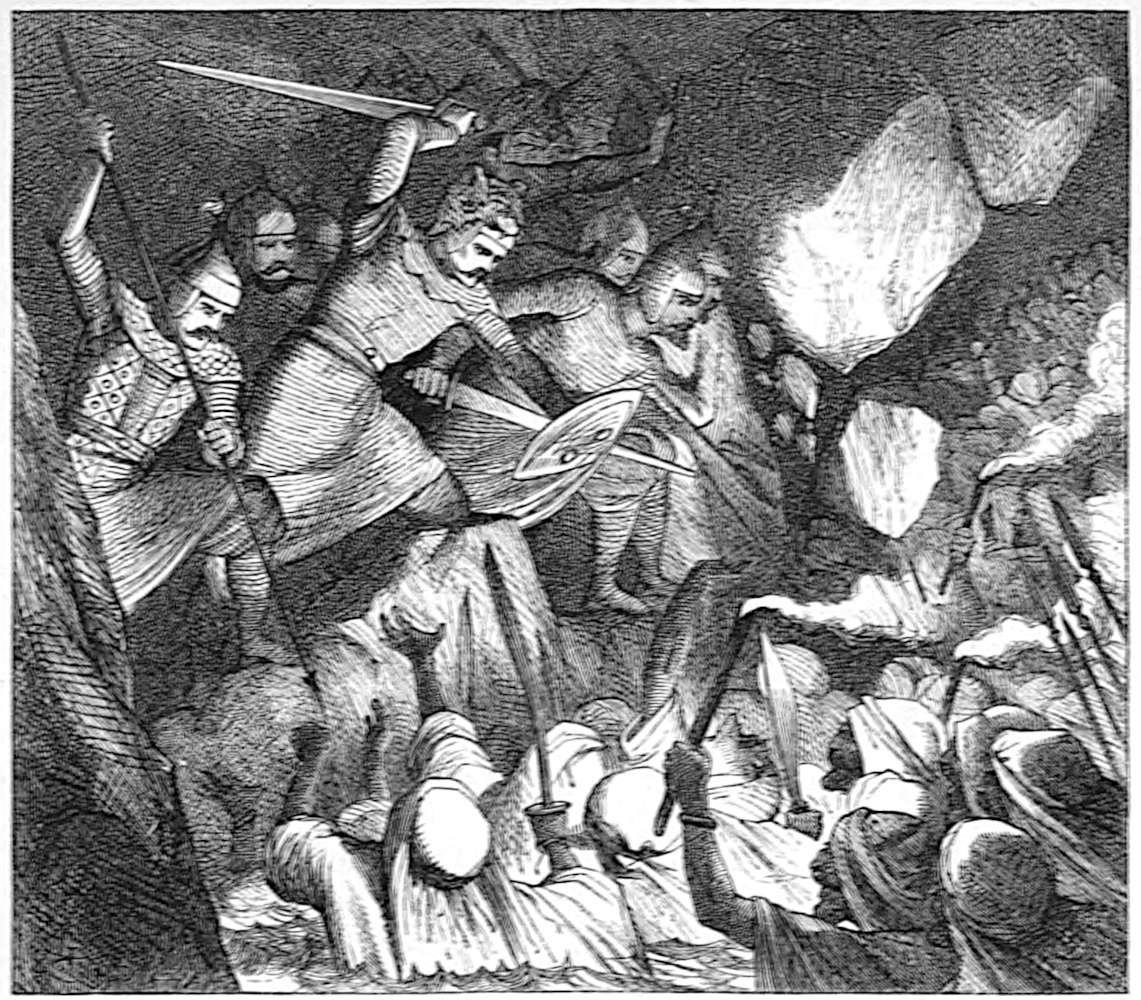
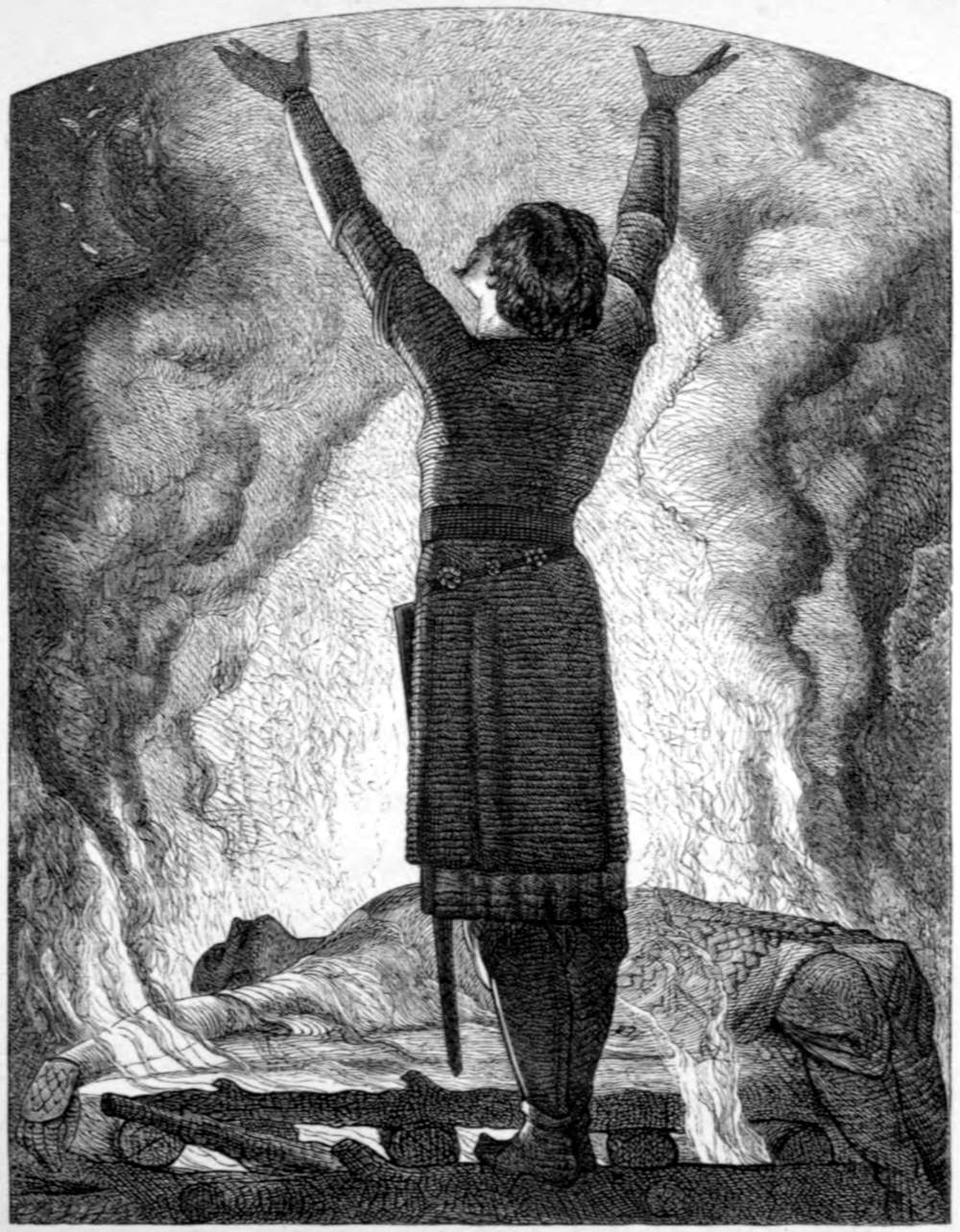

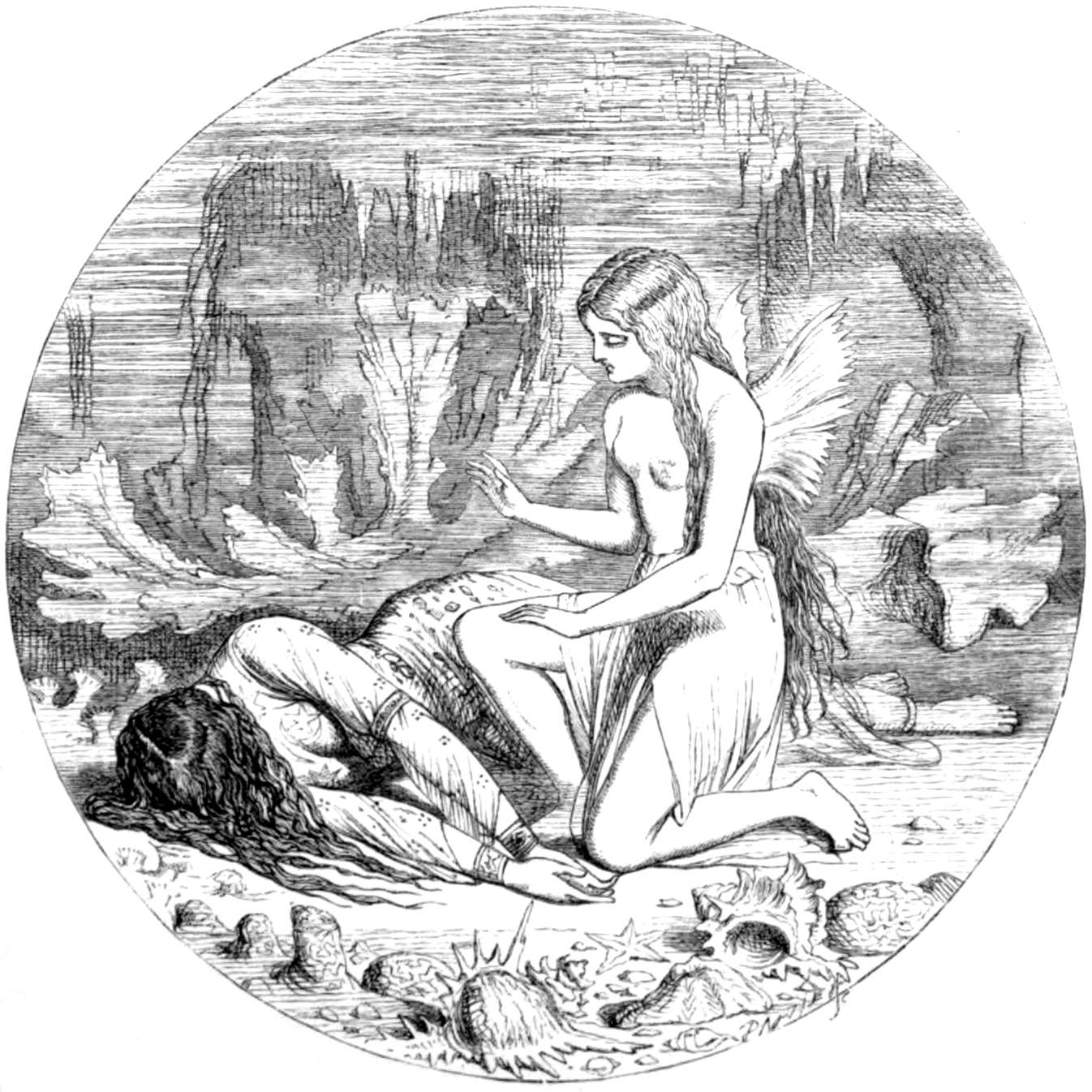
278The singular placidity with which Fadladeen had listened, during the latter part of this obnoxious story, surprised the Princess and Feramorz exceedingly; and even inclined towards him the hearts of these unsuspicious young persons, who little knew the source of a complacency so marvellous. The truth was, he had been organising, for the last few days, a most notable plan of persecution against the poet, in consequence of some passages that had fallen from him on the second evening of recital,—which appeared to this worthy Chamberlain to contain language and principles, for which nothing short of the summary criticism of the Chabuk[301] would be advisable. It was his intention, therefore, immediately on their arrival at Cashmere, to give information to the King of Bucharia of the very dangerous sentiments of his minstrel; and if, unfortunately, that monarch did not act with suitable vigour on the occasion, (that is, if he did not give the Chabuk to Feramorz, and a place to Fadladeen,) there would be an end, he feared, of all legitimate government in Bucharia. He could not help, however, auguring better both for himself and the cause of potentates in general; and it was the pleasure arising from these mingled anticipations that diffused such unusual satisfaction through his features, and made his eyes shine out, like poppies of the desert, over the wide and lifeless wilderness of that countenance.
279Having decided upon the Poet’s chastisement in this manner, he thought it but humanity to spare him the minor tortures of criticism. Accordingly, when they assembled the following evening in the pavilion, and Lalla Rookh was expecting to see all the beauties of her bard melt away, one by one, in the acidity of criticism, like pearls in the cup of the Egyptian queen,—he agreeably disappointed her, by merely saying, with an ironical smile, that the merits of such a poem deserved to be tried at a much higher tribunal; and then suddenly passed off into a panegyric upon all Mussulman sovereigns, more particularly his august and Imperial master, Aurungzebe,—the wisest and best of the descendants of Timur,—who, among other great things he had done for mankind, had given to him, Fadladeen, the very profitable posts of Betel-carrier, and Taster of Sherbets to the Emperor, Chief Holder of the Girdle of Beautiful Forms,[302] and Grand Nazir, or Chamberlain of the Haram.
They were now not far from that Forbidden River,[303] beyond which no pure Hindoo can pass; and were reposing for a time in the rich valley of Hussun Abdaul, which had always been a favourite resting-place of the Emperors in their annual migrations to Cashmere. Here often had the Light of the Faith, Jehan-Guire, been known to wander with his beloved and beautiful Nourmahal: and 280here would Lalla Rookh have been happy to remain for ever, giving up the throne of Bucharia and the world, for Feramorz and love in this sweet, lonely valley. But the time was now fast approaching when she must see him no longer,—or, what was still worse, behold him with eyes whose every look belonged to another; and there was a melancholy preciousness in these last moments, which made her heart cling to them as it would to life. During the latter paid of the journey, indeed, she had sunk into a deep sadness, from which nothing but the presence of the young minstrel could awake her. Like those lamps in tombs, which only light up when the air is admitted, it was only at his approach that her eyes became smiling and animated. But here, in this dear valley, every moment appeared an age of pleasure; she saw him all day, and was, therefore, all day happy,—resembling, she often thought, that people of Zinge, who attribute the unfading cheerfulness they enjoy to one genial star that rises nightly over their heads.[304]
The whole party, indeed, seemed in their liveliest mood during the few days they passed in this delightful solitude. The young attendants of the Princess, who were here allowed a much freer range than they could safely be indulged with in a less sequestered place, ran wild among the gardens and bounded through the meadows, lightly 281as young roes over the aromatic plains of Tibet. While Fadladeen, in addition to the spiritual comfort derived by him from a pilgrimage to the tomb of the Saint from whom the valley is named, had also opportunities of indulging, in a small way, his taste for victims, by putting to death some hundreds of those unfortunate little lizards,[305] which all pious Mussulmans make it a point to kill;—taking for granted, that the manner in which the creature hangs its head is meant as a mimicry of the attitude in which the Faithful say their prayers.
About two miles from Hussun Abdaul were those Royal Gardens,[306] which had grown beautiful under the care of so many lovely eyes, and were beautiful still, though those eyes could see them no longer. This place, with its flowers, and its holy silence, interrupted only by the dipping of the wings of birds in its marble basins filled with the pure water of those hills, was to Lalla Rookh all that her heart could fancy of fragrance, coolness, and almost heavenly tranquillity. As the Prophet said of Damascus, “it was too delicious;”[307]—and here, in listening to the sweet voice of Feramorz, or reading in his eyes what yet he never dared to tell her, the most exquisite moments of her whole life were passed. One evening, when they had been talking of the Sultana Nourmahal, the Light of the Haram,[308] who had so often 282wandered among these flowers, and fed with her own hands, in those marble basins, the small shining fishes of which she was so fond,[309]—the youth, in order to delay the moment of separation, proposed to recite a short story, or rather rhapsody, of which this adored Sultana was the heroine. It related, he said, to the reconcilement of a sort of lovers’ quarrel which took place between her and the Emperor during a Feast of Roses at Cashmere; and would remind the Princess of that difference between Haroun-al-Raschid and his fair mistress Marida,[310] which was so happily made up by the soft strains of the musician, Moussali. As the story was chiefly to be told in song, and Feramorz had unluckily forgotten his own lute in the valley, he borrowed the vina of Lalla Rookh’s little Persian slave, and thus began:—
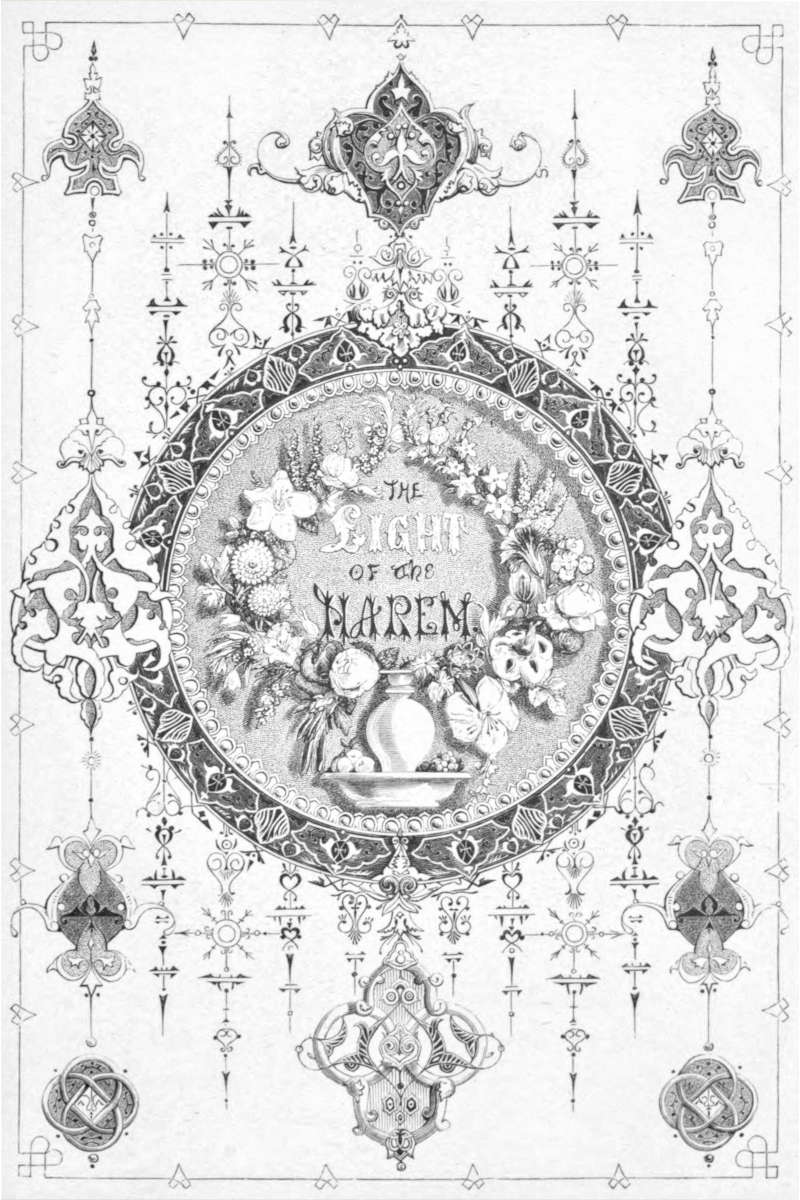
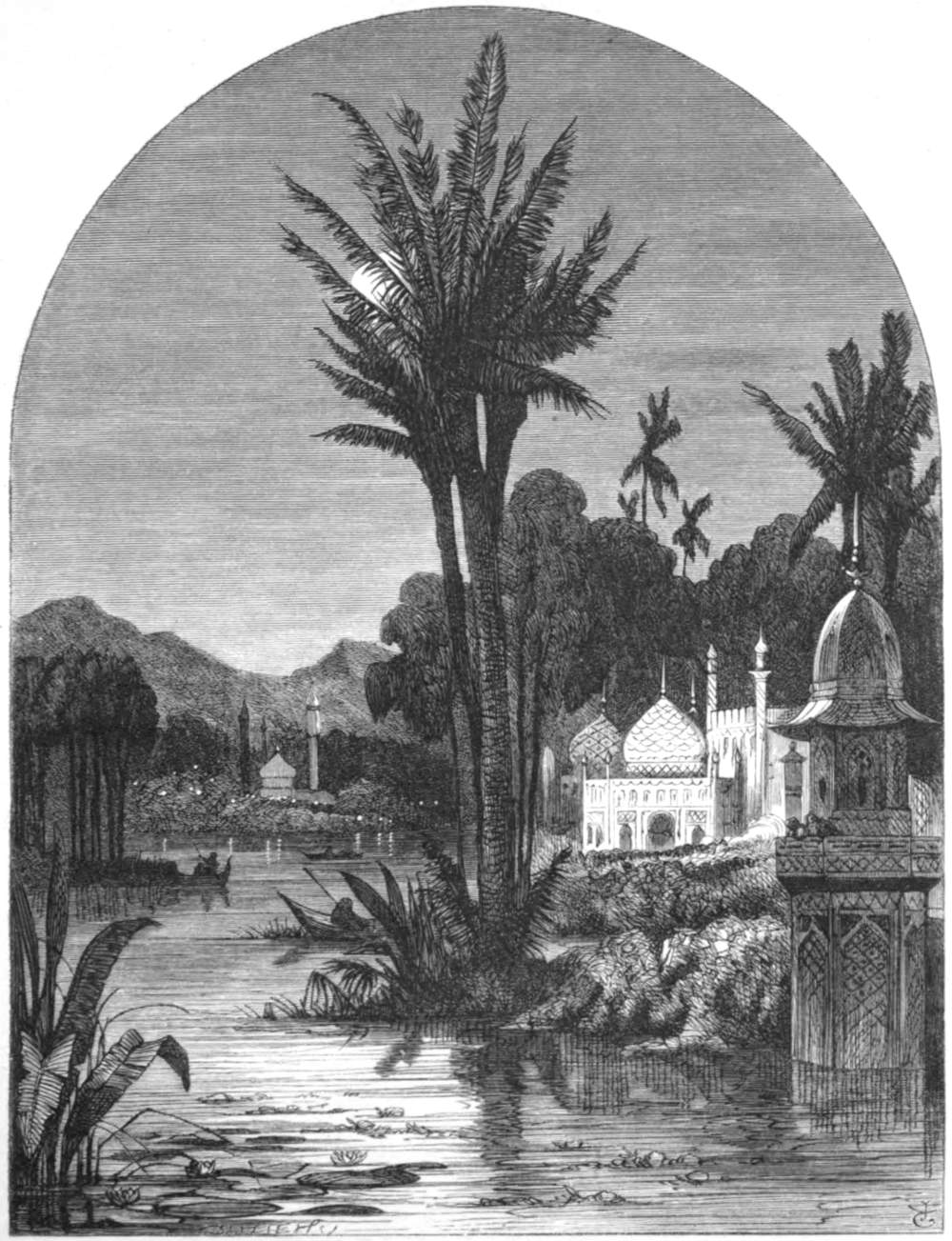
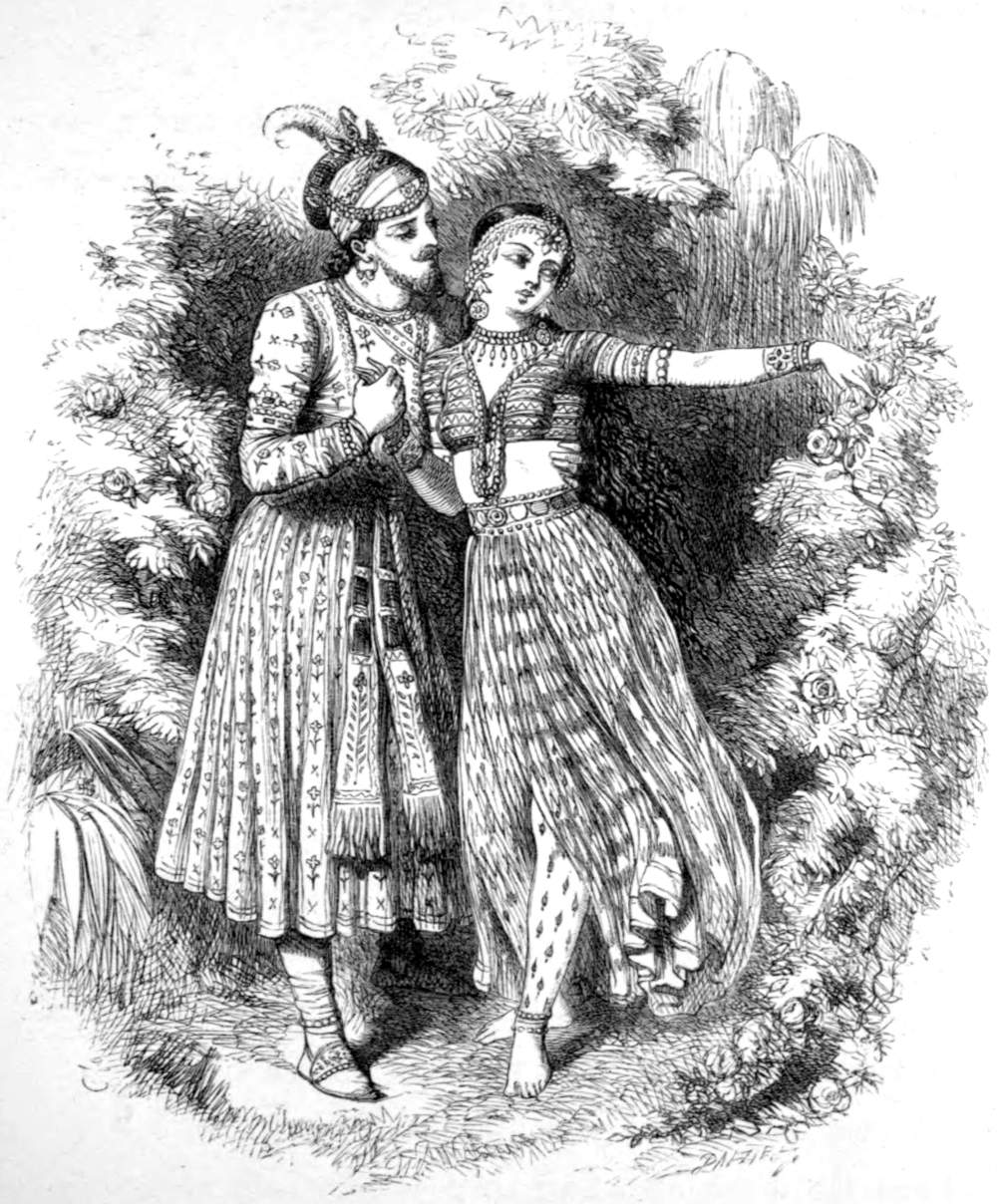
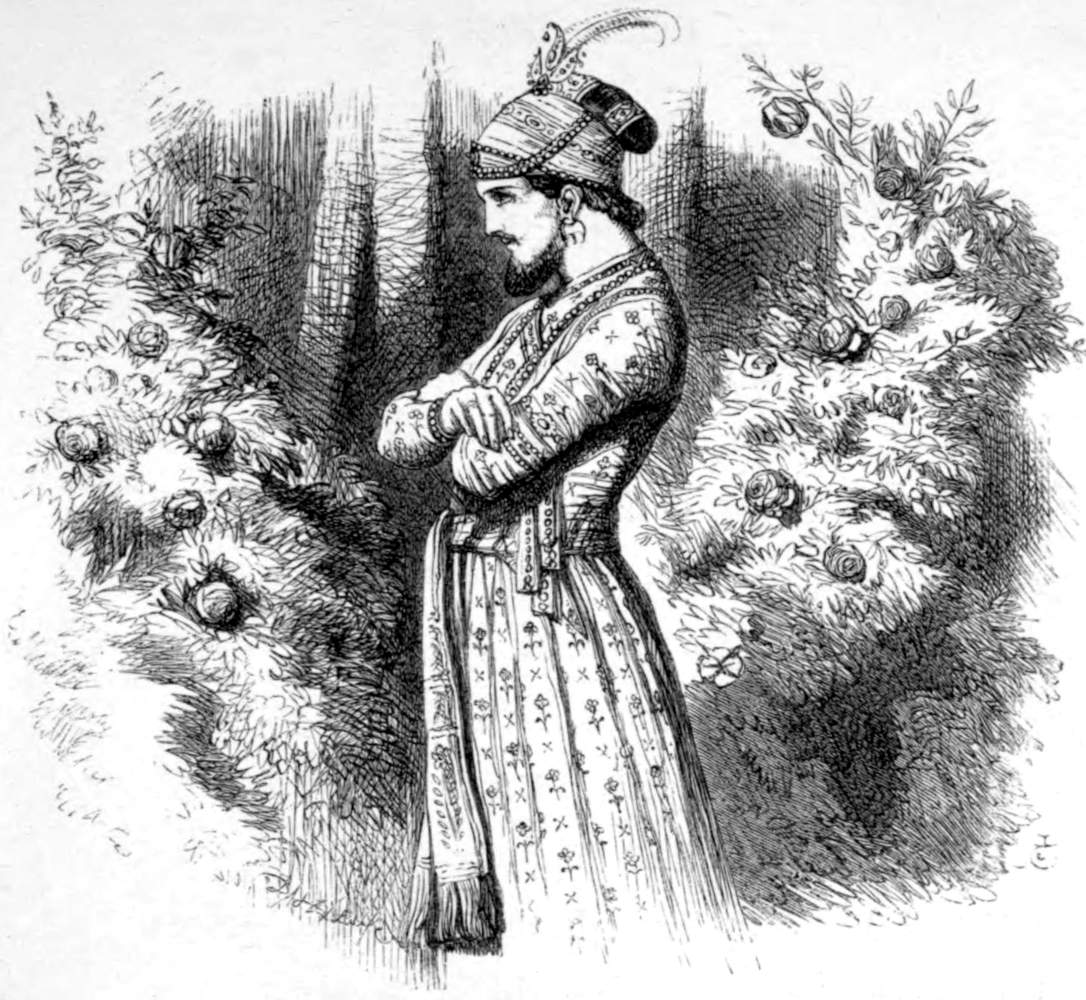
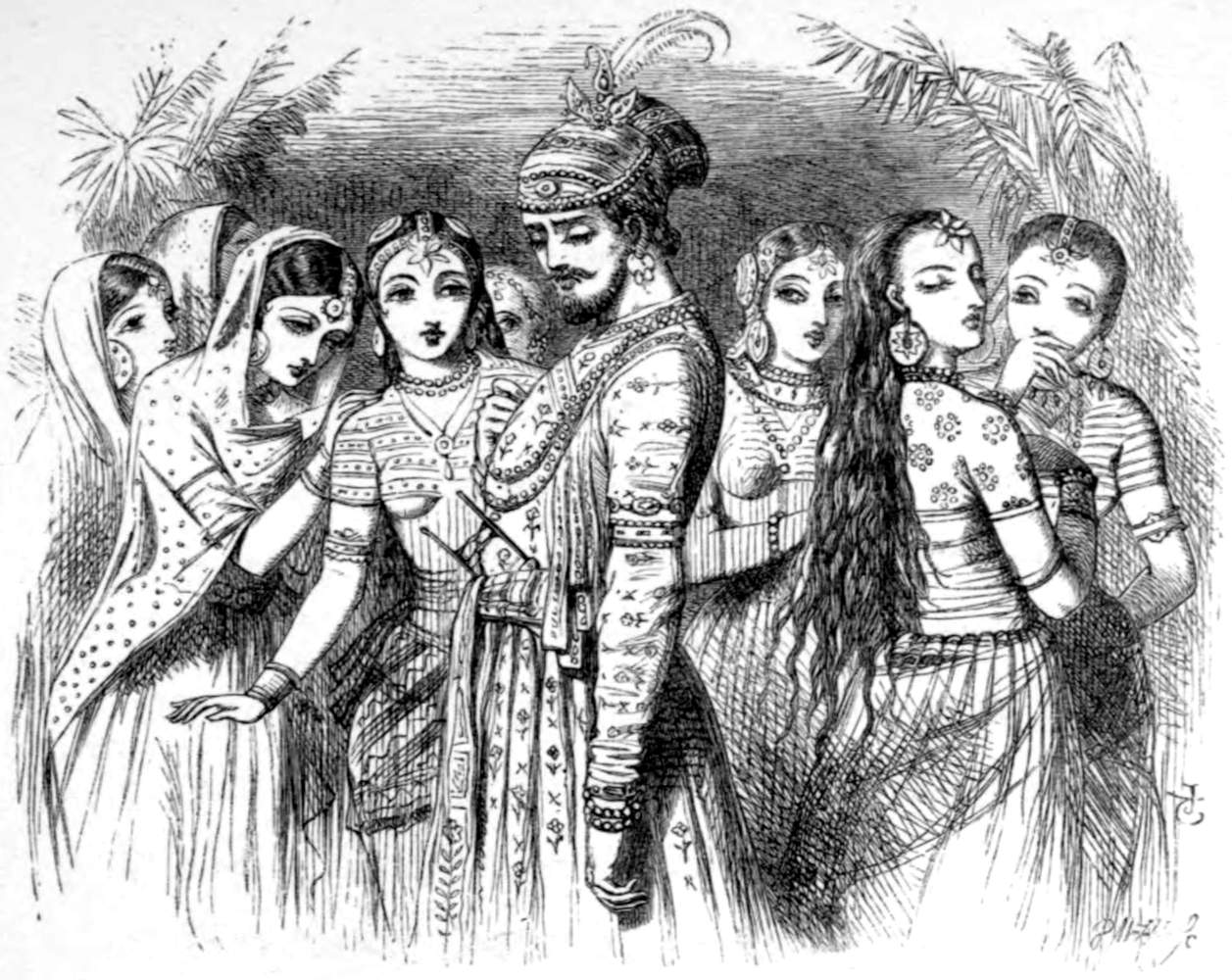
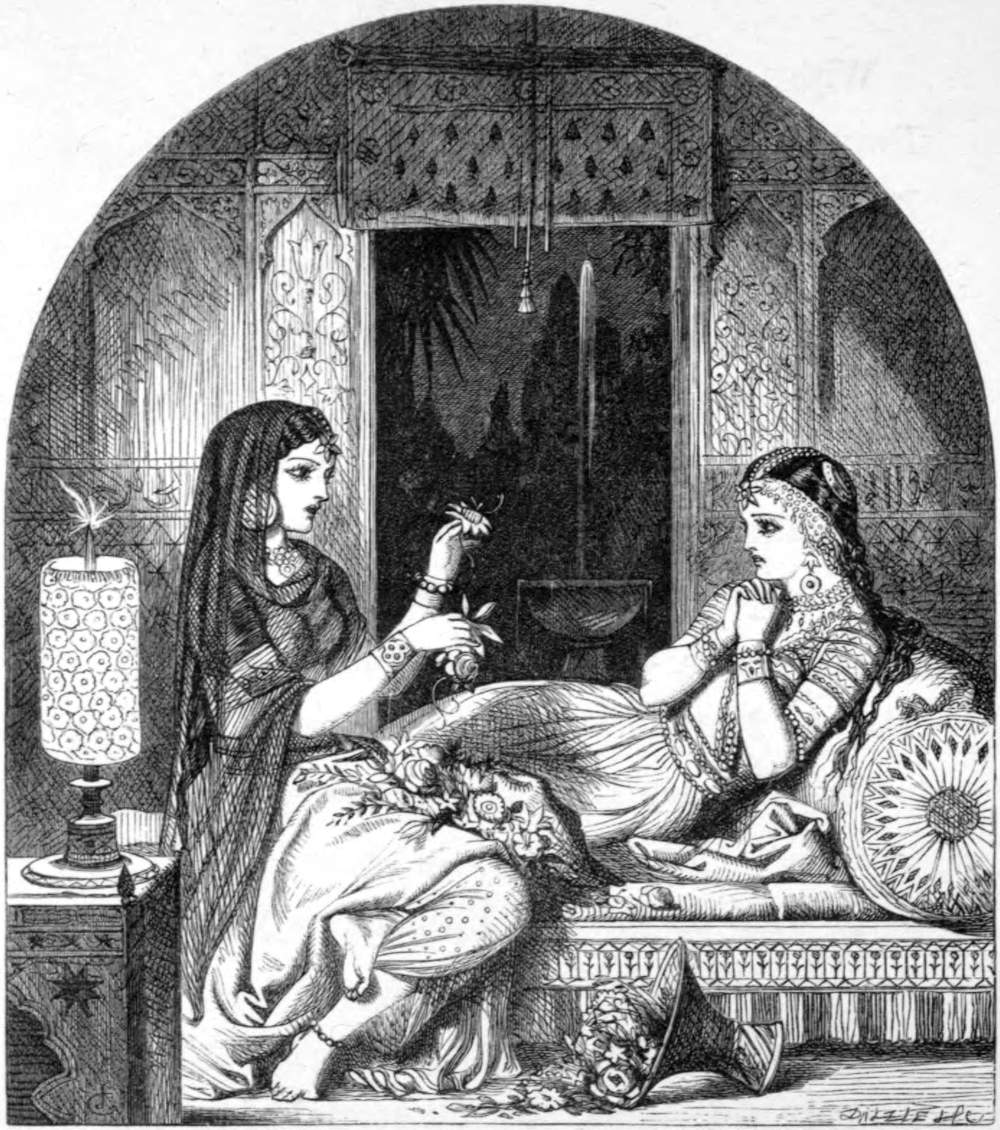
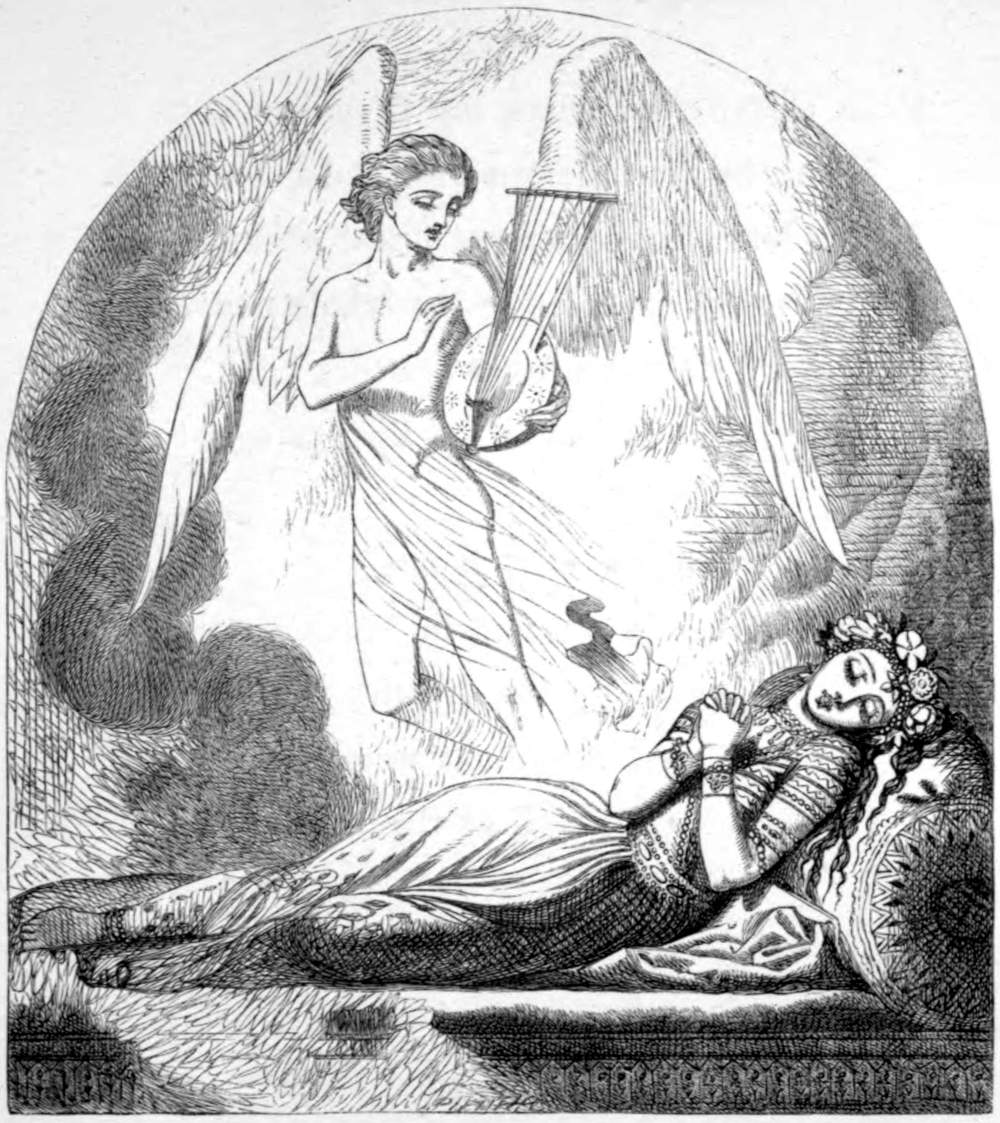
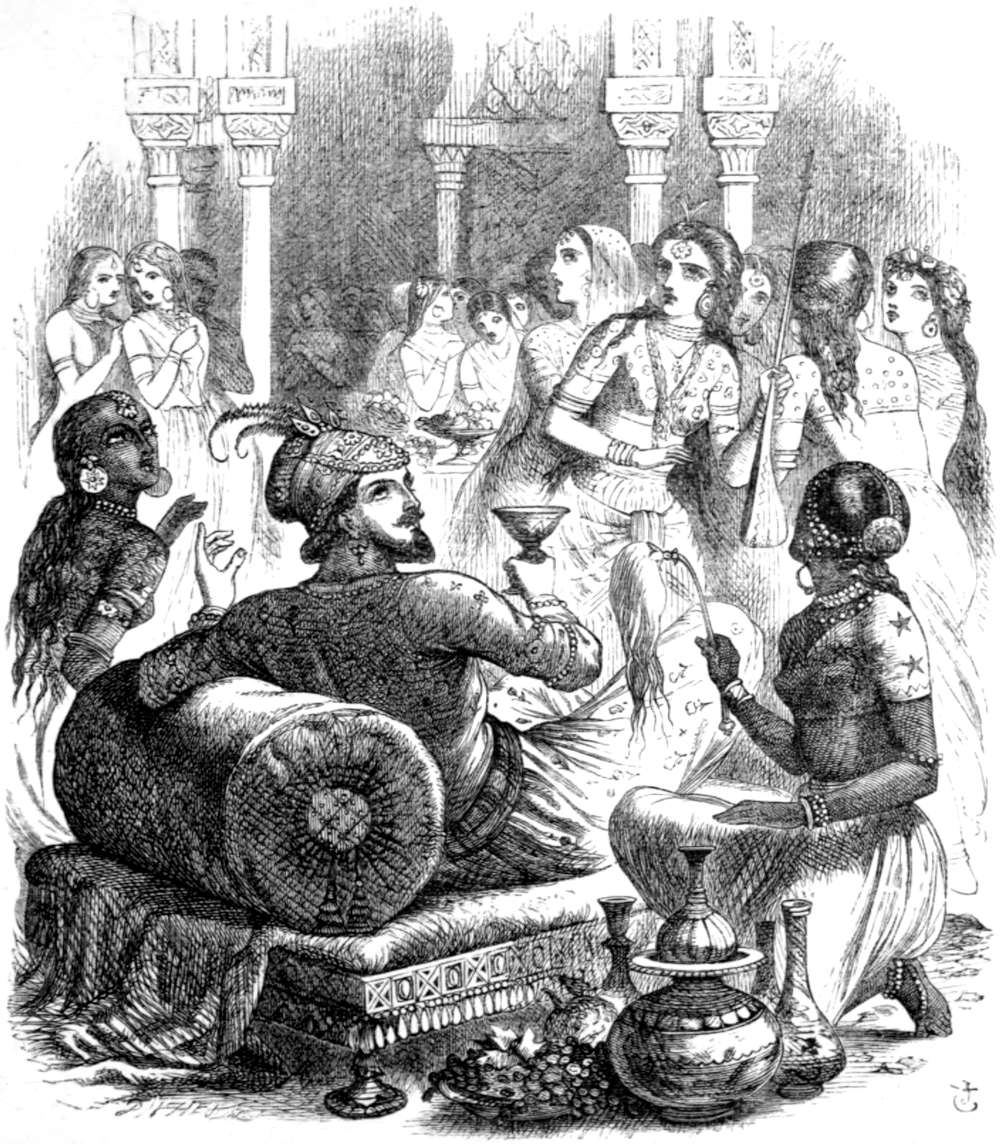
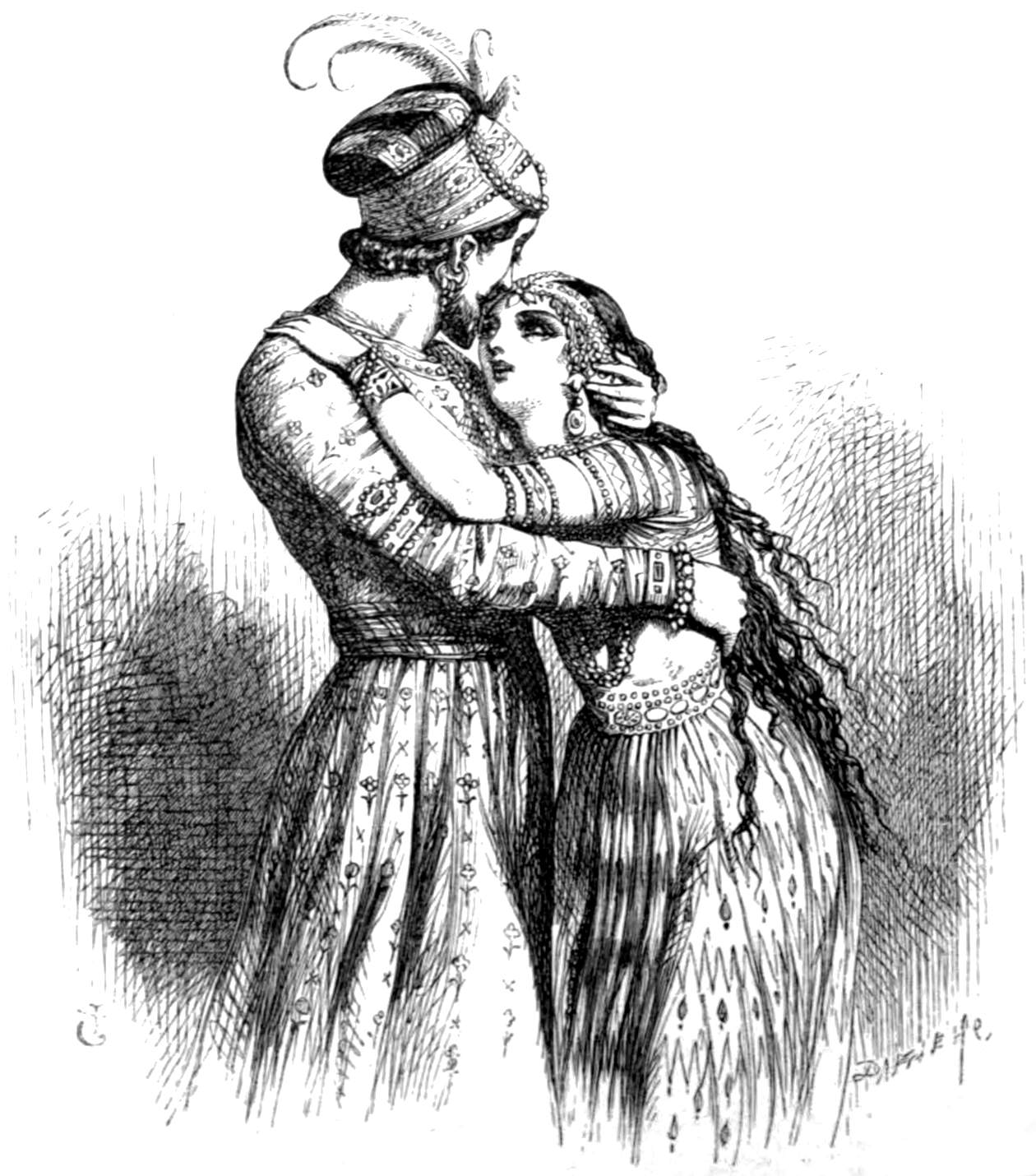
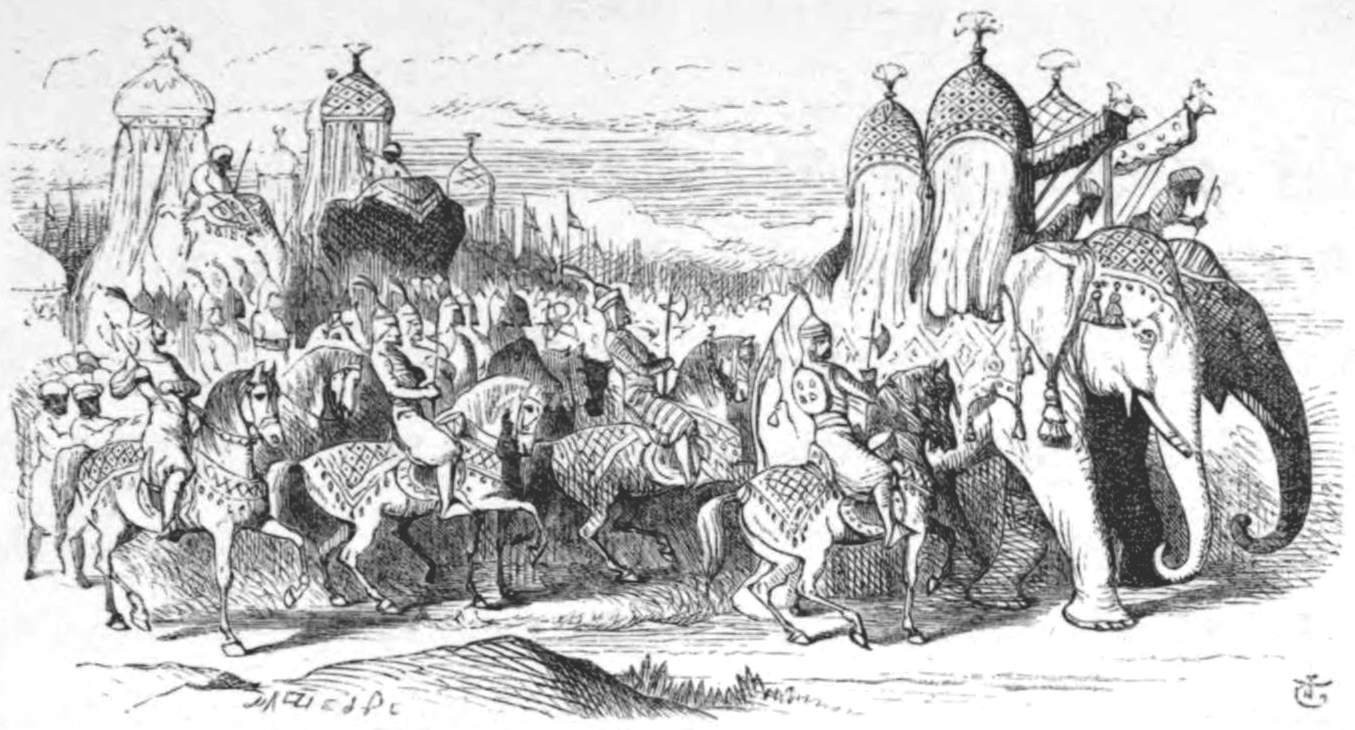
Fadladeen, at the conclusion of this light rhapsody, took occasion to sum up his opinion of the young Cashmerian’s poetry,—of which, he trusted, they had that evening heard the last. Having recapitulated the epithets, “frivolous”—“inharmonious”—“nonsensical,” he proceeded to say that, viewing it in the most favourable light, it resembled one of those Maldivian boats, to which the Princess had alluded in the relation of her dream,[378]—a slight, gilded thing, sent adrift without rudder or ballast, and with nothing but vapid sweets and faded flowers on board. The profusion, indeed, of flowers and birds, which this poet had ready on all occasions,—not to mention dews, gems, &c.—was a most oppressive kind of opulence to his hearers; and had the unlucky effect of giving to his style all the glitter of the flower-garden without its method, and all the flutter of the aviary without its song. In addition to this, he chose his subjects badly, and was always most inspired by the worst 322parts of them. The charms of paganism, the merits of rebellion,—these were the themes honoured with his particular enthusiasm; and, in the poem just recited, one of his most palatable passages was in praise of that beverage of the Unfaithful, wine;—“being, perhaps,” said he, relaxing into a smile, as conscious of his own character in the Haram on this point, “one of those bards, whose fancy owes all its illumination to the grape, like that painted porcelain,[379] so curious and so rare, whose images are only visible when liquor is poured into it.” Upon the whole, it was his opinion, from the specimens which they had heard, and which, he begged to say, were the most tiresome part of the journey, that—whatever other merits this well-dressed young gentleman might possess—poetry was by no means his proper avocation: “and indeed,” concluded the critic, “from his fondness for flowers and for birds, I would venture to suggest that a florist or a bird-catcher is a much more suitable calling for him than a poet.”
They had now begun to ascend those barren mountains, which separate Cashmere from the rest of India; and, as the heats were intolerable, and the time of their encampments limited to the few hours necessary for refreshment and repose, there was an end to all their delightful evenings, and Lalla Rookh saw no 323more of Feramorz. She now felt that her short dream of happiness was over, and that she had nothing but the recollection of its few blissful hours, like the one draught of sweet water that serves the camel across the wilderness, to be her heart’s refreshment during the dreary waste of life that was before her. The blight that had fallen upon her spirits soon found its way to her cheek, and her ladies saw with regret—though not without some suspicion of the cause—that the beauty of their mistress, of which they were almost as proud as of their own, was fast vanishing away at the very moment of all when she had most need of it. What must the King of Bucharia feel, when, instead of the lively and beautiful Lalla Rookh, whom the poets of Delhi had described as more perfect than the divinest images in the house of Azor,[380] he should receive a pale and inanimate victim, upon whose cheek neither health nor pleasure bloomed, and from whose eyes Love had fled,—to hide himself in her heart?
If anything could have charmed away the melancholy of her spirits, it would have been the fresh airs and enchanting scenery of that Valley, which the Persians so justly call the Unequalled.[381] But neither the coolness of its atmosphere, so luxurious after toiling up those bare and burning mountains,—neither the splendour of the 324minarets and pagodas, that shone out from the depth of its woods, nor the grottos, hermitages, and miraculous fountains,[382] which make every spot of that region holy ground,—neither the countless waterfalls, that rush into the Valley from all those high and romantic mountains that encircle it, nor the fair city on the Lake, whose houses, roofed with flowers,[383] appeared at a distance like one vast and variegated parterre;—not all these wonders and glories of the most lovely country under the sun could steal her heart for a minute from those sad thoughts, which but darkened, and grew bitterer every step she advanced.
The gay pomps and processions that met her upon her entrance into the Valley, and the magnificence with which the roads all along were decorated, did honour to the taste and gallantry of the young King. It was night when they approached the city, and, for the last two miles, they had passed under arches, thrown from hedge to hedge, festooned with only those rarest roses from which the Attar Gul, more precious than gold, is distilled, and illuminated in rich and fanciful forms with lanterns of the triple-coloured tortoise-shell of Pegu.[384] Sometimes, from a dark wood by the side of the road, a display of fire-works would break out, so sudden and so brilliant, that a Brahmin might fancy he beheld that grove, in whose purple shade 325the God of Battles was born, bursting into a flame at the moment of his birth;—while, at other times, a quick and playful irradiation continued to brighten all the fields and gardens by which they passed, forming a line of dancing lights along the horizon; like the meteors of the north as they are seen by those hunters,[385] who pursue the white and blue foxes on the confines of the Icy Sea.
These arches and fire-works delighted the Ladies of the Princess exceedingly; and, with their usual good logic, they deduced from his taste for illuminations, that the King of Bucharia would make the most exemplary husband imaginable. Nor, indeed, could Lalla Rookh herself help feeling the kindness and splendour with which the young bridegroom welcomed her;—but she also felt how painful is the gratitude, which kindness from those we cannot love excites; and that their best blandishments come over the heart with all that chilling and deadly sweetness, which we can fancy in the cold, odoriferous wind[386] that is to blow over this earth in the last days.
The marriage was fixed for the morning after her arrival, when she was, for the first time, to be presented to the monarch in that Imperial Palace beyond the lake, called the Shalimar. Though never before had a night 326of more wakeful and anxious thought been passed in the Happy Valley, yet, when she rose in the morning, and her Ladies came around her, to assist in the adjustment of the bridal ornaments, they thought they had never seen her look half so beautiful. What she had lost of the bloom and radiancy of her charms was more than made up by that intellectual expression, that soul beaming forth from the eyes, which is worth all the rest of loveliness. When they had tinged her fingers with the Henna leaf, and placed upon her brow a small coronet of jewels, of the shape worn by the ancient Queens of Bucharia, they flung over her head the rose-coloured bridal veil, and she proceeded to the barge that was to convey her across the lake;—first kissing, with a mournful look, the little amulet of cornelian, which her father at parting had hung about her neck.
The morning was as fresh and fair as the maid on whose nuptials it rose, and the shining lake, all covered with boats, the minstrels playing upon the shores of the islands, and the crowded summer-houses on the green hills around, with shawls and banners waving from their roofs, presented such a picture of animated rejoicing, as only she, who was the object of it all, did not feel with transport. To Lalla Rookh alone it was a melancholy pageant; nor could she have even borne to look 327upon the scene, were it not for a hope that, among the crowds around, she might once more perhaps catch a glimpse of Feramorz. So much was her imagination haunted by this thought, that there was scarcely an islet or boat she passed on the way, at which her heart did not flutter with the momentary fancy that he was there. Happy, in her eyes, the humblest slave upon whom the light of his dear looks fell!—In the barge immediately after the Princess sat Fadladeen, with his silken curtains thrown widely apart, that all might have the benefit of his august presence, and with his head full of the speech he was to deliver to the King, “concerning Feramorz, and literature, and the Chabuk, as connected therewith.”
They now had entered the canal which leads from the Lake to the splendid domes and saloons of the Shalimar, and went gliding on through the gardens that ascended from each bank, full of flowering shrubs that made the air all perfume; while from the middle of the canal rose jets of water, smooth and unbroken, to such a dazzling height, that they stood like tall pillars of diamond in the sunshine. After sailing under the arches of various saloons, they at length arrived at the last and most magnificent, where the monarch awaited the coming of his bride; and such was the agitation of her heart and frame, that it was with difficulty she could walk up the marble 328steps, which were covered with cloth of gold for her ascent from the barge. At the end of the hall stood two thrones, as precious as the Cerulean Throne of Coolburga,[387] on one of which sat Aliris, the youthful King of Bucharia, and on the other was, in a few minutes, to be placed the most beautiful Princess in the world. Immediately upon the entrance of Lalla Rookh into the saloon, the monarch descended from his throne to meet her; but scarcely had he time to take her hand in his, when she screamed with surprise, and fainted at his feet. It was Feramorz himself that stood before her!—Feramorz was, himself, the Sovereign of Bucharia, who in this disguise had accompanied his young bride from Delhi, and, having won her love as an humble minstrel, now amply deserved to enjoy it as a King.
The consternation of Fadladeen at this discovery was, for the moment, almost pitiable. But change of opinion is a resource too convenient in courts for this experienced courtier not to have learned to avail himself of it. His criticisms were all, of course, recanted instantly: he was seized with an admiration of the King’s verses, as unbounded as, he begged him to believe, it was disinterested; and the following week saw him in possession of an additional place, swearing by all the Saints of Islam that never had there existed so great 329a poet as the Monarch Aliris, and, moreover, ready to prescribe his favourite regimen of the Chabuk for every man, woman, and child that dared to think otherwise.
Of the happiness of the King and Queen of Bucharia, after such a beginning, there can be but little doubt; and, among the lesser symptoms, it is recorded of Lalla Rookh, that, to the day of her death, in memory of their delightful journey, she never called the King by any other name than Feramorz.
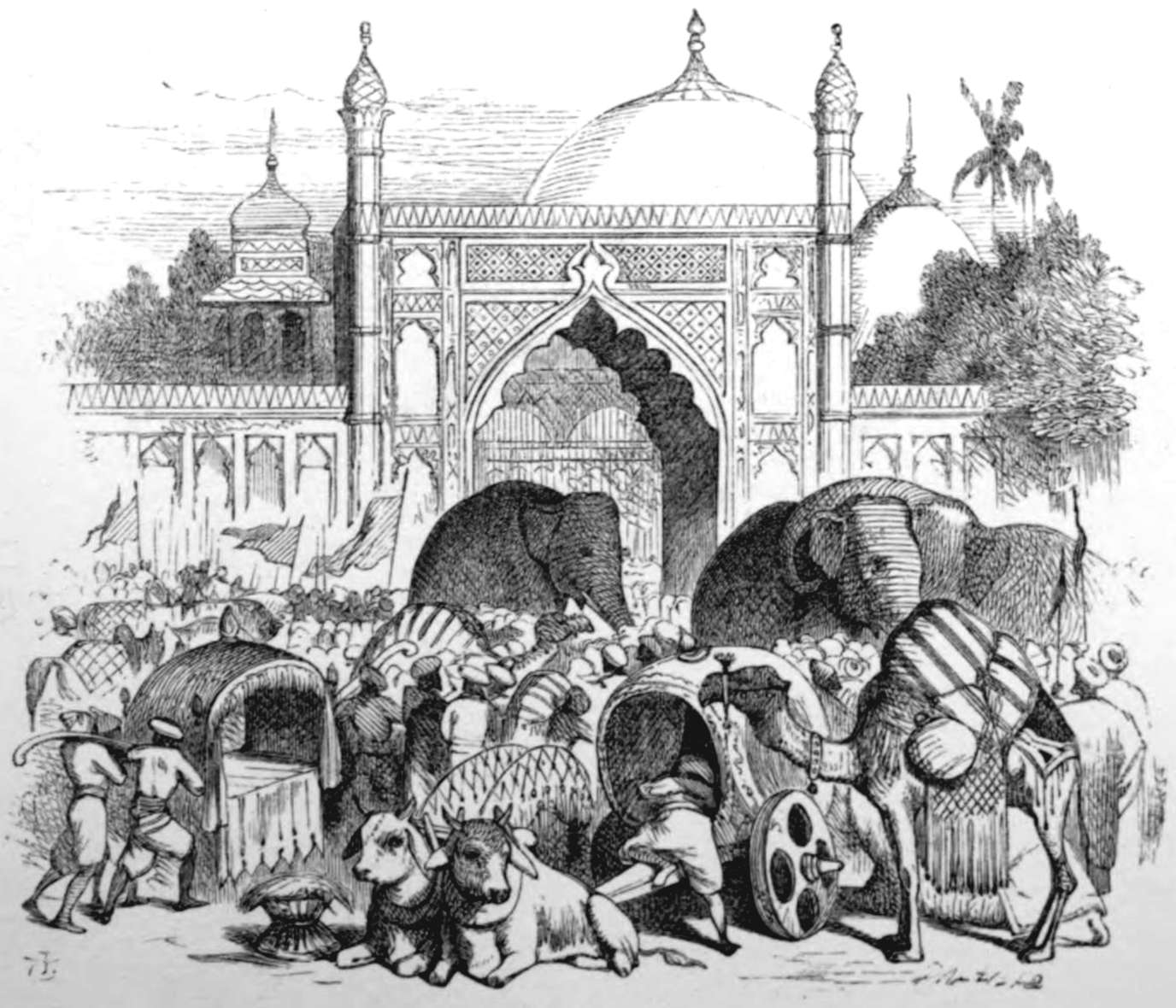
Note 1, p. 2.—He embarked for Arabia.—These particulars of the visit of the King of Bucharia to Aurungzebe are found in Dow’s History of Hindostan, vol. iii. p. 392.
Note 2, p. 2.—Lalla Rookh.—Tulip cheek.
Note 3, p. 2.—Leila.—The mistress of Mejnoun, upon whose story so many Romances in all the languages of the East are founded.
Note 4, p. 2.—Shirine.—For the loves of this celebrated beauty with Khosrou and with Ferhad, see D’Herbelot, Gibbon, Oriental Collections, &c.
Note 5, p. 2.—Dewildé.—“The history of the loves of Dewildé and Chizer, the son of the Emperor Alla, is written in an elegant poem, by the noble Chusero.”—Ferishta.
Note 6, p. 2.—Scattering of the Roses.—Gul Reazee.
Note 7, p. 3.—Emperor’s favour.—“One mark of honour or knighthood bestowed by the Emperor is the permission to wear a small kettledrum at the bows of their saddles, which at first was invented for the training of hawks, and to call them to the lure, and is worn in the field by all sportsmen to that end.”—Fryer’s Travels.
“Those on whom the King has conferred the privilege must wear an ornament of jewels on the right side of the turban, surmounted by a high plume of the feathers of a kind of egret. This bird is found only in Cashmere, and the feathers are carefully collected for the King, who bestows them on his nobles.”—Elphinstone’s Account of Caubul.
Note 8, p. 3.—Keder Khan.—“Khedar Khan, the Khakan, or King of Turquestan beyond the Gihon (at the end of the eleventh century), whenever he appeared abroad, was preceded by seven hundred horsemen with silver battle-axes, and was followed by an equal number bearing maces of gold. He was a great patron of poetry, and it was he who used to preside at public exercises of genius, with four basins of gold and silver by him to distribute among the poets who excelled.”—Richardson’s Dissertation prefixed to his Dictionary.
Note 9, 334p. 3.—Gilt pine-apples.—“The kubdeh, a large golden knob, generally in the shape of a pine-apple, on the top of the canopy over the litter or palanquin.”—Scott’s Notes on the Bahardanush.
Note 10, p. 4.—Sumptuous litter.—In the Poem of Zohair, in the Moallakat, there is the following lively description of “a company of maidens seated on camels.”
“They are mounted in carriages covered with costly awnings, and with rose-coloured veils, the linings of which have the hue of crimson Andem-wood.
“When they ascend from the bosom of the vale, they sit forward on the saddle-cloth, with every mark of a voluptuous gaiety.
“Now, when they have reached the brink of yon blue-gushing rivulet, they fix the poles of their tents like the Arab with a settled mansion.”
Note 11, p. 4.—Argus pheasant’s wing.—See Bernier’s description of the attendants on Raucha-nara-Begum, in her progress to Cashmere.
Note 12, p. 4.—Munificent protector.—This hypocritical Emperor would have made a worthy associate of certain Holy Leagues.—“He held the cloak of religion (says Dow) between his actions and the vulgar; and impiously thanked the Divinity for a success which he owed to his own wickedness. When he was murdering and persecuting his brothers and their families, he was building a magnificent mosque at Delhi, as an offering to God for his assistance to him in the civil wars. He acted as high priest at the consecration of this temple; and made a practice of attending divine service there, in the humble dress of a Fakeer. But when he lifted one hand to the Divinity, he, with the other, signed warrants for the assassination of his relations.”—History of Hindostan, vol. iii. p. 335. See also the curious letter of Aurungzebe, given in the Oriental Collections, vol. i. p. 320.
Note 13, p. 4.—The idol of Jaghernaut.—“The idol at Jaghernat has two fine diamonds for eyes. No goldsmith is suffered to enter the Pagoda, one having stole one of these eyes, being locked up all night with the Idol.”—Tavernier.
Note 14, p. 5.—Royal Gardens of Delhi.—See a description of these Royal Gardens in “An Account of the present State of Delhi, by Lieut. W. Franklin.”—Asiat. Research. vol. iv. p. 417.
Note 15, p. 5.—Lake of Pearl.—“In the neighbourhood is Notte Gill, or the Lake of Pearl, which receives this name from its pellucid water.” Pennant’s Hindoostan.
“Nasir Jung encamped in the vicinity of the Lake of Tonoor, amused himself with sailing on that clear and beautiful water, and gave it the fanciful name of Motee Talah, ‘the Lake of Pearls,’ which it still retains.”—Wilks’s South of India.
Note 16, 335p. 5.—Isles of the West.—Sir Thomas Roe, Ambassador from James I. to Jehan-Guire.
Note 17, p. 6.—Ezra.—“The romance Wemakweazra, written in Persian verse, which contains the loves of Wamak and Ezra, two celebrated lovers who lived before the time of Mahomet.”—Note on the Oriental Tales.
Note 18, p. 6.—Rodahver.—Their amour is recounted in the Shah-Namêh of Ferdousi; and there is much beauty in the passage which describes the slaves of Rodahver sitting on the bank of the river and throwing flowers into the stream, in order to draw the attention of the young Hero who is encamped on the opposite side.—See Champion’s translation.
Note 19, p. 6.—White Demon.—Rustam is the Hercules of the Persians. For the particulars of his victory over the Sepeed Deeve, or White Demon, see Oriental Collections, vol. ii. p. 45.—“Near the city of Shirauz is an immense quadrangular monument, in commemoration of this combat, called the Kelaat-i-Deev Sepeed, or castle of the White Giant, which Father Angelo, in his Gazophilacium Persicum, p. 127, declares to have been the most memorable monument of antiquity which he had seen in Persia.”—See Ouseley’s Persian Miscellanies.
Note 20, p. 6.—Golden anklets.—“The women of the Idol, or dancing girls of the Pagoda, have little golden bells, fastened to their feet, the soft harmonious tinkling of which vibrates in unison with the exquisite melody of their voices.”—Maurice’s Indian Antiquities.
“The Arabian courtesans, like the Indian women, have little golden bells fastened round their legs, neck and elbows, to the sound of which they dance before the King. The Arabian princesses wear golden rings on their fingers, to which little bells are suspended, as well as in the flowing tresses of their hair, that their superior rank may be known, and they themselves receive in passing the homage due to them.”—See Calmet’s Dictionary, art. Bells.
Note 21, p. 6.—Delicious opium.—“Abou-Tige, ville de la Thebaïde, où il croît beaucoup de pavot noir, dont se fait le meilleur opium.”—D’Herbelot.
Note 22, p. 7.—Crishna.—The Indian Apollo.—“He and the three Rámas are described as youths of perfect beauty; and the princesses of Hindustán were all passionately in love with Chrishna, who continues to this hour the darling God of the Indian women.”—Sir W. Jones, on the Gods of Greece, Italy, and India.
Note 23, p. 7.—Shawl-goats of Tibet.—See Turner’s Embassy for a description of this animal, “the most beautiful among the whole tribe of goats.” The material for the shawls (which is carried to Cashmere) is found next the skin.
Note 24, 336p. 8.—Veiled Prophet of Khorassan.—For the real history of this Impostor, whose original name was Hakem ben Haschem, and who was called Mocanna from the veil of silver gauze (or, as others say, golden) which he always wore, see D’Herbelot.
Note 25, p. 9.—Khorassan.—Khorassan signifies, in the old Persian language, Province or Region of the Sun.—Sir W. Jones.
Note 26, p. 11.—Flow’rets and fruits, blush over ev’ry stream.
“The fruits of Meru are finer than those of any other place; and one cannot see in any other city such palaces with groves, and streams, and gardens.”—Ebn Haukal’s Geography.
Note 27, p. 12.—Among Merou’s bright palaces and groves.
One of the royal cities of Khorassan.
Note 28, p. 12.—Moussa’s.—Moses.
Note 29, p. 12.—O’er Moussa’s cheek, when down the Mount he trod.
“Ses disciples assuroient qu’il se couvroit le visage, pour ne pas éblouir ceux qui l’approchoient par l’éclat de son visage comme Moyse.”—D’Herbelot.
Note 30, p. 12.—In hatred to the Caliph’s hue of night.
Black was the colour adopted by the Caliphs of the House of Abbas, in their garments, turbans, and standards.—“Il faut remarquer ici touchant les habits blancs des disciples de Hakem, que la couleur des habits, des coëffures et des étendards des Khalifes Abassides étant la noire, ce chef de Rebelles ne pouvoit pas choisir une qui lui fut plus opposée.”—D’Herbelot.
Note 31, p. 12.—With javelins of the light Kathaian reed.
“Our dark javelins, exquisitely wrought of Khathaian reeds, slender and delicate.”—Poem of Amru.
Note 32, p. 13.—Fill’d with the stems.
Pichula, used anciently for arrows by the Persians.
Note 33, p. 13.—That bloom on Iran’s rivers.
The Persians call this plant Gaz. The celebrated shaft of Isfendiar, one of their ancient heroes, was made of it.—“Nothing can be more beautiful than the appearance of this plant in flower during the rains on the banks of rivers, where it is usually interwoven with a lovely twining asclepias.”—Sir W. Jones, Botanical Observations on Select Indian Plants.
Note 34, 337p. 13.—Like a chenar-tree grove, when winter throws.
The oriental plane. “The chenar is a delightful tree; its bole is of a fine white and smooth bark; and its foliage, which grows in a tuft at the summit, is of a bright green.”—Morier’s Travels.
Note 35, p. 14.—From those who kneel at Brahma’s burning founts.
The burning fountains of Brahma near Chittogong, esteemed as holy.—Turner.
Note 36, p. 14.—To the small, half-shut glances of Kathay.—China.
Note 37, p. 15.—Like tulip-beds, of different shape and dyes.
“The name of tulip is said to be of Turkish extraction, and given to the flower on account of its resembling a turban.”—Beckmann’s History of Inventions.
Note 38, p. 15.—And fur-bound bonnet of Bucharian shape.
“The inhabitants of Bucharia wear a round cloth bonnet, shaped much after the Polish fashion, having a large fur border. They tie their kaftans about the middle with a girdle of a kind of silk crape, several times round the body.”—Account of Independent Tartary, in Pinkerton’s Collection.
Note 39, p. 15.—O’erwhelm’d in fight and captive to the Greek.
In the war of the Caliph Mahadi against the Empress Irene, for an account of which vide Gibbon, vol. x.
Note 40, p. 18.—The flying throne of star-taught Soliman.
This wonderful Throne was called The Star of the Genii. For a full description of it, see the Fragment, translated by Captain Franklin, from a Persian MS. entitled “The History of Jerusalem,” Oriental Collections, vol. i. p. 235.—When Soliman travelled, the eastern writers say, “He had a carpet of green silk on which his throne was placed, being of a prodigious length and breadth, and sufficient for all his forces to stand upon, the men placing themselves on his right hand, and the spirits on his left; and that when all were in order, the wind, at his command, took up the carpet, and transported it, with all that were upon it, wherever he pleased; the army of birds at the same time flying over their heads, and forming a kind of canopy to shade them from the sun.”—Sale’s Koran, vol ii. p. 214, note.
Note 41, p. 18.—For many an age, in every chance and change.
The transmigration of souls was one of his doctrines.—Vide D’Herbelot.
Note 42, p. 18.—To which all Heaven, except the Proud One, knelt.
“And when we said unto the angels, Worship Adam, they all worshipped except Eblis (Lucifer), who refused.”—The Koran, chap. ii.
Note 43, p. 18.—In Moussa’s frame—and, thence descending, flow’d.—Moses.
Note 44, 338p. 18.—Through many a Prophet’s breast.
This is according to D’Herbelot’s account of the doctrines of Mokanna:—“Sa doctrine étoit, que Dieu avoit pris une forme et figure humaine, depuis qu’il eut commandé aux Anges d’adorer Adam, le premier des hommes. Qu’après la mort d’Adam, Dieu étoit apparu sous la figure de plusieurs Prophètes, et autres grands hommes qu’il avoit choisis, jusqu’à ce qu’il prit celle d’Abu Moslem, Prince de Khorassan, lequel professoit l’erreur de la Tenassukhiah ou Metempschychose; et qu’après la mort de ce Prince, la Divinité étoit passée, et descendue en sa personne.”
Note 45, p. 18.—In Issa shone.—Jesus.
Note 46, p. 22.—Born by that ancient flood, which from its spring.
The Amoo, which rises in the Belur Tag, or Dark Mountains, and running nearly from east to west, splits into two branches; one of which falls into the Caspian sea, and the other into Aral Nahr, or the Lake of Eagles.
Note 47, p. 24.—The bulbul utters, ere her soul depart.—The nightingale.
Note 48, p. 34.—In holy Koom, or Mecca’s dim arcades.
The cities of Com (or Koom) and Cashan are full of mosques, mausoleums, and sepulchres of the descendants of Ali, the Saints of Persia.—Chardin.
Note 49, p. 34.—Stood vases, fill’d with Kishmee’s golden wine.
An island in the Persian Gulf, celebrated for its white wine.
Note 50, p. 34.—Like Zemzem’s Spring of Holiness, had power.
The miraculous well at Mecca; so called, says Sale, from the murmuring of its waters.
Note 51, p. 35.—Whom India serves, the monkey deity.
The God Hannaman.—“Apes are in many parts of India highly venerated, out of respect to the God Hannaman, a deity partaking of the form of that race.”—Pennant’s Hindoostan.
See a curious account, in Stephen’s Persia, of a solemn embassy from some part of the Indies to Goa, when the Portuguese were there, offering vast treasures for the recovery of a monkey’s tooth, which they held in great veneration, and which had been taken away upon the conquest of the kingdom of Jafanapatan.
Note 52, p. 35.—To bend in worship, Lucifer was right.
This resolution of Eblis not to acknowledge the new creature, man, was, according to Mahometan tradition, thus adopted:—“The earth (which God 339had selected for the materials of his work) was carried into Arabia to a place between Mecca and Tayef, where, being first kneaded by the angels, it was afterwards fashioned by God himself into a human form, and left to dry for the space of forty days, or, as others say, as many years; the angels, in the mean time, often visiting it, and Eblis (then one of the angels nearest to God’s presence, afterwards the devil) among the rest; but he, not contented with looking at it, kicked it with his foot till it rung; and knowing God designed that creature to be his superior, took a secret resolution never to acknowledge him as such.”—Sale on the Koran.
Note 53, p. 36.—From dead men’s marrow guides them best at night.
A kind of lantern formerly used by robbers, called the Hand of Glory, the candle for which was made of the fat of a dead malefactor. This, however, was rather a western than an eastern superstition.
Note 54, p. 37.—In that best marble of which Gods are made.
The material of which images of Gaudma (the Birman Deity) are made, is held sacred. “Birmans may not purchase the marble in mass, but are suffered, and indeed encouraged, to buy figures of the Deity ready made.”—Symes’s Ava, vol. ii. p. 376.
Note 55, p. 41.—Of Kerzrah flowers, came fill’d with pestilence.
“It is commonly said in Persia, that if a man breathe in the hot south wind, which in June or July passes over that flower (the Kerzereh), it will kill him.”—Thevenot.
Note 56, p. 44.—Within the crocodile’s stretch’d jaws to come.
The humming-bird is said to run this risk for the purpose of picking the crocodile’s teeth. The same circumstance is related of the lapwing, as a fact to which he was witness, by Paul Lucas, Voyage fait en 1714.
The ancient story concerning the Trochilus, or humming-bird, entering with impunity into the mouth of the crocodile, is firmly believed at Java.—Barrow’s Cochin-China.
Note 57, p. 46.—That rank and venomous food on which she lives.
“Circum easdem ripas (Nili, viz.) ales est Ibis. Ea serpentium populatur ova, gratissimamque ex his escam nidis suis refert.”—Solinus.
Note 58, p. 48.—Yamtcheou.—“The feast of Lanterns is celebrated at Yamtcheou with more magnificence than anywhere else: and the report goes, that the illuminations there are so splendid, that an Emperor once, not daring openly to leave his Court to go thither, committed himself with the Queen and several Princesses of his family into the hands of a magician, 340who promised to transport them thither in a trice. He made them in the night to ascend magnificent thrones that were borne up by swans, which in a moment arrived at Yamtcheou. The Emperor saw at his leisure all the solemnity, being carried upon a cloud that hovered over the city and descended by degrees; and came back again with the same speed and equipage, nobody at court perceiving his absence.”—The present State of China, p. 156.
Note 59, p. 48.—Sceneries of bamboo-work.—See a description of the nuptials of Vizier Alee in the Asiatic Annual Register of 1804.
Note 60, p. 49.—Chinese illuminations.—“The vulgar ascribe it to an accident that happened in the family of a famous mandarin, whose daughter walking one evening upon the shore of a lake, fell in and was drowned; this afflicted father, with his family, ran thither, and, the better to find her, he caused a great company of lanterns to be lighted. All the inhabitants of the place thronged after him with torches. The year ensuing they made fires upon the shores the same day; they continued the ceremony every year, every one lighted his lantern, and by degrees it commenced into a custom.”—Present State of China.
Note 61, p. 51.—Like Seba’s Queen could vanquish with that one.
“Thou hast ravished my heart with one of thine eyes.”—Sol. Song.
Note 62, p. 51.—The fingers’ ends with a bright roseate hue.
“They tinged the ends of her fingers scarlet with Henna, so that they resembled branches of coral.”—Story of Prince Futtun in Bahardanush.
Note 63, p. 51.—To give that long, dark languish to the eye.
“The women blacken the inside of their eyelids with a powder named the black Kohol.”—Russel.
“None of these ladies,” says Shaw, “take themselves to be completely dressed, till they have tinged the hair and edges of their eyelids with the powder of lead ore. Now, as this operation is performed by dipping first into the powder a small wooden bodkin of the thickness of a quill, and then drawing it afterwards through the eyelids over the ball of the eye, we shall have a lively image of what the Prophet (Jer. iv. 30) may be supposed to mean by rending the eyes with painting. This practice is no doubt of great antiquity; for besides the instance already taken notice of, we find that where Jezebel is said (2 Kings, ix. 30) to have painted her face, the original words are, she adjusted her eyes with the powder of lead ore.”—Shaw’s Travels.
Note 64, p. 52.—In her full lap the Champac’s leaves of gold.
The appearance of the blossoms of the gold-coloured Campac on the black hair of the Indian women has supplied the Sanscrit Poets with many elegant allusions.—See Asiatic Researches, vol. iv.
Note 65, 341p. 52.—The sweet Elcaya, and that courteous tree.
A tree famous for its perfume, and common on the hills of Yemen.—Niebuhr.
Note 66, p. 52.—Which bows to all who seek its canopy.
Of the genus mimosa, “which droops its branches whenever any person approaches it, seeming as if it saluted those who retire under its shade.”—Ibid.
Note 67, p. 53.—The bowers of Tibet, send forth odorous light.
“Cloves are a principal ingredient in the composition of the perfumed rods, which men of rank keep constantly burning in their presence.”—Turner’s Tibet.
Note 68, p. 54.—With odoriferous woods of Comorin.
“C’est d’où vient le bois d’aloès que les Arabes appellent Oud Comari, et celui du sandal, qui s’y trouve en grande quantité.”—D’Herbelot.
Note 69, p. 54.—The crimson blossoms of the coral tree.
“Thousands of variegated loories visit the coral-trees.”—Barrow.
Note 70, p. 54.—Mecca’s blue sacred pigeon.
“In Mecca there are quantities of blue pigeons, which none will affright or abuse, much less kill.”—Pitt’s Account of the Mahometans.
Note 71, p. 54.—The thrush of Hindostan.
“The Pagoda Thrush is esteemed among the first choristers of India. It sits perched on the sacred pagodas, and from thence delivers its melodious song.”—Pennant’s Hindostan.
Note 72, p. 55.—About the gardens, drunk with that sweet food.
Tavernier adds, that while the birds of Paradise lie in this intoxicated state, the emmets come and eat off their legs; and that hence it is they are said to have no feet.
Note 73, p. 55.—Whose scent hath lur’d them o’er the summer flood.
Birds of Paradise, which, at the nutmeg season, come in flights from the southern isles to India; and “the strength of the nutmeg,” says Tavernier, “so intoxicates them, that they fall dead drunk to the earth.”
Note 74, p. 55.—Build their high nests of budding cinnamon.
“That bird which liveth in Arabia, and buildeth its nest with cinnamon.”—Brown’s Vulgar Errors.
Note 75, 342p. 55.—Sleeping in light, like the green birds that dwell.
“The spirits of the martyrs will be lodged in the crops of green birds.” Gibbon, vol. ix. p. 421.
Note 76, p. 55.—More like the luxuries of that impious King.
Shedad, who made the delicious gardens of Irim, in imitation of Paradise, and was destroyed by lightning the first time he attempted to enter them.
Note 77, p. 57.—In its blue blossoms hum themselves to sleep.
“My Pandits assure me that the plant before us (the Nilica) is their Sephalica, thus named because the bees are supposed to sleep on its blossoms.”—Sir W. Jones.
Note 78, p. 59.—As they were captives to the King of Flowers.
“They deferred it till the King of Flowers should ascend his throne of enamelled foliage.”—The Bahardanush.
Note 79, p. 60.—But a light golden chain-work round her hair.
“One of the head-dresses of the Persian women is composed of a light golden chain-work, set with small pearls, with a thin gold plate pendant, about the bigness of a crown-piece, on which is impressed an Arabian prayer, and which hangs upon the cheek below the ear.”—Hanway’s Travels.
Note 80, p. 60.—Such as the maids of Yezd and Shiras wear.
“Certainly the women of Yezd are the handsomest women in Persia. The proverb is, that to live happy a man must have a wife of Yezd, eat the bread of Yezdecas, and drink the wine of Shiraz.”—Tavernier.
Note 81, p. 61.—Upon a musnud’s edge.
Musnuds are cushioned seats, usually reserved for persons of distinction.
Note 82, p. 61.—In the pathetic mode of Isfahan.
The Persians, like the ancient Greeks, call their musical modes or Perdas by the names of different countries or cities, as the mode of Isfahan, the mode of Irak, &c.
Note 83, p. 61.—There’s a bower of roses by Bendemeer’s stream.
A river which flows near the ruins of Chilminar.
Note 84, p. 64.—The hills of crystal on the Caspian shore.
“To the north of us (on the coast of the Caspian, near Badku) was a mountain, which sparkled like diamonds, arising from the sea-glass and crystals with which it abounds.”—Journey of the Russian Ambassador to Persia, 1746.
Note 85, 343p. 64.—Of Eden, shake in the eternal breeze.
“To which will be added the sound of the bells, hanging on the trees, which will be put in motion by the wind proceeding from the throne of God, as often as the blessed wish for music.”—Sale.
Note 86, p. 65.—And his floating eyes—oh! they resemble.
“Whose wanton eyes resemble blue water-lilies, agitated by the breeze.”—Jayadeva.
Note 87, p. 65.—Blue water-lilies.
The blue lotus, which grows in Cashmere and in Persia.
Note 88, p. 67.—To muse upon the pictures that hung round.
It has been generally supposed that the Mahometans prohibit all pictures of animals; but Toderini shows that, though the practice is forbidden by the Koran, they are not more averse to painted figures and images than other people. From Mr. Murphy’s work, too, we find that the Arabs of Spain had no objection to the introduction of figures into painting.
Note 89, p. 67.—Whose orb when half retir’d looks loveliest.
This is not quite astronomically true. “Dr. Hadley (says Keil) has shown that Venus is brightest when she is about forty degrees removed from the sun; and that then but only a fourth part of her lucid disk is to be seen from the earth.”
Note 90, p. 67.—He read that to be blest is to be wise.
For the loves of King Solomon (who was supposed to preside over the whole race of Genii) with Balkis, the Queen of Sheba or Saba, see D’Herbelot, and the Notes on the Koran, chap. 2.
“In the palace which Solomon ordered to be built against the arrival of the Queen of Saba, the floor or pavement was of transparent glass, laid over running water, in which fish were swimming.” This led the Queen into a very natural mistake, which the Koran has not thought beneath its dignity to commemorate. “It was said unto her, ‘Enter the palace.’ And when she saw it she imagined it to be a great water; and she discovered her legs, by lifting up her robe to pass through it. Whereupon Solomon said to her, ‘Verily, this is the place evenly floored with glass.’”—Chap. 27.
Note 91, p. 67.—Here fond Zuleika woos with open arms.
The wife of Potiphar, thus named by the Orientals.
“The passion which this frail beauty of antiquity conceived for her young Hebrew slave has given rise to a much-esteemed poem in the Persian language, entitled Yusef vau Zelikha, by Noureddin Jami; the manuscript copy of which, in the Bodleian Library at Oxford, is supposed to be the finest in the whole world.”—Note upon Nott’s Translation of Hafez.
Note 92, 344p. 67.—With a new text to consecrate their love.
The particulars of Mahomet’s amour with Mary, the Coptic girl, in justification of which he added a new chapter to the Koran, may be found in Gagnier’s Notes upon Abulfeda, p. 151.
Note 93, p. 70.—But in that deep-blue, melancholy dress.
“Deep blue is their mourning colour.”—Hanway.
Note 94, p. 71.—Sat in her sorrow like the sweet night-flower.
The sorrowful nyctanthes, which begins to spread its rich odour after sunset.
Note 95, p. 73.—As the viper weaves its wily covering.
“Concerning the vipers, which Pliny says were frequent among the balsam-trees, I made very particular inquiry: several were brought me alive both to Yambo and Jidda.”—Bruce.
Note 96, p. 81.—The sunny apples of Istkahar.—“In the territory of Istkahar there is a kind of apple, half of which is sweet and half sour.”—Ebn Haukal.
Note 97, p. 82.—They saw a young Hindoo girl upon the bank.—For an account of this ceremony, see Grandpré’s Voyage in the Indian Ocean.
Note 98, p. 82.—The Oton-tala, or Sea of Stars.—“The place where the Whangho, a river of Tibet, rises, and where there are more than a hundred springs, which sparkle like stars; whence it is called Hotun-nor, that is, the Sea of Stars.”—Description of Tibet in Pinkerton.
Note 99, p. 84.—Hath sprung up here.
“The Lescar or Imperial Camp is divided, like a regular town, into squares, alleys, and streets, and from a rising ground furnishes one of the most agreeable prospects in the world. Starting up in a few hours in an uninhabited plain, it raises the idea of a city built by enchantment. Even those who leave their houses in cities to follow the prince in his progress are frequently so charmed by the Lescar, when situated in a beautiful and convenient place, that they cannot prevail with themselves to remove. To prevent this inconvenience to the court, the Emperor, after sufficient time is allowed to the tradesmen to follow, orders them to be burnt out of their tents.”—Dow’s Hindostan.
Colonel Wilks gives a lively picture of an Eastern encampment:—“His camp, like that of most Indian armies, exhibited a motley collection of covers from the scorching sun and dews of the night, variegated according to the taste or means of each individual, by extensive inclosures of coloured 345calico surrounding superb suites of tents; by ragged cloths or blankets stretched over sticks or branches; palm leaves hastily spread over similar supports; handsome tents and splendid canopies; horses, oxen, elephants, and camels; all intermixed without any exterior mark of order or design, except the flags of the chiefs, which usually mark the centres of a congeries of these masses; the only regular part of the encampment being the streets of shops, each of which is constructed nearly in the manner of a booth at an English fair.”—Historical Sketches of the South of India.
Note 100, p. 84.—Built the high pillar’d halls of Chilminar.
The edifices of Chilminar and Balbec are supposed to have been built by the Genii, acting under the orders of Jan ben Jan, who governed the world long before the time of Adam.
Note 101, p. 85.—And camels, tufted o’er with Yemen’s shells.
“A superb camel, ornamented with strings and tufts of small shells.”—Ali Bey.
Note 102, p. 85.—But the far torrent, or the locust bird.
A native of Khorassan, and allured southward by means of the water of a fountain between Shiraz and Ispahan, called the Fountain of Birds, of which it is so fond that it will follow wherever that water is carried.
Note 103, p. 85.—Of laden camels and their drivers’ songs.
“Some of the camels have bells about their necks, and some about their legs, like those which our carriers put about their forehorses’ necks, which together with the servants (who belong to the camels, and travel on foot), singing all night, make a pleasant noise, and the journey passes away delightfully.”—Pitt’s Account of the Mahometans.
“The camel-driver follows the camels singing, and sometimes playing upon his pipe; the louder he sings and pipes, the faster the camels go. Nay, they will stand still when he gives over his music.”—Tavernier.
Note 104, p. 85.—Of the’ Abyssinian trumpet, swell and float.
“This trumpet is often called, in Abyssinia, nesser cano, which signifies the Note of the Eagle.”—Note of Bruce’s Editor.
Note 105, p. 85.—The Night and Shadow, over yonder tent.
The two black standards borne before the Caliphs of the House of Abbas were called, allegorically, The Night and The Shadow.—See Gibbon.
Note 106, p. 86.—Defiance fierce at Islam.—The Mahometan religion.
Note 107, p. 86.—But, having sworn upon the Holy Grave.
“The Persians swear by the tomb of Shah Besade, who is buried at Casbin; and when one desires another to asseverate a matter, he will ask him, if he dare swear by the Holy Grave.”—Struy.
Note 108, 346p. 86.—Were spoil’d to feed the Pilgrim’s luxury.
Mahadi, in a single pilgrimage to Mecca, expended six millions of dinars of gold.
Note 109, p. 86.—Of Mecca’s sun, with urns of Persian snow.
“Nivem Meccam apportavit, rem ibi aut nunquam aut raro visam.”—Abulfeda.
Note 110, p. 86.—First, in the van, the People of the Rock.
The inhabitants of Hejaz or Arabia Petræa, called by an Eastern writer “The People of the Rock.”—See Ebn Haukal.
Note 111, p. 86.—On their light mountain steeds, of royal stock.
“Those horses, called by the Arabians Kochlani, of whom a written genealogy has been kept for 2,000 years. They are said to derive their origin from King Solomon’s steeds.”—Niebuhr.
Note 112, p. 87.—The flashing of their swords’ rich marquetry.
“Many of the figures on the blades of their swords are wrought in gold or silver, or in marquetry with small gems.”—Asiat. Misc. v. i.
Note 113, p. 87.—With dusky legions from the land of Myrrh.
Azab or Saba.
Note 114, p. 87.—Waving their heron crests with martial grace.
“The chiefs of the Uzbek Tartars wear a plume of white heron’s feathers in their turbans.”—Account of Independent Tartary.
Note 115, p. 87.—Wild warriors of the turquoise hills.
“In the mountains of Nishapour and Tous (in Khorassan) they find turquoises.”—Ebn Haukal.
Note 116, p. 87.—Of Hindoo Kosh, in stormy freedom bred.
For a description of these stupendous ranges of mountains, see Elphinstone’s Caubul.
Note 117, p. 88.—Her Worshippers of Fire.
The Ghebers or Guebres, those original natives of Persia, who adhered to their ancient faith, the religion of Zoroaster, and who, after the conquest of their country by the Arabs, were either persecuted at home, or forced to become wanderers abroad.
Note 118, p. 88.—From Yezd’s eternal Mansion of the Fire.
“Yezd, the chief residence of those ancient natives, who worship the Sun and the Fire, which latter they have carefully kept lighted, without 347being once extinguished for a moment, about 3,000 years, on a mountain near Yezd, called Ater Quedah, signifying the House or Mansion of the Fire. He is reckoned very unfortunate who dies off that mountain.”—Stephen’s Persia.
Note 119, p. 88.—That burn into the Caspian, fierce they came.
“When the weather is hazy, the springs of Naphtha (on an island near Baku) boil up the higher, and the Naphtha often takes fire on the surface of the earth, and runs in a flame into the sea to a distance almost incredible.”—Hanway on the Everlasting Fire at Baku.
Note 120, p. 88.—By which the prostrate Caravan is aw’d.
Savary says of the south wind, which blows in Egypt from February to May, “Sometimes it appears only in the shape of an impetuous whirlwind, which passes rapidly, and is fatal to the traveller surprised in the middle of the deserts. Torrents of burning sand roll before it, the firmament is enveloped in a thick veil, and the sun appears of the colour of blood. Sometimes whole caravans are buried in it.”
Note 121, p. 89.—The Champions of the Faith through Beder’s vale.
In the great victory gained by Mahomed at Beder, he was assisted, say the Mussulmans, by three thousand angels, led by Gabriel, mounted on his horse Hiazum.—See The Koran and its Commentators.
Note 122, p. 92.—“Alla Akbar!”
The Tecbir, or cry of the Arabs. “Alla Acbar!” says Ockley, means “God is most mighty.”
Note 123, p. 92.—And light your shrines and chaunt your ziraleets.
The ziraleet is a kind of chorus, which the women of the East sing upon joyful occasions.—Russel.
Note 124, p. 92.—Or warm or brighten,—like that Syrian Lake.
The Dead Sea, which contains neither animal nor vegetable life.
Note 125, p. 95.—O’er his lost throne—then pass’d the Jihon’s flood.
The ancient Oxus.
Note 126, p. 95.—Rais’d the white banner within Neksheb’s gates.
A city of Transoxiana.
Note 127, p. 95.—To-day’s young flower is springing in its stead.
“You never can cast your eyes on this tree, but you meet there either blossoms or fruit; and as the blossom drops underneath on the ground (which is frequently covered with these purple-coloured flowers), others come forth in their stead,” &c. &c.—Nieuhoff.
Note 128, 348p. 96.—With which the Dives have gifted him.
The Demons of the Persian mythology.
Note 129, p. 96.—That spangle India’s fields on showery nights.
Carreri mentions the fire-flies in India during the rainy season.—See his Travels.
Note 130, p. 96.—Who brush’d the thousands of the’ Assyrian King.
Sennacherib, called by the Orientals King of Moussal.—D’Herbelot.
Note 131, p. 97.—Of Parviz.
Chosroes. For the description of his Throne or Palace, see Gibbon and D’Herbelot.
There were said to be under this Throne or Palace of Khosrou Parviz a hundred vaults filled with “treasures so immense that some Mahometan writers tell us, their Prophet, to encourage his disciples, carried them to a rock, which at his command opened, and gave them a prospect through it of the treasures of Khosrou.”—Universal History.
Note 132, p. 97.—And the heron crest that shone.
“The crown of Gerashid is cloudy and tarnished before the heron tuft of thy turban.”—From one of the elegies or songs in praise of Ali, written in characters of gold round the gallery of Abbas’s tomb.—See Chardin.
Note 133, p. 97.—Magnificent, o’er Ali’s beauteous eyes.
The beauty of Ali’s eyes was so remarkable, that whenever the Persians would describe any thing as very lovely, they say it is Ayn Hali, or the Eyes of Ali.—Chardin.
Note 134, p. 98.—Rise from the Holy Well, and cast its light.
We are not told more of this trick of the Impostor, than that it was “une machine, qu’il disoit être la Lune.” According to Richardson, the miracle is perpetuated in Nekscheb.—“Nakshab, the name of a city in Transoxiana, where they say there is a well, in which the appearance of the moon is to be seen night and day.”
Note 135, p. 98.—Round the rich city and the plain for miles.
“Il amusa pendant deux mois le peuple de la ville de Nekhscheb, en faisant sortir toutes les nuits du fond d’un puits un corps lumineux semblable à la Lune, qui portoit sa lumière jusqu’à la distance de plusieurs milles.”—D’Herbelot. Hence he was called Sazendéhmah, or the Moon-maker.
Note 136, p. 99.—Had rested on the Ark.
The Shechinah, called Sakînat in the Koran.—See Sale’s Note, chap. ii.
Note 137, 349p. 99.—Of the small drum with which they count the night.
The parts of the night are made known as well by instruments of music, as by the rounds of the watchmen with cries and small drums.—See Burder’s Oriental Customs, vol. i. p. 119.
Note 138, p. 99.—On for the lamps, that light yon lofty screen.
The Serrapurda, high screens of red cloth, stiffened with cane, used to enclose a considerable space round the royal tents.—Notes on the Bahardanush.
The tents of Princes were generally illuminated. Norden tells us that the tent of the Bey of Girge was distinguished from the other tents by forty lanterns being suspended before it.—See Harmer’s Observations on Job.
Note 139, p. 100.—Pour to the spot, like bees of Kauzeroon.
“From the groves of orange trees at Kauzeroon the bees cull a celebrated honey.”—Morier’s Travels.
Note 140, p. 102.—Of nuptial pomp, she sinks into his tide.
“A custom still subsisting at this day, seems to me to prove that the Egyptians formerly sacrificed a young virgin to the God of the Nile; for they now make a statue of earth in shape of a girl, to which they give the name of the Betrothed Bride, and throw it into the river.”—Savary.
Note 141, p. 103.—Engines of havoc in, unknown before.
That they knew the secret of the Greek fire among the Mussulmans early in the eleventh century, appears from Dow’s Account of Mamood I. “When he arrived at Moultan, finding that the country of the Jits was defended by great rivers, he ordered fifteen hundred boats to be built, each of which he armed with six iron spikes, projecting from their prows and sides, to prevent their being boarded by the enemy, who were very expert in that kind of war. When he had launched this fleet, he ordered twenty archers into each boat, and five others with fire-balls, to burn the craft of the Jits, and naphtha to set the whole river on fire.”
The agnee aster, too, in Indian poems the Instrument of fire, whose flame cannot be extinguished, is supposed to signify the Greek Fire.—See Wilks’s South of India, vol. i. p. 471.—And in the curious Javan Poem, the Brata Yudha, given by Sir Stamford Raffles in his History of Java, we find, “He aimed at the heart of Soéta with the sharp-pointed Weapon of Fire.”
The mention of gunpowder as in use among the Arabians, long before its supposed discovery in Europe, is introduced by Ebn Fadhl, the Egyptian geographer, who lived in the thirteenth century. “Bodies,” he says, “in the form of scorpions, bound round and filled with nitrous powder, glide along, making a gentle noise; then, exploding, they lighten, as it were, and burn. But there are others which, cast into the air, stretch along like 350a cloud, roaring horribly, as thunder roars, and on all sides vomiting out flames, burst, burn, and reduce to cinders whatever comes in their way.” The historian Ben Abdalla, in speaking of the sieges of Abulualid in the year of the Hegira 712, says, “A fiery globe, by means of combustible matter, with a mighty noise suddenly emitted, strikes with the force of lightning, and shakes the citadel.”—See the Extracts from Casiri’s Biblioth. Arab. Hispan. in the Appendix to Berington’s Literary History of the Middle Ages.
Note 142, p. 103.—And horrible as new;—javelins that fly.
The Greek fire, which was occasionally lent by the emperors to their allies. “It was,” says Gibbon, “either launched in red hot balls of stone and iron, or darted in arrows or javelins, twisted round with flax and tow, which had deeply imbibed the inflammable oil.”
Note 143, p. 103.—Discharge, as from a kindled Naphtha fount.
See Hanway’s Account of the Springs of Naphtha at Baku (which is called by Lieutenant Pottinger Joala Mokee, or, the Flaming Mouth) taking fire and running into the sea. Dr. Cooke, in his Journal, mentions some wells in Circassia, strongly impregnated with this inflammable oil, from which issues boiling water. “Though the weather,” he adds, “was now very cold, the warmth of these wells of hot water produced near them the verdure and flowers of spring.”
Major Scott Waring says, that naphtha is used by the Persians, as we are told it was in hell, for lamps.
Note 144, p. 104.—Like those wild birds that by the Magians oft.
“At the great festival of fire, called the Sheb Sezê, they used to set fire to large bunches of dry combustibles, fastened round wild beasts and birds, which being then let loose, the air and earth appeared one great illumination; and as these terrified creatures naturally fled to the woods for shelter, it is easy to conceive the conflagrations they produced.”—Richardson’s Dissertation.
Note 145, p. 106.—Keep, seal’d with precious musk, for those they love.
“The righteous shall be given to drink of pure wine, sealed; the seal whereof shall be musk.”—Koran, chap. lxxxiii.
Note 146, p. 110.—On its own brood;—no Demon of the Waste.
“The Afghauns believe each of the numerous solitudes and deserts of their country to be inhabited by a lonely demon, whom they call the 351Ghoolee Beeabau, or Spirit of the Waste. They often illustrate the wildness of any sequestered tribe, by saying, they are wild as the Demon of the Waste.”—Elphinstone’s Caubul.
Note 147, p. 111.—With burning drugs, for this last hour distill’d.
“Il donna du poison dans le vin à tous ses gens, et se jetta lui-même ensuite dans une cuve pleine de drogues brûlantes et consumantes, afin qu’il ne restât rien de tous les membres de son corps, et que ceux qui restoient de sa secte puissent croire qu’il étoit monté au ciel, ce qui ne manqua pas d’arriver.”—D’Herbelot.
Note 148, p. 113.—In the lone Cities of the Silent dwell.
“They have all a great reverence for burial-grounds, which they sometimes call by the poetical name of Cities of the Silent, and which they people with the ghosts of the departed, who sit each at the head of his own grave, invisible to mortal eyes.”—Elphinstone.
Note 149, p. 120.—And to eat any mangoes but those of Mazagong was, of course, impossible.—“The celebrity of Mazagong is owing to its mangoes, which are certainly the best fruit I ever tasted. The parent-tree, from which all those of this species have been grafted, is honoured during the fruit-season by a guard of sepoys; and, in the reign of Shah Jehan, couriers were stationed between Delhi and the Mahratta coast to secure an abundant and fresh supply of mangoes for the royal table.”—Mrs. Graham’s Journal of a Residence in India.
Note 150, p. 120.—Laden with his fine antique porcelain.—This old porcelain is found in digging, and “if it is esteemed, it is not because it has acquired any new degree of beauty in the earth, but because it has retained its ancient beauty; and this alone is of great importance in China, where they give large sums for the smallest vessels which were used under the Emperors Yan and Chun, who reigned many ages before the dynasty of Tang, at which time porcelain began to be used by the Emperors” (about the year 442).—Dunn’s Collection of curious Observations, &c.;—a bad translation of some parts of the Lettres Edifiantes et Curieuses of the Missionary Jesuits.
Note 151, p. 122.—And if Nasser, the Arabian merchant, told no better.—“La lecture de ces Fables plaisoit si fort aux Arabes, que, quand Mahomet les entretenoit de l’Histoire de l’Ancien Testament, ils les méprisoient, lui disant que celles que Nasser leur racontoit étoient beaucoup plus belles. Cette préférence attira à Nasser la malédiction de Mahomet et de tous ses disciples.”—D’Herbelot.
Note 152, p. 122.—Like the blacksmith’s apron converted into a banner.—The blacksmith Gao, who successfully resisted the tyrant Zohak, and whose apron became the Royal Standard of Persia.
Note 153, 352p. 125.—That sublime bird, which flies always in the air, and never touches the earth.—“The Huma, a bird peculiar to the East. It is supposed to fly constantly in the air, and never touch the ground: it is looked upon as a bird of happy omen; and that every head it overshades will in time wear a crown.”—Richardson.
In the terms of alliance made by Fuzzel Oola Khan with Hyder in 1760, one of the stipulations was, “that he should have the distinction of two honorary attendants standing behind him, holding fans composed of the feathers of the Humma, according to the practice of his family.”—Wilk’s South of India. He adds in a note:—“The Humma is a fabulous bird. The head over which its shadow once passes will assuredly be circled with a crown. The splendid little bird suspended over the throne of Tippoo Sultaun, found at Seringapatam in 1799, was intended to represent this poetical fancy.”
Note 154, p. 125.—Like those on the Written Mountain, last for ever.—“To the pilgrims to Mount Sinai we must attribute the inscriptions, figures, &c. on those rocks, which have from thence acquired the name of the Written Mountain.”—Volney. M. Gebelin and others have been at much pains to attach some mysterious and important meaning to these inscriptions; but Niebuhr, as well as Volney, thinks that they must have been executed at idle hours by the travellers to Mount Sinai, “who were satisfied with cutting the unpolished rock with any pointed instrument; adding to their names and the date of their journeys some rude figures which bespeak the hand of a people but little skilled in the arts.”—Niebuhr.
Note 155, p. 125.—Like the old Man of the Sea, upon his back.—The Story of Sinbad.
Note 156, p. 126.—To which Hafez compares his mistress’s hair.—See Nott’s Hafez, Ode v.
Note 157, p. 126.—To the Cámalatá, by whose rosy blossoms the heaven of Indra is scented.—“The Cámalatá (called by Linnæus, Ipomæa) is the most beautiful of its order, both in the colour and form of its leaves and flowers; its elegant blossoms are ‘celestial rosy red, Love’s proper hue,’ and have justly procured it the name of Cámalatá, or Love’s Creeper.”—Sir W. Jones.
“Cámalatá may also mean a mythological plant, by which all desires are granted to such as inhabit the heaven of Indra; and if ever flower was worthy of paradise, it is our charming Ipomæa”—Sir W. Jones.
Note 158, p. 126.—That flower-loving Nymph whom they worship in the temples of Kathay.—“According to Father Premare, in his tract on Chinese Mythology, the mother of Fo-hi was the daughter of heaven, surnamed Flower-loving; and as the nymph was walking alone on the bank of a 353river, she found herself encircled by a rainbow, after which she became pregnant, and, at the end of twelve years, was delivered of a son radiant as herself.”—Asiat. Res.
Note 159, p. 130.—With its plane-tree Isle reflected clear.
“Numerous small islands emerge from the Lake of Cashmere. One is called Char Chenaur, from the plane-trees upon it.”—Foster.
Note 160, p. 130.—And the golden floods that thitherward stray.
“The Altan Kol or Golden River of Tibet, which runs into the Lakes of Sing-su-hay, has abundance of gold in its sands, which employs the inhabitants all the summer in gathering it.”—Description of Tibet in Pinkerton.
Note 161, p. 131.—Blooms nowhere but in Paradise.
“The Brahmins of this province insist that the blue campac flowers only in Paradise.”—Sir W. Jones. It appears, however, from a curious letter of the sultan of Menangcabow, given by Marsden, that one place on earth may lay claim to the possession of it. “This is the Sultan, who keeps the flower champaka that is blue, and to be found in no other country but his, being yellow elsewhere.”—Marsden’s Sumatra.
Note 162, p. 131.—Flung at night from angel hands.
“The Mahometans suppose that falling stars are the firebrands wherewith the good angels drive away the bad, when they approach too near the empyrean or verge of the heavens.”—Fryer.
Note 163, p. 132.—Beneath the pillars of Chilminar.
The Forty Pillars; so the Persians call the ruins of Persepolis. It is imagined by them that this palace and the edifices at Balbec were built by Genii, for the purpose of hiding in their subterraneous caverns immense treasures, which still remain there.—See D’Herbelot and Volney.
Note 164, p. 132.—To the south of sun-bright Araby.—The Isles of Panchaia.
Diodorus mentions the Isle of Panchaia, to the south of Arabia Felix, where there was a temple of Jupiter. This island, or rather cluster of isles, has disappeared, “sunk (says Grandpré) in the abyss made by the fire beneath their foundations.”—Voyage to the Indian Ocean.
Note 165, p. 132.—The jewell’d cup of their King Jamshid.
“The cup of Jamshid, discovered, they say, when digging for the foundations of Persepolis.”—Richardson.
Note 166, p. 132.—O’er coral rocks, and amber beds.
“It is not like the Sea of India, whose bottom is rich with pearls and ambergris, whose mountains of the coast are stored with gold and precious 354stones, whose gulfs breed creatures that yield ivory, and among the plants of whose shores are ebony, red wood, and the wood of Hairzan, aloes, camphor, cloves, sandal-wood, and all other spices and aromatics: where parrots and peacocks are birds of the forest, and musk and civet are collected upon the lands.”—Travels of Two Mohammedans.
Note 167, p. 133.—Thy Pagods and thy pillar’d shades.
For a particular description and plate of the Banyan-tree, see Cordiner’s Ceylon.
Note 168, p. 133.—Thy Monarchs and their thousand Thrones.
“With this immense treasure Mamood returned to Ghizni, and in the year 400 prepared a magnificent festival, where he displayed to the people his wealth in golden thrones and in other ornaments, in a great plain without the city of Ghizni.”—Ferishta.
Note 169, p. 133.—’Tis He of Gazna—fierce in wrath.
“Mahmood of Gazna, or Ghizni, who conquered India in the beginning of the 11th century.”—See his History in Dow and Sir J. Malcolm.
Note 170, p. 133.—Of many a young and lov’d Sultana.
“It is reported that the hunting equipage of the Sultan Mahmood was so magnificent, that he kept 400 greyhounds and bloodhounds, each of which wore a collar set with jewels, and a covering edged with gold and pearls.”—Universal History, vol. iii.
Note 171, p. 134.—For Liberty shed, so holy is.
Objections may be made to my use of the word Liberty in this, and more especially in the story that follows it, as totally inapplicable to any state of things that has ever existed in the East; but though I cannot, of course, mean to employ it in that enlarged and noble sense which is so well understood at the present day, and, I grieve to say, so little acted upon, yet it is no disparagement to the word to apply it to that national independence, that freedom from the interference and dictation of foreigners, without which, indeed, no liberty of any kind can exist; and for which both Hindoos and Persians fought against their Mussulman invaders with, in many cases, a bravery that deserved much better success.
Note 172, p. 136.—Now among Afric’s lunar Mountains.
“The Mountains of the Moon, or the Montes Lunæ of antiquity, at the foot of which the Nile is supposed to rise.”—Bruce.
355“Sometimes called,” says Jackson, “Jibbel Kumrie, or the white or lunar-coloured mountains; so a white horse is called by the Arabians a moon-coloured horse.”
Note 173, p. 136.—And hail the new-born Giant’s smile.
“The Nile, which the Abyssinians know by the names of Abey and Alawy, or the Giant.”—Asiat. Research. vol. i. p. 387.
Note 174, p. 136.—Her grots, and sepulchres of Kings.
See Perry’s View of the Levant for an account of the sepulchres in Upper Thebes, and the numberless grots, covered all over with hieroglyphics in the mountains of Upper Egypt.
Note 175, p. 136.—In warm Rosetta’s vale—now loves.
“The orchards of Rosetta are filled with turtle-doves.”—Sonnini.
Note 176, p. 136.—The azure calm of Mœris’ Lake.
Savary mentions the pelicans upon Lake Mœris.
Note 177, p. 137.—Warns them to their silken beds.
“The superb date-tree, whose head languidly reclines, like that of a handsome woman overcome with sleep.”—Dafard el Hadad.
Note 178, p. 137.—Some purple-wing’d Sultana sitting.
“That beautiful bird, with plumage of the finest shining blue, with purple beak and legs, the natural and living ornament of the temples and palaces of the Greeks and Romans, which, from the stateliness of its port, as well as the brilliancy of its colours, has obtained the title of Sultana.”—Sonnini.
Note 179, p. 138.—Only the fierce hyæna stalks.
Jackson, speaking of the plague that occurred in West Barbary, when he was there, says, “The birds of the air fled away from the abodes of men. The hyænas, on the contrary, visited the cemeteries,” &c.
Note 180, p. 138.—Throughout the city’s desolate walks.
“Gondar was full of hyænas from the time it turned dark till the dawn of day, seeking the different pieces of slaughtered carcasses, which this cruel and unclean people expose in the streets without burial, and who firmly believe that these animals are Falashta from the neighbouring mountains, transformed by magic, and come down to eat human flesh in the dark in safety.”—Bruce.
Note 181, p. 138.—The glaring of those large blue eyes.—Bruce.
Note 182, 356p. 140.—But see—who yonder comes by stealth.
This circumstance has been often introduced into poetry;—by Vincentius Fabricius, by Darwin, and lately, with very powerful effect, by Mr. Wilson.
Note 183, p. 142.—Who sings at the last his own death-lay.
“In the East, they suppose the Phœnix to have fifty orifices in his bill, which are continued to his tail; and that, after living one thousand years, he builds himself a funeral pile, sings a melodious air of different harmonies through his fifty organ pipes, flaps his wings with a velocity which sets fire to the wood, and consumes himself.”—Richardson.
Note 184, p. 144.—Their first sweet draught of glory take.
“On the shores of a quadrangular lake stand a thousand goblets, made of stars, out of which souls predestined to enjoy felicity drink the crystal wave.”—From Châteaubriand’s Description of the Mahometan Paradise, in his Beauties of Christianity.
Note 185, p. 145.—Now, upon Syria’s land of roses.
Richardson thinks that Syria had its name from Suri, a beautiful and delicate species of rose, for which that country has been always famous;—hence, Suristan, the Land of Roses.
Note 186, p. 145.—Gay lizards, glittering on the walls.
“The number of lizards I saw one day in the great court of the Temple of the Sun at Balbec amounted to many thousands; the ground, the walls, and stones of the ruined buildings, were covered with them.”—Bruce.
Note 187, p. 146.—Of shepherd’s ancient reed.
“The Syrinx, or Pan’s pipe, is still a pastoral instrument in Syria.”—Russel.
Note 188, p. 146.—Of the wild bees of Palestine.
“Wild bees, frequent in Palestine, in hollow trunks or branches of trees, and the clefts of rocks. Thus it is said (Psalm lxxxi.), ‘honey out of the stony rock.’”—Burder’s Oriental Customs.
Note 189, p. 146.—And woods, so full of nightingales.
“The river Jordan is on both sides beset with little, thick, and pleasant woods, among which thousands of nightingales warble all together.”—Thevenot.
Note 190, p. 146.—On that great Temple, once his own.
The Temple of the Sun at Balbec.
Note 191, p. 147.—The beautiful blue damsel flies.
“You behold there a considerable number of a remarkable species of beautiful insects, the elegance of whose appearance and their attire procured for them the name of Damsels.”—Sonnini.
Note 192, 357p. 147.—Of a small imaret’s rustic fount.
Imaret, “hospice où on loge et nourrit, gratis, les pélerins pendant trois jours.”—Toderini, translated by the Abbé de Cournand.—See also Castellan’s Mœurs des Othomans, tom. v. p. 145.
Note 193, p. 149.—Kneels, with his forehead to the south.
“Such Turks, as at the common hours of prayer are on the road, or so employed as not to find convenience to attend the mosques, are still obliged to execute that duty; nor are they ever known to fail, whatever business they are then about, but pray immediately when the hour alarms them, whatever they are about, in that very place they chance to stand on; insomuch that when a janissary, whom you have to guard you up and down the city, hears the notice which is given him from the steeples, he will turn about, stand still, and beckon with his hand, to tell his charge he must have patience for awhile; when, taking out his handkerchief, he spreads it on the ground, sits cross-legged thereupon, and says his prayers, though in the open market, which, having ended, he leaps briskly up, salutes the person whom he undertook to convey, and renews his journey with the mild expression of Ghell gohnnum ghell, or, Come, dear, follow me.”—Aaron Hill’s Travels.
Note 194, p. 151.—Upon Egypt’s land, of so healing a power.
The Nucta, or Miraculous Drop, which falls in Egypt precisely on St. John’s Day, in June, and is supposed to have the effect of stopping the plague.
Note 195, p. 153.—Are the diamond turrets of Shadukiam.
The Country of Delight—the name of a province in the kingdom of Jinnistan, or Fairy Land, the capital of which is called the City of Jewels. Amberabad is another of the cities of Jinnistan.
Note 196, p. 153.—My feast is now of the Tooba Tree.
The tree Tooba, that stands in Paradise, in the palace of Mahomet. See Sale’s Prelim. Disc.—Tooba, says D’Herbelot, signifies beatitude, or eternal happiness.
Note 197, p. 154.—To the lote-tree, springing by Alla’s throne.
Mahomet is described, in the 53d chapter of the Koran, as having seen the Angel Gabriel “by the lote-tree, beyond which there is no passing: near it is the Garden of Eternal Abode.” This tree, say the commentators, stands in the seventh Heaven, on the right hand of the Throne of God.
Note 198, p. 155.—As the hundred and twenty thousand Streams of Basra.—“It is said that the rivers or streams of Basra were reckoned in the time of Pelal ben Abi Bordeh, and amounted to the number of one hundred and twenty thousand streams.”—Ebn Haukal.
Note 199, 358p. 155.—Who, like them, flung the jereed carelessly.—The name of the javelin with which the Easterns exercise. See Castellan, Mœurs des Othomans, tom. iii. p. 161.
Note 200, p. 156.—The Banyan Hospital.—“This account excited a desire of visiting the Banyan Hospital, as I had heard much of their benevolence to all kinds of animals that were either sick, lame, or infirm, through age or accident. On my arrival, there were presented to my view many horses, cows, and oxen, in one apartment; in another, dogs, sheep, goats, and monkeys, with clean straw for them to repose on. Above stairs were depositories for seeds of many sorts, and flat, broad dishes for water, for the use of birds and insects.”—Parson’s Travels.
It is said that all animals know the Banyans, that the most timid approach them, and that birds will fly nearer to them than to other people.—See Grandpré.
Note 201, p. 157.—Like that of the fragrant grass near the Ganges.—“A very fragrant grass from the banks of the Ganges, near Heridwar, which in some places covers whole acres, and diffuses, when crushed, a strong odour.”—Sir W. Jones, on the Spikenard of the Ancients.
Note 202, p. 157.—No one had ever yet reached its summit.—“Near this is a curious hill, called Koh Talism, the Mountain of the Talisman, because, according to the traditions of the country, no person ever succeeded in gaining its summit.”—Kinneir.
Note 203, p. 158.—Is warmed into life by the eyes alone.—“The Arabians believe that the ostriches hatch their young by only looking at them.”—P. Vanslebe, Rélat. d’Egypte.
Note 204, p. 159.—And then lost them again for ever.—See Sale’s Koran, note, vol. ii. p. 484.
Note 205, p. 159.—While the artisans in chariots.—Oriental Tales.
Note 206, p. 160.—Who kept waving over their heads plates of gold and silver flowers.—Ferishta. “Or rather,” says Scott, upon the passage of Ferishta, from which this is taken, “small coins, stamped with the figure of a flower. They are still used in India to distribute in charity, and, on occasion, thrown by the purse-bearers of the great among the populace.”
Note 207, p. 160.—Alley of trees.—The fine road made by the emperor Jehan-Guire from Agra to Lahore, planted with trees on each side. This road is 250 leagues in length. It has “little pyramids or turrets,” says Fernier, “erected every half league, to mark the ways, and frequent wells to afford drink to passengers, and to water the young trees.”
Note 208, 359p. 162.—That favourite tree of the luxurious bird that lights up the chambers of its nest with fire-flies.—The Baya, or Indian Gross-beak.—Sir W. Jones.
Note 209, p. 162.—On the clear cold waters of which floated multitudes of the beautiful red lotus.—“Here is a large pagoda by a tank, on the water of which float multitudes of the beautiful red lotus; the flower is larger than that of the white water-lily, and is the most lovely of the nymphæas I have seen.”—Mrs. Graham’s Journal of a Residence in India.
Note 210, p. 163.—Had fled hither from their Arab conquerors.—“On les voit persécutés par les Khalifes se retirer dans les montagnes du Kerman: plusieurs choisirent pour retraite la Tartarie et la Chine; d’autres s’arrêtè-rent sur les bords du Gange, à l’est de Delhi.”—M. Anquetil, Mémoires de l’Académie, tom. xxxi. p. 346.
Note 211, p. 163.—Like their own Fire in the Burning Field at Bakou.—The “Ager ardens” described by Kæmpfer, Amœnitat. Exot.
Note 212, p. 164.—The prey of strangers.—“Cashmere (says its historians) had its own princes 4000 years before its conquest by Akbar in 1585. Akbar would have found some difficulty to reduce this paradise of the Indies, situated as it is within such a fortress of mountains, but its monarch, Yusef-Khan, was basely betrayed by his Omrahs.”—Pennant.
Note 213, p. 164.—Fire-worshippers.—Voltaire tells us that in his Tragedy, “Les Guèbres,” he was generally supposed to have alluded to the Jansenists. I should not be surprised if this story of the Fire-worshippers were found capable of a similar doubleness of application.
Note 214, p. 169.—’Tis moonlight over Oman’s sea.
The Persian Gulf, sometimes so called, which separates the shores of Persia and Arabia.
Note 215, p. 169.—’Tis moonlight in Harmozia’s walls.
The present Gombaroon, a town on the Persian side of the Gulf.
Note 216, p. 169.—Of trumpet and the clash of zel.
A Moorish instrument of music.
Note 217, p. 170.—The wind-tower on the Emir’s dome.
“At Gombaroon and other places in Persia, they have towers for the purpose of catching the wind, and cooling the houses.”—Le Bruyn.
Note 218, p. 170.—His race hath brought on Iran’s name.
“Iran is the true general name for the empire of Persia.”—Asiat. Res. Disc. 5.
Note 219, 360p. 170.—Engraven on his reeking sword.
“On the blades of their scimitars some verse from the Koran is usually inscribed.”—Russel.
Note 220, p. 171.—Draw venom forth that drives men mad.
“There is a kind of Rhododendros about Trebizond, whose flowers the bee feeds upon, and the honey thence drives people mad.”—Tournefort.
Note 221, p. 172.—Upon the turban of a king.
“Their kings wear plumes of black herons’ feathers upon the right side, as a badge of sovereignty.”—Hanway.
Note 222, p. 173.—Springing in a desolate mountain.
“The Fountain of Youth, by a Mahometan tradition, is situated in some dark region of the East.”—Richardson.
Note 223, p. 173.—On summer-eves, through Yemen’s dales.
Arabia Felix.
Note 224, p. 174.—Who, lull’d in cool kiosk or bower.
“In the midst of the garden is the chiosk, that is, a large room, commonly beautified with a fine fountain in the midst of it. It is raised nine or ten steps, and inclosed with gilded lattices, round which vines, jessamines, and honeysuckles, make a sort of green wall; large trees are planted round this place, which is the scene of their greatest pleasures.”—Lady M. W. Montague.
Note 225, p. 174.—Before their mirrors count the time.
The women of the East are never without their looking-glasses. “In Barbary,” says Shaw, “they are so fond of their looking-glasses, which they hang upon their breasts, that they will not lay them aside, even when after the drudgery of the day they are obliged to go two or three miles with a pitcher or a goat’s skin to fetch water.”—Travels.
In other parts of Asia they wear little looking-glasses on their thumbs. “Hence (and from the lotus being considered the emblem of beauty) is the meaning of the following mute intercourse of two lovers before their parents:—
Note 226, p. 174.—Upon the emerald’s virgin blaze.
“They say that if a snake or serpent fix his eyes on the lustre of those stones (emeralds), he immediately becomes blind.”—Ahmed ben Abdalaziz Treatise on Jewels.
Note 227, 361p. 175.—After the day-beam’s withering fire.
“At Gombaroon and the Isle of Ormus, it is sometimes so hot that the people are obliged to lie all day in the water.”—Marco Polo.
Note 228, p. 176.—Of Ararat’s tremendous peak.
This mountain is generally supposed to be inaccessible. Struy says, “I can well assure the reader that their opinion is not true, who suppose this mount to be inaccessible.” He adds, that “the lower part of the mountain is cloudy, misty, and dark; the middlemost part very cold, and like clouds of snow; but the upper regions perfectly calm.”—It was on this mountain that the ark was supposed to have rested after the Deluge, and part of it, they say, exists there still, which Struy thus gravely accounts for:—“Whereas none can remember that the air on the top of the hill did ever change or was subject either to wind or rain, which is presumed to be the reason that the Ark has endured so long without being rotten.”—See Carreri’s Travels, where the Doctor laughs at this whole account of Mount Ararat.
Note 229, p. 177.—The bridegroom, with his locks of light.
In one of the books of the Shâh Nâmeh, when Zal (a celebrated hero of Persia, remarkable for his white hair) comes to the terrace of his mistress Rodahver at night, she lets down her long tresses to assist him in his ascent;—he, however, manages it in a less romantic way, by fixing his crook in a projecting beam.—See Champion’s Ferdosi.
Note 230, p. 177.—The rock-goats of Arabia clamber.
“On the lofty hills of Arabia Petræa are rock-goats.”—Niebuhr.
Note 231, p. 178.—Some ditty to her soft Kanoon.
“Canun, espèce de psaltérion, avec des cordes de boyaux; les dames en touchent dans le sérail, avec des écailles armées de pointes de cooc.”—Toderini, translated by De Cournand.
Note 232, p. 184.—The Gheber belt that round him clung.
“They (the Ghebers) lay so much stress on their cushee or girdle, as not to dare to be an instant without it.”—Grose’s Voyage.—“Le jeune homme nia d’abord la chose; mais, ayant été dépouillé de sa robe, et la large ceinture qu’il portoit comme Ghebr,” &c. &c.—D’Herbelot, art. Agduani. “Pour se distinguer des Idolâtres de l’Inde, les Guèbres se ceignent tous d’un cordon de laine, ou de poil de chameau.”—Encyclopédie Françoise.
D’Herbelot says this belt was generally of leather.
Note 233, p. 184.—Among the living lights of heaven.
“They suppose the Throne of the Almighty is seated in the sun, and hence their worship of that luminary.”—Hanway. “As to fire, the Ghebers 362place the spring-head of it in that globe of fire the Sun, by them called Mythras, or Mihir, to which they pay the highest reverence, in gratitude for the manifold benefits flowing from its ministerial omniscience. But they are so far from confounding the subordination of the Servant with the majesty of its Creator, that they not only attribute no sort of sense or reasoning to the sun or fire, in any of its operations, but consider it as a purely passive blind instrument, directed and governed by the immediate impression on it of the will of God: but they do not even give that luminary, all-glorious as it is, more than the second rank amongst his works, reserving the first for that stupendous production of divine power, the mind of man.”—Grose. The false charges brought against the religion of these people by their Mussulman tyrants is but one proof among many of the truth of this writer’s remark, that “calumny is often added to oppression, if but for the sake of justifying it.”
Note 234, p. 188.—And fiery darts, at intervals.
“The Mameluks that were in the other boat, when it was dark, used to shoot up a sort of fiery arrows into the air, which in some measure resembled lightning or falling stars.”—Baumgarten.
Note 235, p. 190.—Which grows over the tomb of the musician, Tan-Sein.—“Within the inclosure which surrounds this monument (at Gualior) is a small tomb to the memory of Tan-Sein, a musician of incomparable skill, who flourished at the court of Akbar. The tomb is overshadowed by a tree, concerning which a superstitious notion prevails, that the chewing of its leaves will give an extraordinary melody to the voice.”—Narrative of a Journey from Agra to Ouzein, by W. Hunter, Esq.
Note 236, p. 190.—The awful signal of the bamboo staff.—“It is usual to place a small white triangular flag, fixed to a bamboo staff of ten or twelve feet long, at the place where a tiger has destroyed a man. It is common for the passengers also to throw each a stone or brick near the spot, so that in the course of a little time a pile equal to a good waggon-load is collected. The sight of these flags and piles of stones imparts a certain melancholy, not perhaps altogether void of apprehension.”—Oriental Field Sports, vol. ii.
Note 237, p. 190.—Ornamented with the most beautiful porcelain.—“The Ficus Indica is called the Pagod Tree and Tree of Councils; the first, from the idols placed under its shade; the second, because meetings were held under its cool branches. In some places it is believed to be the haunt of spectres, as the ancient spreading oaks of Wales have been of fairies; in others are erected beneath the shade pillars of stone, or posts, elegantly carved, and ornamented with the most beautiful porcelain to supply the use of mirrors.”—Pennant.
Note 238, 363p. 192.—And o’er the Green Sea palely shines.
The Persian Gulf—“To dive for pearls in the Green Sea, or Persian Gulf.”—Sir W. Jones.
Note 239, p. 192.—Revealing Bahrein’s groves of palm,
And lighting Kishma’s amber vines.
Islands in the Gulf.
Note 240, p. 192.—Blow round Selama’s sainted cape.
Or Selemeh, the genuine name of the headland at the entrance of the Gulf, commonly called Cape Musseldom. “The Indians, when they pass the promontory, throw cocoa-nuts, fruits, or flowers, into the sea, to secure a propitious voyage.”—Morier.
Note 241, p. 193.—The nightingale now bends her flight.
“The nightingale sings from the pomegranate groves in the day-time, and from the loftiest trees at night.”—Russel’s Aleppo.
Note 242, p. 193.—The best and brightest scimitar.
In speaking of the climate of Shiraz, Francklin says, “The dew is of such a pure nature, that if the brightest scimitar should be exposed to it all night, it would not receive the least rust.”
Note 243, p. 194.—Who, on Cadessia’s bloody plains.
The place where the Persians were finally defeated by the Arabs, and their ancient monarchy destroyed.
Note 244, p. 194.—Beyond the Caspian’s Iron Gates.
Derbend.—“Les Turcs appellent cette ville Demir Capi, Porte de Fer; ce sont les Caspiæ Portæ des anciens.”—D’Herbelot.
Note 245, p. 195.—They burst, like Zeilan’s giant palm.
The Talpot or Talipot-tree. “This beautiful palm-tree, which grows in the heart of the forests, may be classed among the loftiest trees, and becomes still higher when on the point of bursting forth from its leafy summit. The sheath which then envelopes the flower is very large, and, when it bursts, makes an explosion like the report of a cannon.”—Thunberg.
Note 246, p. 196.—Before whose sabre’s dazzling light.
“When the bright cimitars make the eyes of our heroes wink.”—The Moallakat, Poem of Amru.
Note 247, p. 198.—Sprung from those old, enchanted kings.
Tahmuras, and other ancient kings of Persia; whose adventures in Fairy-land among the Peris and Dives may be found in Richardson’s curious Dissertation. The griffin Simoorgh, they say, took some feathers from her breast for Tahmuras, with which he adorned his helmet, and transmitted them afterwards to his descendants.
Note 248, 364p. 199.—Of sainted cedars on its banks.
This rivulet, says Dandini, is called the Holy river from the “cedar-saints” among which it rises.
In the Lettres Edifiantes, there is a different cause assigned for its name of Holy. “In these are deep caverns, which formerly served as so many cells for a great number of recluses, who had chosen these retreats as the only witnesses upon earth of the severity of their penance. The tears of these pious penitents gave the river of which we have just treated the name of the Holy River.”—See Châteaubriand’s Beauties of Christianity.
Note 249, p. 200.—Of Oman beetling awfully.
This mountain is my own creation, as the “stupendous chain,” of which I suppose it a link, does not extend quite so far as the shores of the Persian Gulf. “This long and lofty range of mountains formerly divided Media from Assyria, and now forms the boundary of the Persian and Turkish empires. It runs parallel with the river Tigris and Persian Gulf, and almost disappearing in the vicinity of Gomberoon (Harmozia), seems once more to rise in the southern districts of Kerman, and following an easterly course through the centre of Meckraun and Balouchistan, is entirely lost in the deserts of Sinde.”—Kinneir’s Persian Empire.
Note 250, p. 201.—That oft the sleeping albatross.
These birds sleep in the air. They are most common about the Cape of Good Hope.
Note 251, p 201.—Beneath the Gheber’s lonely cliff.
There is an extraordinary hill in this neighbourhood, called Kohé Gubr, or the Guebre’s mountain. It rises in the form of a lofty cupola, and on the summit of it, they say, are the remains of an Atush Kudu, or Fire-Temple. It is superstitiously held to be the residence of Deeves or Sprites, and many marvellous stories are recounted of the injury and witchcraft suffered by those who essayed in former days to ascend or explore it.—Pottinger’s Beloochistan.
Note 252, p. 202.—Of that vast mountain stood on fire.
The Ghebers generally built their temples over subterraneous fires.
Note 253, p. 202.—Still did the mighty flame burn on.
“At the city of Yezd, in Persia, which is distinguished by the appellation of the Darûb Abadut, or Seat of Religion, the Guebres are permitted to have an Atush Kudu, or Fire-Temple, (which, they assert, has had the sacred fire in it since the days of Zoroaster,) in their own compartment of the city; but for this indulgence they are indebted to the avarice, not the tolerance, of the Persian government, which taxes them at twenty-five rupees each man.”—Pottinger’s Beloochistan.
Note 254, 365p. 204.—The blood of Zal and Rustam rolls.
Ancient heroes of Persia. “Among the Guebres there are some who boast their descent from Rustam.”—Stephen’s Persia.
Note 255, p. 204.—Across the dark sea-robber’s way.
See Russel’s account of the panther’s attacking travellers in the night on the sea-shore about the roots of Lebanon.
Note 256, p. 206.—The wandering Spirits of their Dead.
“Among other ceremonies the Magi used to place upon the tops of high towers various kinds of rich viands, upon which it was supposed the Peris and the spirits of their departed heroes regaled themselves.”—Richardson.
Note 257, p. 206.—Nor charmed leaf of pure pomegranate.
In the ceremonies of the Ghebers round their Fire, as described by Lord, “the Daroo,” he says, “giveth them water to drink, and a pomegranate leaf to chew in the mouth, to cleanse them from inward uncleanness.”
Note 258, p. 206.—Nor symbol of their worshipp’d planet.
“Early in the morning, they (the Parsees or Ghebers at Oulam) go in crowds to pay their devotions to the Sun, to whom upon all the altars there are spheres consecrated, made by magic, resembling the circles of the sun, and when the sun rises, these orbs seem to be inflamed, and to turn round with a great noise. They have every one a censer in their hands, and offer incense to the sun.”—Rabbi Benjamin.
Note 259, p. 206.—They swore the latest, holiest deed.
“Nul d’entre eux oseroit se parjurer, quand il a pris à témoin cet élément terrible et vengeur.”—Encyclopédie Françoise.
Note 260, p. 207.—The Persian lily shines and towers.
“A vivid verdure succeeds the autumnal rains, and the ploughed fields are covered with the Persian lily, of a resplendent yellow colour.”—Russel’s Aleppo.
Note 261, p. 210.—When toss’d at midnight furiously.
“It is observed, with respect to the Sea of Herkend, that when it is tossed by tempestuous winds it sparkles like fire.”—Travels of Two Mohammedans.
Note 262, p. 210.—Up, daughter, up—the Kerna’s breath.
A kind of trumpet;—it “was that used by Tamerlane, the sound of which is described as uncommonly dreadful, and so loud as to be heard at the distance of several miles.”—Richardson.
Note 263, 366p. 212.—Thou wor’st on Ohod’s field of death.
“Mohammed had two helmets, an interior and exterior one; the latter of which, called Al Mawashah, the fillet, wreath, or wreathed garland, he wore at the battle of Ohod.”—Universal History.
Note 264, p. 214.—But turn to ashes on the lips.
They say that there are apple-trees upon the sides of this sea, which bear very lovely fruit, but within are all full of ashes.—Thevenot. The same is asserted of the oranges there; vide Witman’s Travels in Asiatic Turkey.
“The Asphalt Lake, known by the name of the Dead Sea, is very remarkable on account of the considerable proportion of salt which it contains. In this respect it surpasses every other known water on the surface of the earth. This great proportion of bitter tasted salts is the reason why neither animal nor plant can live in this water.”—Klaproth’s Chemical Analysis of the Water of the Dead Sea, Annals of Philosophy, January, 1813. Hasselquist, however, doubts the truth of this last assertion, as there are shell-fish to be found in the lake.
Lord Byron has a similar allusion to the fruits of the Dead Sea, in that wonderful display of genius, his third Canto of Childe Harold,—magnificent beyond any thing, perhaps, that even he has ever written.
Note 265, p. 214.—While lakes, that shone in mockery nigh.
“The Suhrab, or Water of the Desert, is said to be caused by the rarefaction of the atmosphere from extreme heat; and, which augments the delusion, it is most frequent in hollows, where water might be expected to lodge. I have seen bushes and trees reflected in it with as much accuracy as though it had been the face of a clear and still lake.”—Pottinger.
“As to the unbelievers, their works are like a vapour in a plain which the thirsty traveller thinketh to be water, until when he cometh thereto he findeth it to be nothing.”—Koran, chap. 24.
Note 266, p. 215.—The Bid-musk had just passed over.—“A wind which prevails in February, called Bidmusk, from a small and odoriferous flower of that name.”—“The wind which blows these flowers commonly lasts till the end of the month.”—Le Bruyn.
Note 267, p. 215.—The sea-gipsies, who live for ever on the water.—“The Biajús are of two races: the one is settled on Borneo, and are a rude but warlike and industrious nation, who reckon themselves the original possessors of the island of Borneo. The other is a species of sea-gipsies or itinerant fishermen, who live in small covered boats, and enjoy a perpetual summer on the eastern ocean, shifting to leeward from island to island, with the variations of the monsoon. In some of their customs this singular race resemble the natives of the Maldivia islands. The Maldivians annually launch a small bark, loaded with perfumes, gums, flowers, and 367odoriferous wood, and turn it adrift at the mercy of winds and waves, as an offering to the Spirit of the Winds; and sometimes similar offerings are made to the spirit whom they term the King of the Sea. In like manner the Biajús perform their offering to the God of Evil, launching a small bark, loaded with all the sins and misfortunes of the nation, which are imagined to fall on the unhappy crew that may be so unlucky as first to meet with it.”—Dr. Leyden on the Languages and Literature of the Indo-Chinese Nations.
Note 268, p. 215.—The violet sherbets.—“The sweet-scented violet is one of the plants most esteemed, particularly for its great use in Sorbet, which they make of violet sugar.”—Hasselquist.
“The sherbet they most esteem, and which is drunk by the Grand Signor himself, is made of violets and sugar.”—Tavernier.
Note 269, p. 215.—The pathetic measure of Nava.—“Last of all she took a guitar, and sung a pathetic air in the measure called Nava, which is always used to express the lamentations of absent lovers.”—Persian Tales.
Note 270, p. 217.—No music tim’d her parting oar.
“The Easterns used to set out on their longer voyages with music.”—Harmer.
Note 271, p. 217.—In silence through the Gate of Tears.
“The Gate of Tears, the straits or passage into the Red Sea, commonly called Babelmandel. It received this name from the old Arabians, on account of the danger of the navigation, and the number of shipwrecks by which it was distinguished; which induced them to consider as dead, and to wear mourning for all who had the boldness to hazard the passage through it into the Ethiopic ocean.”—Richardson.
Note 272, p. 218.—In the still warm and living breath.
“I have been told that whensoever an animal falls down dead, one or more vultures, unseen before, instantly appear.”—Pennant.
Note 273, p. 218.—As a young bird of Babylon.
“They fasten some writing to the wings of a Bagdat or Babylonian pigeon.”—Travels of certain Englishmen.
Note 274, p. 219.—Shooting around their jasper fount.
“The Empress of Jehan-Guire used to divert herself with feeding tame fish in her canals, some of which were many years afterwards known by fillets of gold, which she caused to be put round them.”—Harris.
Note 275, p. 219.—To tell her ruby rosary.
“Le Tespih, qui est un chapelet composé de 99 petites boules d’agate, de jaspe, d’ambre, de corail, ou d’autre matière précieuse. J’en ai vu un superbe au Seigneur Jerpos; il étoit de belles et grosses perles parfaites et égales, estimé trente mille piastres.”—Toderini.
Note 276, 368p. 223.—Like meteor brands as if throughout.
The meteors that Pliny calls “faces.”
Note 277, p. 224.—The Star of Egypt whose proud light.
“The brilliant Canopus, unseen in European climates.”—Brown.
Note 278, p. 224.—In the White Islands of the West.
See Wilford’s learned Essays on the Sacred Isles in the West.
Note 279, p. 225.—Sparkles, as ’twere that lightning-gem.
A precious stone of the Indies, called by the ancients Ceraunium, because it was supposed to be found in places where thunder had fallen. Tertullian says it has a glittering appearance, as if there had been fire in it; and the author of the Dissertation in Harris’s Voyages supposes it to be the opal.
Note 280, p. 227.—Their garb—the leathern belt that wraps.
D’Herbelot, art. Agduani.
Note 281, p. 227.—Each yellow vest—that rebel hue.
“The Guebres are known by a dark yellow colour, which the men affect in their clothes.”—Thevenot.
Note 282, p. 227.—The Tartar fleece upon their caps.
“The Kolah or cap, worn by the Persians, is made of the skin of the sheep of Tartary.”—Waring.
Note 283, p. 234.—Open her bosom’s glowing veil.
A frequent image among the Oriental poets. “The nightingales warbled their enchanting notes, and rent the thin veils of the rosebud and the rose.”—Jami.
Note 284, p. 237.—The sorrowful tree, Nilica.—“Blossoms of the sorrowful Nyctanthes give a durable colour to silk.”—Remarks on the Husbandry of Bengal, p. 200. Nilica is one of the Indian names of this flower.—Sir W. Jones. The Persians call it Gul.—Carreri.
Note 285, p. 239.—That cooling feast the traveller loves.
“In parts of Kerman, whatever dates are shaken from the trees by the wind they do not touch, but leave them for those who have not any, or for travellers.”—Ebn Haukal.
Note 286, p. 240.—The Searchers of the Grave appear.
The two terrible angels Monkir and Nakir, who are called “the Searchers of the Grave” in the “Creed of the orthodox Mahometans” given by Ockley, vol. ii.
Note 287, 369p. 240.—The mandrake’s charnel leaves at night.
“The Arabians call the mandrake ‘the Devil’s candle,’ on account of its shining appearance in the night.”—Richardson.
Note 288, p. 249.—Of the still Halls of Ishmonie.
For an account of Ishmonie, the petrified city in Upper Egypt, where it is said there are many statues of men, women, &c. to be seen to this day, see Perry’s View of the Levant.
Note 289, p. 250.—And ne’er did saint of Issa gaze.—Jesus.
Note 290, p. 251.—The death-flames that beneath him burn’d!
The Ghebers say that when Abraham, their great Prophet, was thrown into the fire by order of Nimrod, the flame turned instantly into “a bed of roses, where the child sweetly reposed.”—Tavernier.
Of their other Prophet, Zoroaster, there is a story told in Dion Prusæus, Orat. 36, that the love of wisdom and virtue leading him to a solitary life upon a mountain, he found it one day all in a flame, shining with celestial fire, out of which he came without any harm, and instituted certain sacrifices to God, who, he declared, then appeared to him.—See Patrick on Exodus, iii. 2.
Note 291, p. 254.—A ponderous sea-horn hung, and blew.
“The shell called Siiankos, common to India, Africa, and the Mediterranean, and still used in many parts as a trumpet for blowing alarms or giving signals: it sends forth a deep and hollow sound.”—Pennant.
Note 292, p. 255.—And the white ox-tails stream’d behind.
“The finest ornament for the horses is made of six large flying tassels of long white hair, taken out of the tails of wild oxen, that are to be found in some places of the Indies.”—Thevenot.
Note 293, p. 257.—Sweet as the angel Israfil’s.
“The angel Israfil, who has the most melodious voice of all God’s creatures.”—Sale.
Note 294, p. 261.—Wound slow, as through Golconda’s vale.
See Hoole upon the Story of Sinbad.
Note 295, p. 265.—From the wild covert where he lay.
“In this thicket upon the banks of the Jordan several sorts of wild beasts are wont to harbour themselves, whose being washed out of the covert by the overflowings of the river gave occasion to that allusion of Jeremiah, he shall come up like a lion from the swelling of Jordan.”—Maundrell’s Aleppo.
Note 296, 370p. 275.—Like the wind of the south o’er a summer lute blowing.
“This wind (the Samoor) so softens the strings of lutes, that they can never be tuned while it lasts.”—Stephen’s Persia.
Note 297, p. 275.—With nought but the sea-star to light up her tomb.
“One of the greatest curiosities found in the Persian Gulf is a fish which the English call Star-fish. It is circular, and at night very luminous, resembling the full moon surrounded by rays.”—Mirza Abu Taleb.
Note 298, p. 275.—And still, when the merry date-season is burning.
For a description of the merriment of the date-time, of their work, their dances, and their return home from the palm-groves at the end of autumn with the fruits, see Kæmpfer, Amœnitat. Exot.
Note 299, p. 276.—That ever the sorrowing sea-bird has wept.
Some naturalists have imagined that amber is a concretion of the tears of birds.—See Trevoux, Chambers.
Note 300, p. 276.—We’ll seek where the sands of the Caspian are sparkling.
“The bay Kieselarke, which is otherwise called the Golden Bay, the sand whereof shines as fire.”—Struy.
Note 301, p. 278.—The summary criticism of the Chabuk.—“The application of whips or rods.”—Dubois.
Note 302, p. 279.—Chief Holder of the Girdle of Beautiful Forms.—Kæmpfer mentions such an officer among the attendants of the King of Persia, and calls him “formæ corporis estimator.” His business was, at stated periods, to measure the ladies of the Haram by a sort of regulation-girdle, whose limits it was not thought graceful to exceed. If any of them outgrew this standard of shape, they were reduced by abstinence till they came within proper bounds.
Note 303, p. 279.—Forbidden River.—The Attock.
“Akbar on his way ordered a fort to be built upon the Nilab, which he called Attock, which means in the Indian language Forbidden; for, by the superstition of the Hindoos, it was held unlawful to cross that river.”—Dow’s Hindostan.
Note 304, p. 280.—One genial star that rises nightly over their heads.—“The inhabitants of this country (Zinge) are never afflicted with sadness or melancholy; on this subject the Sheikh Abu-Al-Kheir-Azhari has the following distich:—
“‘Who is the man without care or sorrow, (tell) that I may rub my hand to him.
371“‘(Behold) the Zingians, without care or sorrow, frolicksome with tipsiness and mirth.’
“The philosophers have discovered that the cause of this cheerfulness proceeds from the influence of the star Soheil or Canopus, which rises over them every night.”—Extract from a Geographical Persian Manuscript called Heft Aklim, or the Seven Climates, translated by W. Ouseley, Esq.
Note 305, p. 281.—Lizards.—“The lizard Stellio. The Arabs call it Hardun. The Turks kill it, for they imagine that by declining the head it mimics them when they say their prayers.”—Hasselquist.
Note 306, p. 281.—Royal Gardens.—For these particulars respecting Hussun Abdaul, I am indebted to the very interesting Introduction of Mr. Elphinstone’s work upon Caubul.
Note 307, p. 281.—It was too delicious.—“As you enter at that Bazar, without the gate of Damascus, you see the Green Mosque, so called because it hath a steeple faced with green glazed bricks, which render it very resplendent; it is covered at top with a pavilion of the same stuff. The Turks say this mosque was made in that place, because Mahomet being come so far, would not enter the town, saying it was too delicious.”—Thevenot. This reminds one of the following pretty passage in Isaac Walton:—“When I sat last on this primrose bank, and looked down these meadows, I thought of them as Charles the Emperor did of the city of Florence, ‘that they were too pleasant to be looked on, but only on holidays.’”
Note 308, p. 281.—The Sultana Nourmahal, the Light of the Haram.—Nourmahal signifies Light of the Haram. She was afterwards called Nourjehan, or the Light of the World.
Note 309, p. 282.—The small shining fishes of which she was so fond.—See note, p. 367.
Note 310, p. 282.—Haroun-al-Raschid and his fair mistress Marida.—“Haroun al Raschid, cinquième Khalife des Abassides, s’étant un jour brouillé avec une de ses maîtresses nommée Maridah, qu’il aimoit cependant jusqu’à l’excès, et cette mésintelligence ayant déjà duré quelque tems commença à s’ennuyer. Giafar Barmaki, son favori, qui s’en apperçut, commanda à Abbas ben Ahnaf, excellent poëte de ce tems-là, de composer quelques vers sur le sujet de cette brouillerie. Ce poëte exécuta l’ordre de Giafar, qiu fit chanter ces vers par Moussali en présence du Khalife, et ce Prince fut tellement touché de la tendresse des vers du poëte et de la douceur de la voix du musicien, qu’il alla aussitôt trouver Maridah, et fit sa paix avec elle.”—D’Herbelot.
Note 311, 372p. 285.—With its roses the brightest that earth ever gave.
“The rose of Kashmire, for its brilliancy and delicacy of odour, has long been proverbial in the East.”—Forster.
Note 312, p. 286.—Round the waist of some fair Indian dancer is ringing.
“Tied round her waist the zone of bells, that sounded with ravishing melody.”—Song of Jayadeva.
Note 313, p. 286.—The young aspen-trees.
“The little isles in the Lake of Cachemire are set with arbours and large-leaved aspen-trees, slender and tall.”—Bernier.
Note 314, p. 287.—Shines in through the mountainous portal that opes.
“The Tuckt Suliman, the name bestowed by the Mahometans on this hill, forms one side of a grand portal to the Lake.”—Forster.
Note 315, p. 287.—The Valley holds its Feast of Roses.
“The Feast of Roses continues the whole time of their remaining in bloom.”—See Pietro de la Valle.
Note 316, p. 287.—The Flow’ret of a hundred leaves.
“Gud sad berk, the Rose of a hundred leaves. I believe a particular species.”—Ouseley.
Note 317, p. 287.—Behind the palms of Baramoule.—Bernier.
Note 318, p. 288.—On Bela’s hills is less alive.
A place mentioned in the Toozek Jehangeery, or Memoirs of Jehanguire, where there is an account of the beds of saffron-flowers about Cashmere.
Note 319, p. 289.—Sung from his lighted gallery.
“It is the custom among the women to employ the Maazeen to chaunt from the gallery of the nearest minaret, which on that occasion is illuminated, and the women assembled at the house respond at intervals with a ziraleet or joyous chorus.”—Russel.
Note 320, p. 289.—From gardens, where the silken swing.
“The swing is a favourite pastime in the East, as promoting a circulation of air, extremely refreshing in those sultry climates.”—Richardson.
“The swings are adorned with festoons. This pastime is accompanied with the music of voices and of instruments, hired by the masters of the swings.”—Thevenot.
Note 321, 373p. 289.—Among the tents that line the way.
“At the keeping of the Feast of Roses we beheld an infinite number of tents pitched, with such a crowd of men, women, boys, and girls, with music, dances,” &c. &c.—Herbert.
Note 322, p. 290.—An answer in song to the kiss of each wave.
“An old commentator of the Chou-King says, the ancients having remarked that a current of water made some of the stones near its banks send forth a sound, they detached some of them, and being charmed with the delightful sound they emitted, constructed King or musical instruments of them.”—Grosier.
This miraculous quality has been attributed also to the shore of Attica. “Hujus littus, ait Capella, concentum musicum illisis terræ undis reddere, quod propter tantam eruditionis vim puto dictum.”—Ludov. Vives in Augustin. de Civitat. Dei, lib. xviii. c. 8.
Note 323, p. 290.—So felt the magnificent Son of Acbar.
Jehanguire was the son of the Great Acbar.
Note 324, p. 292.—Yet playful as Peris just loos’d from their cages.
In the wars of the Dives with the Peris, whenever the former took the latter prisoners, “they shut them up in iron cages, and hung them on the highest trees. Here they were visited by their companions, who brought them the choicest odours.”—Richardson.
Note 325, p. 293.—Of the flowers of this planet—though treasures were there.
In the Malay language the same word signifies women and flowers.
Note 326, p. 293.—He saw that City of Delight.
The capital of Shadukiam. See note, p. 357.
Note 327, p. 295.—He sits, with flow’rets fetter’d round.
See the representation of the Eastern Cupid, pinioned closely round with wreaths of flowers, in Picart’s Cérémonies Religieuses.
Note 328, p. 295.—Lose all their glory when he flies.
“Among the birds of Tonquin is a species of goldfinch, which sings so melodiously that it is called the Celestial bird. Its wings, when it is perched, appear variegated with beautiful colours, but when it flies they lose all their splendour.”—Grosier.
Note 329, p. 296.—Whose pinion knows no resting place.
“As these birds on the Bosphorus are never known to rest, they are called by the French ‘les âmes damnées.’”—Dalloway.
Note 330, 374p. 296.—If there his darling rose is not.
“You may place a hundred handfuls of fragrant herbs and flowers before the nightingale, yet he wishes not, in his constant heart, for more than the sweet breath of his beloved rose.”—Jami.
Note 331, p. 298.—From the great Mantra, which around.
“He is said to have found the great Mantra, spell or talisman, through which he ruled over the elements and spirits of all denominations.”—Wilford.
Note 332, p. 298.—To the gold gems of Afric.
“The gold jewels of Jinnie, which are called by the Arabs El Herrez, from the supposed charm they contain.”—Jackson.
Note 333, p. 298.—To keep him from the Siltim’s harm.
“A demon, supposed to haunt woods, &c. in a human shape.”—Richardson.
Note 334, p. 298.—Her Selim’s smile to Nourmahal.
The name of Jehanguire before his accession to the throne.
Note 335, p. 300.—Anemones and Seas of Gold.
“Hemasagara, or the Sea of Gold, with flowers of the brightest gold colour.”—Sir W. Jones.
Note 336, p. 300.—Their buds on Camadeva’s quiver.
“This tree (the Nagacesara) is one of the most delightful on earth, and the delicious odour of its blossoms justly gives them a place in the quiver of Camadeva, or the God of Love.”—Id.
Note 337, p. 300.—Is call’d the Mistress of the Night.
“The Malayans style the tube-rose (Polianthes tuberosa) Sandal Malam, or the Mistress of the Night.”—Pennant.
Note 338, p. 300.—That wander through Zamara’s shades.
The people of the Batta country in Sumatra (of which Zamara is one of the ancient names), “when not engaged in war, lead an idle, inactive life, passing the day in playing on a kind of flute, crowned with garlands of flowers, among which the globe-amaranthus, a native of the country, mostly prevails.”—Marsden.
Note 339, p. 300.—From the divine Amrita tree.
“The largest and richest sort (of the Jambu, or rose-apple) is called Amrita, or immortal, and the mythologists of Tibet apply the same word to a celestial tree, bearing ambrosial fruit.”—Sir W. Jones.
Note 340, 375p. 301.—Down to the basil tuft, that waves.
Sweet basil, called Rayhan in Persia, and generally found in church-yards.
“The women in Egypt go, at least two days in the week, to pray and weep at the sepulchres of the dead; and the custom then is to throw upon the tombs a sort of herb, which the Arabs call rihan, and which is our sweet basil.”—Maillet, Lett. 10.
Note 341, p. 301.—To scent the desert and the dead.
“In the Great Desert are found many stalks of lavender and rosemary.”—Asiat. Res.
Note 342, p. 303.—That blooms on a leafless bough.
“The almond-tree, with white flowers, blossoms on the bare branches.”—Hasselquist.
Note 343, p. 303.—Inhabit the mountain-herb, that dyes.
An herb on Mount Libanus, which is said to communicate a yellow golden hue to the teeth of the goats and other animals that graze upon it.
Niebuhr thinks this may be the herb which the Eastern alchymists look to as a means of making gold. “Most of those alchymical enthusiasts think themselves sure of success, if they could but find out the herb, which gilds the teeth and gives a yellow colour to the flesh of the sheep that eat it. Even the oil of this plant must be of a golden colour. It is called Haschischat ed dab.”
Father Jerom Dandini, however, asserts that the teeth of the goats at Mount Libanus are of a silver colour; and adds, “This confirms to me that which I observed in Candia: to wit, that the animals that live on Mount Ida eat a certain herb, which renders their teeth of a golden colour; which, according to my judgment, cannot otherwise proceed than from the mines which are under ground.”—Dandini, Voyage to Mount Libanus.
Note 344, p. 304.—Of Azab blew, was full of scents.—The myrrh country.
Note 345, p. 304.—Where Love himself, of old, lay sleeping.
“This idea (of deities living in shells) was not unknown to the Greeks, who represent the young Nerites, one of the Cupids, as living in shells on the shores of the Red Sea.”—Wilford.
Note 346, p. 305.—From Chindara’s warbling fount I come.
“A fabulous mountain, where instruments are said to be constantly playing.”—Richardson.
Note 347, 376p. 307.—The cinnamon-seed from grove to grove.
“The Pompadour pigeon is the species, which, by carrying the fruit of the cinnamon to different places, is a great disseminator of this valuable tree.”—See Brown’s Illustr. Tab. 19.
Note 348, p. 307.—The past, the present, and future of pleasure.
“Whenever our pleasure arises from a succession of sounds, it is a perception of a complicated nature, made up of a sensation of the present sound or note, and an idea or remembrance of the foregoing, while their mixture and concurrence produce such a mysterious delight, as neither could have produced alone. And it is often heightened by an anticipation of the succeeding notes. Thus Sense, Memory and Imagination are conjunctively employed.”—Gerrard on Taste.
This is exactly the Epicurean theory of Pleasure, as explained by Cicero:—“Quocirca corpus gaudere tamdiu, dum præsentem sentiret voluptatem: animum et præsentem percipere pariter cum corpore et prospicere venientem, nec præteritam præterfluere sinere.”
Madame de Staël accounts upon the same principle for the gratification we derive from rhyme:—“Elle est l’image de l’espérance et du souvenir. Un son nous fait désirer celui qui doit lui répondre, et quand le second retentit il nous rappelle celui qui vient de nous échapper.”
Note 349, p. 308.—Whose glimpses are again withdrawn.
“The Persians have two mornings, the Soobhi Kazim and the Soobhi Sadig, the false and the real day-break. They account for this phenomenon in a most whimsical manner. They say that as the sun rises from behind the Kohi Qaf (Mount Caucasus), it passes a hole perforated through that mountain, and that darting its rays through it, it is the cause of the Soobhi Kazim, or this temporary appearance of day-break. As it ascends, the earth is again veiled in darkness, until the sun rises above the mountain, and brings with it the Soobhi Sadig, or real morning.”—Scott Waring. He thinks Milton may allude to this, when he says,—
Note 350, p. 309.—In his magnificent Shalimar.
“In the centre of the plain, as it approaches the Lake, one of the Delhi Emperors, I believe Shah Jehan, constructed a spacious garden called the Shalimar, which is abundantly stored with fruit-trees and flowering shrubs. Some of the rivulets which intersect the plain are led into a canal at the back of the garden, and flowing through its centre, or occasionally thrown into a variety of water-works, compose the chief beauty of the Shalimar. 377To decorate this spot, the Mogul Princes of India have displayed an equal magnificence and taste; especially Jehan Gheer, who, with the enchanting Noor Mahl, made Kashmire his usual residence during the summer months. On arches thrown over the canal are erected, at equal distances, four or five suites of apartments, each consisting of a saloon, with four rooms at the angles, where the followers of the court attend, and the servants prepare sherbets, coffee, and the hookah. The frame of the doors of the principal saloon is composed of pieces of a stone of a black colour, streaked with yellow lines, and of a closer grain and higher polish than porphyry. They were taken, it is said, from a Hindoo temple, by one of the Mogul princes, and are esteemed of great value.”—Forster.
Note 351, p. 309.—Of beauty from its founts and streams.
“The waters of Cachemir are the more renowned from its being supposed that the Cachemirians are indebted for their beauty to them.”—Ali Yezdi.
Note 352, p. 309.—Singing in gardens of the South.
“From him I received the following little Gazzel, or Love Song, the notes of which he committed to paper from the voice of one of those singing girls of Cashmere, who wander from that delightful valley over the various parts of India.”—Persian Miscellanies.
Note 353, p. 309.—Delicate as the roses there.
“The roses of the Jinan Nile, or Garden of the Nile (attached to the Emperor of Marocco’s palace), are unequalled, and mattresses are made of their leaves for the men of rank to recline upon.”—Jackson.
Note 354, p. 309.—With Paphian diamonds in their locks.
“On the side of a mountain near Paphos there is a cavern which produces the most beautiful rock-crystal. On account of its brilliancy it has been called the Paphian diamond.”—Mariti.
Note 355, p. 309.—On the gold meads of Candahar.
“There is a part of Candahar, called Peria, or Fairy Land.”—Thevenot. In some of those countries to the north of India, vegetable gold is supposed to be produced.
Note 356, p. 310.—Had been by magic all set flying.
“These are the butterflies which are called in the Chinese language Flying Leaves. Some of them have such shining colours, and are so variegated, that they may be called flying flowers; and indeed they are always produced in the finest flower-gardens.”—Dunn.
Note 357, 378p. 310.—The features of young Arab maids.
“The Arabian women wear black masks with little clasps prettily ordered.”—Carreri. Niebuhr mentions their showing but one eye in conversation.
Note 358, p. 311.—On Casbin’s hills.
“The golden grapes of Casbin.”—Description of Persia.
Note 359, p. 311.—And sunniest apples that Caubul—
“The fruits exported from Caubul are apples, pears, pomegranates,” &c.—Elphinstone.
Note 360, p. 311.—in all its thousand gardens bears.
“We sat down under a tree, listened to the birds, and talked with the son of our Mehmaundar about our country and Caubul, of which he gave an enchanting account: that city and its 100,000 gardens,” &c.—Id.
Note 361, p. 311.—Malaya’s nectar’d mangusteen.
“The mangusteen, the most delicate fruit in the world; the pride of the Malay islands.”—Marsden.
Note 362, p. 311.—Seed of the Sun, from Iran’s land.
“A delicious kind of apricot, called by the Persians tokm-ek-shems, signifying sun’s seed.”—Description of Persia.
Note 363, p. 311.—With rich conserve of Visna cherries.
“Sweetmeats, in a crystal cup, consisting of rose-leaves in conserve, with lemon of Visna cherry orange flowers,” &c.—Russel.
Note 364, p. 311.—Feed on in Erac’s rocky dells.
“Antelopes, cropping the fresh berries of Erac.”—The Moallakat, Poem of Tarafa.
Note 365, p. 311.—And urns of porcelain from that isle.
Mauri-ga-Sima, an island near Formosa, supposed to have been sunk in the sea for the crimes of its inhabitants. The vessels which the fishermen and divers bring up from it are sold at an immense price in China and Japan.—See Kæmpfer.
Note 366, p. 312.—Amber Rosolli.—Persian Tales.
Note 367, p. 312.—From vineyards of the Green-Sea gushing.
The white wine of Kishma.
Note 368, 379p. 312.—Offer’d a city’s wealth.
“The King of Zeilan is said to have the very finest ruby that was ever seen. Kublai-Khan sent and offered the value of a city for it, but the King answered he would not give it for the treasure of the world.”—Marco Polo.
Note 369, p. 312.—Upon a rosy lotus wreath.
The Indians feign that Cupid was first seen floating down the Ganges on the Nymphæa Nelumbo.—See Pennant.
Note 370, p. 312.—When warm they rise from Teflis’ brooks.
Teflis is celebrated for its natural warm baths.—See Ebn Haukal.
Note 371, p. 312.—Of a syrinda.
Note 372, p. 313.—It is this, it is this.
“Around the exterior of the Dewan Khafs (a building of Shah Allum’s) in the cornice are the following lines in letters of gold upon a ground of white marble:—‘If there be a paradise upon earth, it is this, it is this.’”—Franklin.
Note 373, p. 313.—As the flower of the Amra just op’d by a bee.
“Delightful are the flowers of the Amra trees on the mountain-tops, while the murmuring bees pursue their voluptuous toil.”—Song of Jayadeva.
Note 374, p. 314.—And precious their tears as that rain from the sky.
“The Nisan or drops of spring rain, which they believe to produce pearls if they fall into shells.”—Richardson.
Note 375, p. 314.—Who for wine of this earth left the fountains above.
For an account of the share which wine had in the fall of the angels, see Mariti.
Note 377, p. 318.—When first ’tis by the lapwing found.
The Hudhud, or Lapwing, is supposed to have the power of discovering water under ground.
Note 379, p. 322.—Like that painted porcelain. “The Chinese had formerly the art of painting on the sides of porcelain vessels fish and other animals, which were only perceptible when the vessel was full of some liquor. They call this species Kia-tsin, that is, azure is put in press, on account of the manner in which the azure is laid on.”—“They are every now and then trying to recover the art of this magical painting, but to no purpose.”—Dunn.
Note 380, p. 323.—House of Azor.—An eminent carver of idols, said in the Koran to be father to Abraham. “I have such a lovely idol as is not to be met with in the house of Azor.”—Hafiz.
Note 381, p. 323.—The Unequalled.—Kachmire be Nazeer.—Forster.
Note 382, p. 324.—Miraculous fountains.—“The pardonable superstition of the sequestered inhabitants has multiplied the places of worship of Mahadeo, of Beschan, and of Brama. All Cashmere is holy land, and miraculous fountains abound.”—Major Rennel’s Memoirs of a Map of Hindostan.
Jehanguire mentions “a fountain in Cashmere called Tirnagh, which signifies a snake; probably because some large snake had formerly been seen there.”—“During the lifetime of my father, I went twice to this fountain, which is about twenty coss from the city of Cashmere. The vestiges of places of worship and sanctity are to be traced without number amongst the ruins and the caves, which are interspersed in its neighbourhood.”—Toozek Jehangeery.—Vide Asiat. Misc. vol. ii.
There is another account of Cashmere by Abul-Fazil, the author of the Ayin-Acbaree, “who,” says Major Rennel, “appears to have caught some of the enthusiasm of the valley, by his description of the holy places in it.”
Note 383, p. 324.—Roofed with flowers.—“On a standing roof of wood is laid a covering of fine earth, which shelters the building from the great quantity of snow that falls in the winter season. This fence communicates an equal warmth in winter, as a refreshing coolness in the summer season, when the tops of the houses, which are planted with a variety of flowers, exhibit at a distance the spacious view of a beautifully chequered parterre.”—Forster.
Note 384, p. 324.—The triple-coloured tortoise-shell of Pegu.—“Two hundred slaves there are, who have no other office than to hunt the woods and marshes for triple-coloured tortoises for the King’s Vivary. Of the shells of these also lanterns are made.”—Vincent le Blanc’s Travels.
Note 385, 381p. 325.—Like the meteors of the north as they are seen by those hunters.—For a description of the Aurora Borealis as it appears to these hunters, vide Encyclopædia.
Note 386, p. 325.—Odoriferous wind.—This wind, which is to blow from Syria Damascena, is, according to the Mahometans, one of the signs of the Last Day’s approach.
Another of the signs is, “Great distress in the world, so that a man when he passes by another’s grave shall say, ‘Would to God I were in his place!’”—Sale’s Preliminary Discourse.
Note 387, p. 328.—As precious as the Cerulean Throne of Coolburga.—“On Mahommed Shaw’s return to Koolburga (the capital of Dekkan), he made a great festival, and mounted this throne with much pomp and magnificence, calling it Firozeh, or Cerulean. I have heard some old persons, who saw the throne Firozeh in the reign of Sultan Mamood Bhamenee, describe it. They say that it was in length nine feet, and three in breadth; made of ebony, covered with plates of pure gold, and set with precious stones of immense value. Every prince of the house of Bhamenee, who possessed this throne, made a point of adding to it some rich stones; so that when in the reign of Sultan Mamood it was taken to pieces, to remove some of the jewels to be set in vases and cups, the jewellers valued it at one corore of oons (nearly four millions sterling). I learned also that it was called Firozeh from being partly enamelled of a sky-blue colour, which was in time totally concealed by the number of jewels.”—Ferishta.
| s. | d. | |
|---|---|---|
| LALLA ROOKH, 32mo. from ruby type, with Frontispiece | 1 | 0 |
| LALLA ROOKH, 16mo. with a Vignette on Wood | 2 | 6 |
| LALLA ROOKH, square crown 8vo. with 13 Steel Plates | 15 | 0 |
| IRISH MELODIES, 32mo. from ruby type, with Portrait | 1 | 0 |
| IRISH MELODIES, 16mo. with a Vignette on Wood | 2 | 6 |
| IRISH MELODIES, square crown 8vo. with 13 Steel Plates | 21 | 0 |
| IRISH MELODIES, illustrated by Maclise, super-royal 8vo | 31 | 6 |
| SONGS, BALLADS, and SACRED SONGS, 32mo. ruby type | 2 | 6 |
| SONGS, BALLADS, and SACRED SONGS, 16mo. Vignette | 5 | 0 |
| POETICAL WORKS, the People’s Edition, complete in One Volume, crown 8vo. with a Portrait | 12 | 6 |
| POETICAL WORKS, Cabinet Edition, 10 Vols. each | 3 | 6 |
| POETICAL WORKS, Traveller’s Edition, One Vol. crown 8vo. | 12 | 6 |
| POETICAL WORKS, Library Edition, One Vol. medium 8vo. | 21 | 0 |
| SELECTIONS, entitled POETRY and PICTURES from THOMAS MOORE, fcp. 4to. with Wood Engravings | 21 | 0 |
| MOORE’S EPICUREAN, 16mo. with a Vignette on Wood | 5 | 0 |
| IRISH MELODIES, the People’s Edition, in small 4to. | 12 | 0 |
| IRISH MELODIES, imperial 8vo. small music size | 31 | 6 |
| HARMONISED AIRS from IRISH MELODIES, imperial 8vo. | 15 | 0 |
| NATIONAL AIRS, the People’s Edition, small 4to. | 12 | 0 |
| NATIONAL AIRS, imperial 8vo. small music size | 31 | 6 |
| SACRED SONGS and SONGS from SCRIPTURE, imperial 8vo. small music size | 16 | 0 |
| LYRA GERMANICA. Woodcut Illustrations by John Leighton, F.S.A. | 21 | 0 |
| MORAL EMBLEMS, from Cats and Farlie (by the same) | 31 | 6 |
| BUNYAN’S PILGRIM’S PROGRESS, illustrated by C. Bennett | 21 | 0 |
| THOMSON’S SEASONS, illustrated by the Etching Club | 21 | 0 |
| GOLDSMITH’S POEMS, illustrated by the Etching Club | 21 | 0 |
| LORD MACAULAY’S LAYS OF ANCIENT ROME, illustrated by G. Scharf | 21 | 0 |
| CALVERT’S WIFE’S MANUAL, ornamented by the Author | 10 | 6 |
| CONYBEARE AND HOWSON’S ST. PAUL, 2 Vols. square crown 8vo. | 31 | 6 |
| KÖNIG’S PICTORIAL LIFE OF LUTHER | 28 | 0 |
| MRS. JAMESON’S LEGENDS OF THE SAINTS AND MARTYRS, 2 Vols. | 31 | 6 |
| MRS. JAMESON’S LEGENDS OF THE MONASTIC ORDERS | 28 | 0 |
| MRS. JAMESON’S LEGENDS OF THE MADONNA | 28 | 0 |
| CRUIKSHANK’S LIFE OF SIR JOHN FALSTAFF | 12 | 6 |
| MAXIMS OF THE SAVIOUR, illuminated by H. N. Humphreys | 10 | 6 |
| PARABLES OF OUR LORD, illuminated by H. N. Humphreys | 21 | 0 |
| MIRACLES OF OUR SAVIOUR, illuminated by H. N. Humphreys | 21 | 0 |
| SENTIMENTS AND SIMILES OF SHAKSPEARE, illuminated | 21 | 0 |
| BOWDLER’S FAMILY SHAKSPEARE, complete in One Volume | 21 | 0 |
In cases where it is not clear whether a stanza break occurred across a page break, this edition follows the stanza breaks in the first edition of 1817. Obvious typographical errors such as missing or mismatched quotation marks were fixed on pages 77, 134, 183, 186, 342, 364, and 371, and the use of small caps in apostrophized words has been silently standardized. Other inconsistencies in spelling, hyphenation, etc. have not been corrected except as noted below.
The formatting of the endnotes in the printed edition varies. In this edition missing punctuation has been supplied and centered text has been left justified, but paragraph breaks have not been standardized. The page numbers given are those in the printed edition.
Images have been moved to natural breaks in the printed text; however, the printed page numbers in the Table of Illustrations have not been changed.
The illustrated title-page for the fourth section contains the drawn text “The Light of the Harem;” however, in the Table of Contents and in the story itself, the word is spelled “Haram.”
Itemized changes from the original text: